HAPPIER DAYS ctiscover your notional calendar"
• MIND GAMES top transform your lic•iTHE 5 BIG SECRETS df business succc INSIDE CHINA
12 things (most) people don't know—see p42

"I'm very happy to hang up my wing collar and put on my toga"
AWARD
Readers Midlife withou s Berkmann Reli lain de Botton
WINNER OF EDITOR OF THE YEAR
2011
M 00 ° 0° • CD o ° 01 4 0+ ••— o >0) c4 c A rim N
in
improve the Olympics
How to get a good deal find a home carer fall
love all over again get more out of Skype
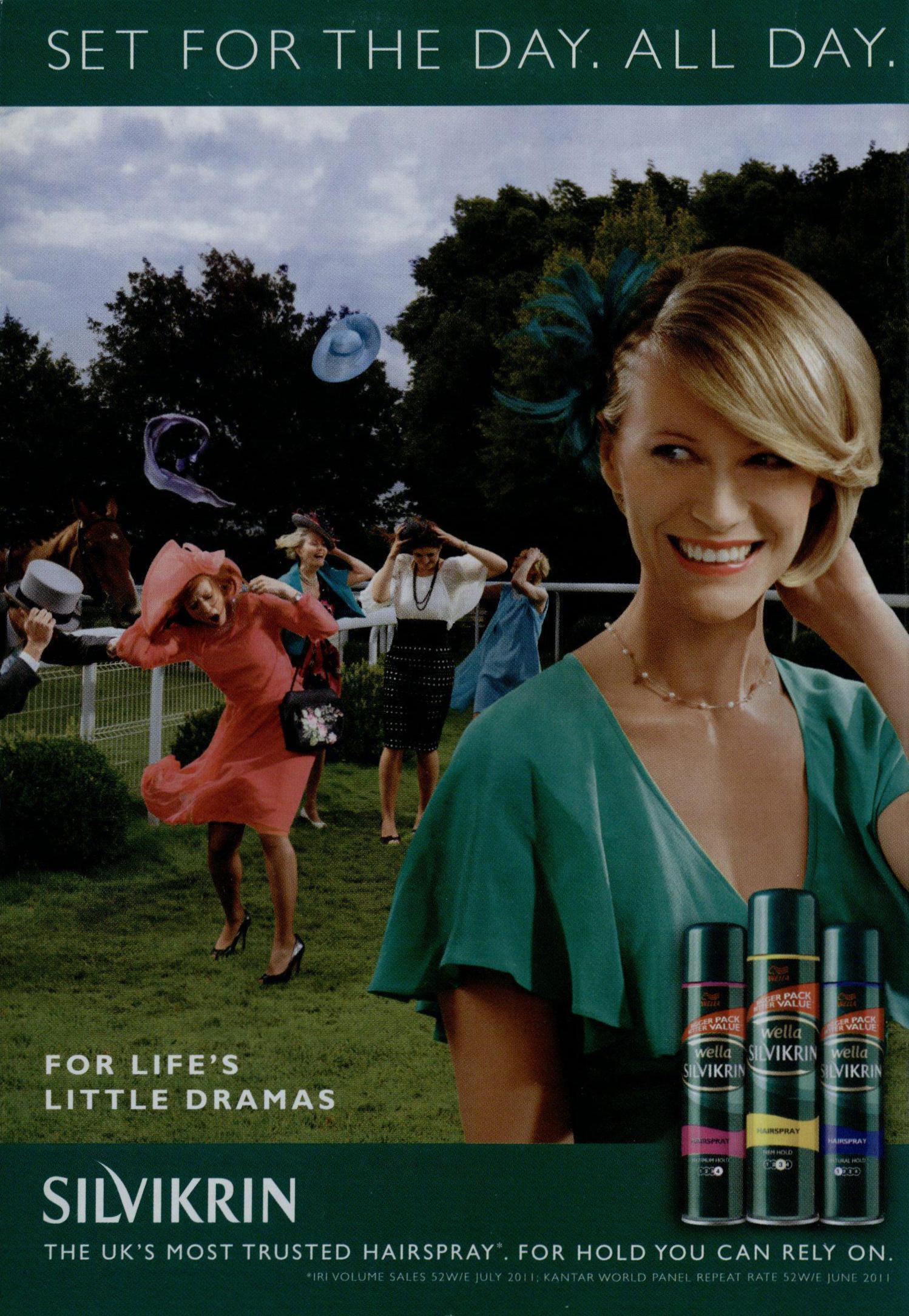
UK'S
. FOR HOLD YOU CAN RELY ON. L LIME SAI WORLD PAN I Pt
IKRM SET
FOR LIFE'S LITTLE DRAMAS THE
MOST TRUSTED HAIRSPRAY
SIMKRIN
FOR THE DAY. ALL DAY.
"When
I was growing up, China was pretty much closed to foreigners," says writer Jonathan Margolis. "Although it's different today, China is still very mysterious to most people."
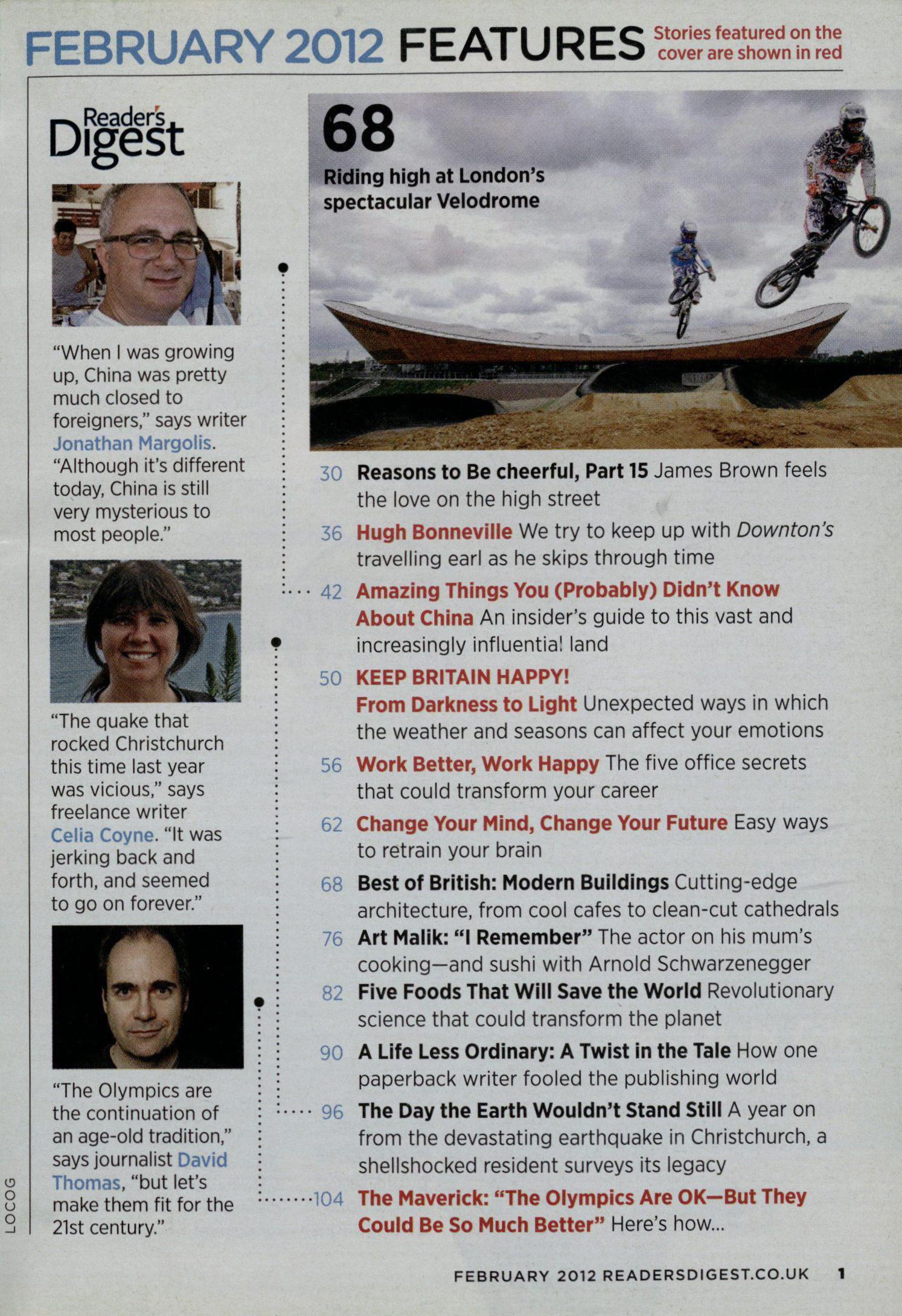
"The quake that rocked Christchurch this time last year was vicious," says freelance writer Celia Coyne. "It was jerking back and forth, and seemed to go on forever."
"The Olympics are the continuation of an age-old tradition," says journalist David Thomas, "but let's make them fit for the 21st century."
2012 FEATURESStoriesfeaturedonthe cover are shown in red Digest 68
•
FEBRUARY
Riding high at London's spectacular Velodrome •
Reasons to Be cheerful, Part 15 James Brown feels the love on the high street 36 Hugh Bonneville We try to keep up with Downton's travelling earl as he skips through time
• 42 Amazing Things You (Probably) Didn't Know About China An insider's guide to this vast and increasingly influential land 50 KEEP BRITAIN HAPPY! From Darkness to Light Unexpected ways in which the weather and seasons can affect your emotions 56 Work Better, Work Happy The five office secrets that could transform your career 62 Change Your Mind, Change Your Future Easy ways to retrain your brain 68 Best of British: Modern Buildings Cutting-edge architecture, from cool cafes to clean-cut cathedrals 76 Art Malik: "I Remember"The actor on his mum's cooking—and sushi with Arnold Schwarzenegger 82 Five Foods That Will Save the World Revolutionary science that could transform the planet 90 A Life Less Ordinary: A Twist in the Tale How one paperback writer fooled the publishing world 96 The Day the Earth Wouldn't Stand Still A year on from the devastating earthquake in Christchurch, a shellshocked resident surveys its legacy 104 The Maverick: "The Olympics Are OK—But They Could Be So Much Better" Here's how... 0 0 FEBRUARY 2012 READERSDIGEST.CO.UK 1
30
••
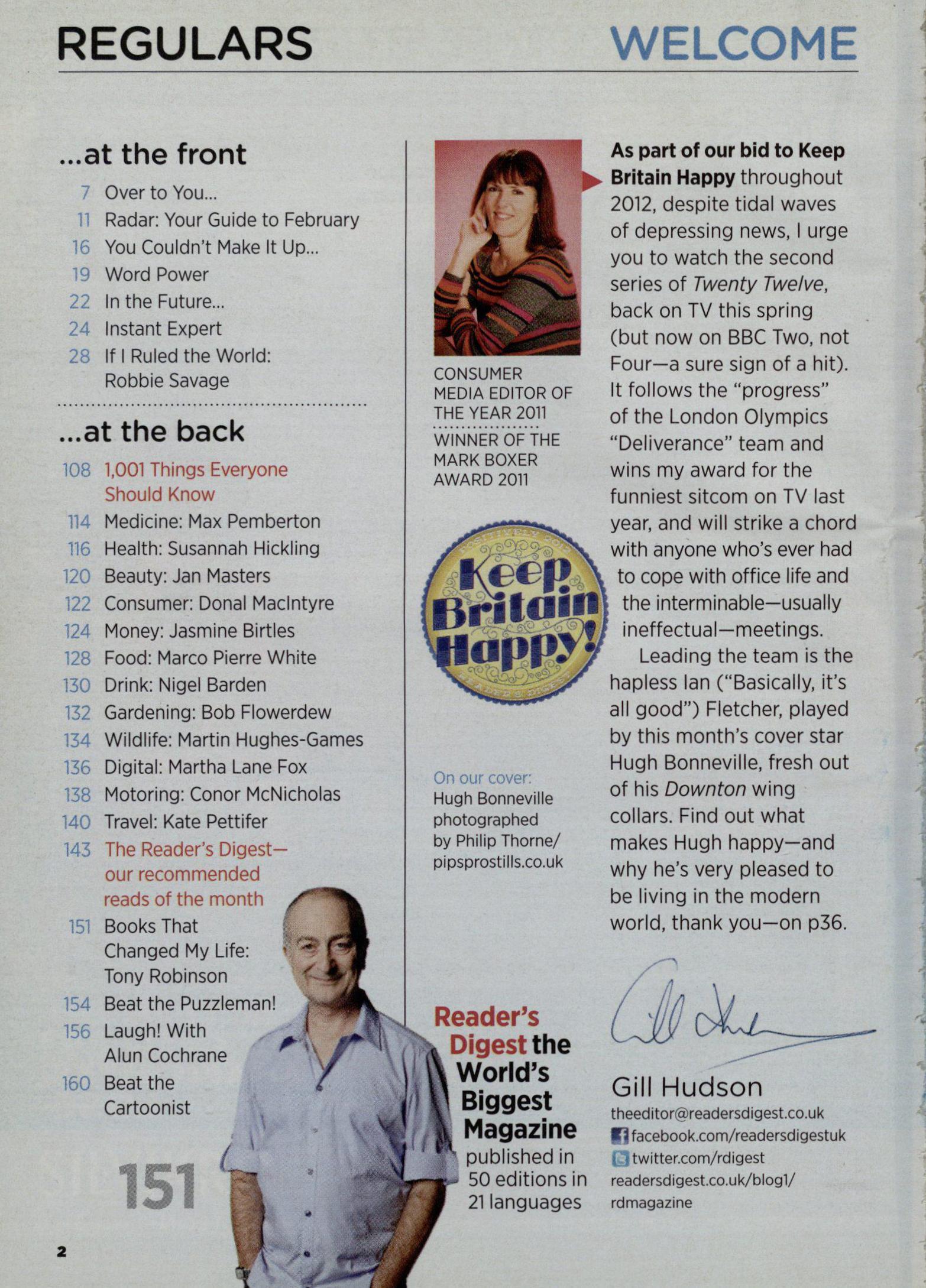
As part of our bid to Keep Britain Happy throughout 2012, despite tidal waves of depressing news, I urge you to watch the second series of Twenty Twelve, back on TV this spring (but now on BBC Two, not Four—a sure sign of a hit). It follows the "progress" of the London Olympics "Deliverance" team and wins my award for the funniest sitcom on TV last year, and will strike a chord with anyone who's ever had to cope with office life and the interminable—usually ineffectual—meetings. Leading the team is the hapless Ian ("Basically, it's all good") Fletcher, played by this month's cover star Hugh Bonneville, fresh out of his Downton wing collars. Find out what makes Hugh happy—and why he's very pleased to be living in the modern world, thank you—on p36.
WELCOME
...at the front Over to You... 11 Radar: Your Guide to February 10 You Couldn't Make It Up... 19 Word Power 22 In the Future... 24 Instant Expert 28 If I Ruled the World: Robbie Savage ...at the back 108 1,001 Things Everyone Should Know 114 Medicine: Max Pemberton 116 Health: Susannah Hickling 120 Beauty: Jan Masters 122 Consumer: Donal Maclntyre 124 Money: Jasmine Birtles 128 Food: Marco Pierre White 130 Drink: Nigel Barden 132 Gardening: Bob Flowerdew 134 Wildlife: Martin Hughes-Games 136 Digital: Martha Lane Fox 138 Motoring: Conor McNicholas 140 Travel: Kate Pettifer 143 The Reader's Digest— our recommended reads of the month 151 Books That Changed My Life: Tony Robinson 154 Beat the Puzzleman! 156 Laugh! With Alun Cochrane 160 Beat the Cartoonist CONSUMER MEDIA EDITOR OF THE YEAR 2011 WINNER OF THE MARK BOXER AWARD 2011
by
Reader's
the World's Biggest
published in 50
in 21
Gill Hudson theeditor@readersdigest.co.uk facebook.com/readersdigestuk twittercom/rdigest readersdigest.co.uk/blog1/ rdmagazine
REGULARS
On our cover: Hugh Bonneville photographed
Philip Thorne/ pipsprostills.co.uk
Digest
Magazine
editions
languages
Did he say his name was:
Andy...Mandy... Gandhi?

Need a hearing check?
Incredibly, more than half of all over-60s experience some sort of hearing loss. But many people find it difficult to know what to do about it. That's why, as the UK's largest charity taking action on hearing loss, we're working with Specsavers Hearing Centres to carry out a million free hearing checks over the next 12 months. That's a million people who will have peace of mind or won't have to worry about awkward social situations and embarrassing conversations anymore. So if your hearing isn't what it used to be, why not do something about it today?
Take a free hearing check at checkyourhearing.co.uk or call 0800 030 4985 to find your nearest Specsavers Hearing Centre Source:
In partnership with iean )_ C.t mires Specsavers
ACTION ON HEARING
Action On Hearing Loss 2011. Action On Hearing Loss is the trading name of the Royal National Institute for Deaf People (RNID). Registered charity numbers 207720 (England and Wales) and SC038926 (Scotland). ©2011 Specsavers Hearing Centres. All rights reserved.
WRITE ON...

Send us your stories, jokes and letters— if they're published, we'll pay
WE PAY £50 for the star letter, £30 for normal letters and £15 for short extracts. Email readers letters@readersdigest. co.uk or write to Readers' Letters, Reader's Digest, 157 Edgware Road, London W2 2HR.
WE ALSO PAY £70 for the true stories, anecdotes, jokes in Laugh! and You Couldn't Make It Up..., and contributions to endof-article fillers, Travel and Gardening.
Email excerpts@ readersdigest.co.uk or write to Excerpts, Reader's Digest, 157 Edgware Road, London W2 2HR
THE SMALL PRINT
Ensure submissions are not previously published. Include your name, email, address and daytime phone number with all correspondence. We may edit letters and use them in all print and electronic media. Contributions used become world copyright of Vivat Direct Ltd (t/a Reader's Digest).
SORRY! We cannot acknowledge or return unpublished items or unsolicited articlelength manuscripts. Do not send SAEs. Article-length stories, poetry and cartoons are not requested.
SUBSCRIBE!
Visit readersdigest.co.uk or write to Reader's Digest, PO Box 444, Douglas, Isle of Man IM99 3ZF.
UK: £42 a year. Republic of Ireland: €74.39 a year. Europe: £50 a year. Rest of the world: £60 a year. Prices include delivery.
GIFT SUBSCRIPTION?
CHANGE OF ADDRESS?
Contact Customer Services for renewals, gifts, address changes, payments, account information and all other enquiries.
Phone: 0871 351 1000*
Email: cust_service @readersdigest.co.uk
Minicom: 0870 600 1153
Digital Magic—Give It a Go!
Want to try an easy, fun way of getting to our website, via the picture of RD's editor-in-chief Gill Hudson on page 2? All you need is a smartphone, Android device or iPad. Simply go to the iTunes App Store or Android Market and search for and dowload the free Digital Space app. Then hold your phone about three to five inches away from the picture of Gill, allowing the camera to focus. You'll then be magically transported through the ether to the Reader's Digest website. Spooky!
'Ca lls fr om a BT lan dline w ll cos t 10p a m inu te. Ca ll cos ts from o t her p rov iders may vary.
peek SIGNED UP FOR OUR FAMOUS PRIZE DRAW YET? — GO TO READERSDIGEST.CO.UK TO FIND OUT MORE REGULARS/ wwm MM.

All you need is iOS 5 on your iPhone or iPad and away you go! You can buy either single issues of the magazine for £1.49 or—for just £11.99—you'll get a whole year's worth. What are you waiting for?
YOUR FAVOURITE MAGAZINE IS NOW AVAILABLE ON THE NE! * or* . e! ■ •or $1)14 Ik.1 PIN THE APPLE NEWSSTAND, THAT IS!
Digest
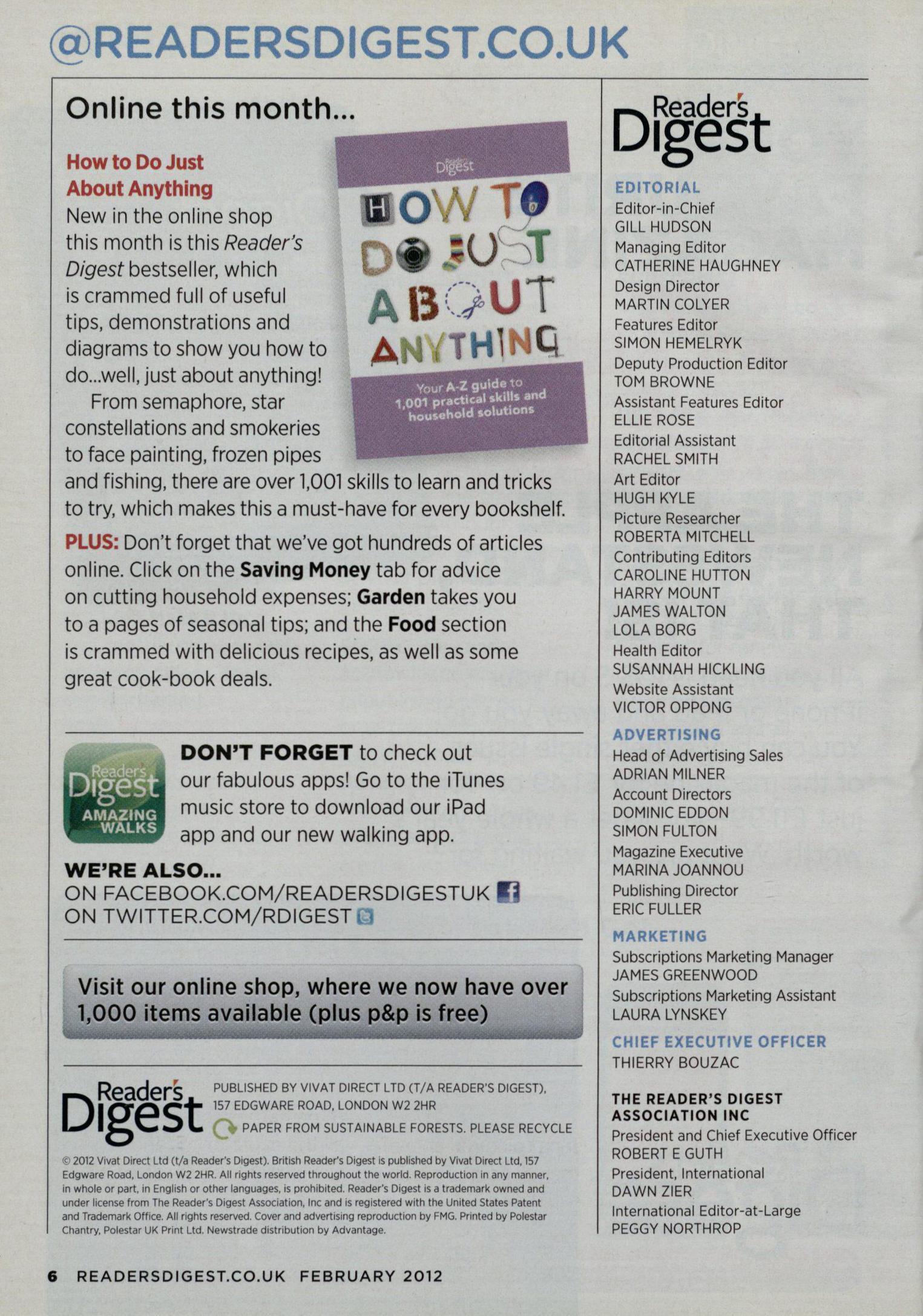
Online this month...
How to Do Just About Anything
New in the online shop this month is this Reader's Digest bestseller, which is crammed full of useful tips, demonstrations and diagrams to show you how to do...well, just about anything!
From semaphore, star constellations and smokeries to face painting, frozen pipes and fishing, there are over 1,001 skills to learn and tricks to try, which makes this a must-have for every bookshelf.
PLUS: Don't forget that we've got hundreds of articles online. Click on the Saving Money tab for advice on cutting household expenses; Garden takes you to a pages of seasonal tips; and the Food section is crammed with delicious recipes, as well as some great cook-book deals.
DON'T FORGET to check out our fabulous apps! Go to the iTunes music store to download our iPad app and our new walking app.
WE'RE ALSO...
ON FACEBOOK.COM/READERSDIGESTUK 11 ON TWITTER.COM/RDIGEST n
Visit our online shop, where we now have over 1,000 items available (plus p&p is free)
@READERSDIGEST.CO.UK Digest
Readers PUBLISHED BY MAT DIRECT LTD (T/A READERS DIGEST), Digest 157 EDGWARE ROAD, LONDON W2 2HR 0. PAPER FROM SUSTAINABLE FORESTS. PLEASE RECYCLE 2012 v,vat t t to (1/a Reader's Digest). British Readers Digest is published by Vivat Direct Ltd, 157 Edgware Road, London W2 2HR. All rights reserved throughout the world. Reproduction in any manner, in whole or part. in English or other languages, is prohibited. Reader's Digest is a trademark owned and under license from The Reader's Digest Association, Inc and is registered with the United States Patent and Trademark Office. All rights reserved. Cover and advertising reproduction by FMG. Printed by Polestar Chantry, Polestar UK Print Ltd. Newstrade distribution by Advantage. 6 READERSDIGEST.CO.UK FEBRUARY 2012 1110W TO ia(f-1A 13 UT AN iTHINP 1,01,4301Y1prr:Actlei-Zdcag: Ilskawedillinancl EDITORIAL Editor-in-Chief GILL HUDSON Managing Editor CATHERINE HAUGHNEY Design Director MARTIN COLYER Features Editor SIMON HEMELRYK Deputy Production Editor TOM BROWNE Assistant Features Editor ELLIE ROSE Editorial Assistant RACHEL SMITH Art Editor HUGH KYLE Picture Researcher ROBERTA MITCHELL Contributing Editors CAROLINE HUTTON HARRY MOUNT JAMES WALTON LOLA BORG Health Editor SUSANNAH HICKLING Website Assistant VICTOR OPPONG ADVERTISING Head of Advertising Sales ADRIAN MILNER Account Directors DOMINIC EDDON SIMON FULTON Magazine Executive MARINA JOANNOU Publishing Director ERIC FULLER MARKETING Subscriptions Marketing Manager JAMES GREENWOOD Subscriptions Marketing Assistant LAURA LYNSKEY CHIEF EXECUTIVE OFFICER THIERRY BOUZAC THE READER'S DIGEST ASSOCIATION INC President and Chief Executive Officer ROBERT E GUTH President, International DAWN ZIER International Editor-at-Large PEGGY NORTHROP
OVER TO YOU...
EMAILS, LETTERS, TWEETS AND FACEBOOK
£30 FOR EACH PUBLISHED LETTER, £15 FOR SHORTER EXTRACTS, £50 FOR THE LETTER OF THE MONTH!
SEE PAGE 4 FOR MORE DETAILS
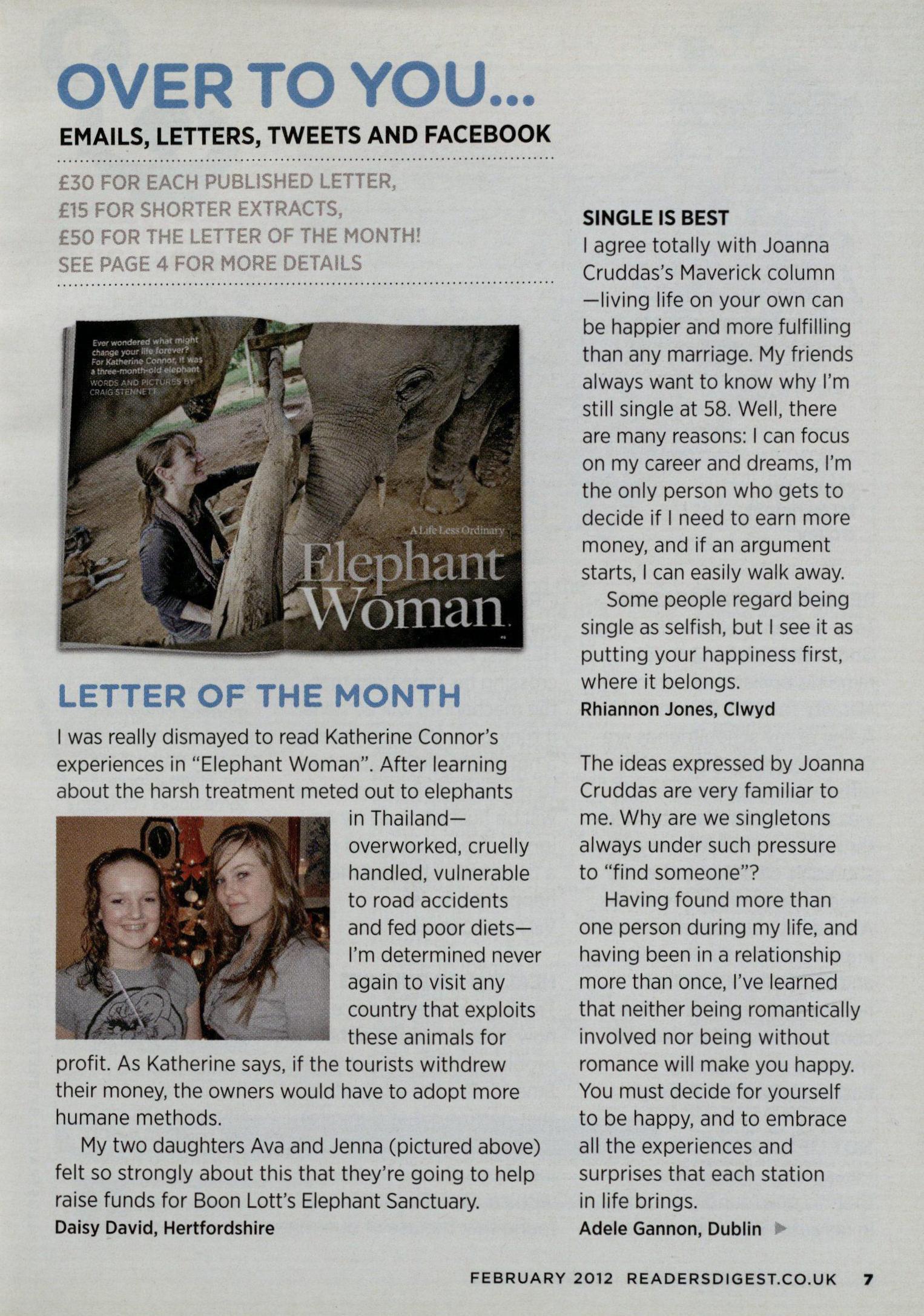
LETTER OF THE MONTH
I was really dismayed to read Katherine Connor's experiences in "Elephant Woman". After learning about the harsh treatment meted out to elephants in Thailand— overworked, cruelly handled, vulnerable to road accidents and fed poor diets— I'm determined never again to visit any country that exploits these animals for profit. As Katherine says, if the tourists withdrew their money, the owners would have to adopt more humane methods.
My two daughters Ava and Jenna (pictured above) felt so strongly about this that they're going to help raise funds for Boon Lott's Elephant Sanctuary.
Daisy David, Hertfordshire
SINGLE IS BEST
I agree totally with Joanna Cruddas's Maverick column —living life on your own can be happier and more fulfilling than any marriage. My friends always want to know why I'm still single at 58. Well, there are many reasons: I can focus on my career and dreams, I'm the only person who gets to decide if I need to earn more money, and if an argument starts, I can easily walk away. Some people regard being single as selfish, but I see it as putting your happiness first, where it belongs.
Rhiannon Jones, Clwyd
The ideas expressed by Joanna Cruddas are very familiar to me. Why are we singletons always under such pressure to "find someone"?
Having found more than one person during my life, and having been in a relationship more than once, I've learned that neither being romantically involved nor being without romance will make you happy. You must decide for yourself to be happy, and to embrace all the experiences and surprises that each station in life brings.
Adele Gannon, Dublin
FEBRUARY 2012 READERSDIGEST.CO.UK 7
"Here comes the refreshment trolley"
REASON FOR THE SEASON
Tony Jordan's feature "Finding God in Bethlehem" brought to mind his brilliant version of The Nativity for BBC One in 2010. A few of my schoolfriends are Christians, each from a very different background, but I was able to identify with them through the Nativity story. We shouldn't be afraid to herald the real meaning of Christmas. After all, it's supposed to be an important time for the religious and non-religious to find hope, make amends in their communities and rediscover the meaning of giving.
Kirsten Bradshaw, Edinburgh
NOT LIFTING THE LID
Please warn James Brown that his newfound pleasure in his automatic lavatory seat
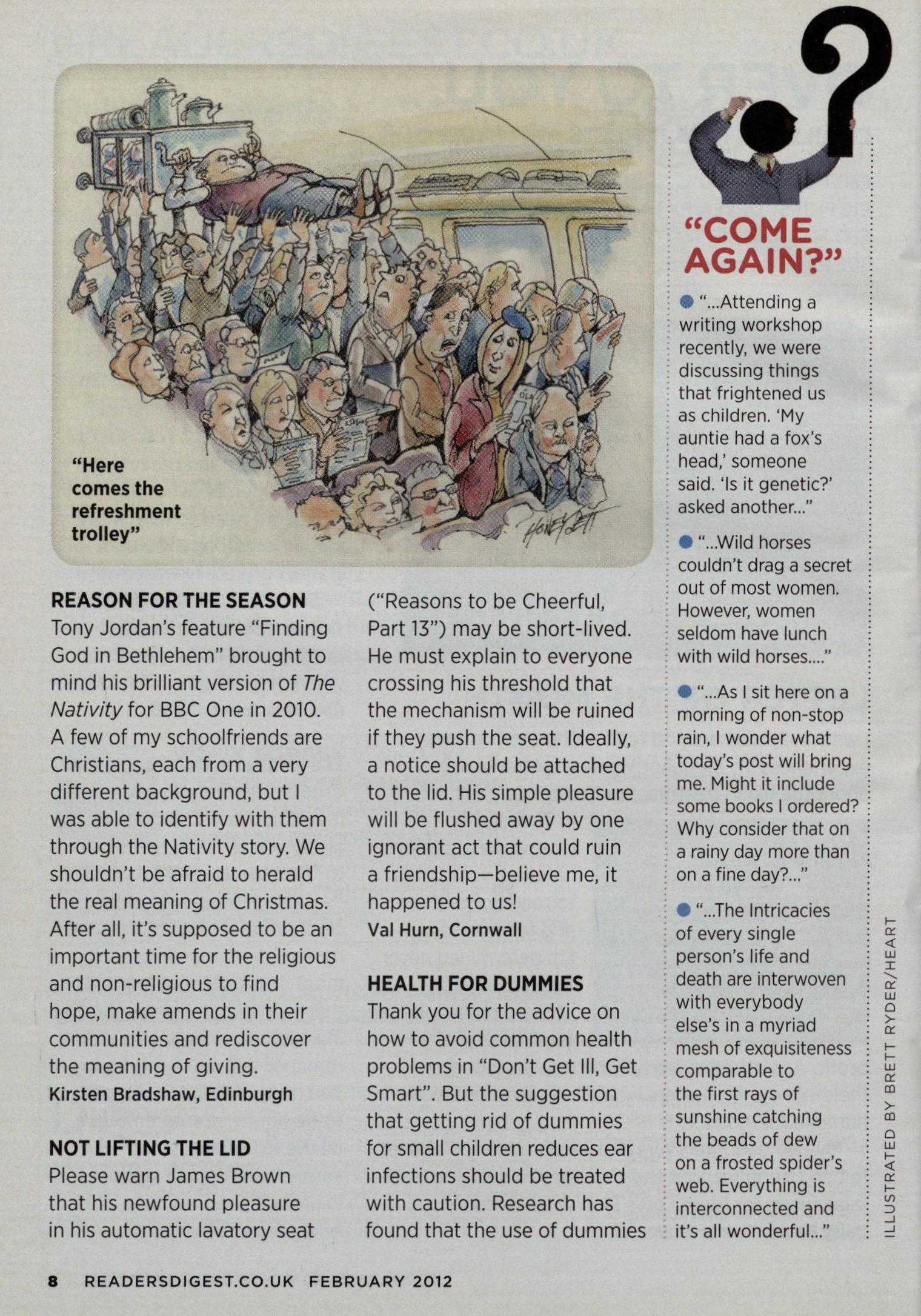
("Reasons to be Cheerful, Part 13") may be short-lived. He must explain to everyone crossing his threshold that the mechanism will be ruined if they push the seat. Ideally, a notice should be attached to the lid. His simple pleasure will be flushed away by one ignorant act that could ruin a friendship—believe me, it happened to us!
Val Hum, Cornwall
HEALTH FOR DUMMIES
Thank you for the advice on how to avoid common health problems in "Don't Get III, Get Smart". But the suggestion that getting rid of dummies for small children reduces ear infections should be treated with caution. Research has found that the use of dummies
• "...Attending a writing workshop recently, we were discussing things that frightened us as children. 'My auntie had a fox's head,' someone said. 'Is it genetic?' asked another..."
• "..Wild horses couldn't drag a secret out of most women. However, women seldom have lunch with wild horses...."
• "...As I sit here on a morning of non-stop rain, I wonder what today's post will bring me. Might it include some books I ordered? Why consider that on a rainy day more than on a fine day?..."
• "..The Intricacies of every single person's life and death are interwoven with everybody else's in a myriad mesh of exquisiteness comparable to the first rays of sunshine catching the beads of dew on a frosted spider's web. Everything is interconnected and it's all wonderful..."
ILLUSTRATED BY
8 READERSDIGEST.CO.UK FEBRUARY 2012
BRETT RYDER/ HEART
halves the risk of cot death, and the Department of Health recommends their use until a child is at least six months old. Parents need to bear this in mind.
Abigail Watkins, Derbyshire
RD: Thank you for pointing this out—many studies do favour the use of dummies early on to reduce the risk of sudden infant death syndrome.
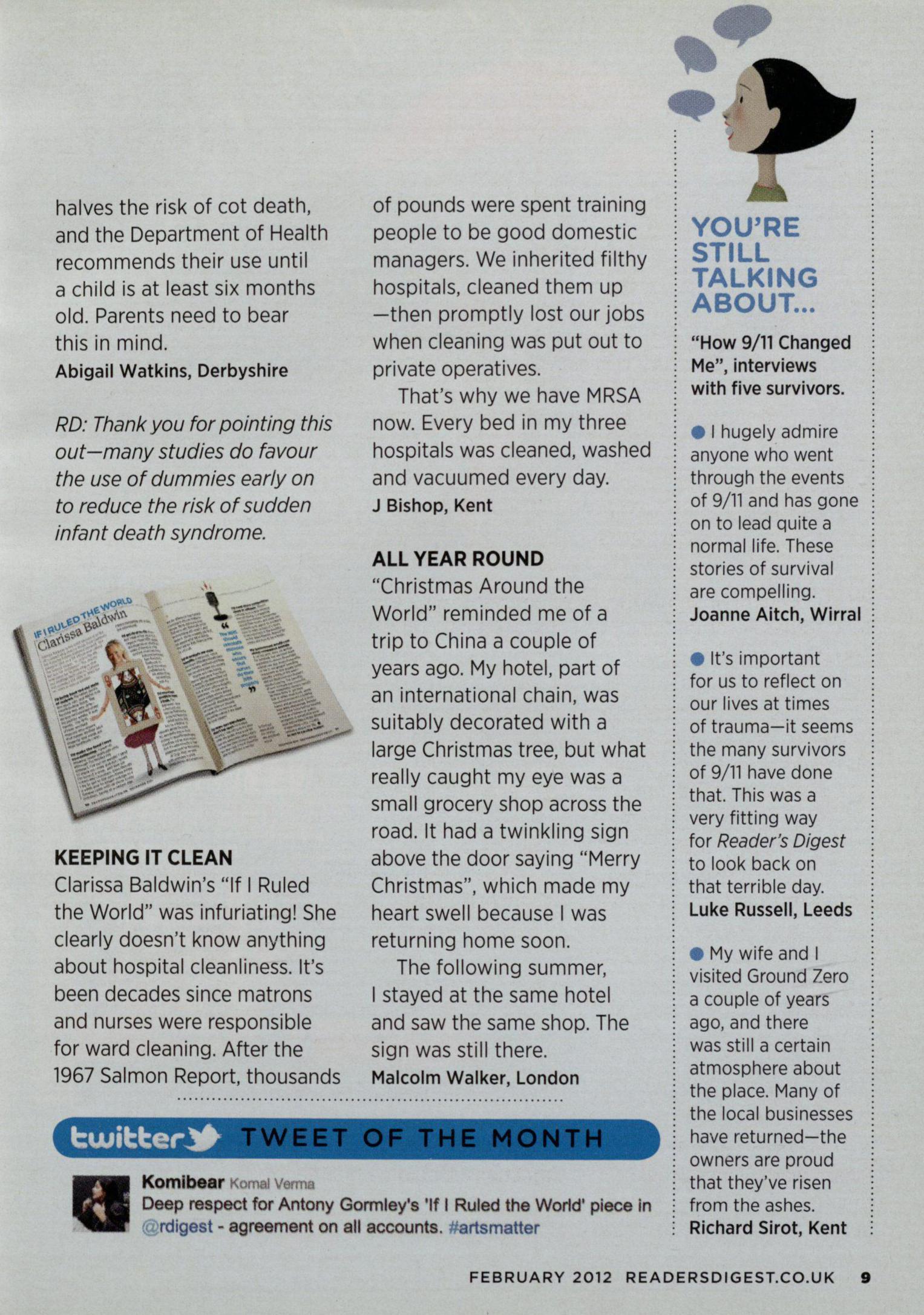
KEEPING IT CLEAN
Clarissa Baldwin's "If I Ruled the World" was infuriating! She clearly doesn't know anything about hospital cleanliness. It's been decades since matrons and nurses were responsible for ward cleaning. After the 1967 Salmon Report, thousands
of pounds were spent training people to be good domestic managers. We inherited filthy hospitals, cleaned them up —then promptly lost our jobs when cleaning was put out to private operatives.
That's why we have MRSA now. Every bed in my three hospitals was cleaned, washed and vacuumed every day.
J Bishop, Kent
ALL YEAR ROUND
"Christmas Around the World" reminded me of a trip to China a couple of years ago. My hotel, part of an international chain, was suitably decorated with a large Christmas tree, but what really caught my eye was a small grocery shop across the road. It had a twinkling sign above the door saying "Merry Christmas", which made my heart swell because I was returning home soon.
The following summer, I stayed at the same hotel and saw the same shop. The sign was still there.
Malcolm Walker, London
YOU'RE STILL TALKING ABOUT...
"How 9/11 Changed Me", interviews with five survivors.
• I hugely admire anyone who went through the events of 9/11 and has gone on to lead quite a normal life. These stories of survival are compelling.
Joanne Aitch, Wirral
• It's important for us to reflect on our lives at times of trauma—it seems the many survivors of 9/11 have done that. This was a very fitting way for Reader's Digest to look back on that terrible day.
Luke Russell, Leeds
Komlbear Kornai Verma
Deep respect for Antony Gormley's 'If I Ruled the World' piece in rdigest - agreement on all accounts. #artsmatter
• My wife and I visited Ground Zero a couple of years ago, and there was still a certain atmosphere about the place. Many of the local businesses have returned—the owners are proud that they've risen from the ashes.
Richard Sirot, Kent
C=1111===1111111 III
FEBRUARY 2012 READERSDIGEST.CO.UK 9
60% of your immune system is now thought to be based in your gut, so shouldn't this be where you support your immune health?
Bimuno® IMMUNAID

Bimuno IMMUNAID
Try Bimuno IMMUNAID soft chewy pastilles and support your natural defences where it counts.
IMMUNE HEALTH and Bimuno.com Now available from
*Studies on file. Bimuno IMMUNAID is the result of nine years of intensive scientific research with the University of Reading. Bimuno is a food supplement. Food supplements are intended to supplement your diet and should not be regarded as a substitute for a varied diet and a healthy lifestyle. Bimuno® is a registered trademark which is the property of Clasado Inc for a Prebiotic Transgalactooligosaccharide.
IN eususmo * SUPPORTYOUR SCIEN71RC STUDIES 4 1 NATURALDEFENCES 30 ADVANCED FORMULA CHEWABLE PASTIMES
nano
Support your immune system where it counts.
Author and BBC2 Review
Show critic Natalie Haynes on the new releases
YOUR SHORT, SHARP GUIDE TO FEBRUARY
Young adults: can Mavis (Charlize Theron) rekindle her schoolgirl romance with Buddy (Patrick Wilson)?
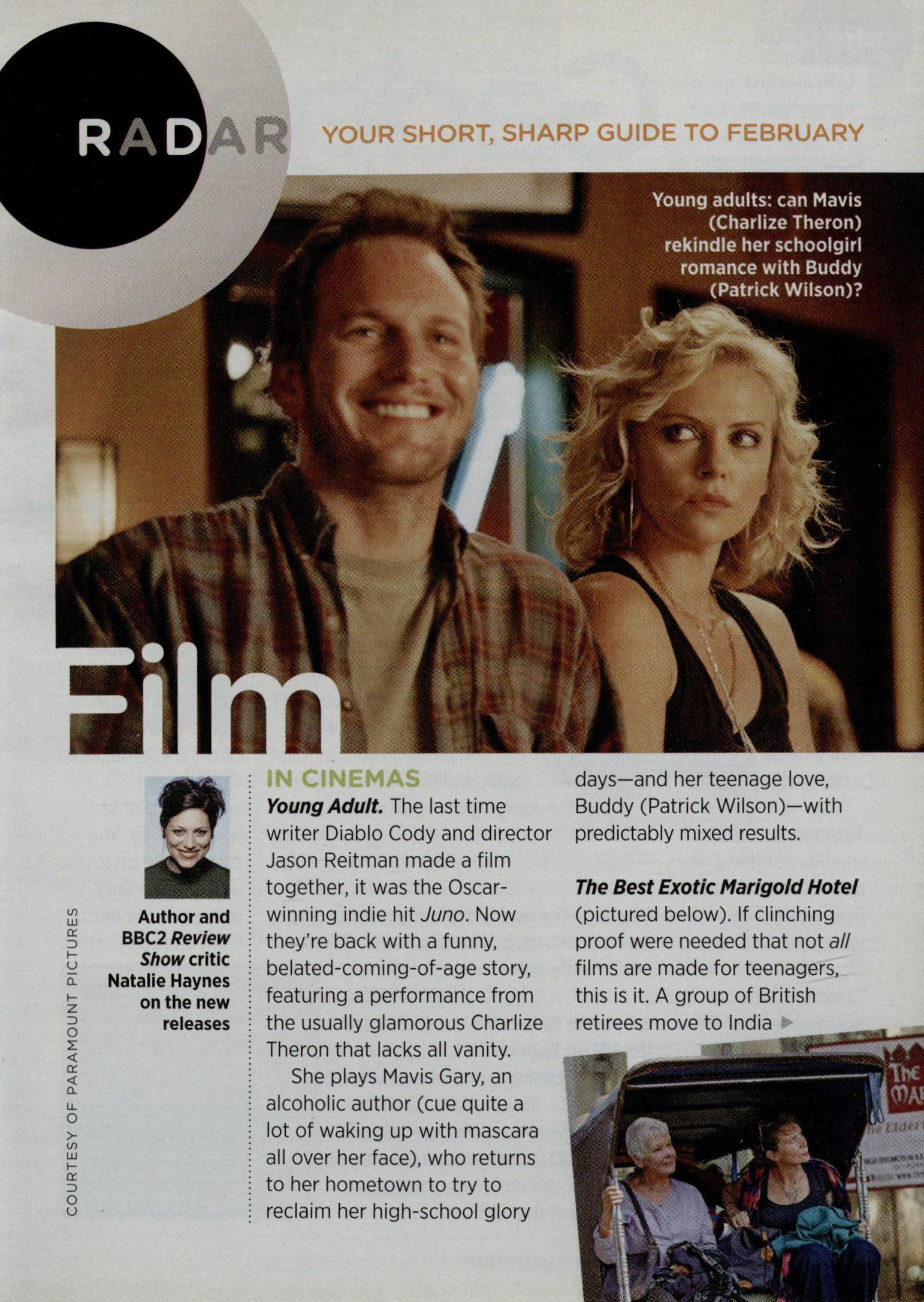
Young Adult. The last time writer Diablo Cody and director Jason Reitman made a film together, it was the Oscarwinning indie hit Juno. Now they're back with a funny, belated-coming-of-age story, featuring a performance from the usually glamorous Charlize Theron that lacks all vanity.
She plays Mavis Gary, an alcoholic author (cue quite a lot of waking up with mascara all over her face), who returns to her hometown to try to reclaim her high-school glory
days—and her teenage love, Buddy (Patrick Wilson)—with predictably mixed results.
The Best Exotic Marigold Hotel (pictured below). If clinching proof were needed that not all films are made for teenagers, this is it. A group of British retirees move to India ►
COURTESY OF PARAMOUN T PICTU RES
to live in a "luxury" hotel that's actually a hovel. Judi Dench plays an elderly "Carrie Bradshaw", pondering her fellow residents' lives in a blog.
DVC
The Ides Of March.
This is a razorsharp political thriller, but it's the sight of two of Hollywood's biggest stars— George Clooney and Ryan Gosling— squaring up to each other as a grimy presidential candidate and his idealist aide that really helps make it a compelling film.
Tyrannosaur. Not the easiest film I've ever watched—it is at times very violent and disturbing. But Olivia Colman gives the performance of her career as Hannah, an abused wife trying to give her life meaning by helping troubled loner Joseph (Peter Mullen).
adgets
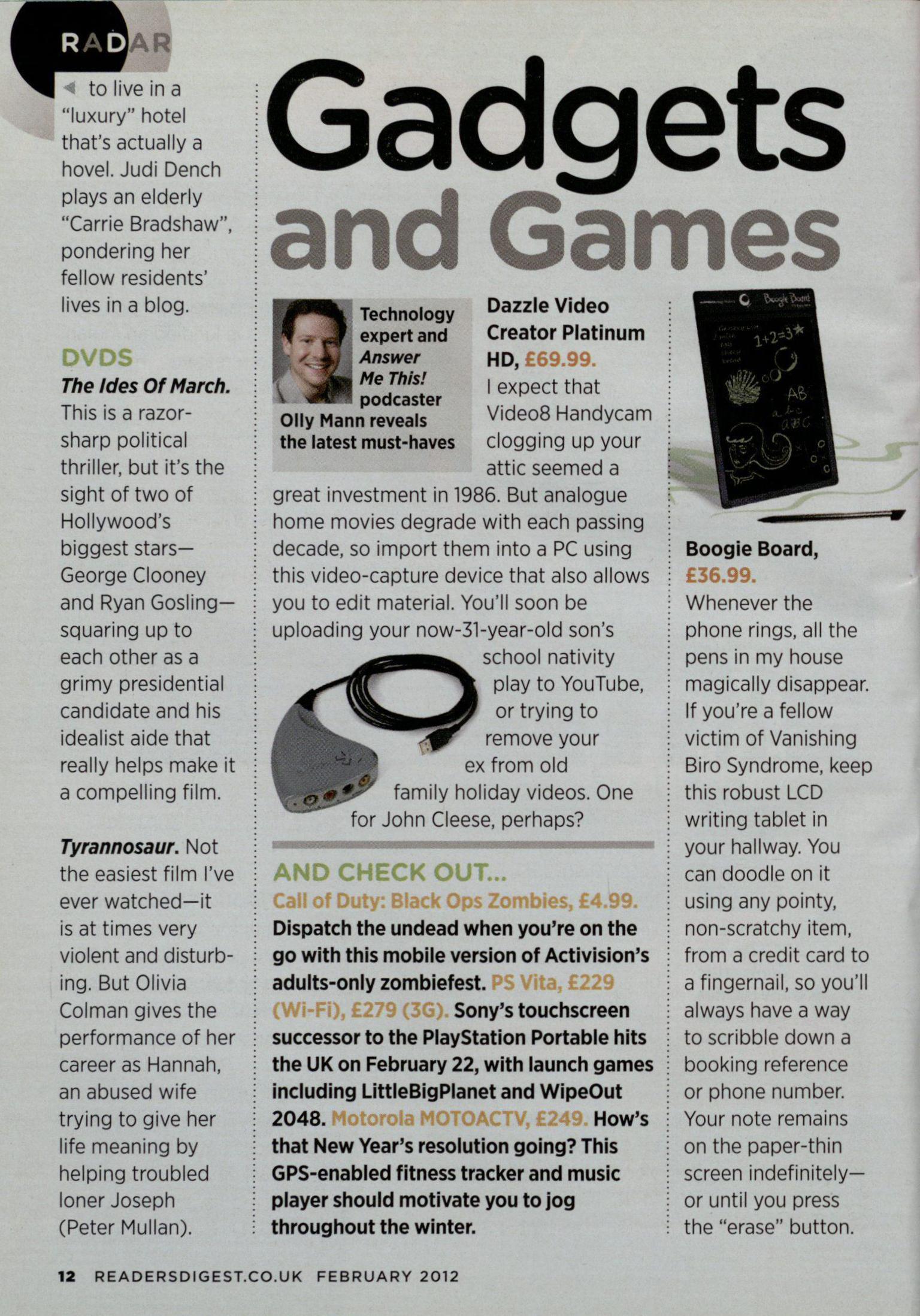
Technology expert and Answer
Me This! podcaster
Oily Mann reveals the latest must-haves
Dazzle Video Creator Platinum HD,
I expect that Video8 Handycam clogging up your attic seemed a great investment in 1986. But analogue home movies degrade with each passing decade, so import them into a PC using this video-capture device that also allows you to edit material. You'll soon be uploading your now-31-year-old son's school nativity play to YouTube, or trying to remove your ex from old family holiday videos. One for John Cleese, perhaps?
AND CHECK OUT...
Call of Duty: Black Ops Zombies, £4.99. Dispatch the undead when you're on the go with this mobile version of Activision's adults-only zombiefest.
Sony's touchscreen successor to the PlayStation Portable hits the UK on February 22, with launch games including LittleBigPlanet and WipeOut 2048.
How's that New Year's resolution going? This GPS-enabled fitness tracker and music player should motivate you to jog throughout the winter.
Boogie Board, £36.99.
Whenever the phone rings, all the pens in my house magically disappear.
If you're a fellow victim of Vanishing Biro Syndrome, keep this robust LCD writing tablet in your hallway. You can doodle on it using any pointy, non-scratchy item, from a credit card to a fingernail, so you'll always have a way to scribble down a booking reference or phone number. Your note remains on the paper-thin screen indefinitely— or until you press the "erase" button.
R
12 READERSDIGEST.CO.UK FEBRUARY 2 012
BBC
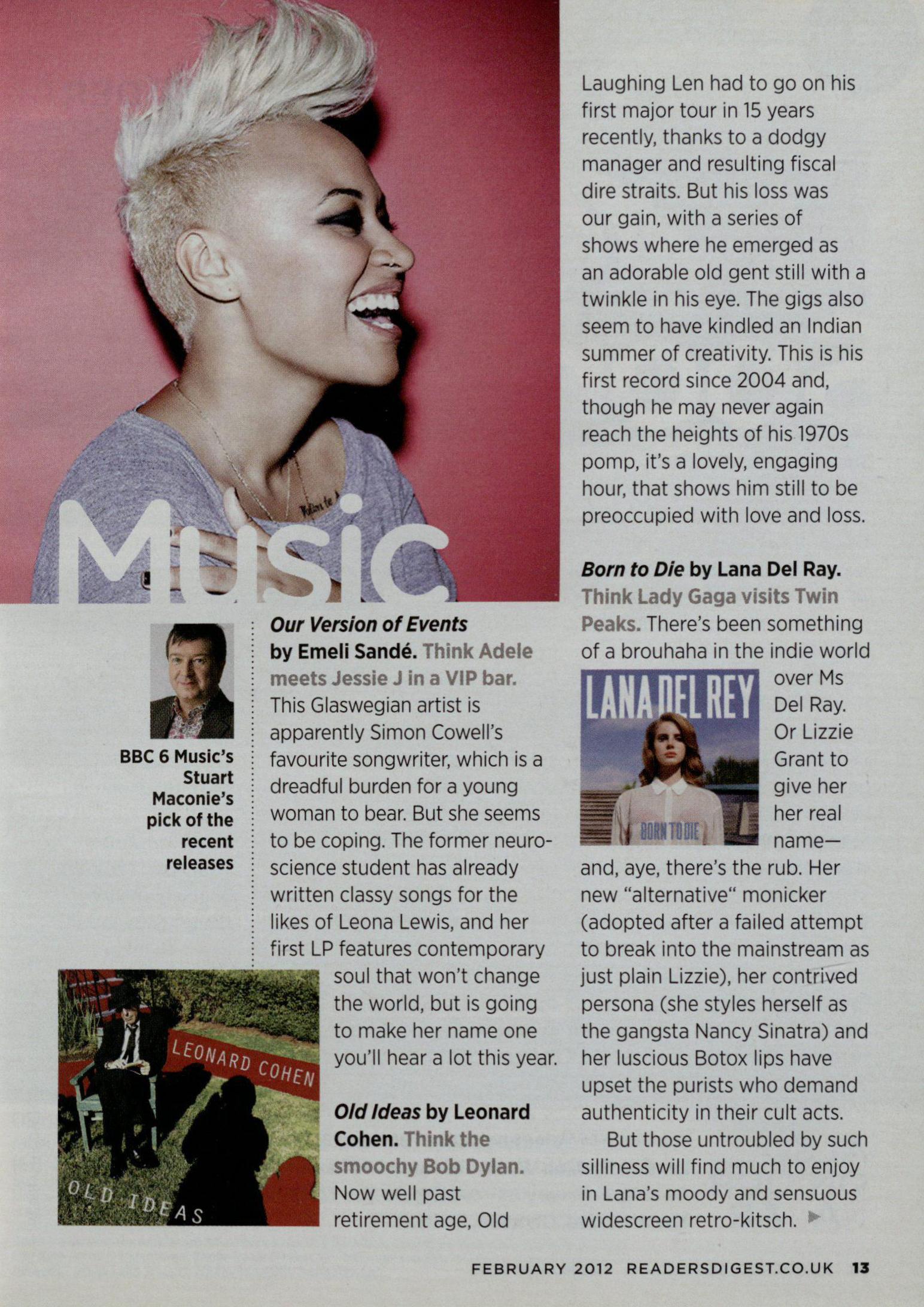
Our Version of Events by Emeli Sande. Think Adele meets Jessie J in a VIP bar. This Glaswegian artist is apparently Simon Cowell's favourite songwriter, which is a dreadful burden for a young woman to bear. But she seems to be coping. The former neuroscience student has already written classy songs for the likes of Leona Lewis, and her first LP features contemporary soul that won't change the world, but is going to make her name one you'll hear a lot this year.
Old Ideas by Leonard Cohen. Think the smoochy Bob Dylan. Now well past retirement age, Old
Laughing Len had to go on his first major tour in 15 years recently, thanks to a dodgy manager and resulting fiscal dire straits. But his loss was our gain, with a series of shows where he emerged as an adorable old gent still with a twinkle in his eye. The gigs also seem to have kindled an Indian summer of creativity. This is his first record since 2004 and, though he may never again reach the heights of his 1970s pomp, it's a lovely, engaging hour, that shows him still to be preoccupied with love and loss.
Born to Die by Lana Del Ray. Think Lady Gaga visits Twin Peaks. There's been something of a brouhaha in the indie world over Ms Del Ray. Or Lizzie Grant to give her her real name— and, aye, there's the rub. Her new "alternative" monicker (adopted after a failed attempt to break into the mainstream as just plain Lizzie), her contrived persona (she styles herself as the gangsta Nancy Sinatra) and her luscious Botox lips have upset the purists who demand authenticity in their cult acts. But those untroubled by such silliness will find much to enjoy in Lana's moody and sensuous widescreen retro-kitsch.
6 Music's Stuart Maconie's pick of the recent releases
FEBRUARY 2012 READERSDIGEST.CO.UK 13
Six Nations rugby union, How will reigning champions England, whose World Cup campaign was as successful and uplifting as a rotting fox in a disused canal, begin the post-Wilkinson, post-Johnson era? Will they continue to play as if trying to smother the entire concept of joy from the known universe, or unveil an exciting new generation of players? And can Wales' brilliant young stars learn to add heroic victories to their repertoire of heroic defeats?
Superbowl XLVI, Indianapolis, American football glory looms once more for some of US sport's biggest names. The New England Patriots are among those most likely to unpack the seemingly
ESPNcricinfo cricket blogger, broadcaster and stand-up Andy Zaltzman previews the best of the month's action
un-unpackable Green Bay Packers, who'll be aiming for two successive victories.
The prestigious half-time show will be performed by pentagenarian pop prancestress Madonna, who, in her youth, had trials as a linebacker for the San Francisco 49ers, before her excessively pointy brassiere was outlawed by the NFL. Pakistan v England T20 series, Dubai, February 23-25. Carling Cup Final, Wembley, February 26.
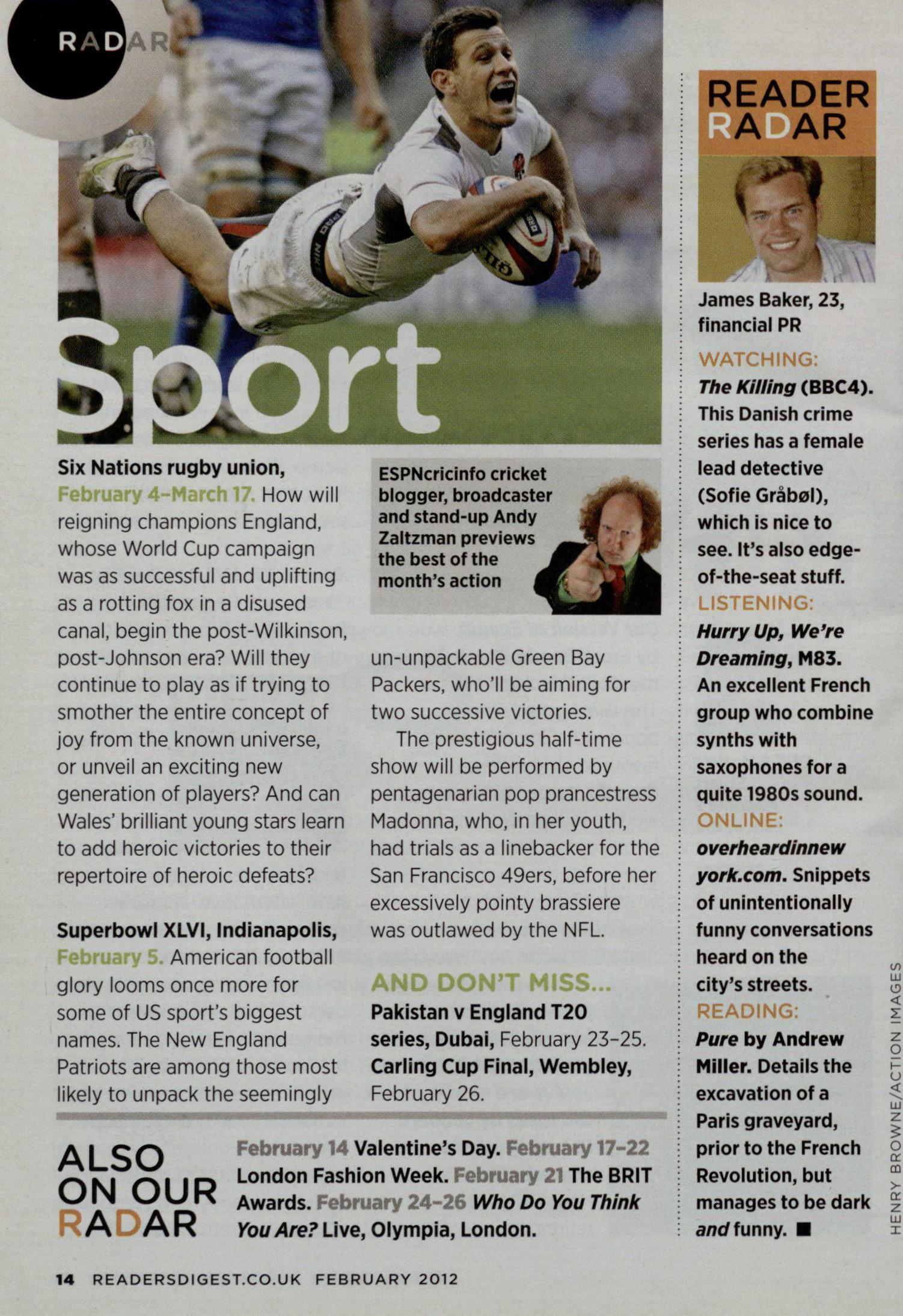
The Killing (BBC4). This Danish crime series has a female lead detective (Sofie Grabol), which is nice to see. It's also edgeof-the-seat stuff.
Hurry Up, We're Dreaming, M83. An excellent French group who combine synths with saxophones for a quite 1980s sound. overheardinnew york.com. Snippets of unintentionally funny conversations heard on the city's streets.
Pure by Andrew Miller. Details the excavation of a Paris graveyard, prior to the French Revolution, but manages to be dark and funny. •
ALSO ON OUR Awards.
Think AnAR You Are? Live, Olympia, London. Valentine's Day. - ' London Fashion Week. 17 77 The BRIT
AR -7
Who Do You
READER A
James Baker, 23, financial PR
14 READERSDIGEST.CO.UK FEBRUARY 2012
Advanced Technology. Ford DAB Audio System with Bluetooth° and USB connectivity.

Advanced Aerodynamics. Active Grille Shutter gives better economy. From MI Advance Payment. On selected models. With free rear parking distance sensors.
Advanced Refuelling. Easy Fuel capless system for quick, clean fill ups.
ALL-NEW FORD FOCUS. Start more than a car. ford co uk/motabtlity
Official fuel consumption figuresinmpg (U100km) for the Ford Focus Titanium X range: urban 34.9-55A (8.1-5.1), extra urban 565-76.4 (5.0-3.7), combined 47.1-67.3 (6.0-4.2). Offici at CO2 emission 139-109g/km. Vehicle shown is All-New Ford Focus Titanium X, with optional 18" 5-spoke alloy wheels. Nil Advance Payment only applies to All-New Ford Focus Zetec 1.6105PS Manual and All-New
is available at no extra cost.This programme is subject to the standard conditions of the Motability 3-year Contract Hire Scheme. Full written details and quotations available on request from a
The leading car scheme for disabled people Orn•■••■■■ •••••••■••"'
Motability
Ford Authorised
Under the Scheme the vehicles are leased from Motability Operations Limited (Registered Company No.1373876). City Gate House, 22 Southwark Bridge Road, London 5E1 91-1B. Applications must be received and accepted between (January and 31 March 2012 by Motability Operations Ltd. 1) 0 Go Further
Ford Focus Zetec 1.6125PS Manual. Metallic Paint
participating dealer of Motability Operations Limited.
YOU COULDN'T MAKE IT UP...
I My husband and I stopped at a burger bar to escape a torrential downpour. While we sat huddled there, I noticed a man crouching near the entrance.
"Look at that poor tramp," I said to my husband. "I'll buy him a cup of tea."
I emerged from the restaurant smiling, and offered the man a El coin.
"I don't want your money," he snapped. "I'm just here waiting for my wife."
Lorraine Smith, Lancashire
IMy friend's daughter was getting married, and an elderly guest rang to ask if she was required to wear a hat to the ceremony. My friend told her that it wouldn't be necessary.
"OK, fine," the lady replied. "I'll just wear a fornicator instead."
Gwen Culbard, Perthshire
I I was passing the undertaker's with my four-year-old daughter just as the hearse was being parked. When my
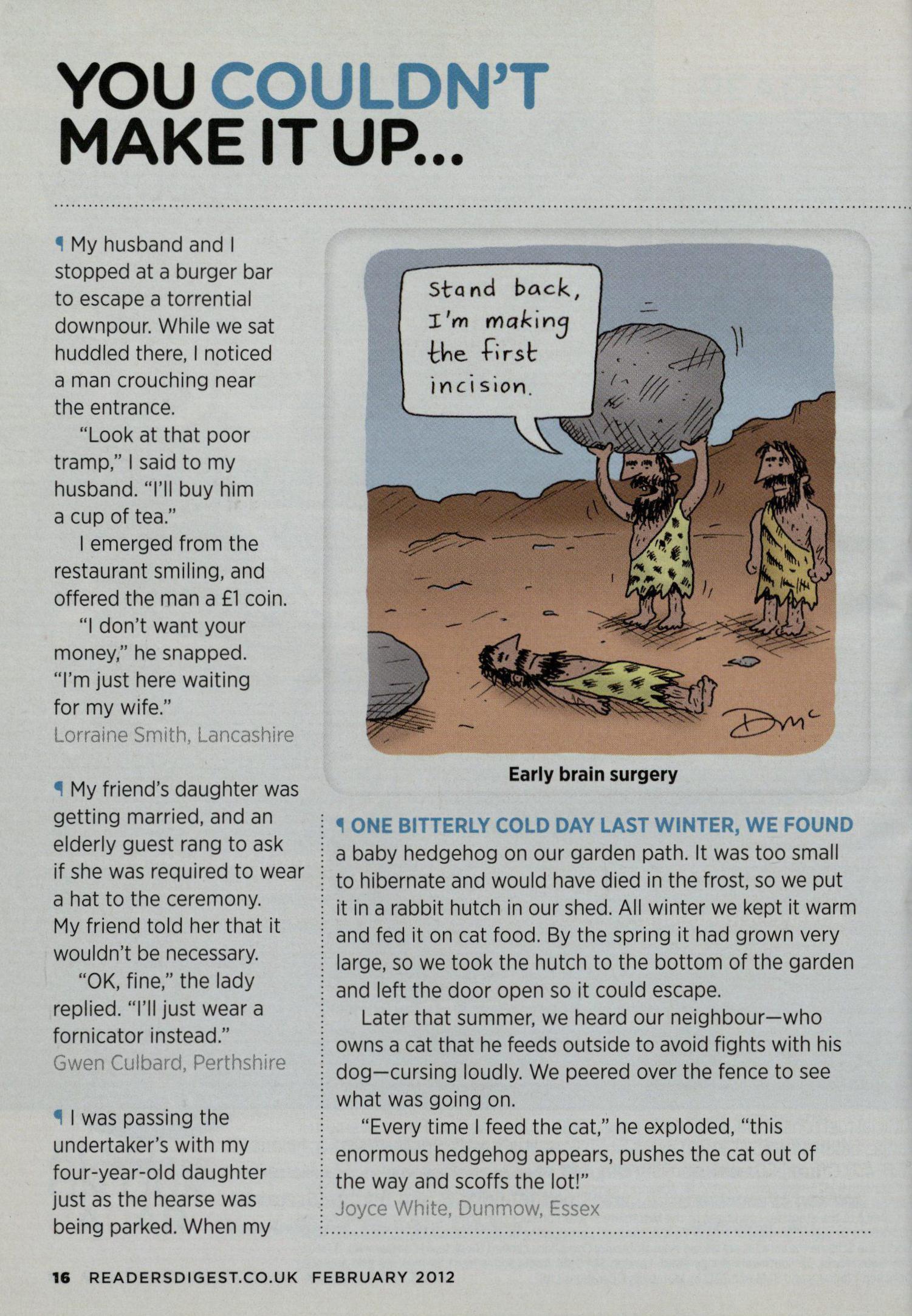
Early brain surgery
1 ONE BITTERLY COLD DAY LAST WINTER, WE FOUND a baby hedgehog on our garden path. It was too small to hibernate and would have died in the frost, so we put it in a rabbit hutch in our shed. All winter we kept it warm and fed it on cat food. By the spring it had grown very large, so we took the hutch to the bottom of the garden and left the door open so it could escape.
Later that summer, we heard our neighbour—who owns a cat that he feeds outside to avoid fights with his dog—cursing loudly. We peered over the fence to see what was going on.
"Every time I feed the cat," he exploded, "this enormous hedgehog appears, pushes the cat out of the way and scoffs the lot!"
Joyce White, Dunmow, Essex
16 READERSDIGEST.CO.UK FEBRUARY 2012
daughter asked about the "funny car", I explained that it was a vehicle used to take dead people to the cemetery.
She looked at the driver and his stern-looking assistant dressed in black, and replied, "Oh, yes, I can see one sitting in the front."
Susan Fitch, Suffolk

"And that's the story of how Grandad got his possessed hand of pure evil"
I A friend of mine who's looking for a new house was telling me about a property she'd just seen.
"It's completely derelict," she complained. "For a start, you'd have to get rid of that rotten old conservative at the back."
Hazel Beeley. LanLaselt
I I live in a retirement complex where security is tight—strangers can't enter without using the intercom system. As I went out the other day, a man accosted me and asked if I knew one of the male residents.
"Last time I saw him," he said,
1 AS A YOUNG DOCTOR in A&E, I often had medical students asking me for advice. One day a couple of them, suspecting they had flu, asked to have their temperatures taken.
WIN £70 FOR YOUR TRUE, FUNNY STORIES. EMAIL
excerpts@ readers digest.co.uk OR GO TO facebook. com/readers digestuk
"he looked something like you —thin on top, putting it on a bit around the waist. Does that help, mate?"
I decided that it didn't, and told him to ring the house manager instead.
Alan Andrews, Devon
I My two-year-old son was "helping" his dad in the garden until he was sent inside. I asked him what he'd done.
"I've been picking the bloody flowers, Mummy," he replied.
Emma Robinson, Essex
I grabbed a pair of thermometers from two jars of antiseptic on the shelf. The students popped them in their mouths, and were relieved to find that their temperatures were perfectly normal.
Unfortunately, when I replaced the thermometers, I noticed that one jar was labelled "oral" and the other was labelled "rectal".
Rhoda Pippen, Cardiff ■
FEBRUARY 2012 READERSDIGEST.CO.UK 17

Thousands of women worldwide have discovered that Menopacem provides comprehensive nutritional support, specially formulated by experts. Menopacee is ideal whether or not you are on HRT and can be taken for as long as required.
Menopace® Original tabletsis the original combination of 21 nutrients to help support vitality and wellness.
Menopace® Plus Botanicalsis a dual pack with Menopace® Original tablets plus a botanical tablet for extra general nutritional support, with Soy Isoflavones, Flaxseed lignans, Sage & Green Tea.
Menopace® Calciumis a convenient all-in-one formula to help maintain strong, healthy bones too, with extra Calcium, Magnesium and Vitamin D3.
Menopace® Nightincludes allthe benefits of Menopace® Original with the general nutritional support of extra Soya Isoflavones, Chamomile, Hops extract and 5-HTP
Menopace® Red Cloverprovides 40mg of the highly researched Menoflavon® isoflavones, plus 25mg polyphenols from Green Tea Extract.Red Clover is ideal taken alongside anyother product in the Menopace® range.
f2lig pvia_taizte ics stablets Carcem ,,,„„..,...„.,„„ prrtocureuenspame Women's Heaith A-rtul. A. rt. Beck. / 6 9 .1.e. # 6 r''n.°' Britain's leading '-' 1U rArtil ,,s ,. ...ak„.!, VITABIOTICS n Me Spports: k ilo cti; u„,„;,,;;‘„-rx.„ supplements 1,7.• sossyclosynnworkorgsA WWW w0171,115,¢).-Cancem org = r p r i r 9' ;,.:7" WHERE NATURE MEETS SCIENCE FromBoots, Superd ug, Holland & Barrett, Lloydspharmacy, supermarkets, chemists, GNC, health stores &www.menopace.com Vitamin supplements m y benefit those with nutritionally inadequate diets.
WORD POWER
What the dickens is Harry Mount up to?
It's a happy 200th birthday this month to Charles Dickens, a novelist famous for his imaginative use of words. But how many can you define? Answer A, B or C below.
1 tittlebat n A small fish B child's ball game
C wicked gossip
2 belcher n A cough sweet B aggressive dog
C coloured scarf
3 repeater n A pet bird
B watch C small knife
4 carmine n A explosive material B red pigment
C cheap perfume
oakum n A loose rope fibre B tree bark
C Turkish carpet
6 escutcheon n (ess-cutch-uhn)
A ornamental dagger

COVER ' STAR HUGH
BONNEVILLE'S favourite word?
"Serendipity— because when it occurs, it makes the day seem brighter."
B ermine robe C shield with a coat of arms
7 gig n A light carriage
B pub singer C lemon drink
8 pallet n A spiced ale
B small bed C red apple
9 confab n A vivid fantasy
B fist fight C chat
10 collation (keh-layshuhn) n A charity concert
B light meal C exam
11 grinder n A teacher
B archer C shirt collar
12 oracular (or-ackyou-ler) adj A hard of hearing B round-edged
C prophetic
13 lees n A wine dregs
B clogs C chair legs
14 tallow n A weight loss
B animal fat C long sock
15 cheval glass n
A mirror B wine goblet
C round window
A word is born: mailstrom is derived from maelstrom, a Dutch word meaning a whirlpool and, by extension, a chaotic state of affairs. The new version refers to a situation where your email has got so out of hand that your work is completely disordered ("I went on holiday and came back to face a nightmare mailstrom").
RD Rating Useful? 5/10
Likeable? 8/10
C A RICATURE BY ALFRED BRYAN ( 18521 899)
FEBRUARY 2012 READERSDIGEST.CO.UK 19
WORD POWER ANSWERS
9-11 getting there 12-13 impressive 14-15 word-power wizard!
1 tittlebat—A small fish. "Mr Pickwick wrote a paper called 'Observations on the Theory of Tittlebats' " —The Pickwick Papers
2 belcher—C coloured scarf. "Bill Sikes had a dirty belcher handkerchief round his neck"—Oliver Twist
3 repeater—B watch. "Scrooge touched the spring of his repeater"
—A Christmas Carol
4 carmine—B red pigment. "Made up with curls, wreaths, wings, white bismuth and carmine, this hopeful young person soared into so pleasing a Cupid"—Hard Times
5 oakum—A loose rope fibre. "We smelt the fish, and pitch, and oakum, and tar"
—David Copperfield
6 escutcheon—C shield with a coat of arms. "Deep would have been the blot upon his escutcheon"
—A Tale of Two Cities
7 gig—A light carriage. "Boys called to other boys in country gigs and carts"
—A Christmas Carol
WHY METEORITE?
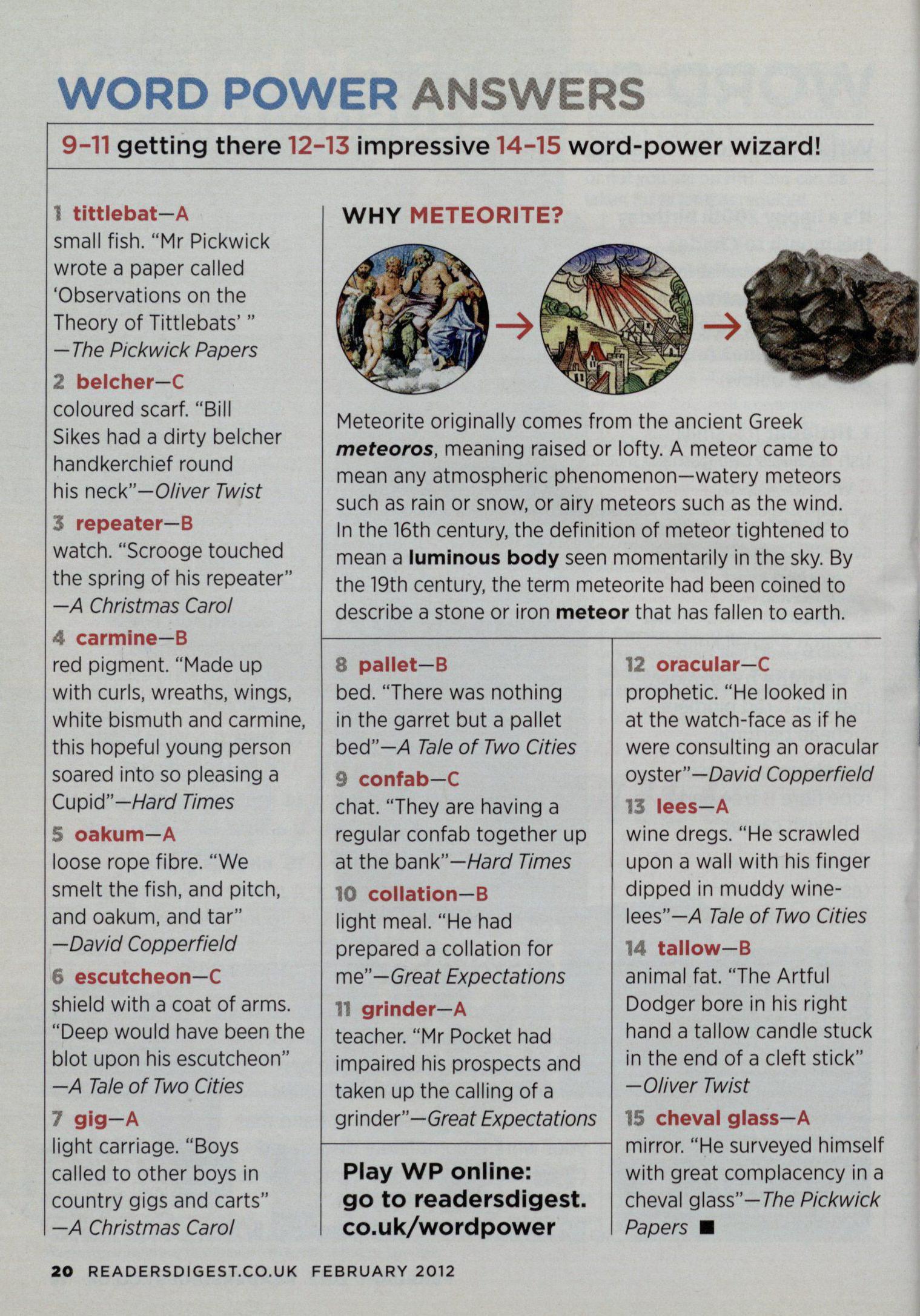
Meteorite originally comes from the ancient Greek meteoros, meaning raised or lofty. A meteor came to mean any atmospheric phenomenon—watery meteors such as rain or snow, or airy meteors such as the wind. In the 16th century, the definition of meteor tightened to mean a luminous body seen momentarily in the sky. By the 19th century, the term meteorite had been coined to describe a stone or iron meteor that has fallen to earth.
8 pallet—B bed. "There was nothing in the garret but a pallet bed"—A Tale of Two Cities
9 confab—C chat. "They are having a regular confab together up at the bank"—Hard Times
10 collation—B light meal. "He had prepared a collation for me"—Great Expectations
11 grinder—A teacher. "Mr Pocket had impaired his prospects and taken up the calling of a grinder"—Great Expectations
Play WP online: go to readersdigest. co. u k/wo rd power
12 oracular—C prophetic. "He looked in at the watch-face as if he were consulting an oracular oyster"—David Copperfield
13 lees—A
wine dregs. "He scrawled upon a wall with his finger dipped in muddy winelees"—A Tale of Two Cities
14 tallow—B
animal fat. "The Artful Dodger bore in his right hand a tallow candle stuck in the end of a cleft stick" —Oliver Twist
15 cheval glass—A mirror. "He surveyed himself with great complacency in a cheval glass"—The Pickwick Papers ■
20 READERSDIGEST.CO.UK FEBRUARY 2012
glasses
Hello Clarivu

'r clear alternative to laser eye surgery ur free consultati .
Ideal for the over 50s, Clarivu• Total Vision Correction can correct both long and short-sightedness and prevent cataracts in one simple, permanent lens replacement procedure — even if you've got astigmatism.
In fact, our proven treatment is a technically advanced and sophisticated development of cataract surgery; one of the world's most frequently performed surgical procedures.
Say hello to Clarivu- today and enjoy life without glasses, contacts or cataracts. Just call 0800 368 4848 to book your free consultation with a consultant surgeon and our expert medical team at the Optegra eye hospital near you.
0800 368 4848
Call or book your place online Goodbye
"I
know that I can get up in the morning and do what I want to do without wondering where my glasses are. It's like I was 20 again."
Jackie Crabtree
See Jackie's story on clarivu.com
Open evening invitation
Meet the experts and have all your questions answered
CLARIVU' TOTAL VISION CORRECTION
clarivu.co m Clarivu•° is exclusive to "Zliptegra World-class eye hospitals. Expert eye care.
IN THE FUTURE...
...we'll smell who's calling us, says Gary Rimmer
Talking scents
Scientists in Singapore have developed glasses that, when wearers meet, trigger a unique signature tune and a whiff of personalised scent in the opposite headset—said to inspire positive interactions. Odour technology isn't new, but with the invention in India of an electronic nose to detect the tar-like smell of tuberculosis on saliva, it's back in fashion. Lab-on-a-chip technology developed at Notre Dame University, for example, can analyse a few pheromone molecules on your breath.
Incorporate this into a smartphone, replicate the chemical signature at the other end using the same odour technology as those Singaporean glasses, and by 2030 you could genuinely fancy someone over the phone.
Electro-drop: the Nissan Pivo 3 concept car
The ultimate back-seat driver
Electric vehicles make even more sense for city driving now engineers at Stanford University have proved they could be wirelessly recharged on the move, so distance is no problem. Couple this with driverless steering, pinpoint GPS navigation, automated collision control and intercar networking, and by 2022 the "killer app" for electric motoring may be The Car That Parks Itself.
Imagine a future night out: your car navigates you "driverlessly" to your destination; you instruct it when to return; then it drives off "alone" until the intercar network detects a vacated parking space—or the electronic hail of an empty "intelligent" parking slot—and parks itself!
Text me in the shower
In the bathroom, there's further proof that innovation happens when technologies collide—New Yorkers can now buy a touchscreen that doubles as a half-length mirror and
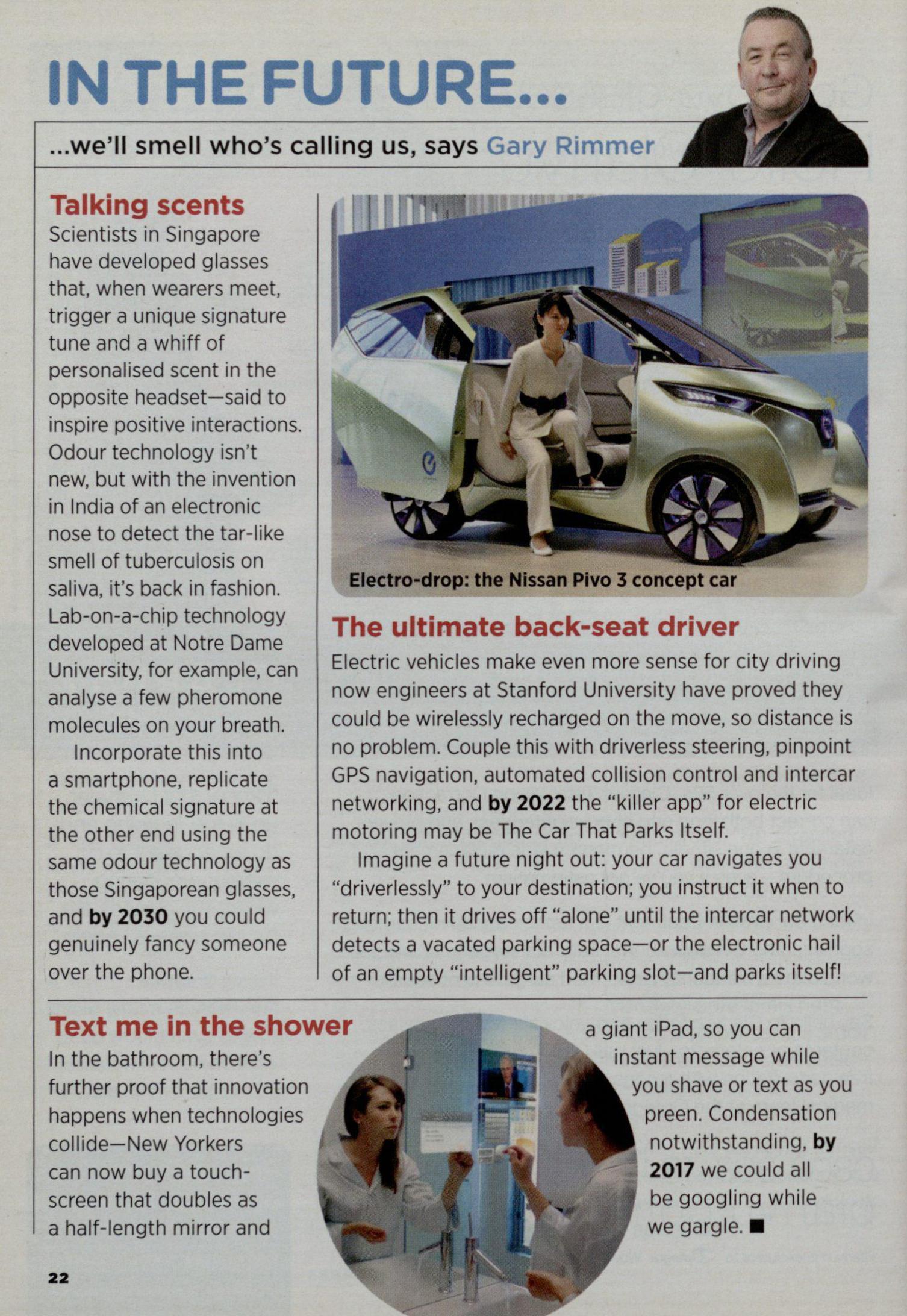
a giant iPad, so you can instant message while you shave or text as you preen. Condensation notwithstanding, by 2017 we could all be googling while we gargle. ■
22
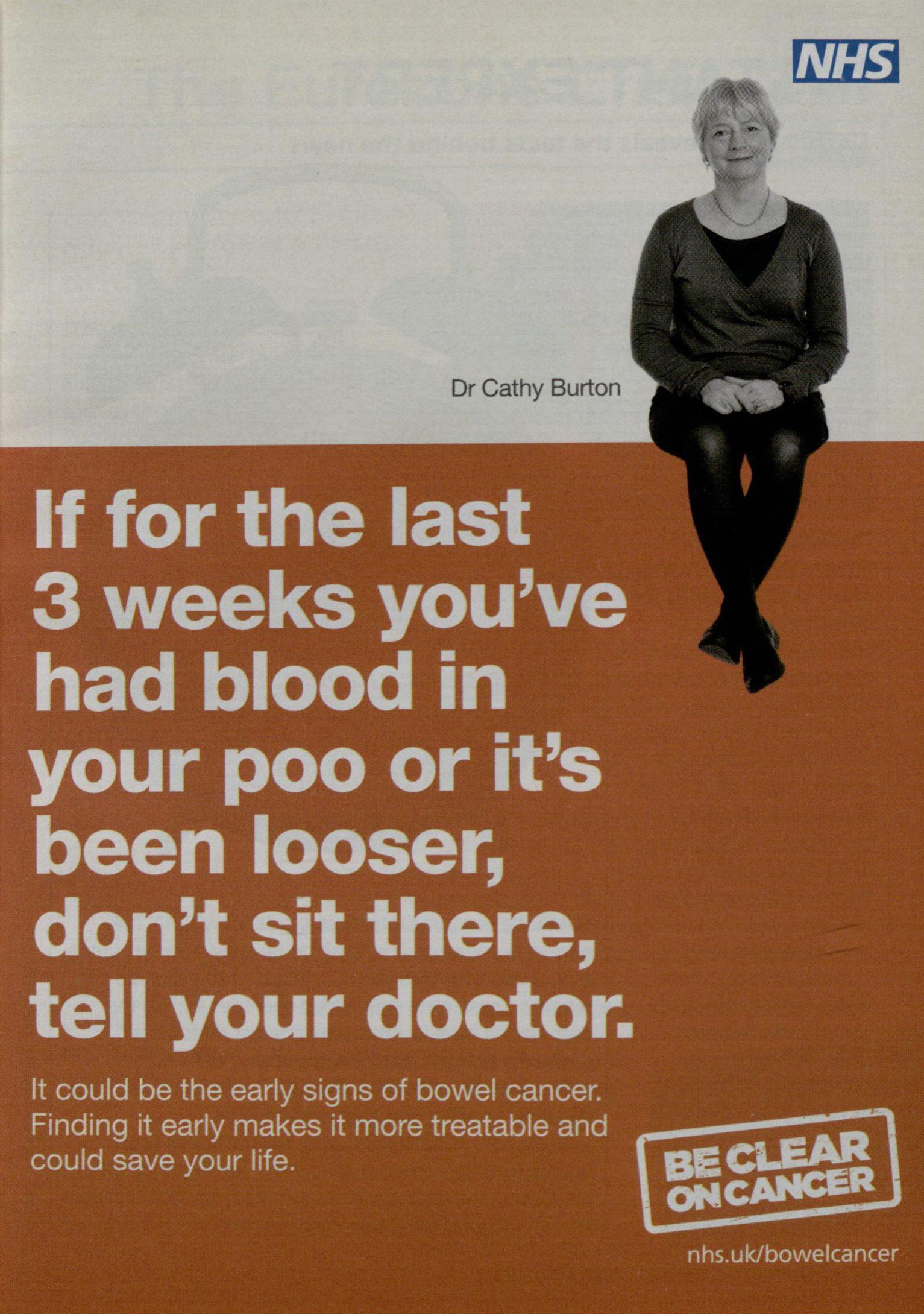
If for the last 3 weeks you've had blood in your poo or it's been looser, don't sit there, tell your doctor. It could be the early signs of bowel cancer. Finding it early makes it more treatable and could save your life.
NHS
Dr Cathy Burton
nhs.uk/bowelcancer
INSTANT EXPERT
Harry Mount reveals the facts behind the news
With mass downgrades threatened, austerity measures starting to bite, and protests getting more violent, what's the future for the single currency—and the European Union as a whole?
Why is the European crisis happening?
The principal cause is the sovereign-debt crisis, which began in 2009 following the financial crisis of 2008. Eurozone members Greece, Ireland and Portugal found themselves with extreme levels of debt they were unable to pay off. A series of multi-billion pound bailouts has managed to stave off complete financial collapse in these countries, but the crisis is by no means over.
Austerity measures in the heavily indebted countries have been extremely unpopular. The failure of national governments to deal effectively with the crisis has led to new governments in Ireland Italy, Spain and Greece.
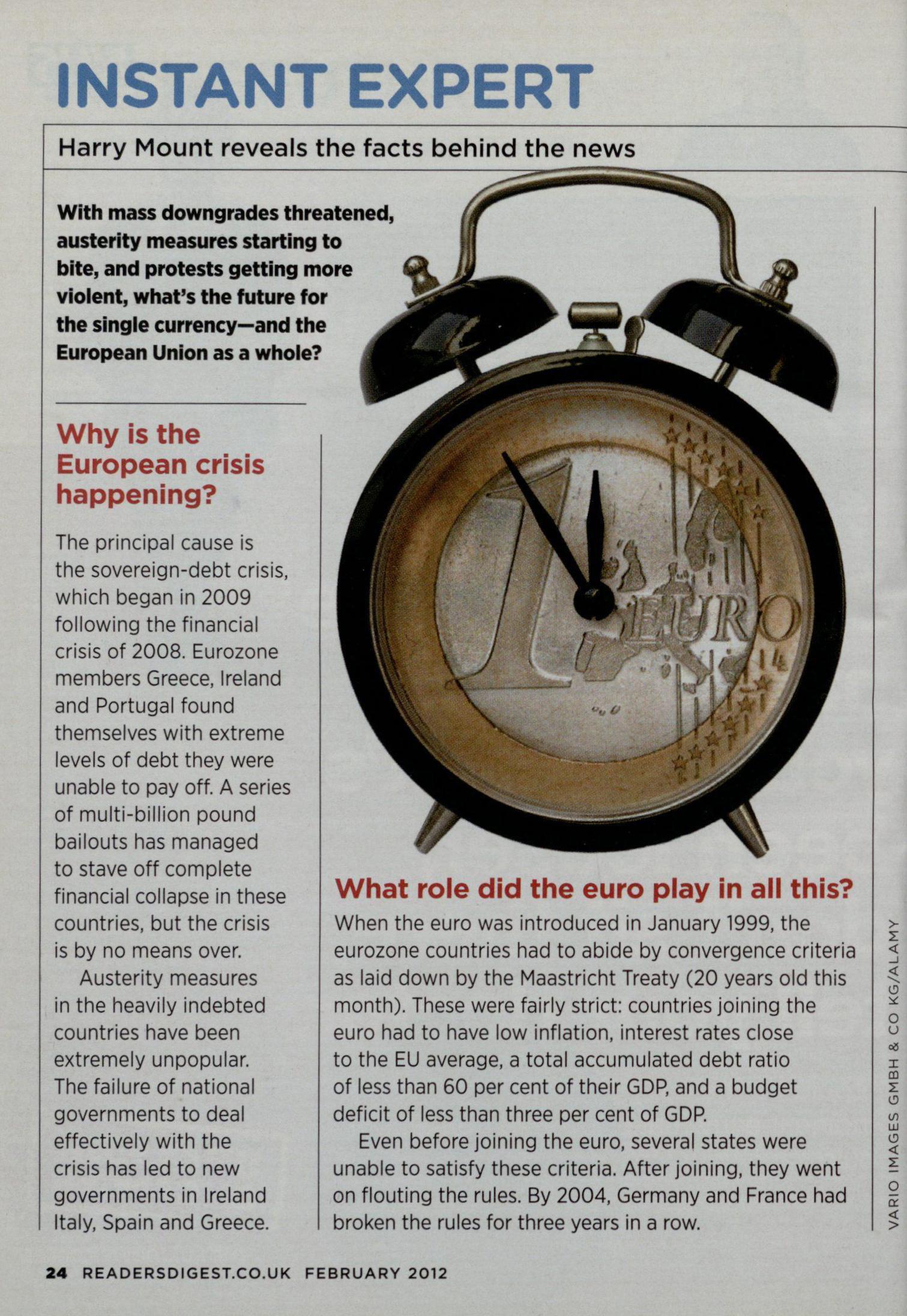
What role did the euro play in all this?
When the euro was introduced in January 1999, the eurozone countries had to abide by convergence criteria as laid down by the Maastricht Treaty (20 years old this month). These were fairly strict: countries joining the euro had to have low inflation, interest rates close to the EU average, a total accumulated debt ratio of less than 60 per cent of their GDP, and a budget deficit of less than three per cent of GDP.
Even before joining the euro, several states were unable to satisfy these criteria. After joining, they went on flouting the rules. By 2004, Germany and France had broken the rules for three years in a row.
V ARIO MAGES GMBH & CO KG/ AL AMY 24 READERSDIGEST.CO.UK FEBRUARY 2012
The Eurozone Crisis -
But Germany and France haven't suffered as badly. How come?
They're the two biggest economies in the eurozone. They could survive the financial stresses; smaller economies— such as Greece and Portugal—could not. Buoyed by economic policies run by the European Central Bank, these smaller countries had borrowed way beyond their means. When the economic collapse hit, they had no way of paying off their debts. If they had remained outside the euro, those countries and their banks could never have borrowed such vast amounts of money—producing much greater debt than allowed under the initial convergence criteria—at such low interest rates.
If they had gone into such eye-watering debt outside the euro, they could have worked their way out of the crisis by devaluing their own currency. That's not an option as long as they remain in the euro. As it was, their debts soared and government-bond interest rates rocketed, too, threatening the national economies with collapse.
€3.5 trillion
The combined national debt of the PUGS countries (Portugal, Italy, Ireland, Greece and Spain). This amounts to £23k per head for every citizen of those countries
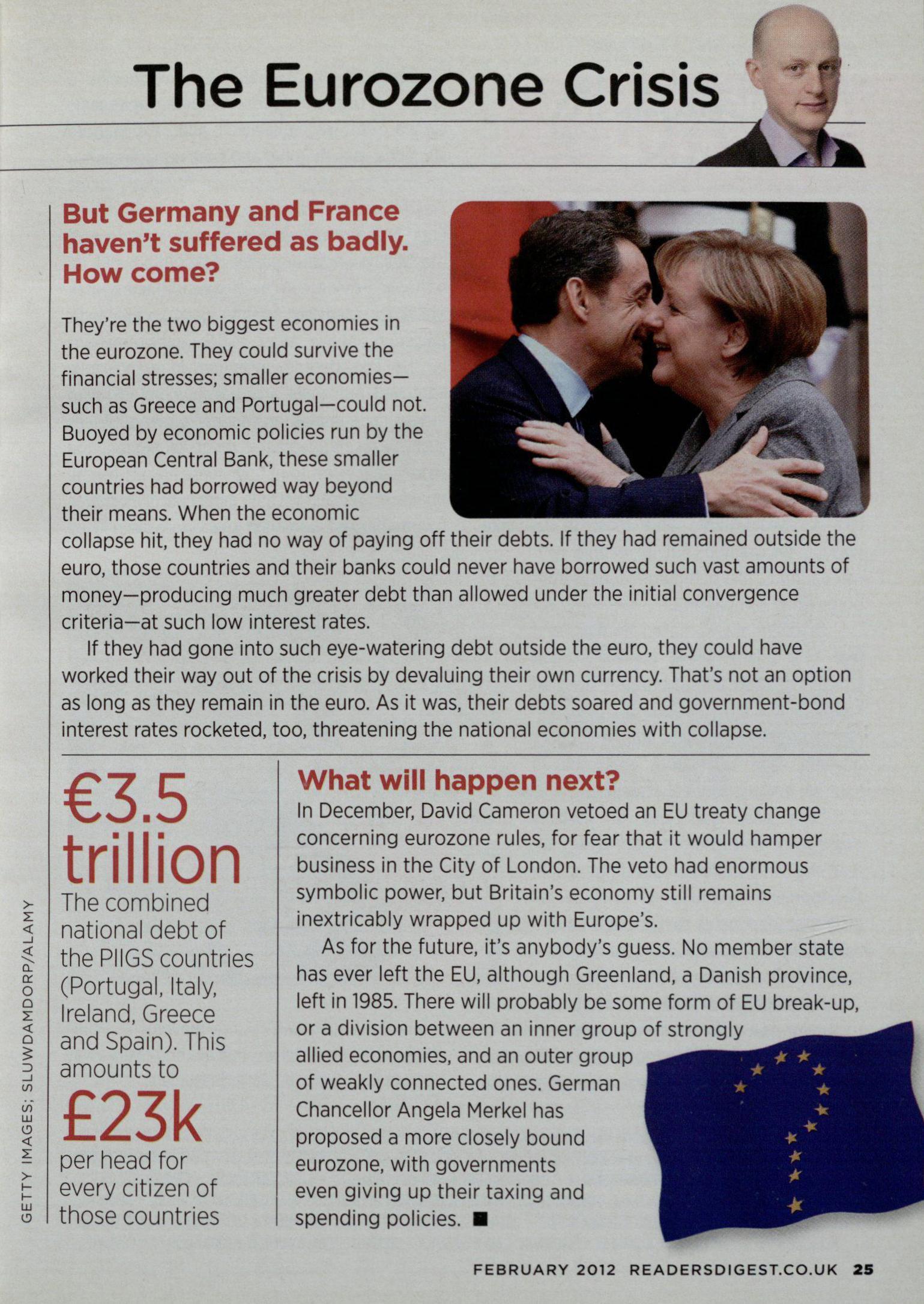
What will happen next?
In December, David Cameron vetoed an EU treaty change concerning eurozone rules, for fear that it would hamper business in the City of London. The veto had enormous symbolic power, but Britain's economy still remains inextricably wrapped up with Europe's.
As for the future, it's anybody's guess. No member state has ever left the EU, although Greenland, a Danish province, left in 1985. There will probably be some form of EU break-up, or a division between an inner group of strongly allied economies, and an outer group of weakly connected ones. German Chancellor Angela Merkel has proposed a more closely bound eurozone, with governments even giving up their taxing and spending policies. ■
GETTY IM AGES; SLUWDA MDO RP/ALAMY
FEBRUARY 2012 READERSDIGEST.CO.UK 25
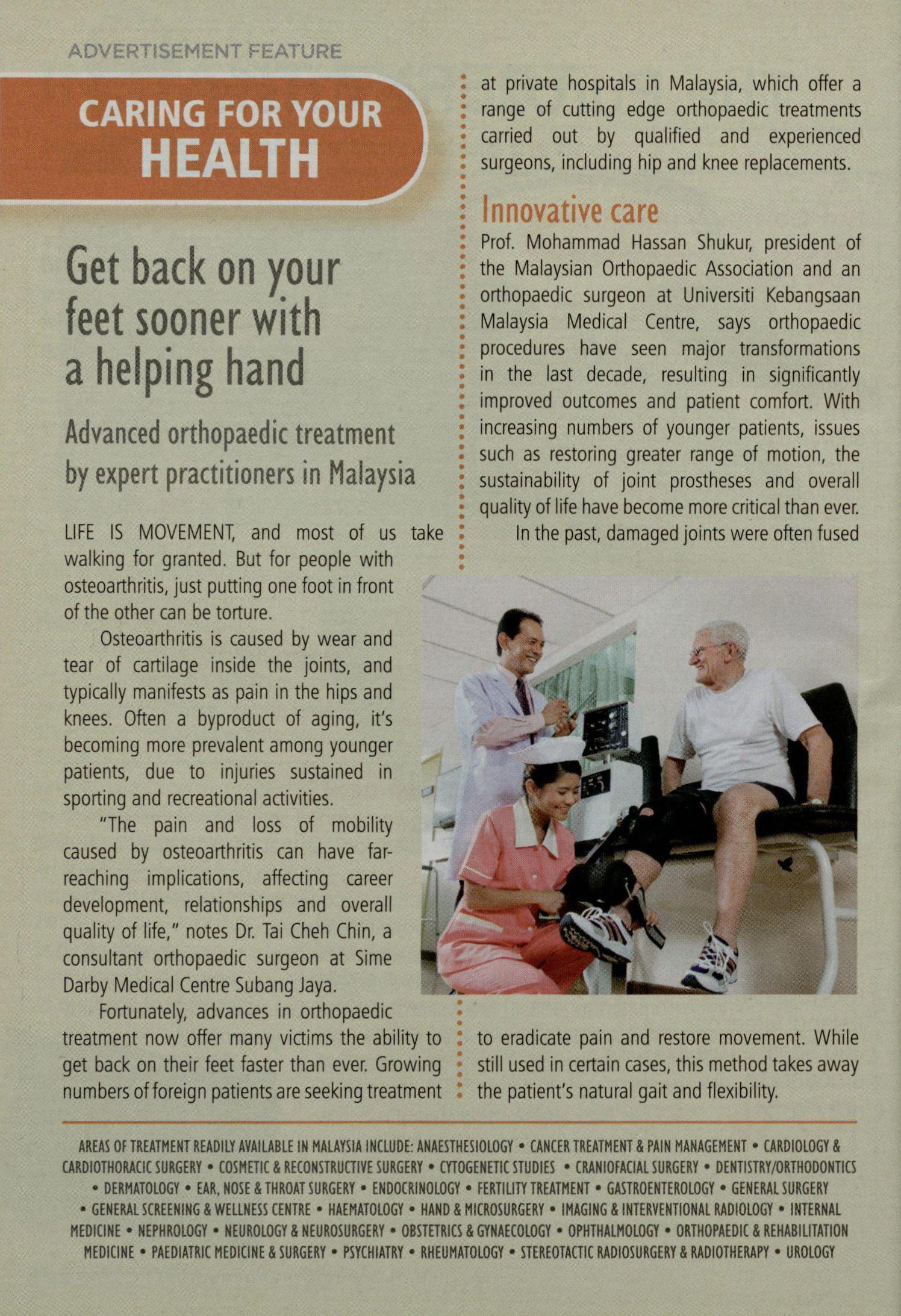
CARING FOR YOUR HEALTH
Get
back on your feet sooner with a helping hand
Advanced orthopaedic treatment by expert practitioners in Malaysia
LIFE IS MOVEMENT, and most of us take walking for granted. But for people with osteoarthritis, just putting one foot in front of the other can be torture.
Osteoarthritis is caused by wear and tear of cartilage inside the joints, and typically manifests as pain in the hips and knees. Often a byproduct of aging, it's becoming more prevalent among younger patients, due to injuries sustained in sporting and recreational activities.
"The pain and loss of mobility caused by osteoarthritis can have farreaching implications, affecting career development, relationships and overall quality of life," notes Dr. Tai Cheh Chin, a consultant orthopaedic surgeon at Sime Darby Medical Centre Subang Jaya.
Fortunately, advances in orthopaedic treatment now offer many victims the ability to get back on their feet faster than ever. Growing numbers of foreign patients are seeking treatment
at private hospitals in Malaysia, which offer a range of cutting edge orthopaedic treatments carried out by qualified and experienced surgeons, including hip and knee replacements.
Innovative care
Prof. Mohammad Hassan Shukur, president of the Malaysian Orthopaedic Association and an orthopaedic surgeon at Universiti Kebangsaan Malaysia Medical Centre, says orthopaedic procedures have seen major transformations in the last decade, resulting in significantly improved outcomes and patient comfort. With increasing numbers of younger patients, issues such as restoring greater range of motion, the sustainability of joint prostheses and overall quality of life have become more critical than ever. In the past, damaged joints were often fused to eradicate pain and restore movement. While still used in certain cases, this method takes away the patient's natural gait and flexibility.
AREASOETREATMENTREADILYAVAILABLEINMALAYSIAINCLUDE:ANAESTHESIOLOGY
ADVERTISEN1EN FE TURE
•CANCER
•CARDIOLOGY
•
•CYTOGENETIC
•CRANIOFACIAL
•DENTISTRY/ORTHODONTICS • DERMATOLOGY•EAR,
&
•ENDOCRINOLOGY•FERTILITYTREATMENT•GASTROENTEROLOGY•GENERALSURGERY • GENERALSCREENING&WELLNESSCENTRE•HAEMATOLOGY•HAND&MICROSURGERY•IMAGING&INTERVENTIONALRADIOLOGY•INTERNAL MEDICINE•NEPHROLOGY•NEUROLOGY&NEUROSURGERY•OBSTETRICS&GYNAECOLOGY•OPHTHALMOLOGY•ORTHOPAEDIC&REHABILITATION MEDICINE•PAEDIATRICMEDICINE&SURGERY•PSYCHIATRY•RHEUMATOLOGY•STEREOTACTICRADIOSURGERY&RADIOTHERAPY•UROLOGY
TREATMENT&PAINMANAGEMENT
& CARDIOTHORACICSURGERY
COSMETIC&RECONSTRUCTIVESURGERY
STUDIES
SURGERY
NOSE
THROATSURGERY
"Today, innovations such as joint resurfacing arthroplasty not only allow patients to get up on their feet the day after surgery, but also enable a full range of motion, including the ability to squat," says Dr. Gobinder Singh, a consultant orthopaedic surgeon at Pantai Hospital Kuala Lumpur. This procedure also results in less bone loss, and so is ideal for patients who may need a followup surgery 10 to 15 years down the road to replace an expiring prosthesis. Dr. Singh is also working on a promising experimental treatment involving stem cell transplants in order to rejuvenate and regrow cartilage cells.
Many hospitals feature high-tech equipment to facilitate orthopaedic procedures. Malaysia's largest private healthcare group, KPJ Healthcare, recently inaugurated a digital operating theatre at its KR1 Tawakal Specialist Hospital in downtown

Kuala Lumpur, which includes a computerassisted navigation system to help surgeons conduct surgery with greater accuracy.
The affordability of orthopaedic treatments in Malaysia, particularly for total joint replacement, along with short waiting times are key attractions
FACT In 2010, some 380,000 foreign patients visited Malaysia for medical care. Most came for cardiac and orthopaedic treatments, plastic and dental surgery, fertility treatments and health screening. There are 49 private hospitals and healthcare facilities registered under the Malaysia Healthcare umbrella to provide services to foreign patients.
HQuaIlly HEALTHCARE
A patient seeking orthopaedic treatment should correspond with his intended surgeon in advance of travelling to Malaysia, and involve his home doctor. "This helps ensure that when you arrive there are no surprises with regard to the chosen treatment, its costs and the supporting logistics," explains Dr. Tai. Your hospital can also care for your peace of mind
for foreign patients, notes Prof. Hassan. "For example, we see many patients from Australia because the waiting list for knee surgery there can be 12 to 18 months long," he says. "It also helps that our costs are lower than those of other medical tourism destinations."
arrange a convenient and seamless transfer from the airport to your point of care.
After surgery, the patient will be closely monitored by the surgeon for about a week at the hospital, and physiotherapy will be carried out to strengthen the joints and prevent muscle dystrophy before you return home.
If someone you know is in need of orthopaedic treatment, consider looking to Malaysia's hospitals and doctors for prompt and affordable treatment solutions that will not only get you back on your feet, but may well put a spring in your step at the same time.
For more information about Malaysia Healthcare, visit www.myhealthcare.gov.my
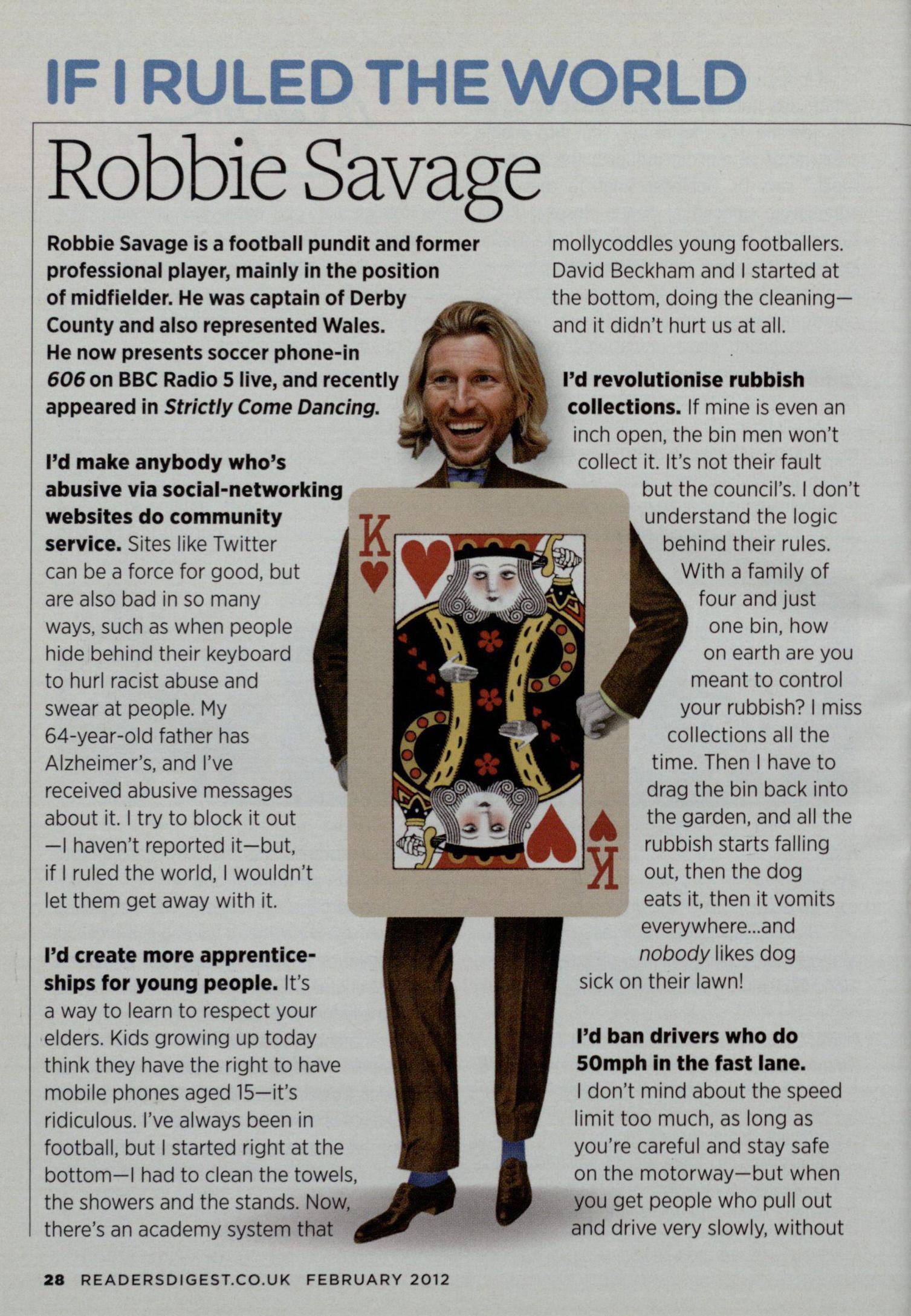
IF Robbie Savage
Robbie Savage is a football pundit and former professional player, mainly in the position of midfielder. He was captain of Derby County and also represented Wales. He now presents soccer phone-in 606 on BBC Radio 5 live, and recently appeared in Strictly Come Dancing.
I'd make anybody who's abusive via social-networking websites do community service. Sites like Twitter can be a force for good, but are also bad in so many ways, such as when people hide behind their keyboard to hurl racist abuse and swear at people. My 64-year-old father has Alzheimer's, and I've received abusive messages about it. I try to block it out —I haven't reported it—but, if I ruled the world, I wouldn't let them get away with it.
I'd create more apprenticeships for young people. Its a way to learn to respect your elders. Kids growing up today think they have the right to have mobile phones aged 15—it's ridiculous. I've always been in football, but I started right at the bottom—I had to clean the towels, the showers and the stands. Now, there's an academy system that
mollycoddles young footballers. David Beckham and I started at the bottom, doing the cleaning— and it didn't hurt us at all.
I'd revolutionise rubbish collections. If mine is even an inch open, the bin men won't collect it. It's not their fault but the council's. I don't understand the logic behind their rules. With a family of four and just one bin, how on earth are you meant to control your rubbish? I miss collections all the time. Then I have to drag the bin back into the garden, and all the rubbish starts falling out, then the dog eats it, then it vomits everywhere...and nobody likes dog sick on their lawn!
I'd ban drivers who do 50mph in the fast lane.
I don't mind about the speed limit too much, as long as you're careful and stay safe on the motorway—but when you get people who pull out and drive very slowly, without
28 READERSDIGEST.CO.UK FEBRUARY 2012
ever looking in their mirrors, it's dangerous. And if you cut inside them to undertake, you're the one who can get punished.
I'd make football referees come out after a game and explain their decisions. Managers and players have to do it, so I'd make sure that, every single week, refs did the same. When I played, I used to get booked left, right and centre— sometimes for no apparent reason. I was once booked by Graham Poll in a match against Bolton, when one of their players kicked the ball out of play. Poll gave it to Bolton. The whole crowd started laughing, so I pointed out that even the other team's supporters found his decision ridiculous—and he gave me a yellow card.
The choices refs make affect fans and have an even bigger impact on players, so they should be held accountable. At the moment, they can just swan off after the match and get on with their lives.
I'd ban vapid reality television shows. The ones that feature celebrities who've earned their spot are alright, and I'd still allow those that promote talent, such
tt David Beckham and I started at the bottom, doing the cleaning —and it didn't hurt us at all
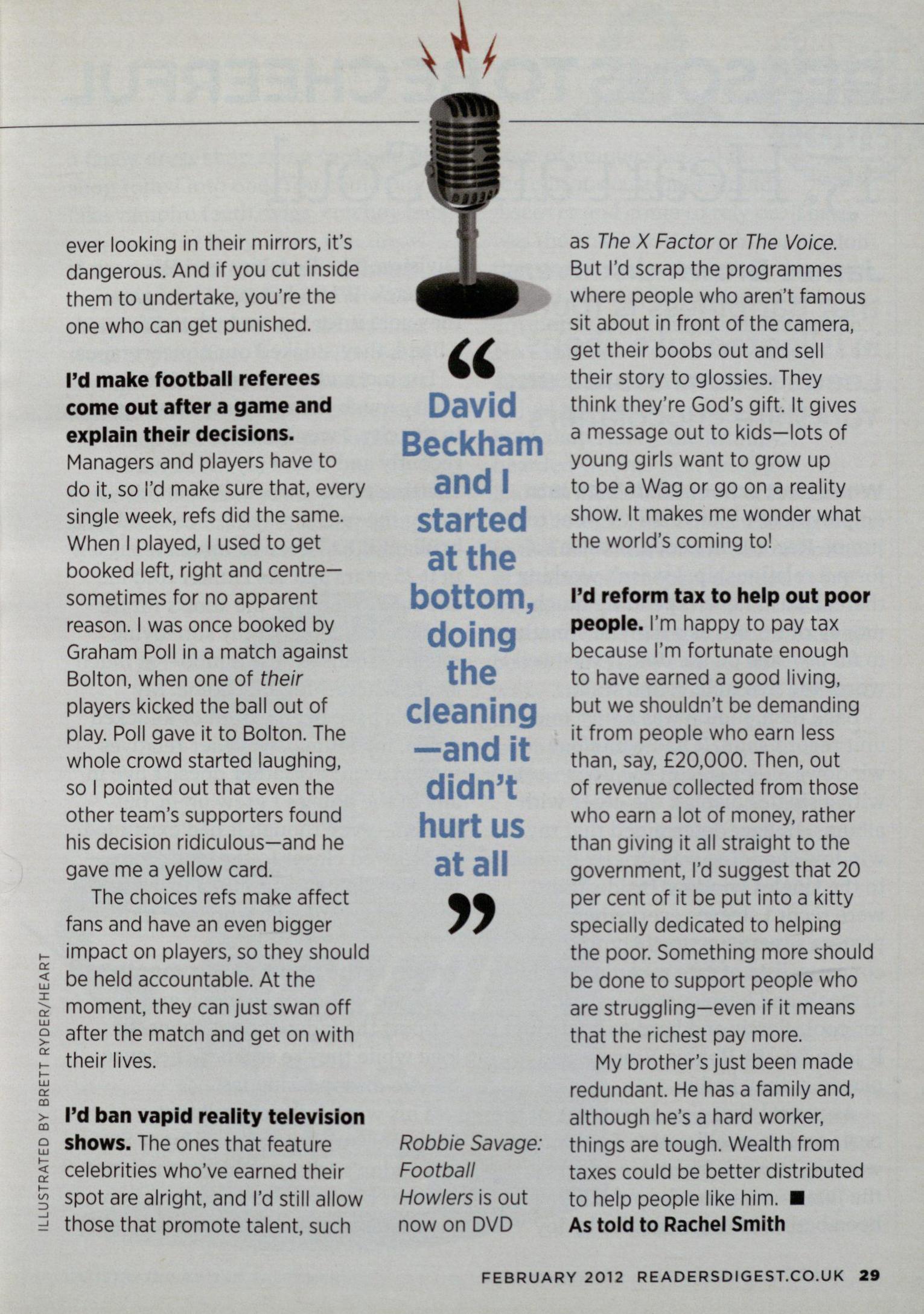
Howlers is out now on DVD
as The X Factor or The Voice. But I'd scrap the programmes where people who aren't famous sit about in front of the camera, get their boobs out and sell their story to glossies. They think they're God's gift. It gives a message out to kids—lots of young girls want to grow up to be a Wag or go on a reality show. It makes me wonder what the world's coming to!
I'd reform tax to help out poor people. I'm happy to pay tax because I'm fortunate enough to have earned a good living, but we shouldn't be demanding it from people who earn less than, say, £20,000. Then, out of revenue collected from those who earn a lot of money, rather than giving it all straight to the government, I'd suggest that 20 per cent of it be put into a kitty specially dedicated to helping the poor. Something more should be done to support people who are struggling—even if it means that the richest pay more. My brother's just been made redundant. He has a family and, although he's a hard worker, things are tough. Wealth from taxes could be better distributed to help people like him. •
As told to Rachel Smith
ILLU STRATED B Y BRETT R YDE R/ HEART
Robbie Savage: Football
FEBRUARY 2012 READERSDIGEST.CO.UK 29
))

REASONS TO BE CHEERFUL 15. Heart and Soul
James Brown discov that happiness is found in Islington joke shops, Leeds record stores and Yorkshire chocolatiers
When I left school I didn't go into employment or university. I went to Jumbo Records in Leeds. It wasn't a formal relationship. I wasn't working there. I wasn't even spending much money there, but as a daily destination to fill my time on the dole it was well worth the five-mile-round walk.
Back then, Jumbo was a tiny, oneunit record shop. It had white bay windows either side of the door—one with a singles display, the other with albums. Budget determined that my window shopping was strictly limited to the singles window. Inside, there were record sleeves everywhere, posters advertising forthcoming concerts, lists of rare records they had in stock, and keen customers asking for cool, classic and hard-to-find vinyl. If John Peel or Robbie Vincent had played it, they had it.
As record shops go, it was one of the best. And as an education for someone wanting to work for music papers, the Jumbo soundtrack couldn't have been better. I bought singles by Joy
Division, The Redskins and Womack & Womack. When I created a fanzine, they sold it for me, and when I formed a band, they stocked our concert tapes.
For me, and many others, it was pretty much the most important place in the city. I went back to Leeds recently and found myself in Jumbo chatting to the owner, Hunter. Listening to the music playing, I realised how brilliant it had been to immerse myself in it 25 years ago. As Hunter told me about the plans for the shop's future and I told him about my son loving music, I realised that Jumbo—as much as anywhere—felt like home. My schools have been closed or knocked down, my mum died, other relatives moved away, my father doesn't live in any of the houses I grew up in, but Jumbo—even though it had expanded and moved closer to the city centre— was the same. It was still a thriving space run by people who love music.
Which is the point of this month's column: we should cherish and support the independent shops we love while they're still here because they're disappearing fast.
This week I discovered that Preposterous Presents in Upper Street in London's Islington had turned into another blasted pine furniture shop. Preposterous Presents was a joke shop,
30 READERSDIGEST.CO.UK FEBRUARY 2012
a fancy dress shop and a card and gift shop rolled into one. You could buy fake vampire teeth, wigs, cowboy hats, snappers that bang when you throw them on the floor, and pretty much anything you need for a children's party, a festival, or a day disrupting work at the office. It had a little card saying it had been there for 25 years, and the owner took great pride in all his cheap and cheerful products.
Over the last few years I've been disappointed to find this happening again and again: the steady disappear-
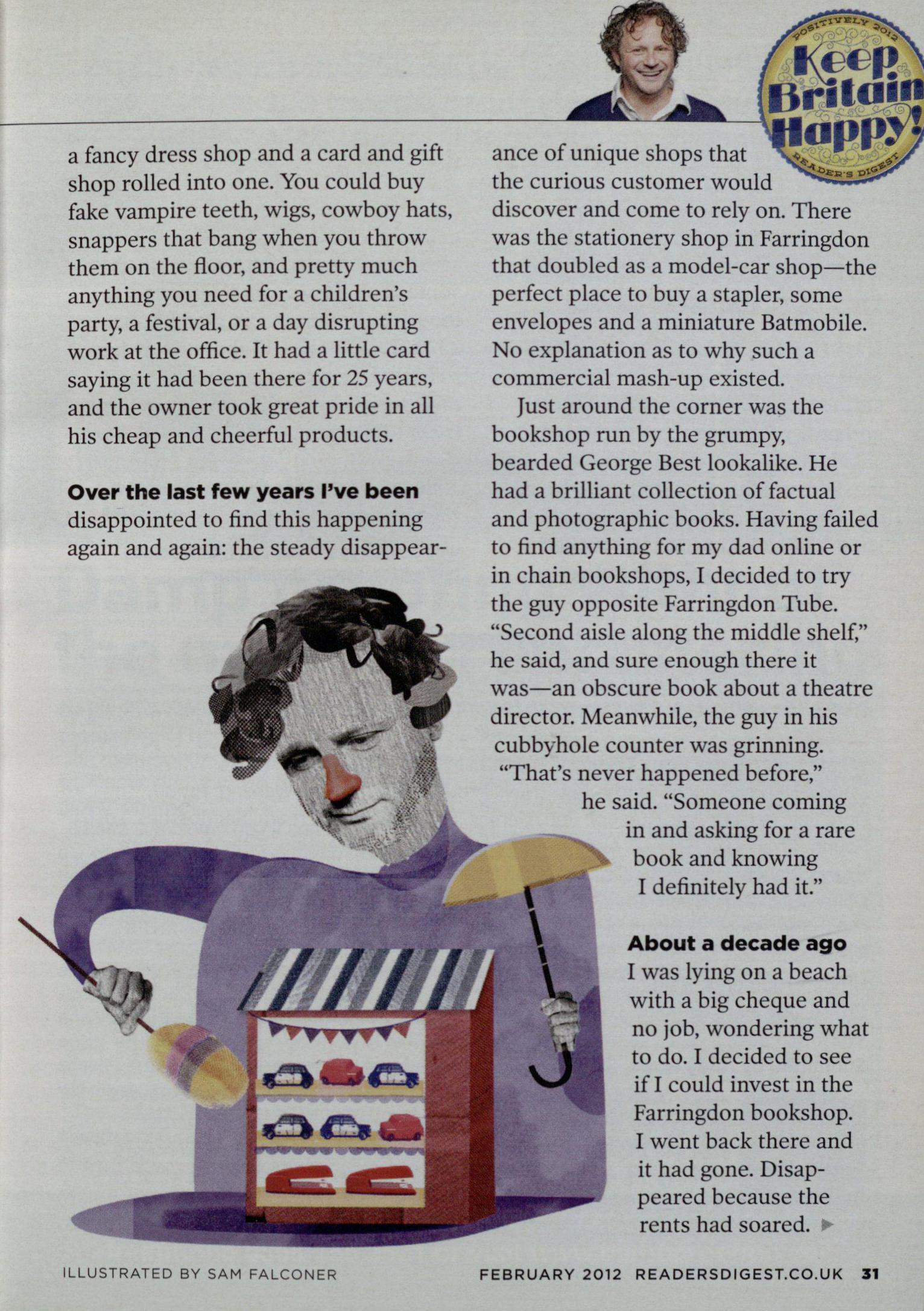
ance of unique shops that the curious customer would discover and come to rely on. There was the stationery shop in Farringdon that doubled as a model-car shop—the perfect place to buy a stapler, some envelopes and a miniature Batmobile. No explanation as to why such a commercial mash-up existed.
Just around the corner was the bookshop run by the grumpy, bearded George Best lookalike. He had a brilliant collection of factual and photographic books. Having failed to find anything for my dad online or in chain bookshops, I decided to try the guy opposite Farringdon Tube. "Second aisle along the middle shelf," he said, and sure enough there it was—an obscure book about a theatre director. Meanwhile, the guy in his cubbyhole counter was grinning. "That's never happened before," he said. "Someone coming in and asking for a rare book and knowing I definitely had it."
About a decade ago I was lying on a beach with a big cheque and no job, wondering what to do. I decided to see if I could invest in the Farringdon bookshop. I went back there and it had gone. Disappeared because the rents had soared. ►
OrKeepdain p tifV 0..04
FEBRUARY 2 012 READERSDIGEST.CO.UK 31 ILLUSTRATED BY SAM FALCONER
gg We should be proud of our nation of small shopkeepers, especially those that go out of their way to inject some care, passion and personality ),
AI Last autumn, in Filey, North Yorkshire, where they filmed the TV series Sugartown, I was horrified to discover Sterchi's, a tiny chocolate retailer with an accompanying bread shop (my late mum's favourite) had shut down. After she had died I'd had a strange psychic experience in there, and now people were walking past, shocked and muttering. Only later did we discover that it was just the bread shop that had closed—the chocolate shop had moved round the corner. All of these examples made me
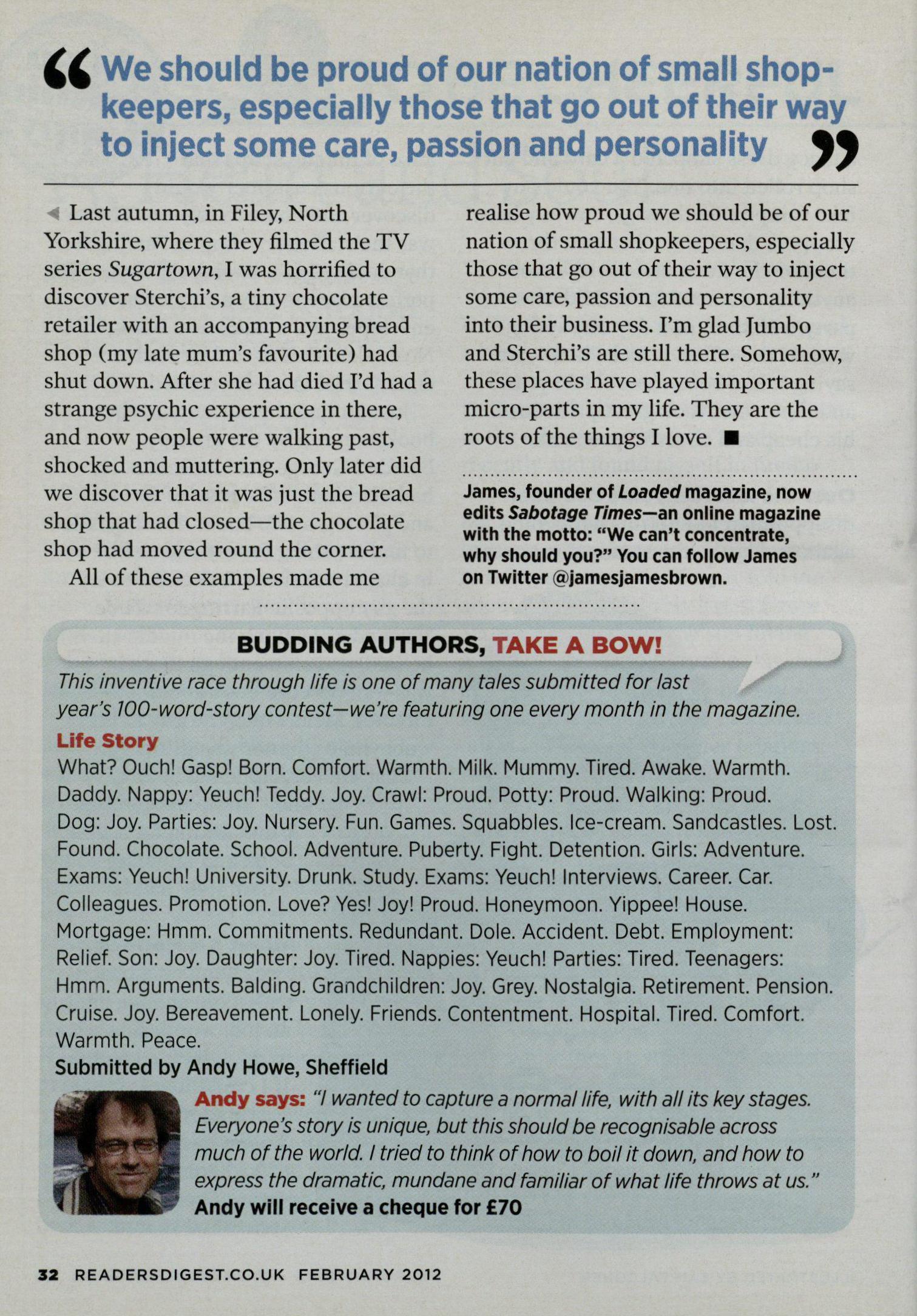
realise how proud we should be of our nation of small shopkeepers, especially those that go out of their way to inject some care, passion and personality into their business. I'm glad Jumbo and Sterchi's are still there. Somehow, these places have played important micro-parts in my life. They are the roots of the things I love. ■
James, founder of Loaded magazine, now edits Sabotage Times—an online magazine with the motto: "We can't concentrate, why should you?" You can follow James on Twitter @jamesjamesbrown.
BUDDING AUTHORS, TAKE A BOW!
This inventive race through life is one of many tales submitted for last year's 100-word-story contest—we're featuring one every month in the magazine.
Life Story
What? Ouch! Gasp! Born. Comfort. Warmth. Milk. Mummy. Tired. Awake. Warmth. Daddy. Nappy: Yeuch! Teddy. Joy. Crawl: Proud. Potty: Proud. Walking: Proud. Dog: Joy. Parties: Joy. Nursery. Fun. Games. Squabbles. Ice-cream. Sandcastles. Lost. Found. Chocolate. School. Adventure. Puberty. Fight. Detention. Girls: Adventure. Exams: Yeuch! University. Drunk. Study. Exams: Yeuch! Interviews. Career. Car. Colleagues. Promotion. Love? Yes! Joy! Proud. Honeymoon. Yippee! House. Mortgage: Hmm. Commitments. Redundant. Dole. Accident. Debt. Employment: Relief. Son: Joy. Daughter: Joy. Tired. Nappies: Yeuch! Parties: Tired. Teenagers: Hmm. Arguments. Balding. Grandchildren: Joy. Grey. Nostalgia. Retirement. Pension. Cruise. Joy. Bereavement. Lonely. Friends. Contentment. Hospital. Tired. Comfort. Warmth. Peace.
Submitted by Andy Howe, Sheffield
Andy says: "I wanted to capture a normal life, with all its key stages. Everyone's story is unique, but this should be recognisable across much of the world. I tried to think of how to boil it down, and how to express the dramatic, mundane and familiar of what life throws at us."
Andy will receive a cheque for £70
32 READERSDIGEST.CO.UK FEBRUARY 2012
Damp proofing without the mess of replastering
DAMP is a creeping menace that affects thousands of homes across the UK.
It rots woodwork and carpets, peels wallpaper and causes fungus and mould growth on walls.
These symptoms might come and go with our changable weather but damp needs to be tackled before it causes further damage. By acting now you will help your home to dry out — protecting it and preserving it for the future.
Holland Damp Proofing is a breath of fresh air that can permanently rid your home of the scourge of damp. No chemicals, no mess and no replastering — your property dries out... and stays dry for good. The idea is simple: draw out the moisture and the damp will disappear!
The Holland Damp Proof System® involves a series of small damp-regulating bricks which neatly fit into specially prepared niches

in the external walls of your home, close to the ground.
These cleverly allow air to flow into the brick chambers and out again — circulating airflow through the inside of the wall which evaporates the moisture, drying out the wall and allowing it to breathe.
Holland's no-chemicals system is messfree, and as the work is completed from the outside, there is no need to replaster. It can be used on most types of wall (including stone) at ground level.
And we are so confident that it works — we'll give you a 20 year guarantee, so you can have total peace of mind.
Iolland Damp Proofing Contact Holland Damp Proofing on freephone 0808 155 2571 or visit www.dampproofing.com
The journey is just the start
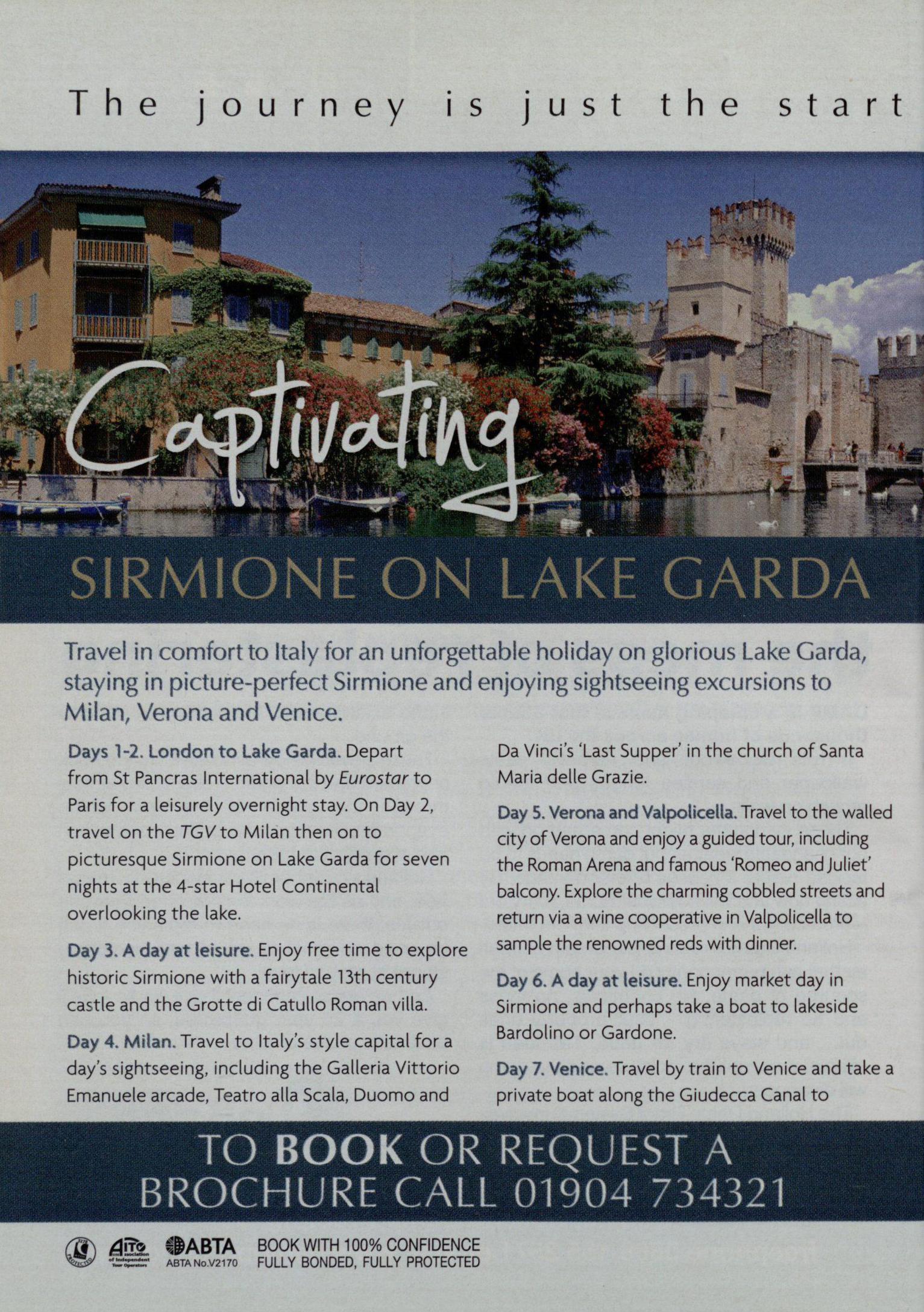
Travel in comfort to Italy for an unforgettable holiday on glorious Lake Garda, staying in picture-perfect Sirmione and enjoyingsightseeing excursions to Milan, Verona and Venice.
Days 1-2. London to Lake Garda. Depart from St Pancras International by Eurostar to Paris for a leisurely overnight stay. On Day 2, travel on the TGV to Milan then on to picturesque Sirmione on Lake Garda for seven nights at the 4-star Hotel Continental overlooking the lake.
Day 3. A day at leisure. Enjoy free time to explore historic Sirmione with a fairytale 13th century castle and the Grotte di Catullo Roman villa.
Day 4. Milan.Travel to Italy's style capital for a day's sightseeing, including the Galleria Vittorio Emanuele arcade, Teatro alla Scala, Duomo and
Da Vinci's 'Last Supper' in the church of Santa Maria delle Grazie.
Day 5. Verona and Valpolicella.Travel to the walled city of Verona and enjoy a guided tour, including the Roman Arena and famous 'Romeo and Juliet' balcony. Explore the charming cobbled streets and return via a wine cooperative in Valpolicella to sample the renowned reds with dinner.
Day 6. A day at leisure. Enjoy market day in Sirmione and perhaps take a boat to lakeside Bardolino or Gardone.
Day 7. Venice. Travel by train to Venice and take a private boat along the Giudecca Canal to
TO BOOK OR REQUEST A BROCHURE CALL 01904 734321 ®A GABTA BOOK WITH 100% CONFIDENCE ABTANoV2170 FULLY BONDED, FULLY PROTECTED
GREAT RAIL JOUR NEYS THE COLLECTION
First Class rail and coach travel as described
9 nights' hotel accommodation with breakfast each day
3 full-day excursions to Milan, Verona and Venice including a guided tour
Leonardo da Vinci's 'Last Supper' qtr
Dinner and wine at a local 'agriturismo' wine cooperative in Valpolicella
5 further dinners

• of the otkeeAre
magnificent St Mark's Square. See iconic sights on a walking tour and enjoy an afternoon exploring at leisure.
Day 8. Malcesine. See the 14th century Scaligeri Castle on a guided tour through the cobbled streets and pastel-painted houses of lakeside Malcasine, leaving free time to take the spectacular Monte Baldo cable car. Return by boat, passing charming lakeside towns.
Days 9-10. Home.Travel through Italy and Switzerland to Dijon for an overnight stay. On Day 10, we continue to Paris and join the Eurostar to London.
Coach excursion to Malcesine including a guided tour
Boat cruise on Lake Garda from Malcesine to Sirmione
All transfers
Accompanied by a professional Tour Manager
26 departures between 25 March and 21 October 2012
10 day holiday from £1,475
YOU SIMPLY COULDN'T PUT SUCH INCLUSIVE HOLIDAYS TOGETHER YOURSELF FOR LESS
www.GreatRail.com OPEN 7 DAYS A WEEK
sharing. Terms and conditions apply.
Dates and prices are subject to availability. Prices shown are per person based on 2
TOne minute he's an Edwardian earl in Downton; the next, in biblical times as Pontius Pilate in Ben Hur. Soon he'll be bang up-to-date in Twenty Twelve. Where (and when) will Hugh Bonneville go next?
Thei
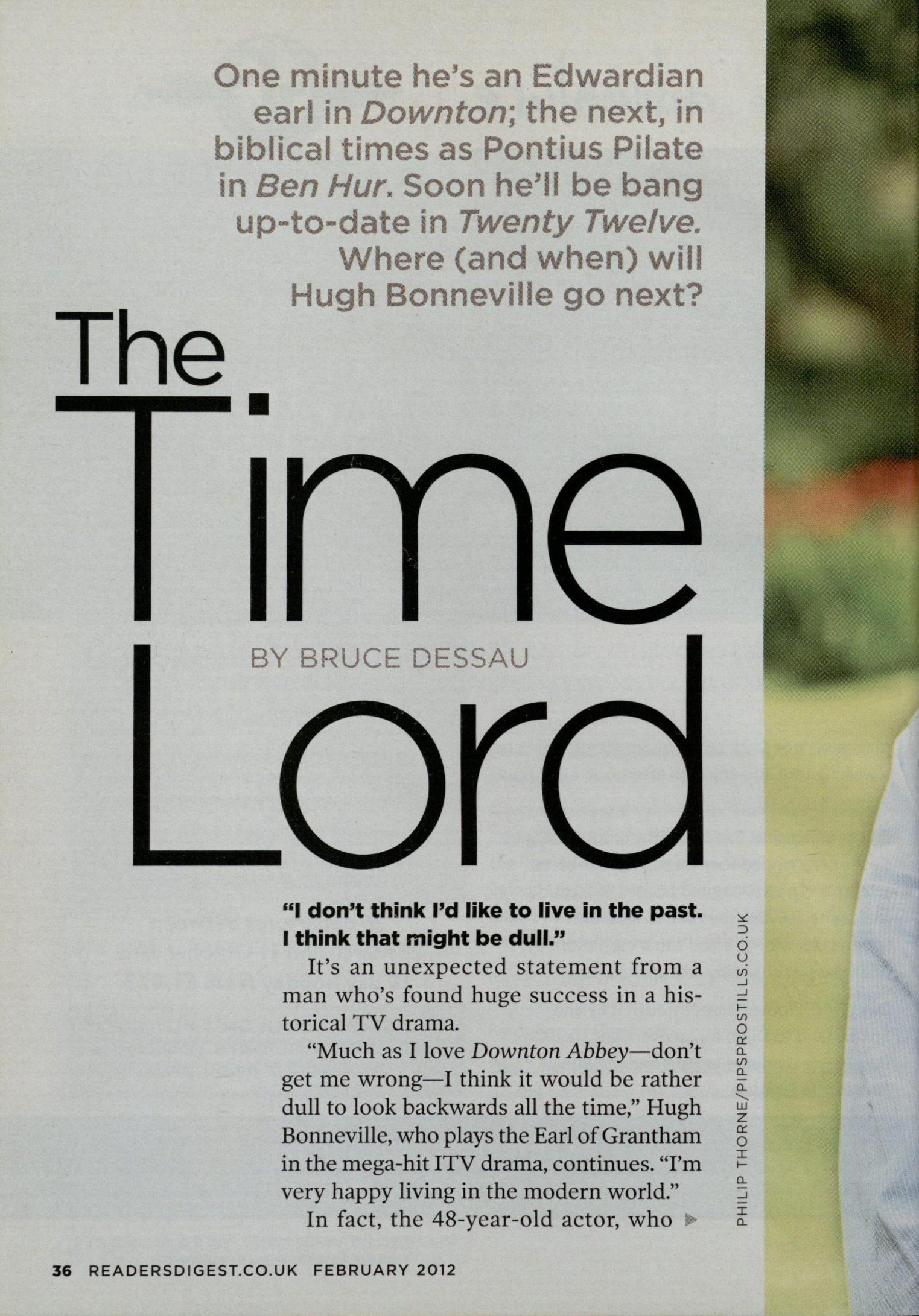 eBY BRUCE DESSAu
eBY BRUCE DESSAu
"I don't think I'd like to live in the past. I think that might be dull."
It's an unexpected statement from a man who's found huge success in a historical TV drama.
"Much as I love Downton Abbey—don't get me wrong—I think it would be rather dull to look backwards all the time," Hugh Bonneville, who plays the Earl of Grantham in the mega-hit ITV drama, continues. "I'm very happy living in the modern world."
In fact, the 48-year-old actor, who
L
I
36 READERSDIGEST.CO.UK FEBRUARY 2012
PHILI P T HORNE/ PI PS PROSTILL S. CO. UK
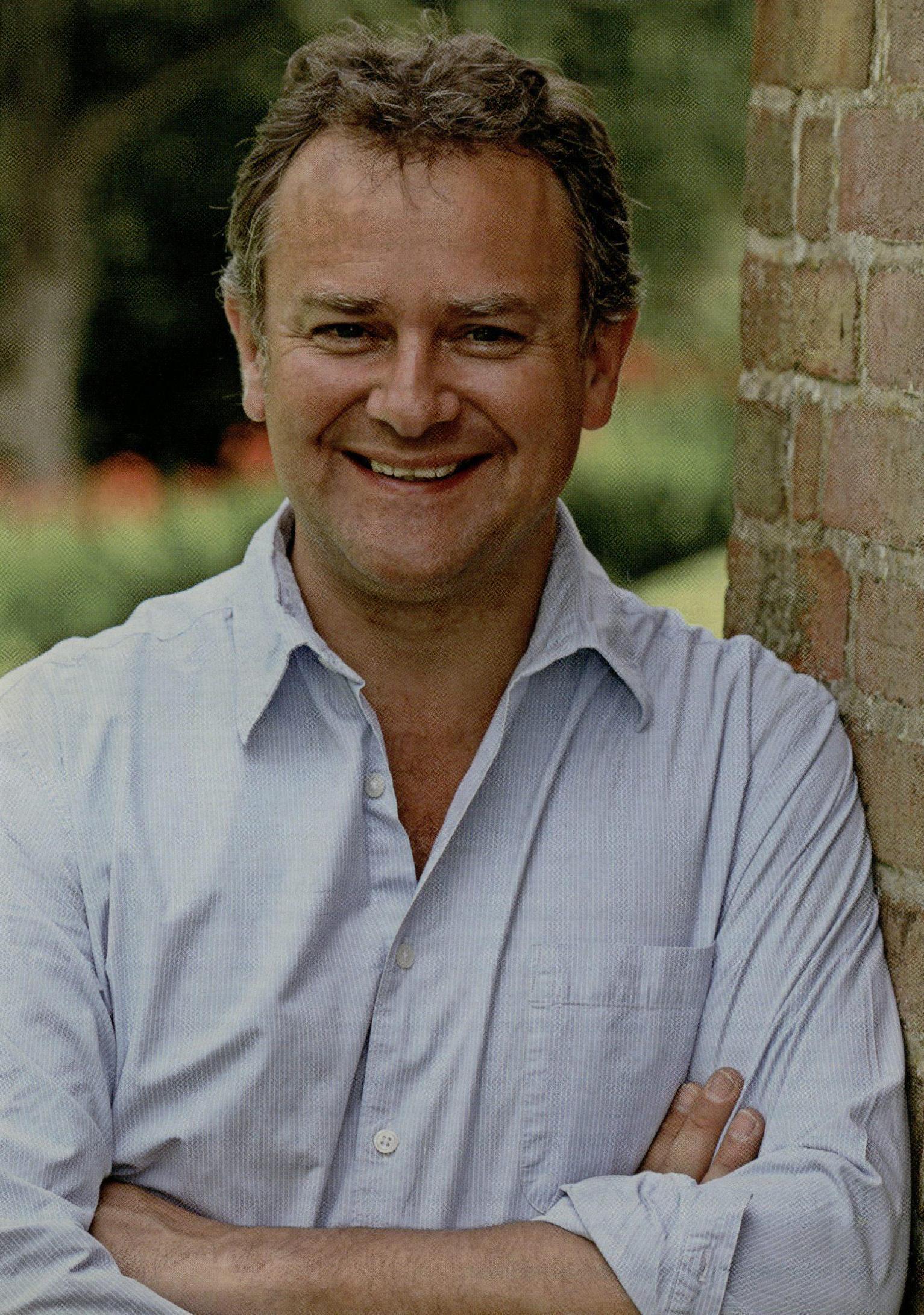
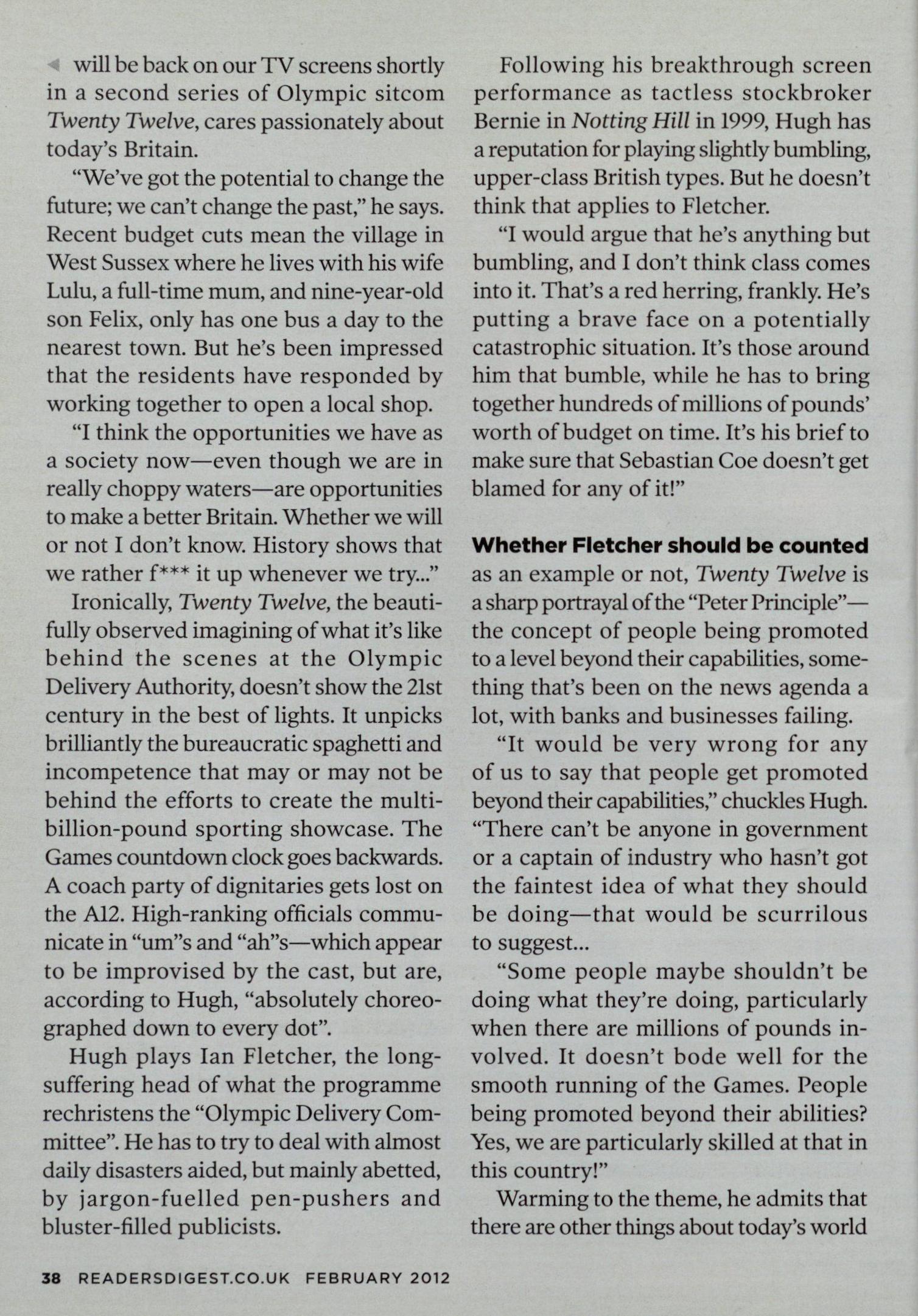
will be back on our TV screens shortly in a second series of Olympic sitcom Twenty Twelve, cares passionately about today's Britain.
"We've got the potential to change the future; we can't change the past," he says. Recent budget cuts mean the village in West Sussex where he lives with his wife Lulu, a full-time mum, and nine-year-old son Felix, only has one bus a day to the nearest town. But he's been impressed that the residents have responded by working together to open a local shop.
"I think the opportunities we have as a society now—even though we are in really choppy waters—are opportunities to make a better Britain. Whether we will or not I don't know. History shows that we rather f*** it up whenever we try..."
Ironically, Twenty Twelve, the beautifully observed imagining of what it's like behind the scenes at the Olympic Delivery Authority, doesn't show the 21st century in the best of lights. It unpicks brilliantly the bureaucratic spaghetti and incompetence that may or may not be behind the efforts to create the multibillion-pound sporting showcase. The Games countdown clock goes backwards. A coach party of dignitaries gets lost on the Al2. High-ranking officials communicate in "um"s and "ah"s—which appear to be improvised by the cast, but are, according to Hugh, "absolutely choreographed down to every dot".
Hugh plays Ian Fletcher, the longsuffering head of what the programme rechristens the "Olympic Delivery Committee". He has to try to deal with almost daily disasters aided, but mainly abetted, by jargon-fuelled pen-pushers and bluster-filled publicists.
Following his breakthrough screen performance as tactless stockbroker Bernie in Notting Hill in 1999, Hugh has a reputation for playing slightly bumbling, upper-class British types. But he doesn't think that applies to Fletcher.
"I would argue that he's anything but bumbling, and I don't think class comes into it. That's a red herring, frankly. He's putting a brave face on a potentially catastrophic situation. It's those around him that bumble, while he has to bring together hundreds of millions of pounds' worth of budget on time. It's his brief to make sure that SebastianCoe doesn't get blamed for any of it!"
Whether Fletcher should be counted as an example or not, Twenty Twelve is a sharp portrayal of the "Peter Principle"— the concept of people being promoted to a level beyond their capabilities, something that's been on the news agenda a lot, with banks and businesses failing.
"It would be very wrong for any of us to say that people get promoted beyond their capabilities," chuckles Hugh. "There can't be anyone in government or a captain of industry who hasn't got the faintest idea of what they should be doing—that would be scurrilous to suggest...
"Some people maybe shouldn't be doing what they're doing, particularly when there are millions of pounds involved. It doesn't bode well for the smooth running of the Games. People being promoted beyond their abilities? Yes, we are particularly skilled at that in this country!"
Warming to the theme, he admits that there are other things about today's world
38 READERSDIGEST.CO.UK FEBRUARY 2012
that frustrate him. Particularly his broadband coverage. "I was in Liberia [he's a patron of medical-aid charity Merlin] and I had fantastic broadband. You scratch the skirting board here and there are still mice behind it."
Literally or symbolically? "I remember being in a really smart Californian hotel
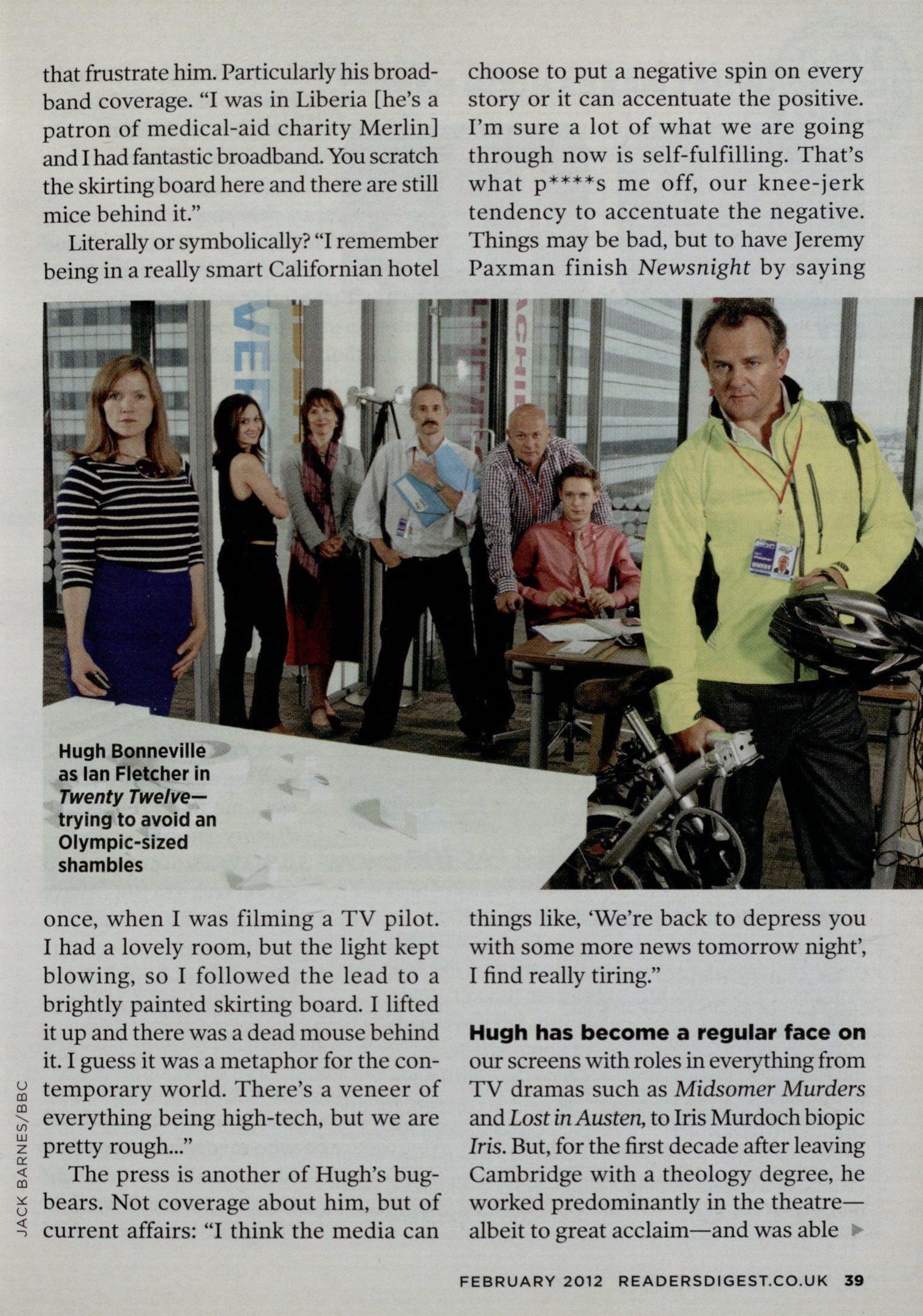
Hugh Bonneville as Ian Fletcher in Twenty Twelve— trying to avoid an Olympic-sized shambles
once, when I was filming a TV pilot. I had a lovely room, but the light kept blowing, so I followed the lead to a brightly painted skirting board. I lifted it up and there was a dead mouse behind it. I guess it was a metaphor for the contemporary world. There's a veneer of everything being high-tech, but we are pretty rough..."
The press is another of Hugh's bugbears. Not coverage about him, but of current affairs: "I think the media can
choose to put a negative spin on every story or it can accentuate the positive. I'm sure a lot of what we are going through now is self-fulfilling. That's what p****s me off, our knee-jerk tendency to accentuate the negative. Things may be bad, but to have Jeremy Paxman finish Newsnight by saying
things like, 'We're back to depress you with some more news tomorrow night', I find really tiring."
Hugh has become a regular face on our screens with roles in everything from TV dramas such as Midsomer Murders and Lost in Austen, to Iris Murdoch biopic Iris. But, for the first decade after leaving Cambridge with a theology degree, he worked predominantly in the theatre— albeit to great acclaim—and was able ►
J ACK BAR NE S/ BBC
FEBRUARY 2012 READERSDIGEST.CO.UK 39
WHAT MAKES HUGH HAPPY?
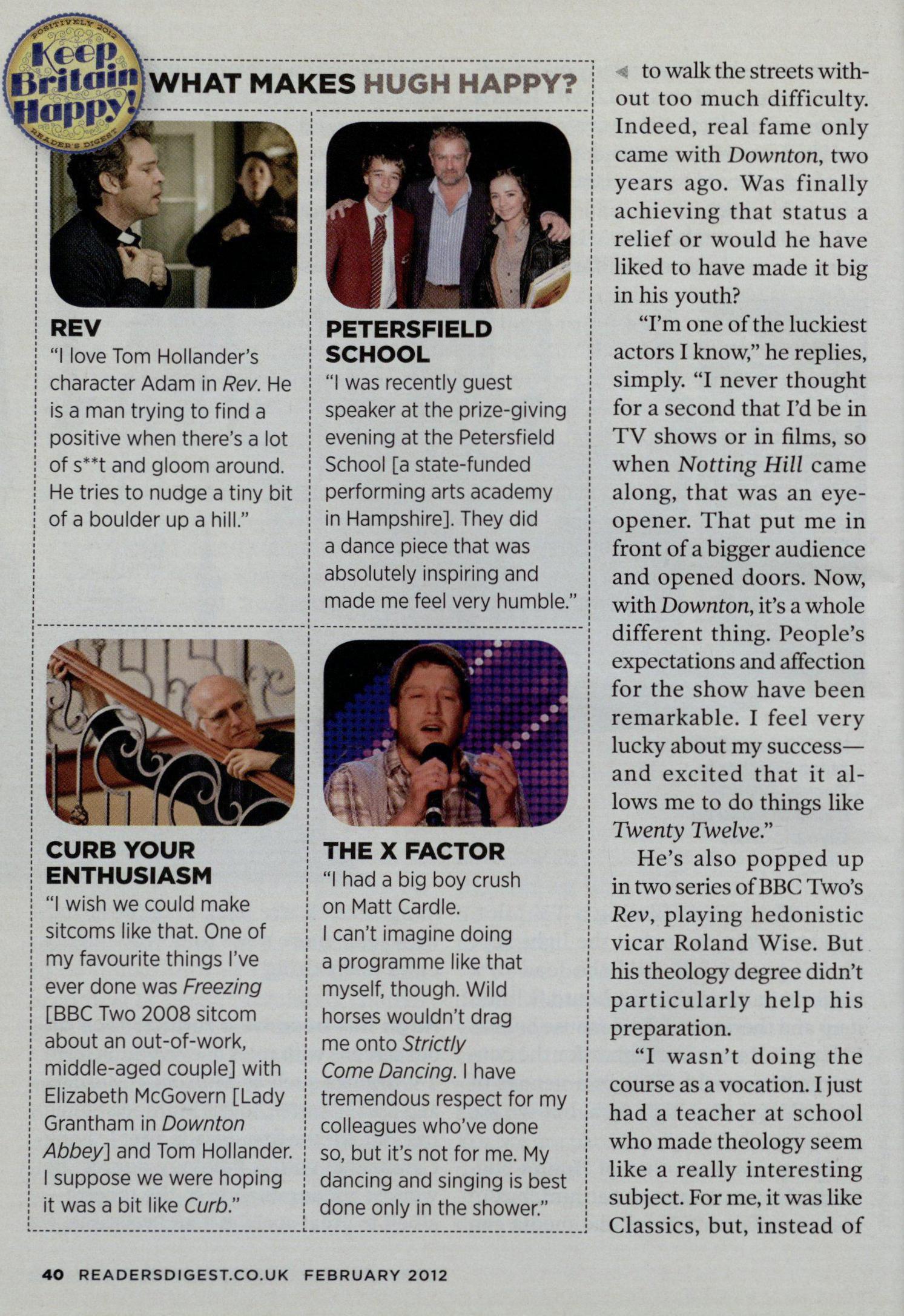
REV
"I love Tom Hollander's character Adam in Rev. He is a man trying to find a positive when there's a lot of s**t and gloom around. He tries to nudge a tiny bit of a boulder up a hill."
PETERSFIELD SCHOOL
"I was recently guest speaker at the prize-giving evening at the Petersfield School [a state-funded performing arts academy in Hampshire]. They did a dance piece that was absolutely inspiring and made me feel very humble."
to walk the streets without too much difficulty. Indeed, real fame only came with Downton, two years ago. Was finally achieving that status a relief or would he have liked to have made it big in his youth?
"I'm one of the luckiest actors I know," he replies, simply. "I never thought for a second that I'd be in TV shows or in films, so when Notting Hill came along, that was an eyeopener. That put me in front of a bigger audience and opened doors. Now, withDownton, it's a whole different thing. People's expectations and affection for the show have been remarkable. I feel very lucky about my success— and excited that it allows me to do things like Twenty Twelve."
CURB YOUR ENTHUSIASM
"I wish we could make sitcoms like that. One of my favourite things I've ever done was Freezing [BBC Two 2008 sitcom about an out-of-work, middle-aged couple] with Elizabeth McGovern [Lady Grantham in Downton Abbey] and Tom Hollander. I suppose we were hoping it was a bit like Curb."
THE X FACTOR
"I had a big boy crush on Matt Cardle. I can't imagine doing a programme like that myself, though. Wild horses wouldn't drag me onto Strictly Come Dancing. I have tremendous respect for my colleagues who've done so, but it's not for me. My dancing and singing is best done only in the shower."
He's also popped up in two series of BBC Two's Rev, playing hedonistic vicar Roland Wise. But his theology degree didn't particularly help his preparation.
"I wasn't doing the course as a vocation. I just had a teacher at school who made theology seem like a really interesting subject. For me, it was like Classics, but, instead of
40 READERSDIGEST.CO.UK FEBRUARY 2012
Greece and Ancient Rome, I was studying Israel and the Bible. I'm not a man of practising faith, but I still find the Bible, as a piece of literature, fascinating."
Last year, he sported an impressive beard as pirate Captain John Avery in Doctor Who and swashed his buckle so convincingly it seems he would make a pretty good Time Lord himself when Matt Smith decides to hang up his sonic screwdriver. Would that appeal?
"I don't think I've got the energy of someone like Matt, but I absolutely loved doing the show. The moment I arrived on the set, the director said, 'I know exactly what you want to do.' I nodded my head and they took me along this long corridor—and there was the Tardis. Seeing it was a childhood dream come true."
There does seem to be a tyranny of youth in time-travelling these days. Past Doctor Whos resembled eccentric uncles; today, they could be in boy bands. "I think that's a little unkind," says

Hugh, then concedes: "I grew up with William Hartnell, Jon Pertwee and Patrick Troughton... they've got gradually younger. TV can't have anybody over 35 any more!"
Age notwithstanding, Hugh's latest role could be his biggest yet, playing the eponymous lead in yet-to-be filmed movie The Return of Captain Nemo.
"I've done a few projects and a pilot in LA. I'm very happy to go there for work but I've got no long-term ambitions. But then I suppose that's what Hugh Laurie said and look where he is now. So never say never."
He recently played Pontius Pilate in ABC drama BenHur—broadcast on Channel Five over Christmas—a role that shows he's not afraid to get as far away from the posh British roles as possible.
"I'm very happy to hang up my wing collar and put on my toga," he concludes. "Let's put it that way." ■
» The new series of Twenty Twelve starts later this spring on BBC Two.
NATURAL WONDERS: SQUIRREL MONKEY
It may look like the product of some scientific crossbreeding exercise, but the squirrel monkey can be found in the forests of South America, even though it's a rare sight these days.
Much like the common squirrel—to which it isn't related—it has a tail that acts as a "rudder" while it leaps through the trees, rather than as a gripping tool. Squirrel monkeys have also been known to smear food or urine on their tails with their hands, perhaps as a way of identifying close relatives in a dense forest. They mainly eat insects, and their number-one predator—rather surprisingly—is the eagle, which can swoop down and pluck them from lofty branches.
FEBRUARY 2012 READERSDIGEST.CO.UK 41

As China welcomes in the Year of the Dragon, we take an insider's look at what makes this increasingly influential country tick
LANE OATEY/ BLUE J EAN IMAGE S/ GETTY IMAGE S 42 READERSDIGEST.CO.UK FEBRUARY 2012
AMAZING THINGS YOU DON'T KNOW ABOUT CHINA
BY JONATHAN MARGOLIS
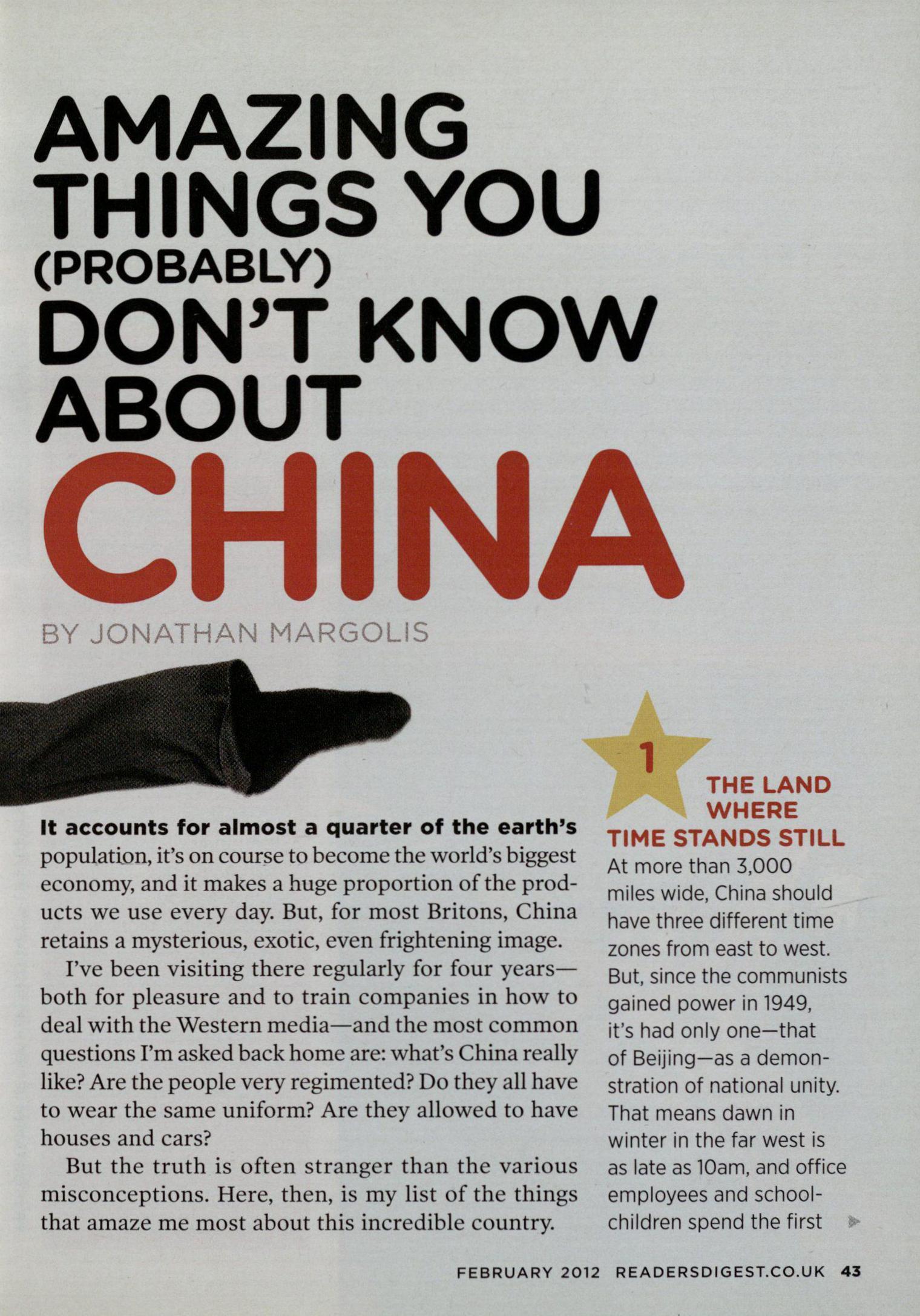
It accounts for almost a quarter of the earth's population, it's on course to become the world's biggest economy, and it makes a huge proportion of the products we use every day. But, for most Britons, China retains a mysterious, exotic, even frightening image.
I've been visiting there regularly for four years— both for pleasure and to train companies in how to deal with the Western media—and the most common questions I'm asked back home are: what's China really like? Are the people very regimented? Do they all have to wear the same uniform? Are they allowed to have houses and cars?
But the truth is often stranger than the various misconceptions. Here, then, is my list of the things that amaze me most about this incredible country.
THE LAND WHERE TIME STANDS STILL At more than 3,000 miles wide, China should have three different time zones from east to west. But, since the communists gained power in 1949, it's had only one—that of Beijing—as a demonstration of national unity. That means dawn in winter in the far west is as late as 10am, and office employees and schoolchildren spend the first
1
FEBRUARY 2012 READERSDIGEST.CO.UK 43
two hours of the working day in darkness. But a lot of people try to live on a more biologically comfortable —but unofficial—local
time scale. So, in the holidays, kids can be found watching latenight TV programmes while they're having their tea.
Ever heard of Chongqing? I hadn't until I started going to China. It's the world's biggest city—a massive, grey-skied centre for car and motorcycle manufacture, food processing, chemicals, textiles, machinery and electronics. Only China can have a city with a population of 31 million that so few foreigners even know exists. Even with China's modest birth rate, by 2025 the country will have 219 cities with more than a million inhabitants —compared with 35 in Europe today.
1601"ellarorr
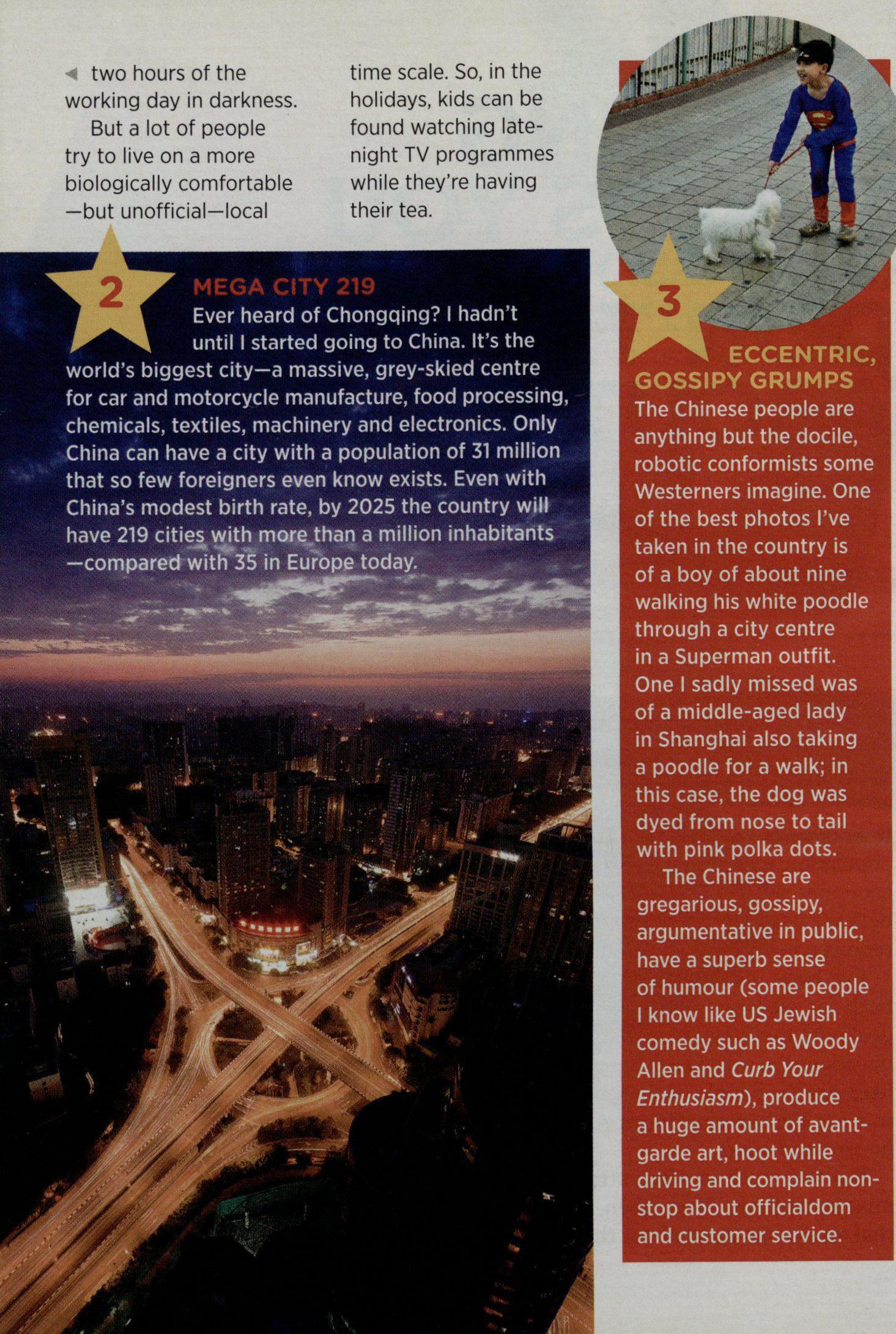
a
•
o ECCENTRIC, GOSSIPY GRUMPS
The Chinese people are anything but the docile, robotic conformists some Westerners imagine. One of the best photos I've taken in the country is of a boy of about nine walking his white poodle through a city centre in a Superman outfit. One I sadly missed was of a middle-aged lady in Shanghai also taking a poodle for a walk; in this case, the dog was dyed from nose to tail with pink polka dots. The Chinese are gregarious, gossipy, argumentative in public, have a superb sense of humour (some people I know like US Jewish comedy such as Woody Allen and Curb Your Enthusiasm), produce a huge amount of avantgarde art, hoot while driving and complain nonstop about officialdom and customer service.
TOTALLY WIRED
China is the biggest mobilephone market in the world, with 900 million citizens owning a shoji (hand machine)—practically every adult in the country, just as in the West. But Chinese city dwellers also spend, on average, 70 per cent of their leisure time online, compared with around 30 per cent in Britain.
The government employs an estimated 50,000 people to monitor the internet, and political opposition to the government is supposedly banned. But it's very hard to control, and China has 200 million bloggers, many of them complaining about the authorities. Last year's internet-powered Arab Spring prompted those in charge to attempt a clampdown, but only about 30 people were charged with an offence.
Western socialnetworking sites such as Facebook and Twitter are also off limits, but their
Chinese equivalents—Sina Weibo and Tencent for Twitter; Renren and Kaixin for Facebook—are just as powerful. When two trains crashed last July in Zhejiang province, killing 40 people, the authorities tried to censor all details. But people inside the wreckage were posting messages on Sina Weibo before they were rescued.
Premier Wen Jiabao visited the scene within days, and felt he needed to explain that he hadn't come earlier because he'd been ill. This is thought to be the first such political triumph for social networking in China.
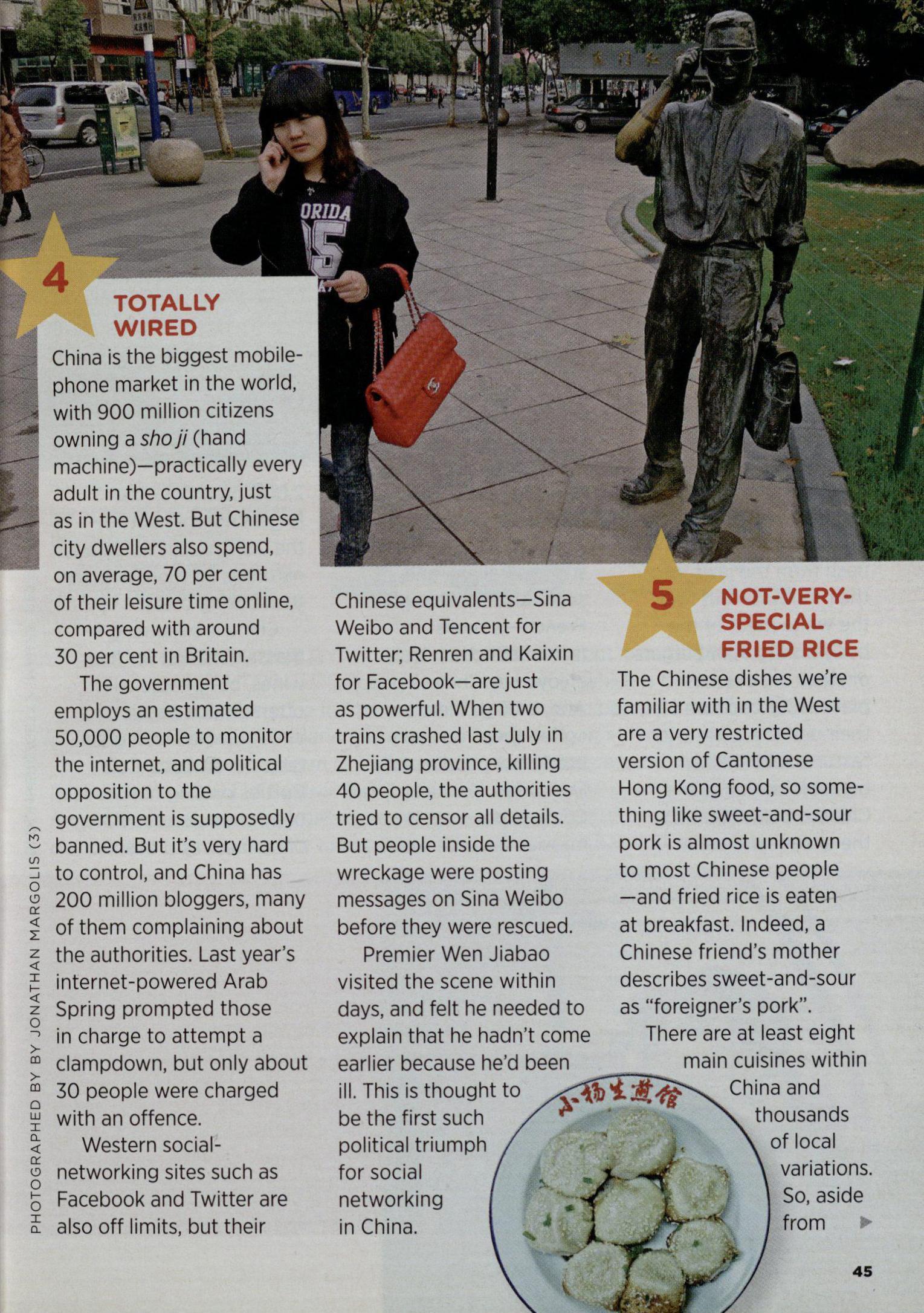
NOT-VERYSPECIAL FRIED RICE
The Chinese dishes we're familiar with in the West are a very restricted version of Cantonese Hong Kong food, so something like sweet-and-sour pork is almost unknown to most Chinese people —and fried rice is eaten at breakfast. Indeed, a Chinese friend's mother describes sweet-and-sour as "foreigner's pork".
There are at least eight main cuisines within China and thousands of local variations. So, aside from xt-
PHO TOG RAPH ED B Y BY J O NA TH AN MA RGO LI S ( 3)
45
the Cantonese food familiar to us, there's also the spicy Hunan and Szechuan, Anhui (heavy on bamboo and mushroom), Fujian (a major seafood cuisine), Shandong (with a lot of peanuts, grains and vinegar), Jiangsu (sweet with much braised and stewed white fish), and Zhejiang (low on oil and fat, with emphasis placed on fresh taste).
Chinese people love interesting textures, so they adore eating things like fish heads—scraping flesh from the jaws into their mouths—but find the white meat of the body boring. Hamburgers or steak are seen as plain nasty because of their uniform taste and texture. And chicken breast is so dull to the Chinese palate that it's the cheapest meat in
the supermarket, bought mostly for pet food.
Other Western cuisine, such as Italian—and, in sophisticated Shanghai, French—is more fashionable than truly enjoyed by Chinese people. And, though there are coffee shops on every city block, few people really like coffee. Kentucky Fried Chicken, however, is a massive hit, with some

2,000 branches—the largest number outside the US. Chicken wings are, naturally, far more popular than boring breast.
China is becoming a massive market for fine wines, but people will often drink a classic vintage mixed with green tea or even Coca-Cola.
Bottles costing hundreds of pounds also circulate, unopened, as presents.
FAITH MOVES IN MYSTERIOUS WAYS
Officially atheist, China is experiencing a massive boom in Christianity. There are an estimated 54 million active worshippers in the country— more than in Italy—with some 40 million Protestants and 14 million Catholics. Occasionally, the secret
BL O OMBERG/GETTY IMAGES: GET TY IMAGES
EYES ON THE PRIZE
Chinese people are so business-minded that it's almost impossible to believe they live in a state that's still officially communist. I was with a friend who was looking at jewellery in a Beijing department store. When they had nothing she liked, the assistant produced a tray of brooches from under the counter. It was her own private business —a store of her own within the department store.
A Chinese friend recently decided to open
ONE COUNTRY, MANY TONGUES
8 Almost everyone in China can speak Mandarin, the standardised form of Chinese based on the dialect of Beijing. But most Chinese citizens, who belong to 56 distinct ethnic groups, prefer to use one

a pet shop (there's a huge boom in animal ownership), so I asked if she'd be giving up her job with a luggage company.
"Of course not," she said. Her boss was investing in her new venture and had given her a pay rise so she could continue in her current position and pay a shop manager. It was an example of the Chinese principle that friendship and trust are more important than a good deal. Chinese people would sooner do a bad deal with someone they know than a good deal with a stranger.
of 292 different local languages, the most common of which is Cantonese. It's spoken by 70 million people, including those in Hong Kong. It's also the most dominant in the Chinatowns of Western cities.
police—the PSB (Public Security Bureau)—will disrupt services and even arrest worshippers, hold them for a few hours and let them go, just to show who's still boss. But this low-level persecution does nothing to hinder the boom. Wealthy businessmen are even starting their own churches and speak ambitiously of building church "brands" across China.
Yet the Chinese interpretation of Christianity can be confusing. One "practising" friend told me she'd never heard of Jesus and was unaware of the significance of the crucifix other than as a religious sign. She goes to church mainly in the hope of speaking to her late father.
Written Chinese has 80,000 characters —at least 3,000 of which a person needs to know to read—but is understood by almost everyone in China, whichever language they speak. However, children use Pinyin (Western lettering) until they're seven, because it's much easier than memorising characters. And when a Chinese person types on a computer or phone, they enter Western letters and the device displays a variety of characters they might mean, so they
BU ENA V IS TA IMAGES/ GE TTY IMAGES *
FEBRUARY 2012 READERSDIGEST.CO.UK 47
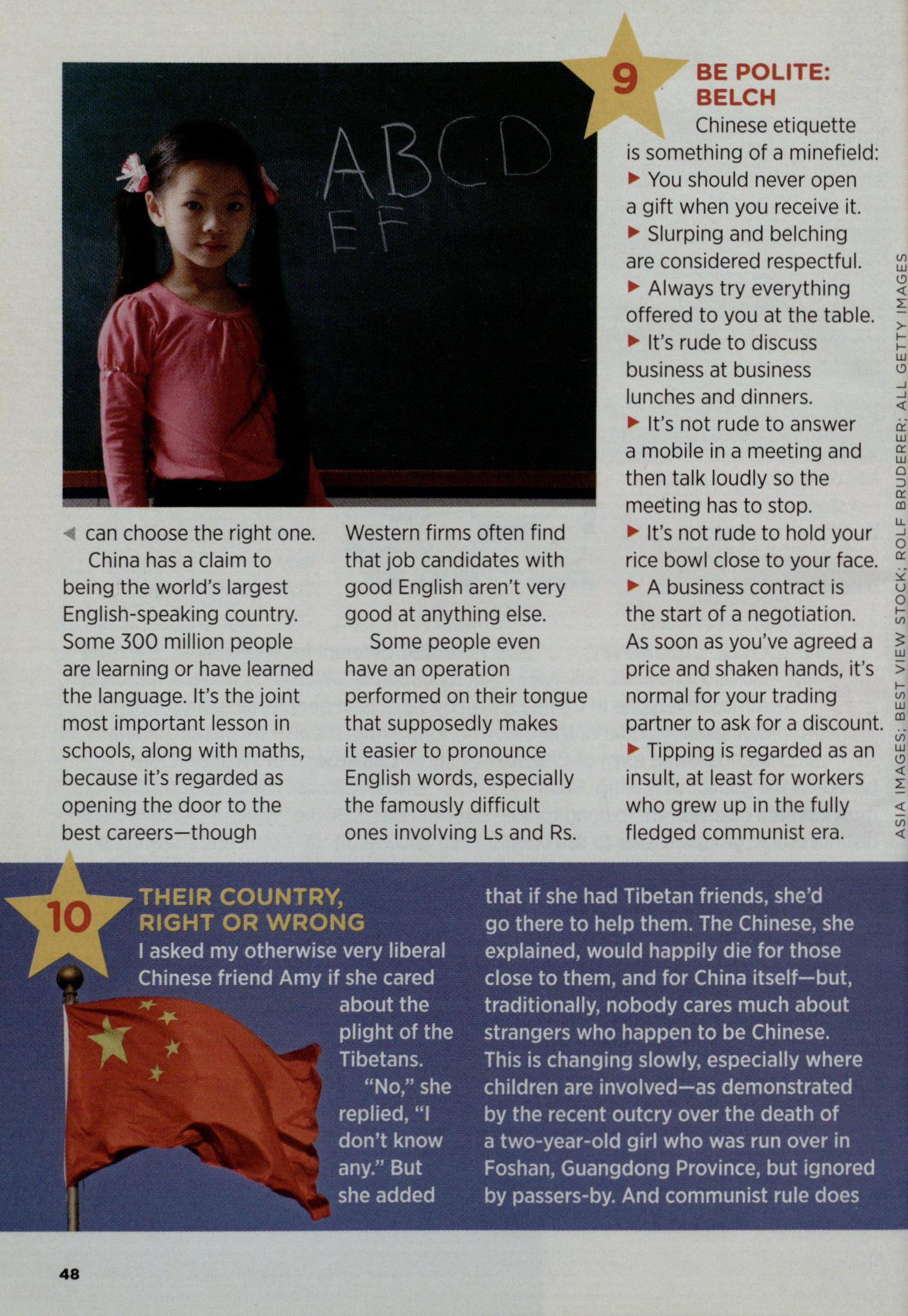
,4 can choose the right one. China has a claim to being the world's largest English-speaking country. Some 300 million people are learning or have learned the language. It's the joint most important lesson in schools, along with maths, because it's regarded as opening the door to the best careers—though
Western firms often find that job candidates with good English aren't very good at anything else. Some people even have an operation performed on their tongue that supposedly makes it easier to pronounce English words, especially the famously difficult ones involving Ls and Rs.
10 THEIR COUNTRY, RIGHT OR WRONG
I asked my otherwise very liberal Chinese friend Amy if she cared about the plight of the Tibetans.
"No," she replied, "I don't know any." But she added
9 BE POLITE: BELCH
Chinese etiquette is something of a minefield:
► You should never open a gift when you receive it.
► Slurping and belching are considered respectful.
► Always try everything offered to you at the table.
► It's rude to discuss business at business lunches and dinners.
► It's not rude to answer a mobile in a meeting and then talk loudly so the meeting has to stop.
► It's not rude to hold your rice bowl close to your face.
► A business contract is the start of a negotiation. As soon as you've agreed a price and shaken hands, it's normal for your trading partner to ask for a discount.
► Tipping is regarded as an insult, at least for workers who grew up in the fully fledged communist era.
that if she had Tibetan friends, she'd go there to help them. The Chinese, she explained, would happily die for those close to them, and for China itself—but, traditionally, nobody cares much about strangers who happen to be Chinese. This is changing slowly, especially where children are involved—as demonstrated by the recent outcry over the death of a two-year-old girl who was run over in Foshan, Guangdong Province, but ignored by passers-by. And communist rule does
AS A IMAGES; BEST VIEW STOCK; ROLF BRUDERER; ALL GETTY IMAG ES
48
THE CLOCKS OF DEATH
Even sophisticated, educated Chinese people can be intensely superstitious. Belief that eight is a lucky number and four is unlucky is almost universal, and few buildings call the floor above the third the fourth.
Superstition makes buying someone a small gift very difficult. The
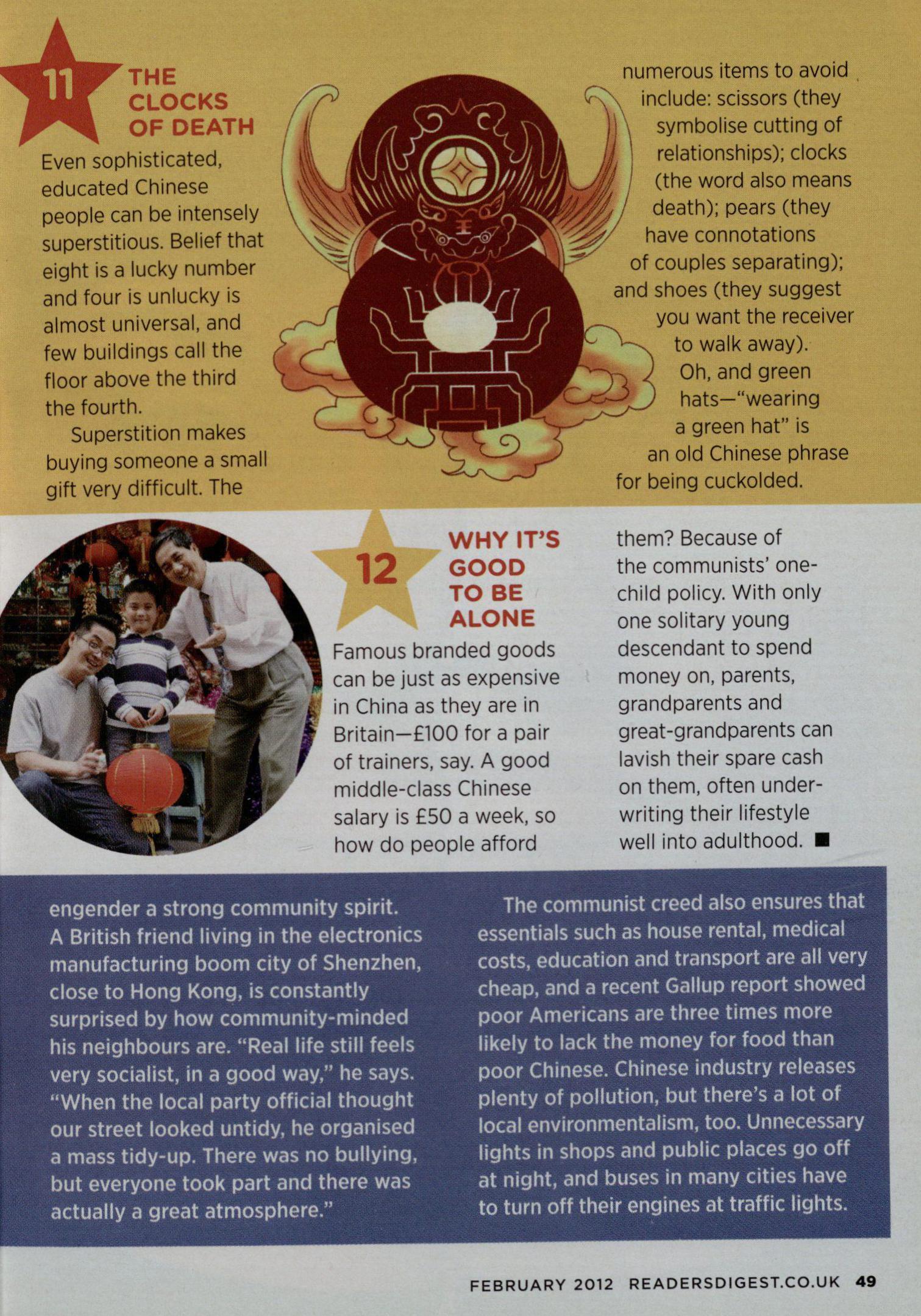
WHY IT'S 12 GOOD TO BE ALONE
Famous branded goods can be just as expensive in China as they are in Britain—£100 for a pair of trainers, say. A good middle-class Chinese salary is £50 a week, so how do people afford
engender a strong community spirit. A British friend living in the electronics manufacturing boom city of Shenzhen, close to Hong Kong, is constantly surprised by how community-minded his neighbours are. "Real life still feels very socialist, in a good way," he says. "When the local party official thought our street looked untidy, he organised a mass tidy-up. There was no bullying, but everyone took part and there was actually a great atmosphere."
numerous items to avoid include: scissors (they symbolise cutting of relationships); clocks (the word also means death); pears (they have connotations of couples separating); and shoes (they suggest you want the receiver to walk away).
Oh, and green hats—"wearing a green hat" is an old Chinese phrase for being cuckolded.
them? Because of the communists' onechild policy. With only one solitary young descendant to spend money on, parents, grandparents and great-grandparents can lavish their spare cash on them, often underwriting their lifestyle well into adulthood. ■
The communist creed also ensures that essentials such as house rental, medical costs, education and transport are all very cheap, and a recent Gallup report showed poor Americans are three times more likely to lack the money for food than poor Chinese. Chinese industry releases plenty of pollution, but there's a lot of local environmentalism, too. Unnecessary lights in shops and public places go off at night, and buses in many cities have to turn off their engines at traffic lights.
FEBRUARY 2012 READERSDIGEST.CO.UK 49

Struggling to keep your spirits up? This month's Keep Britain Happy campaign looks at your "emotional calendar"—and the surprising effect it can have on your feelings
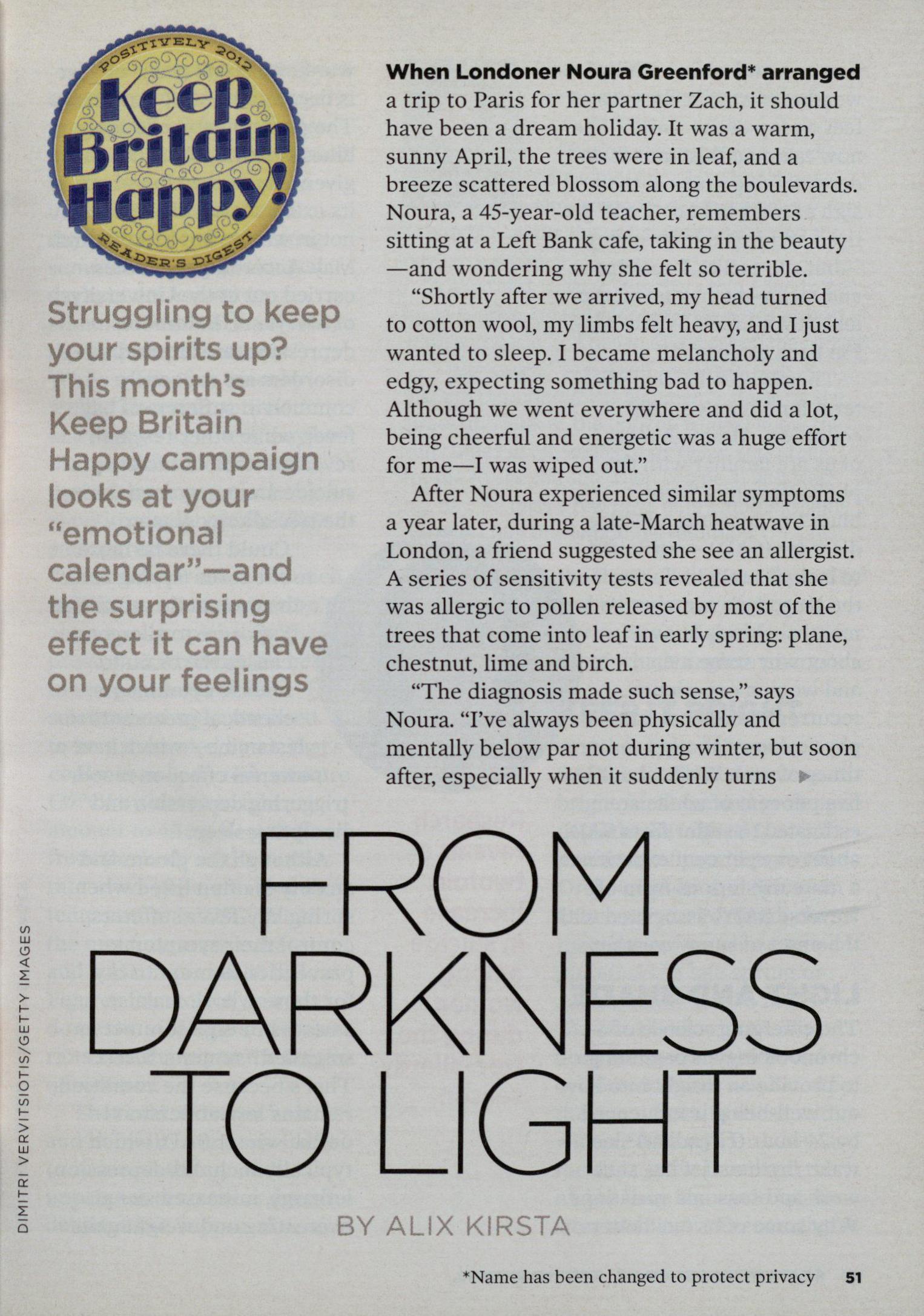
When Londoner Noura Greenford* arranged a trip to Paris for her partner Zach, it should have been a dream holiday. It was a warm, sunny April, the trees were in leaf, and a breeze scattered blossom along the boulevards. Noura, a 45-year-old teacher, remembers sitting at a Left Bank cafe, taking in the beauty —and wondering why she felt so terrible.
"Shortly after we arrived, my head turned to cotton wool, my limbs felt heavy, and I just wanted to sleep. I became melancholy and edgy, expecting something bad to happen. Although we went everywhere and did a lot, being cheerful and energetic was a huge effort for me—I was wiped out."
After Noura experienced similar symptoms a year later, during a late-March heatwave in London, a friend suggested she see an allergist. A series of sensitivity tests revealed that she was allergic to pollen released by most of the trees that come into leaf in early spring: plane, chestnut, lime and birch.
"The diagnosis made such sense," says Noura. "I've always been physically and mentally below par not during winter, but soon after, especially when it suddenly turns 9.
FRO` DARK\ SS TO SIG IT
BY ALIX KIRSTA
DIMITRI VERVITS IOTIS/ GETTY IMAGES
*Name has been changed to protect privacy 51
• warm and sunny. Chilly weather always makes me feel on top of the world." She now takes antihistamines and desensitising drops at the first sign of trees in bud. "I still get tired and irritable in spring —but the earlier I anticipate and tackle the hay fever, the less down I feel. By late May, I'm back to normal."
There's no official medical term for Noura's spring condition. Although most of us are familiar with the phenomenon of "winter blues", or seasonal affective disorder (SAD)—attributed to lack of sunlight during the long, dark winter months—less is known about why some men and women experience recurrent emotional and physical lows at other times of year. While about five per cent of adults are estimated to suffer from SAD, about one per cent experience a more mysterious form of "reverse SAD", associated with the onset of sunny weather.
LIGHT AND SHADE
The emerging science of chronobiology is beginning to provide an insight into how our well-being is influenced by 24-hour (circadian) sleepwake rhythms, jet lag, shift work and seasonal variations. Why some of us feel better or
worse at certain times of year is becoming less of a mystery. The phenomenon of spring blues is perhaps unsurprising, given that depression—and, at its extreme, suicide—peaks not in winter, but in April and May. According to studies carried out at the University of Maryland, Baltimore, depression, anxiety and sleep disorders are especially common in sufferers of hay fever, while other research reveals a twofold increase in suicide among women during the tree-allergy season.
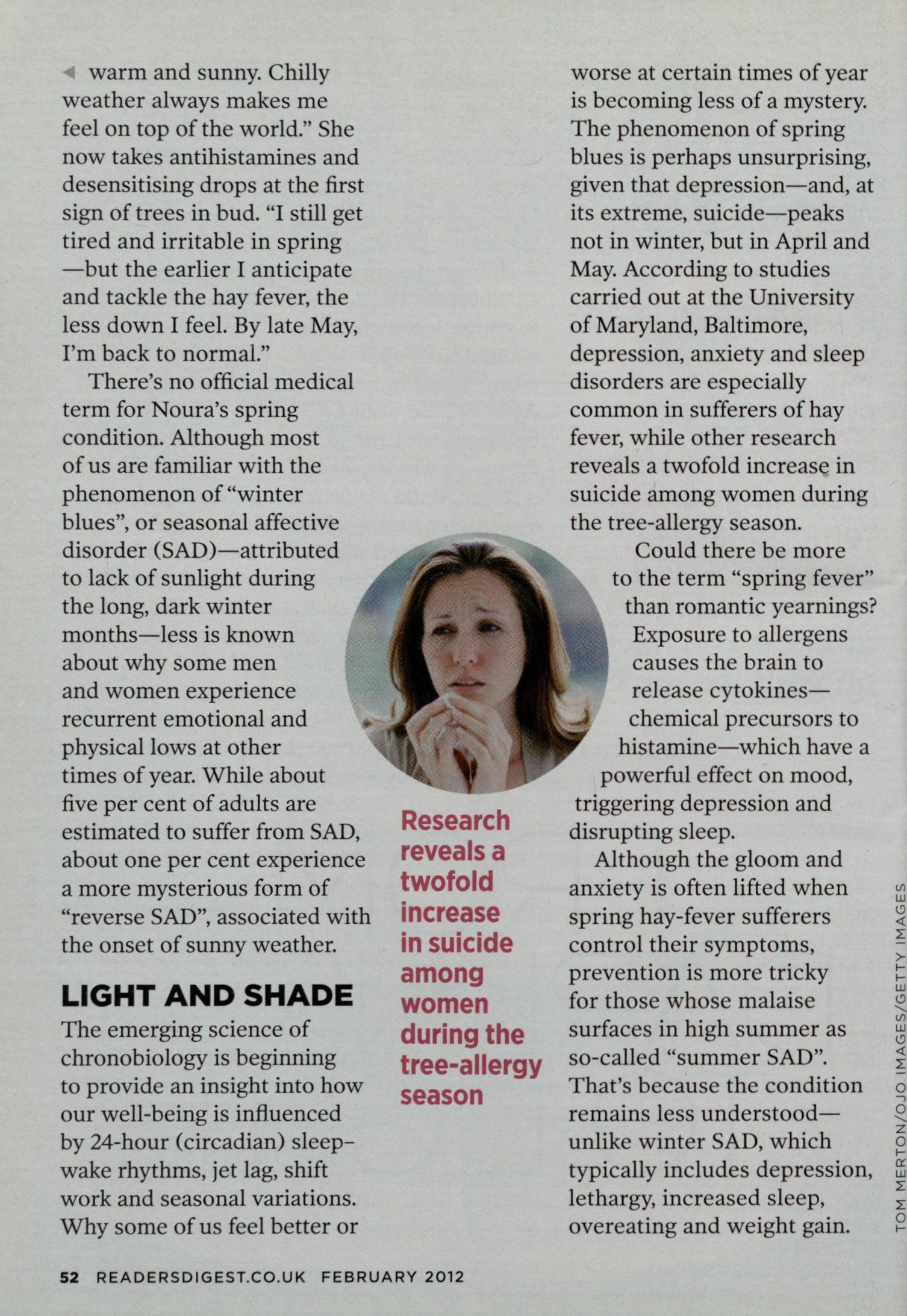
Research reveals a twofold increase in suicide among women during the tree-allergy season
Could there be more to the term "spring fever" than romantic yearnings? Exposure to allergens causes the brain to release cytokineschemical precursors to histamine—which have a powerful effect on mood, triggering depression and disrupting sleep.
Although the gloom and anxiety is often lifted when spring hay-fever sufferers control their symptoms, prevention is more tricky for those whose malaise surfaces in high summer as so-called "summer SAD". That's because the condition remains less understood— unlike winter SAD, which typically includes depression, lethargy, increased sleep, overeating and weight gain.
TOM M ERTON /0J 0 IMA GES/GET TY IMA GE S 52 READERSDIGEST.CO.UK FEBRUARY 2012
Those symptoms have been explained by the body's overproduction of the "darkness hormone" melatonin, released by the brain's pineal gland in response to decreased daylight. In contrast, strong summer sun and prolonged daylight are known to stimulate levels of serotonin, the "happiness hormone". While most of us react by feeling cheerful, optimistic and energetic, others may be oversensitive to serotonin, developing insomnia, loss of appetite, anxiety, irritability and aggression.
In northern countries such as Britain, a heatwave won't always raise spirits. Studies prove that we function best in temperatures of 22°C. The science is simple: we need to be surrounded by air that's cooler than body temperature (37°C) by just the right amount to allow heat to flow from the body at the same rate as we generate it—that temperature is 22°C. When the mercury soars, exhaustion and bad temper often follow. Figures for violent crime, domestic violence and street riots rise sharply at the height of summer.
That said, extreme heat and humidity are more likely to induce lethargy and impair concentration, due to dehydration, suppression of
Ellen Frank, a psychology professor, credits the power of daylight for helping her.
"During summer days I could barely function. But when it got dark around 9.45pm, I'd get a surge of energy—all the things I couldn't do during the day were possible."
A specialist in sleep disorders told Ellen to get up at sunrise, go outdoors and stand for a short while in the sun as it began to appear on the horizon.
"I was cured," says Ellen, who now rises at 5.45am throughout the summer. "I stand on the street and look at the horizon where I know the sun comes up. It seems to be really important for me to see the sun. Then I come in and start my day. If I miss a few days of my morning-light routine, I feel the symptoms returning."
Studies prove that we function best at 22°C
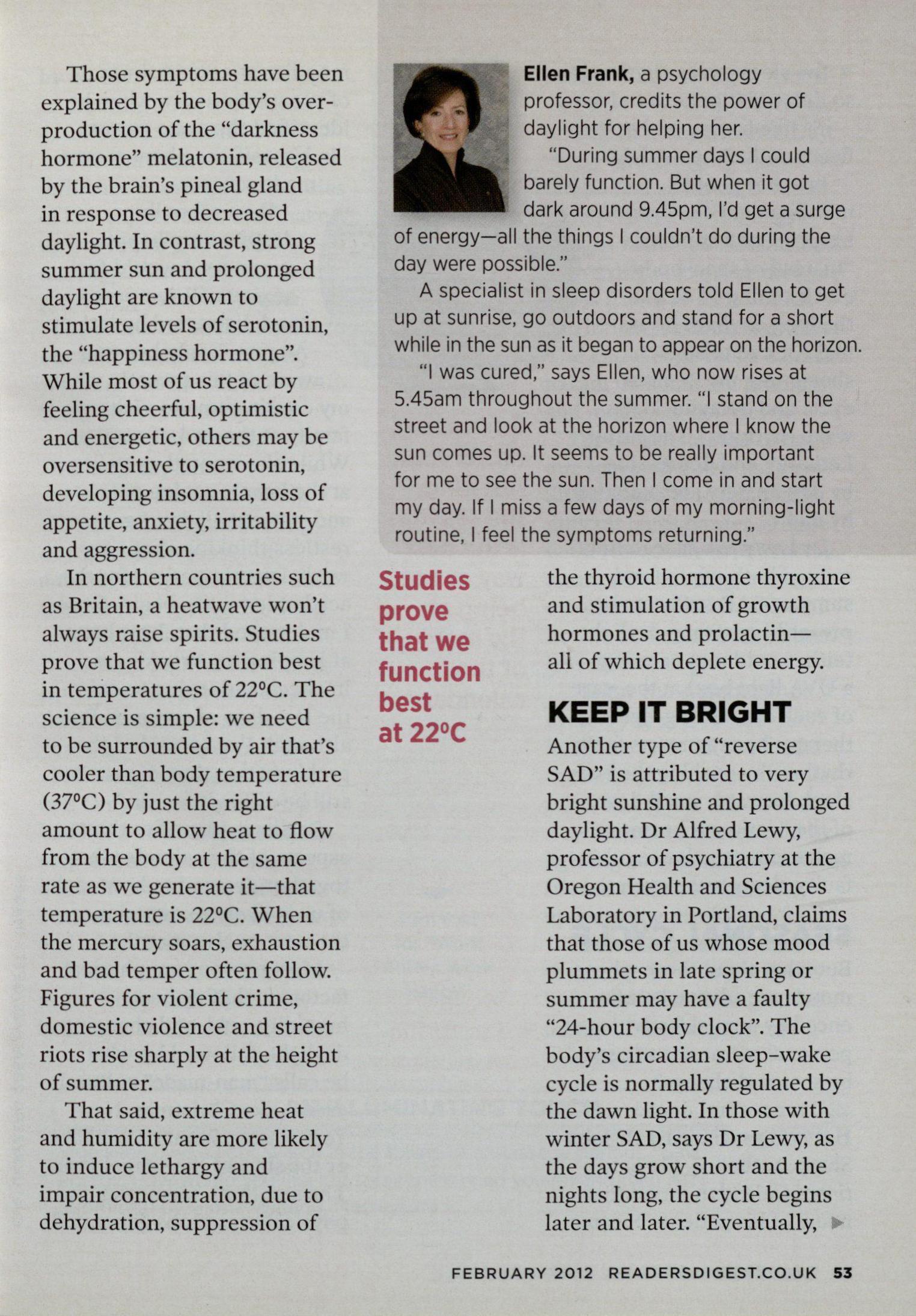
the thyroid hormone thyroxine and stimulation of growth hormones and prolactinall of which deplete energy.
KEEP IT BRIGHT
Another type of "reverse SAD" is attributed to very bright sunshine and prolonged daylight. Dr Alfred Lewy, professor of psychiatry at the Oregon Health and Sciences Laboratory in Portland, claims that those of us whose mood plummets in late spring or summer may have a faulty "24-hour body clock". The body's circadian sleep-wake cycle is normally regulated by the dawn light. In those with winter SAD, says Dr Lewy, as the days grow short and the nights long, the cycle begins later and later. "Eventually, ►
FEBRUARY 2 012 READERSDIGEST.CO.UK 53
4 the sleep-wake rhythm is so delayed it goes out of sync —it's like having jet lag for five months," he explains.
In other people, misalignment can occur in spring and summer. "Instead of their body clock cueing to dawn, the long daylight hours make it cue to sunset, shortening the 24-hour cycle and delaying sleepwake rhythms." The result? Lethargy and depression by day, anxiety and agitation by night.
Dr Lewy has successfully treated both winter and summer SAD sufferers by prescribing strong daylight (either outdoors or using a UVA light box) at the start of each day. Strong-light therapy, he says, resets faulty rhythms by pushing the body clock forward; small doses of the "darkness hormone" melatonin can also regulate faulty sleep-wake cycles.
SEASONAL CYCLE
But what about those whose moods are adversely influenced by annual festivities or personal memories triggered by seasonal change?
Over several decades, Harvard psychiatrist Dr John Sharp, author of The Emotional Calendar, found that many of his patients became
Embracing, rather than resisting, the seasons is the best way of not being at the mercy of the calendar
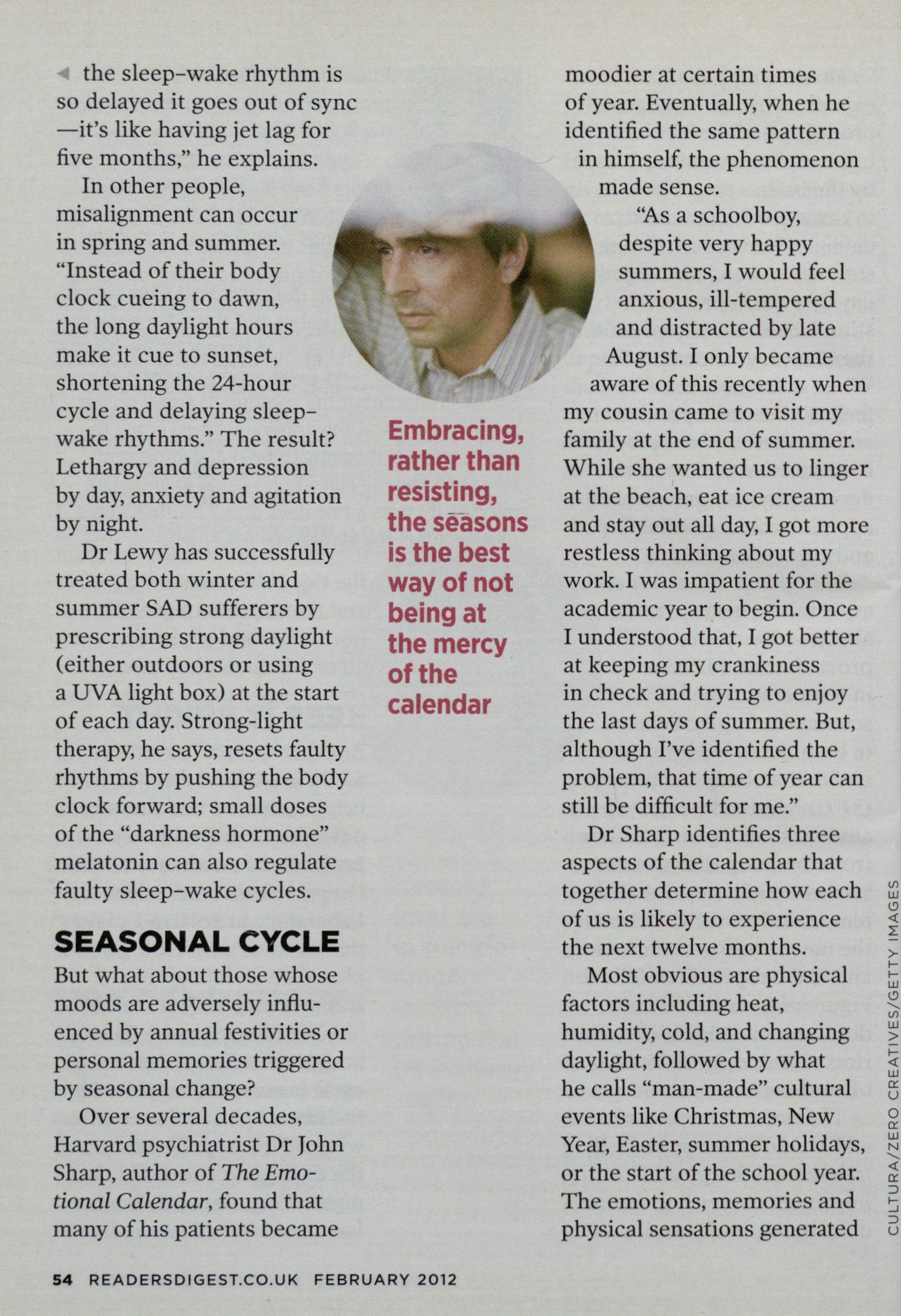
moodier at certain times of year. Eventually, when he identified the same pattern in himself, the phenomenon made sense.
As a schoolboy, despite very happy summers, I would feel anxious, ill-tempered and distracted by late August. I only became aware of this recently when my cousin came to visit my family at the end of summer. While she wanted us to linger at the beach, eat ice cream and stay out all day, I got more restless thinking about my work. I was impatient for the academic year to begin. Once I understood that, I got better at keeping my crankiness in check and trying to enjoy the last days of summer. But, although I've identified the problem, that time of year can still be difficult for me."
Dr Sharp identifies three aspects of the calendar that together determine how each of us is likely to experience the next twelve months.
Most obvious are physical factors including heat, humidity, cold, and changing daylight, followed by what he calls "man-made" cultural events like Christmas, New Year, Easter, summer holidays, or the start of the school year. The emotions, memories and physical sensations generated
CULT URA/ZERO CREATIVES/ GETTY IMAGES 54 READERSDIGEST.CO.UK FEBRUARY 2012
by all those factors play a part in creating your individual emotional calendar.
The third most powerful influence comprises memories of key experiences that make up our history: love affairs, marriage, illness, births, deaths, great happiness or trauma. "The secret to understanding our emotional calendar is working out how these three factors overlap and come into play for us," Dr Sharp explains.
He cites Emma, a young woman who begins feeling down with the onset of autumn and suffers SAD until the onset of spring. Nothing new there, but what makes December painful for Emma is that her ex-partner ended their relationship some years ago on Christmas Day, confessing he'd never loved her. Only once she saw that it had been an abusive relationship did she realise why her self-confidence hit rock bottom in the weeks before and after Christmas.
Emotional Calendar
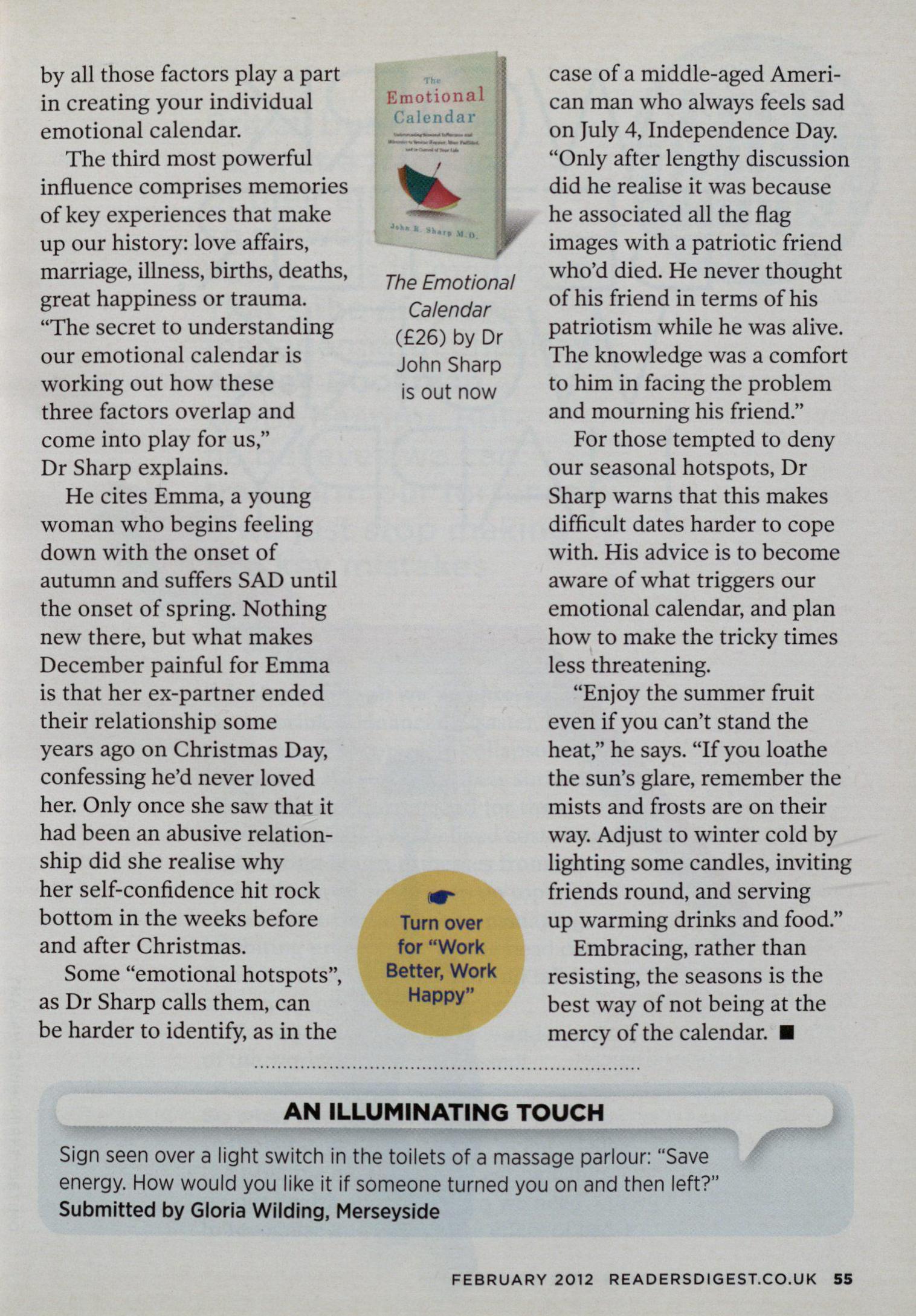
The Emotional Calendar (£26) by Dr John Sharp is out now Turn over for "Work Better, Work Happy"
"Only after lengthy discussion did he realise it was because he associated all the flag images with a patriotic friend who'd died. He never thought of his friend in terms of his patriotism while he was alive. The knowledge was a comfort to him in facing the problem and mourning his friend."
For those tempted to deny our seasonal hotspots, Dr Sharp warns that this makes difficult dates harder to cope with. His advice is to become aware of what triggers our emotional calendar, and plan how to make the tricky times less threatening.
Some "emotional hotspots", as Dr Sharp calls them, can be harder to identify, as in the case of a middle-aged American man who always feels sad on July 4, Independence Day.
"Enjoy the summer fruit even if you can't stand the heat," he says. "If you loathe the sun's glare, remember the mists and frosts are on their way. Adjust to winter cold by lighting some candles, inviting friends round, and serving up warming drinks and food."
Embracing, rather than resisting, the seasons is the best way of not being at the mercy of the calendar. ■
AN ILLUMINATING TOUCH
Sign seen over a light switch in the toilets of a massage parlour: "Save energy. How would you like it if someone turned you on and then left?" Submitted by Gloria Wilding, Merseyside
FEBRUARY 2 012 READERSDIGEST.CO.UK 55

WORK B TT R, WORK APPY
56
British businesses work at a fraction of their efficiency— so no wonder the economy's in meltdown. That's the message management consultant Ashley Bookman keeps hearing. But he believes we can transform our fortunes— if we just stop making five key mistakes
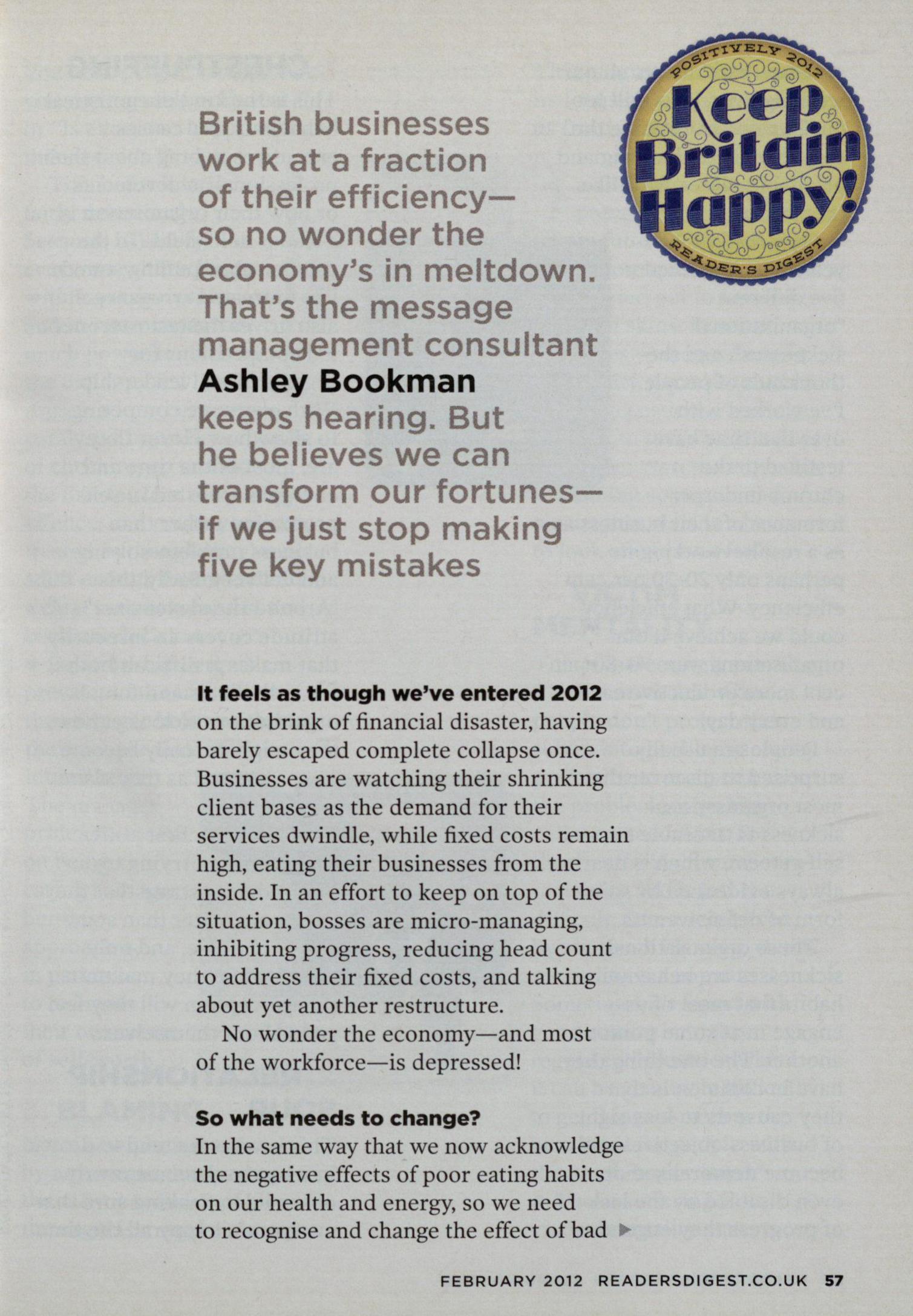
It feels as though we've entered 2012 on the brink of financial disaster, having barely escaped complete collapse once. Businesses are watching their shrinking client bases as the demand for their services dwindle, while fixed costs remain high, eating their businesses from the inside. In an effort to keep on top of the situation, bosses are micro-managing, inhibiting progress, reducing head count to address their fixed costs, and talking about yet another restructure.
No wonder the economy—and most of the workforce—is depressed!
So what needs to change?
In the same way that we now acknowledge the negative effects of poor eating habits on our health and energy, so we need to recognise and change the effect of bad
FEBRUARY 2012 READERSDIGEST.CO.UK 57
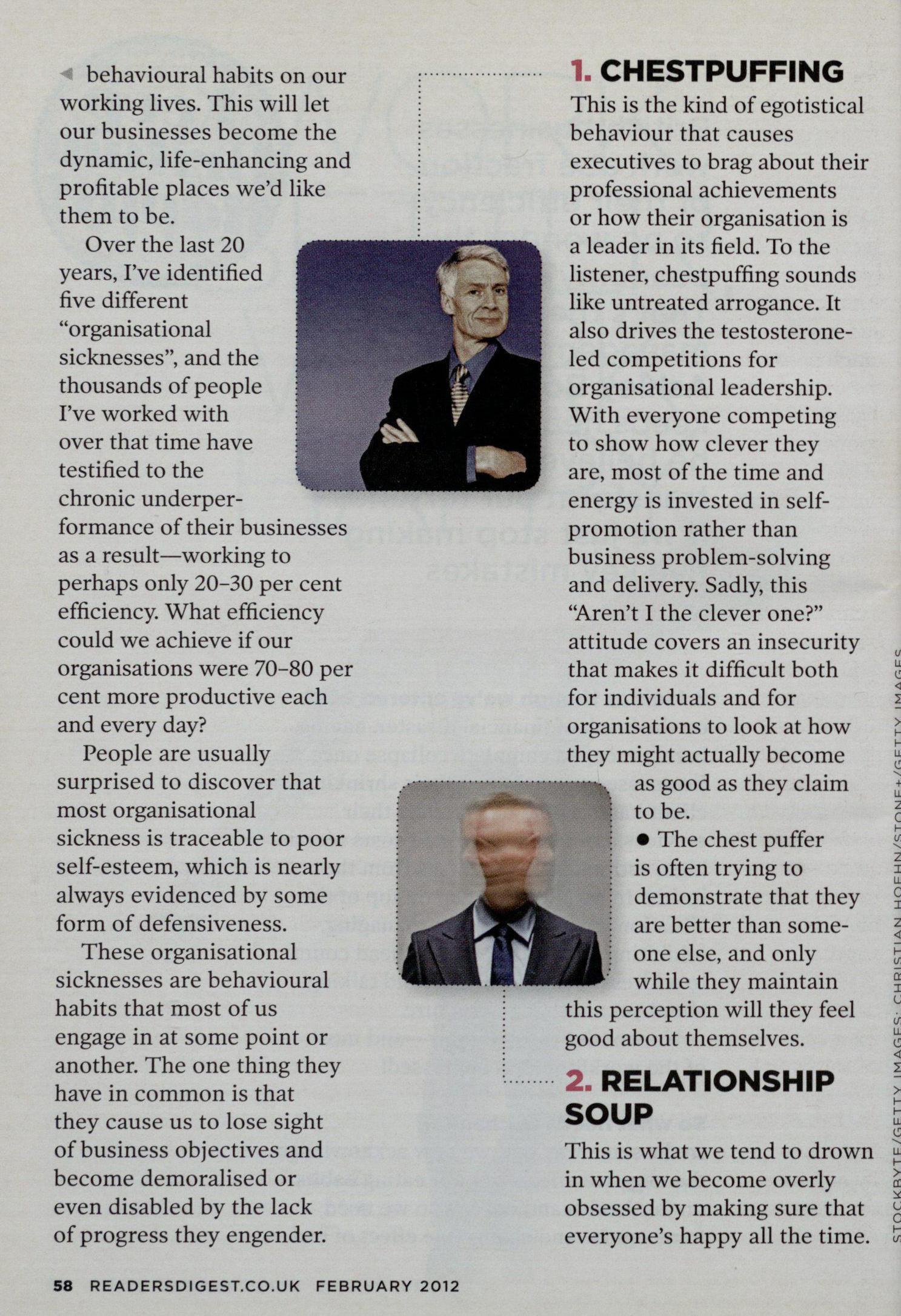
behavioural habits on our working lives. This will let our businesses become the dynamic, life-enhancing and profitable places we'd like them to be.
Over the last 20 years, I've identified five different "organisational sicknesses", and the thousands of people I've worked with over that time have testified to the chronic underperformance of their businesses as a result—working to perhaps only 20-30 per cent efficiency. What efficiency could we achieve if our organisations were 70-80 per cent more productive each and every day?
People are usually surprised to discover that most organisational sickness is traceable to poor self-esteem, which is nearly always evidenced by some form of defensiveness.
These organisational sicknesses are behavioural habits that most of us engage in at some point or another. The one thing they have in common is that they cause us to lose sight of business objectives and become demoralised or even disabled by the lack of progress they engender.
1. CHESTPUFFING
This is the kind of egotistical behaviour that causes executives to brag about their professional achievements or how their organisation is a leader in its field. To the listener, chestpuffing sounds like untreated arrogance. It also drives the testosteroneled competitions for organisational leadership. With everyone competing to show how clever they are, most of the time and energy is invested in selfpromotion rather than business problem-solving and delivery. Sadly, this "Aren't I the clever one?" attitude covers an insecurity that makes it difficult both for individuals and for organisations to look at how they might actually become to b as good as they claim 11111111‘
• The chest puffer is often trying to demonstrate that they are better than someone else, and only while they maintain this perception will they feel good about themselves.
2. RELATIONSHIP SOUP
This is what we tend to drown in when we become overly obsessed by making sure that everyone's happy all the time.
58 READERSDIGEST.CO.UK FEBRUARY 2 012
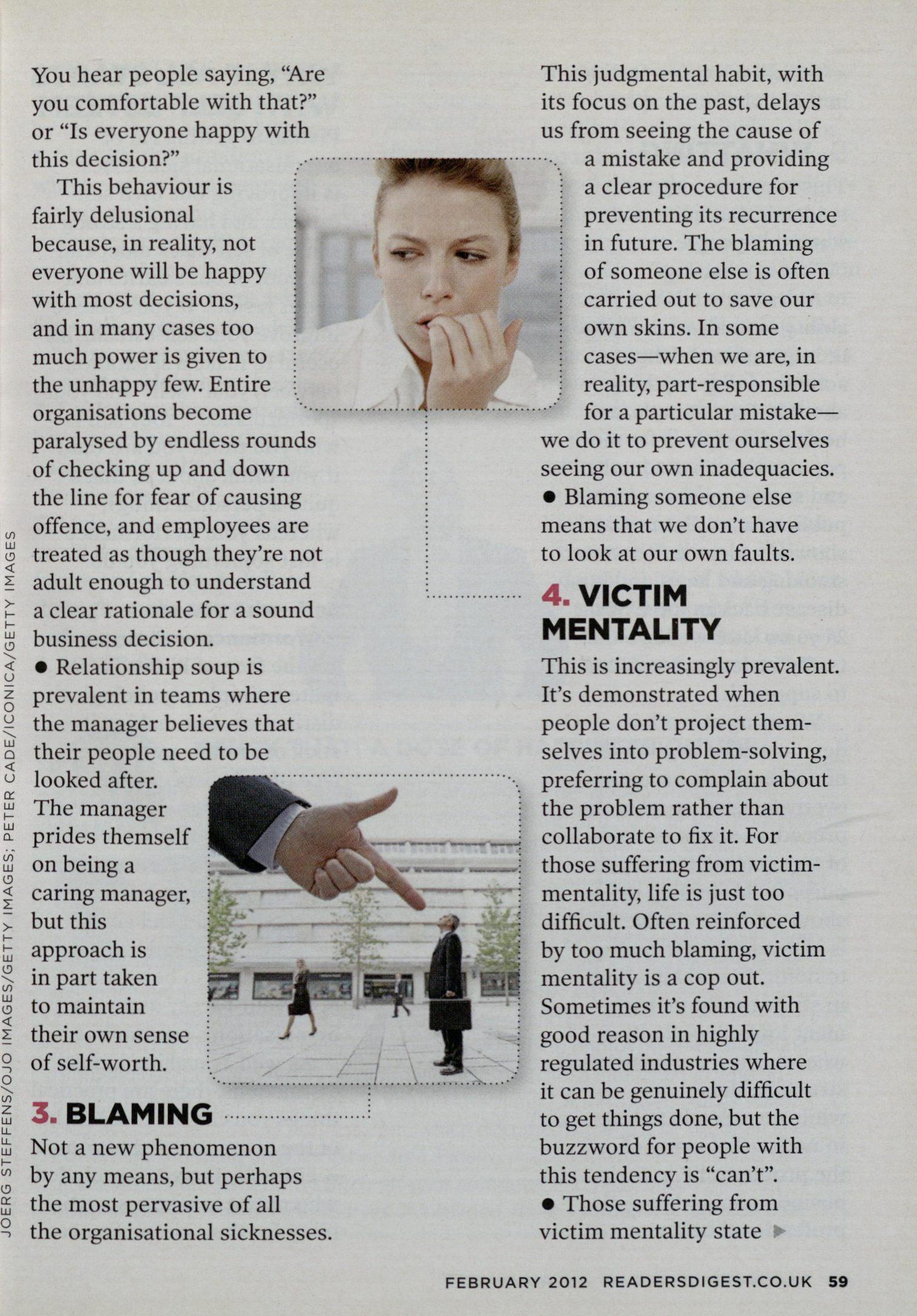
You hear people saying, "Are you comfortable with that?" or "Is everyone happy with this decision?"
This behaviour is fairly delusional because, in reality, not everyone will be happy with most decisions, and in many cases too much power is given to the unhappy few. Entire organisations become paralysed by endless rounds of checking up and down the line for fear of causing offence, and employees are treated as though they're not adult enough to understand a clear rationale for a sound business decision.
• Relationship soup is prevalent in teams where the manager believes that their people need to be looked after. The manager prides themself on being a caring manager, but this approach is in part taken to maintain their own sense of self-worth.
3. BLAMING
Not a new phenomenon by any means, but perhaps the most pervasive of all the organisational sicknesses.
This judgmental habit, with its focus on the past, delays us from seeing the cause of a mistake and providing a clear procedure for preventing its recurrence in future. The blaming of someone else is often carried out to save our own skins. In some cases—when we are, in reality, part-responsible for a particular mistake— we do it to prevent ourselves seeing our own inadequacies.
• Blaming someone else means that we don't have to look at our own faults.
4. VICTIM MENTALITY
This is increasingly prevalent. It's demonstrated when people don't project themselves into problem-solving, preferring to complain about the problem rather than collaborate to fix it. For those suffering from victimmentality, life is just too difficult. Often reinforced by too much blaming, victim mentality is a cop out. Sometimes it's found with good reason in highly regulated industries where it can be genuinely difficult to get things done, but the buzzword for people with this tendency is "can't".
• Those suffering from victim mentality state *-
JOERG S TEFFENS/ OJO IMAGES/GETTY IMAGES; PETER C A DE/ I CONICA/ GETTY IMAGES
A FEBRUARY 2012 READERSDIGEST.CO.UK 59
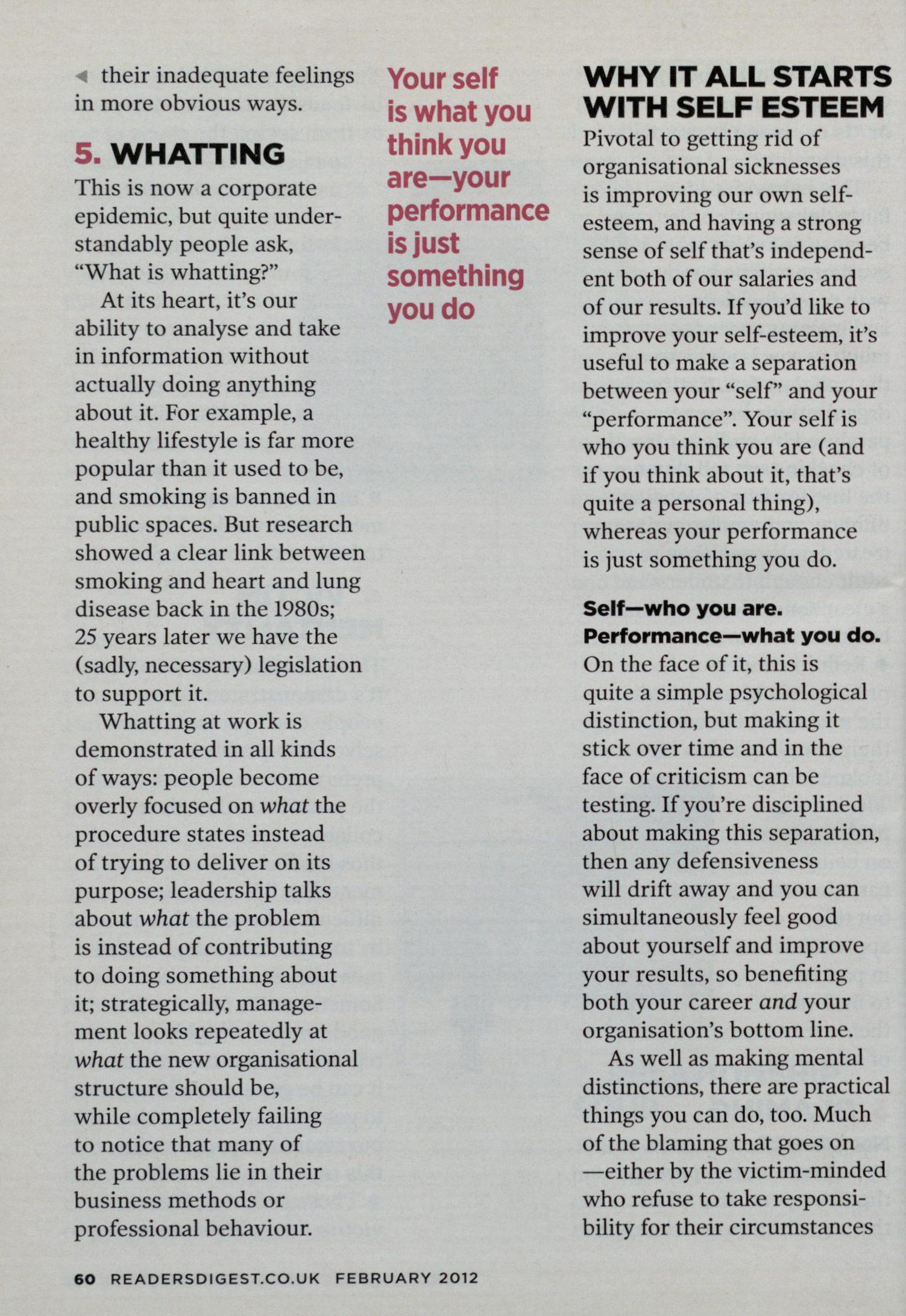
• their inadequate feelings in more obvious ways.
5. WHATTING
This is now a corporate epidemic, but quite understandably people ask, "What is whatting?"
At its heart, it's our ability to analyse and take in information without actually doing anything about it. For example, a healthy lifestyle is far more popular than it used to be, and smoking is banned in public spaces. But research showed a clear link between smoking and heart and lung disease back in the 1980s; 25 years later we have the (sadly, necessary) legislation to support it.
Whatting at work is demonstrated in all kinds of ways: people become overly focused on what the procedure states instead of trying to deliver on its purpose; leadership talks about what the problem is instead of contributing to doing something about it; strategically, management looks repeatedly at what the new organisational structure should be, while completely failing to notice that many of the problems lie in their business methods or professional behaviour.
Your self is what you think you are—your performance is just something you do
WHY IT ALL STARTS WITH SELF ESTEEM
Pivotal to getting rid of organisational sicknesses is improving our own selfesteem, and having a strong sense of self that's independent both of our salaries and of our results. If you'd like to improve your self-esteem, it's useful to make a separation between your "self" and your "performance". Your self is who you think you are (and if you think about it, that's quite a personal thing), whereas your performance is just something you do.
Self—who you are. Performance—what you do. On the face of it, this is quite a simple psychological distinction, but making it stick over time and in the face of criticism can be testing. If you're disciplined about making this separation, then any defensiveness will drift away and you can simultaneously feel good about yourself and improve your results, so benefiting both your career and your organisation's bottom line.
As well as malting mental distinctions, there are practical things you can do, too. Much of the blaming that goes on —either by the victim-minded who refuse to take responsibility for their circumstances
60 READERSDIGEST.CO.UK FEBRUARY 2012
or those with a superiority complex—can be resolved by using these simple steps.
1.Identify the situation in which you've blamed or are blaming someone else. For example, you might be angry with someone who didn't deliver what you were asking for, while secretly wondering whether your brief was as clear as it might have been.
2.Look to see how you might have contributed (either passively or actively) to the situation yourself.
3.Make a note of what you could do differently in future and pledge to follow through on the new action next time.
4. MOVE ON!
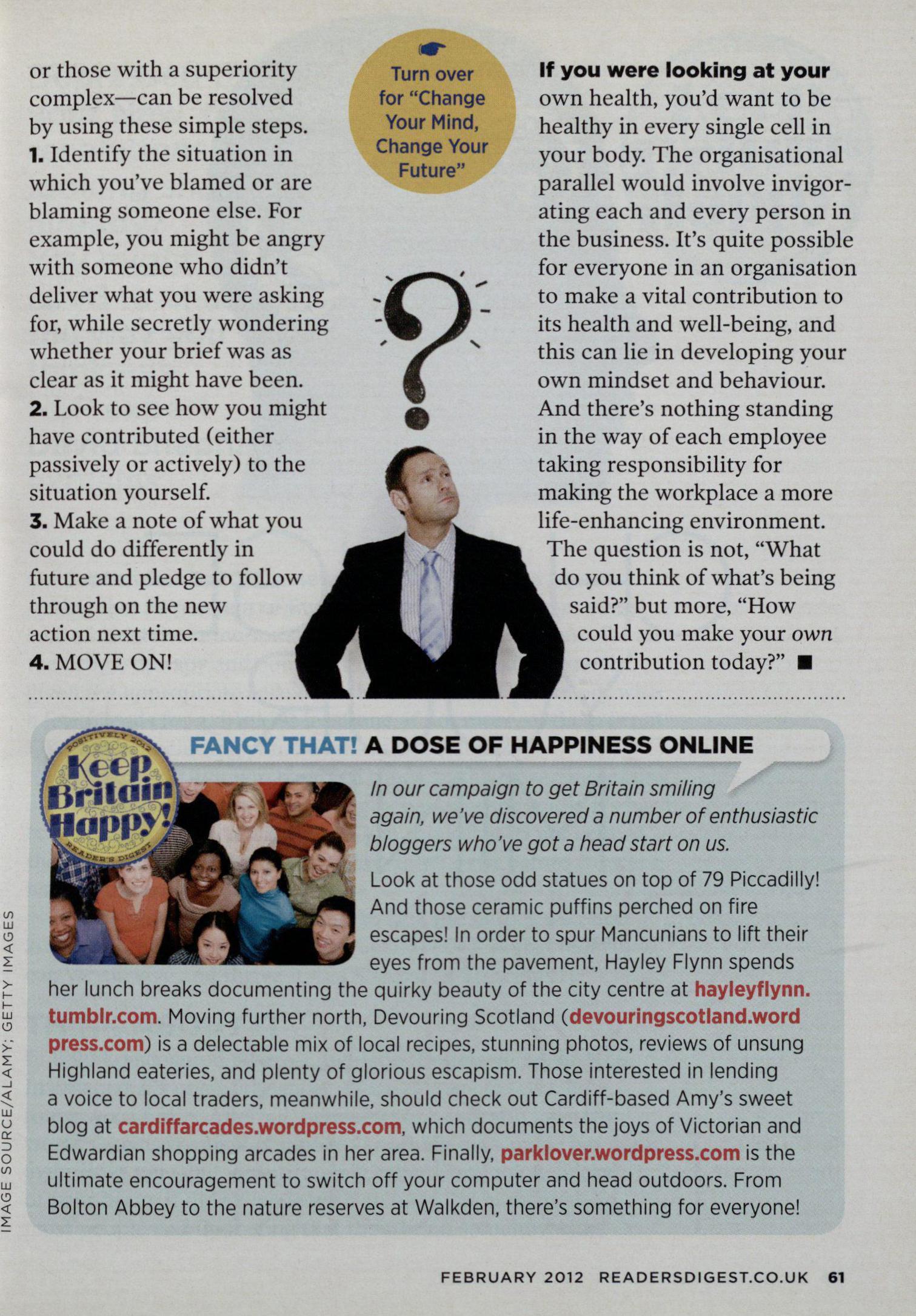
Turn over for "Change Your Mind, Change Your Future"
If you were looking at your own health, you'd want to be healthy in every single cell in your body. The organisational parallel would involve invigorating each and every person in the business. It's quite possible for everyone in an organisation to make a vital contribution to its health and well-being, and this can lie in developing your own mindset and behaviour. And there's nothing standing in the way of each employee taking responsibility for making the workplace a more life-enhancing environment. The question is not, "What do you think of what's being said?" but more, "How could you make your own contribution today?" ■
FANCY THAT! A DOSE OF HAPPINESS ONLINE
In our campaign to get Britain smiling again, we've discovered a number of enthusiastic bloggers who've got a head start on us.
Look at those odd statues on top of 79 Piccadilly! And those ceramic puffins perched on fire escapes! In order to spur Mancunians to lift their eyes from the pavement, Hayley Flynn spends her lunch breaks documenting the quirky beauty of the city centre at hayleyflynn. tumblr.com. Moving further north, Devouring Scotland (devouringscotland.word press.com) is a delectable mix of local recipes, stunning photos, reviews of unsung Highland eateries, and plenty of glorious escapism. Those interested in lending a voice to local traders, meanwhile, should check out Cardiff-based Amy's sweet blog at cardiffarcades.wordpress.com, which documents the joys of Victorian and Edwardian shopping arcades in her area. Finally, parklovetwordpress.com is the ultimate encouragement to switch off your computer and head outdoors. From Bolton Abbey to the nature reserves at Walkden, there's something for everyone!
IMAGE SOURC E/ ALAMY; GETTY IMAGES
FEBRUARY 2012 READERSDIGEST.CO.UK 61

F.J1-R 62
CI I • G YO„R vl\D CI IANG YaJIR
Depressed that your New Year resolutions are looking shaky already?
You might need to change the way you think—as NLP expert David Shephard explain!
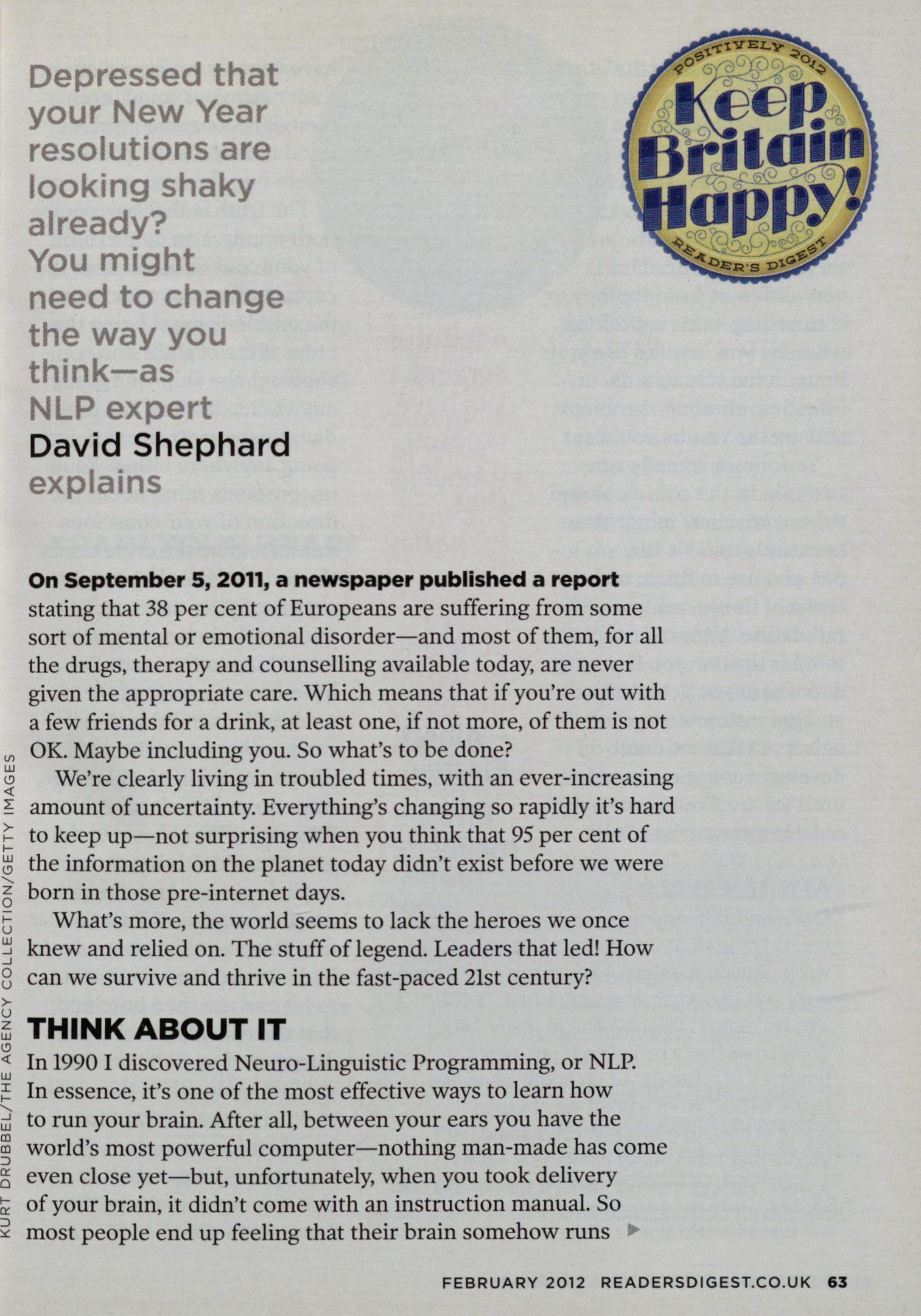
On September 5, 2011, a newspaper published a report stating that 38 per cent of Europeans are suffering from some sort of mental or emotional disorder—and most of them, for all the drugs, therapy and counselling available today, are never given the appropriate care. Which means that if you're out with a few friends for a drink, at least one, if not more, of them is not OK. Maybe including you. So what's to be done?
We're clearly living in troubled times, with an ever-increasing amount of uncertainty. Everything's changing so rapidly it's hard to keep up—not surprising when you think that 95 per cent of the information on the planet today didn't exist before we were born in those pre-internet days.
What's more, the world seems to lack the heroes we once knew and relied on. The stuff of legend. Leaders that led! How can we survive and thrive in the fast-paced 21st century?
THINK ABOUT IT
In 1990 I discovered Neuro-Linguistic Programming, or NLP. In essence, it's one of the most effective ways to learn how to run your brain. After all, between your ears you have the world's most powerful computer—nothing man-made has come even close yet—but, unfortunately, when you took delivery of your brain, it didn't come with an instruction manual. So most people end up feeling that their brain somehow runs ►
KURT DRUBBEL/ THE AGENCY COLLEC TION/GETTY IMAGE S
FEBRUARY 2012 READERSDIGEST.CO.UK 63
• them rather than the other way around. So how do you put yourself back in the driving seat?
The secret is to develop a few techniques for taking control of your mind—and therefore your life. This is very different from therapy or counselling—this is training, whereby you learn to use your brain in the way nature intended, eliminate problems and get the results you want.
Your brain actually runs two minds: the conscious and the unconscious mind. Your conscious mind is the one you use to think, make sense of things, analyse and rationalise. Your unconscious mind is the one you feel with, and where you get intuitions and gut instincts. Psychol ogists say that we don't develop a conscious mind until we are five to seven years old. However, most adults
ATTITUDE IS ALL
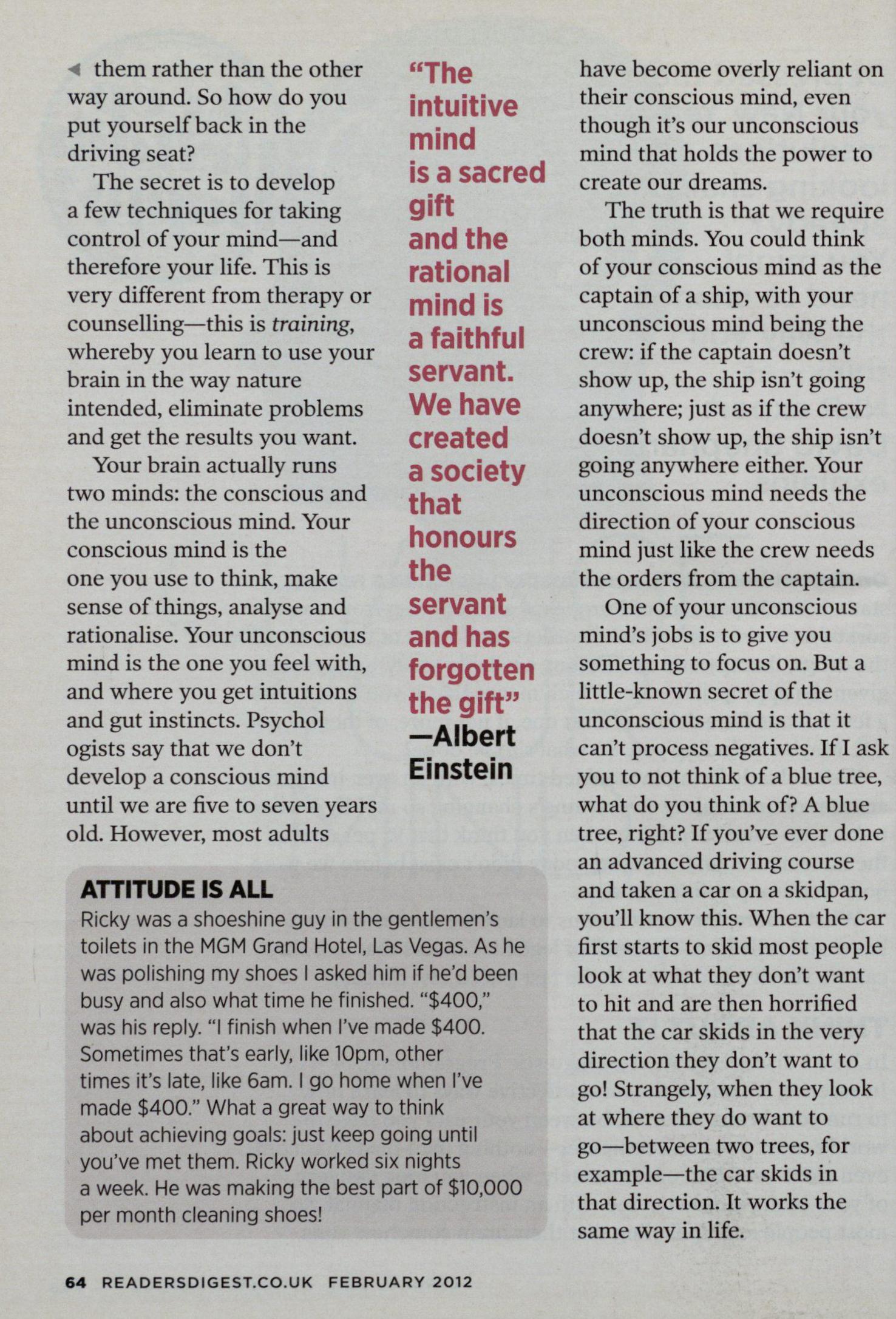
"The intuitive mind is a sacred gift and the rational mind is a faithful servant. We have created a society that honours the servant and has forgotten the gift" —Albert Einstein
Ricky was a shoeshine guy in the gentlemen's toilets in the MGM Grand Hotel, Las Vegas. As he was polishing my shoes I asked him if he'd been busy and also what time he finished. "$400," was his reply. "I finish when I've made $400. Sometimes that's early, like 10pm, other times it's late, like 6am. I go home when I've made $400." What a great way to think about achieving goals: just keep going until you've met them. Ricky worked six nights a week. He was making the best part of $10,000 per month cleaning shoes!
have become overly reliant on their conscious mind, even though it's our unconscious mind that holds the power to create our dreams.
The truth is that we require both minds. You could think of your conscious mind as the captain of a ship, with your unconscious mind being the crew: if the captain doesn't show up, the ship isn't going anywhere; just as if the crew doesn't show up, the ship isn't going anywhere either. Your unconscious mind needs the direction of your conscious mind just like the crew needs the orders from the captain.
One of your unconscious mind's jobs is to give you something to focus on. But a little-known secret of the unconscious mind is that it can't process negatives. If I ask you to not think of a blue tree, what do you think of? A blue tree, right? If you've ever done an advanced driving course and taken a car on a skidpan, you'll know this. When the car first starts to skid most people look at what they don't want to hit and are then horrified that the car skids in the very direction they don't want to go! Strangely, when they look at where they do want to go—between two trees, for example—the car skids in that direction. It works the same way in life.
64 READERSDIGEST.CO.UK FEBRUARY 2012
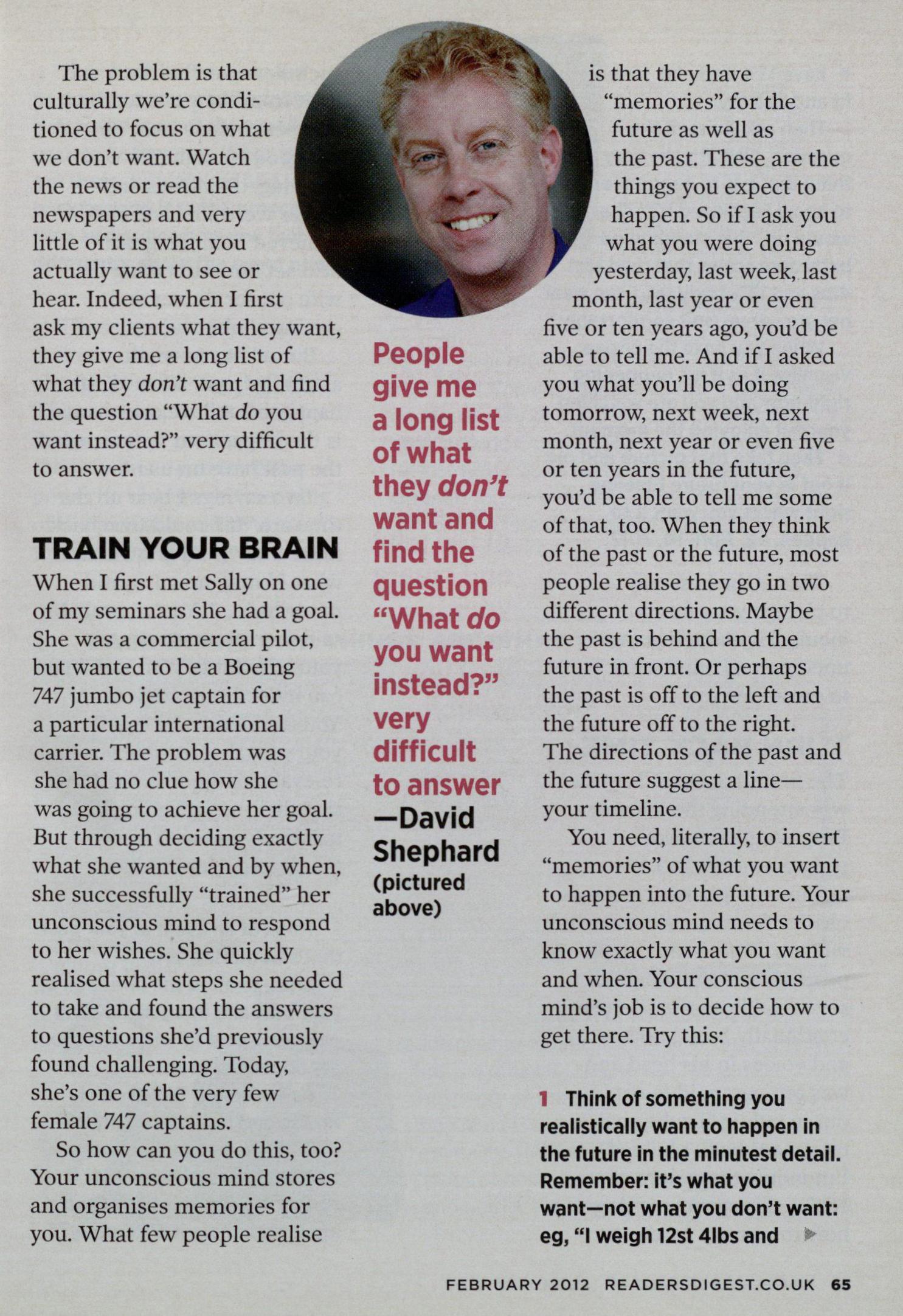
The problem is that culturally we're conditioned to focus on what we don't want. Watch the news or read the newspapers and very little of it is what you actually want to see or hear. Indeed, when I first ask my clients what they want, they give me a long list of what they don't want and find the question "What do you want instead?" very difficult to answer.
TRAIN YOUR BRAIN
When I first met Sally on one of my seminars she had a goal. She was a commercial pilot, but wanted to be a Boeing 747 jumbo jet captain for a particular international carrier. The problem was she had no clue how she was going to achieve her goal. But through deciding exactly what she wanted and by when, she successfully "trained" her unconscious mind to respond to her wishes. She quickly realised what steps she needed to take and found the answers to questions she'd previously found challenging. Today, she's one of the very few female 747 captains.
So how can you do this, too? Your unconscious mind stores and organises memories for you. What few people realise
People give me a long list of what they don't want and find the question "What do you want instead?" very difficult to answer —David Shephard (pictured above)
is that they have "memories" for the future as well as the past. These are the things you expect to happen. So if I ask you what you were doing yesterday, last week, last month, last year or even five or ten years ago, you'd be able to tell me. And if I asked you what you'll be doing tomorrow, next week, next month, next year or even five or ten years in the future, you'd be able to tell me some of that, too. When they think of the past or the future, most people realise they go in two different directions. Maybe the past is behind and the future in front. Or perhaps the past is off to the left and the future off to the right. The directions of the past and the future suggest a line— your timeline.
You need, literally, to insert "memories" of what you want to happen into the future. Your unconscious mind needs to know exactly what you want and when. Your conscious mind's job is to decide how to get there. Try this:
1 Think of something you realistically want to happen in the future in the minutest detail. Remember: it's what you want—not what you don't want: eg, "I weigh 12st 4lbs and
FEBRUARY 2 012 READERSDIGEST.CO.UK 65
have 13% body fat. I am both fit and healthy.
2 Then ask yourself the question, "What's the very last thing that has to happen for me to know I achieved it?" That would be, "I'm standing on bathroom scales that read 12st 4lbs and 13% body fat. I can wear my grey dress/suit comfortably."
3 When you have the answer, visualise it as if it's happening right now and you are watching yourself enjoying the moment.
4 Then take that picture and put it out in your future timeline right where you want it to happen, eg, April 10, 2012.
This is the best way to change your future memories and tell your unconscious mind what to create for you.
TURN BACK TIME
The first time I met Tony he was attending the Warrior Programme (warrior programme.org.uk), a training programme run by a charity for ex-servicemen and women. Tony hadn't slept properly since leaving the services 12 years earlier; he continually heard noises and voices in his head and was too paranoid to eat out in public. Traditional treatment hadn't helped. But in just three days of NLP techniques, learning how to remove emotions
The most important thing to realise is that nothing is just the way it is—you have the power to change the meaning of the past and create your future the way you want it
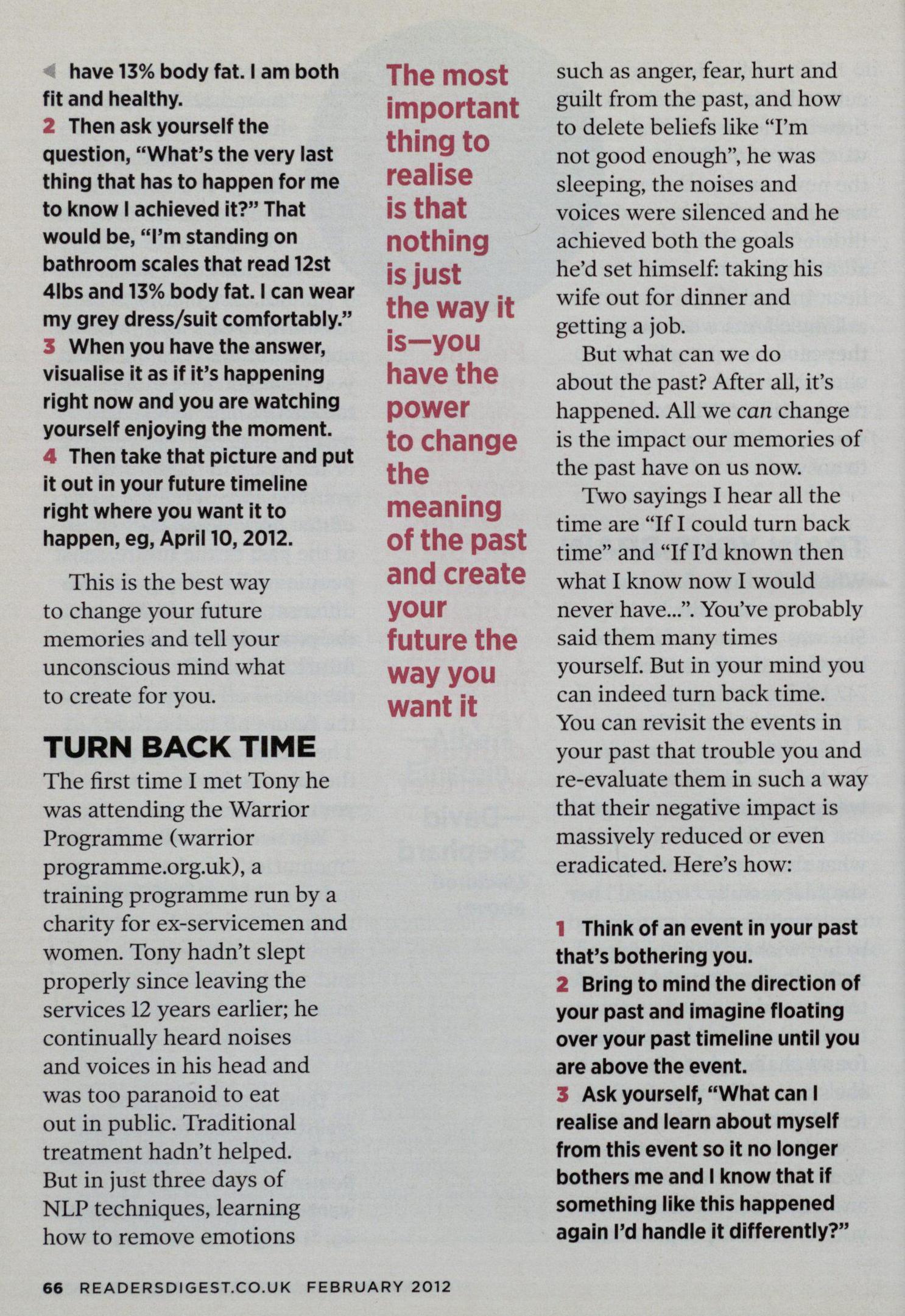
such as anger, fear, hurt and guilt from the past, and how to delete beliefs like "I'm not good enough", he was sleeping, the noises and voices were silenced and he achieved both the goals he'd set himself: taking his wife out for dinner and getting a job.
But what can we do about the past? After all, it's happened. All we can change is the impact our memories of the past have on us now.
Two sayings I hear all the time are "If I could turn back time" and "If I'd known then what I know now I would never have...". You've probably said them many times yourself. But in your mind you can indeed turn back time. You can revisit the events in your past that trouble you and re-evaluate them in such a way that their negative impact is massively reduced or even eradicated. Here's how:
1 Think of an event in your past that's bothering you.
2 Bring to mind the direction of your past and imagine floating over your past timeline until you are above the event.
3 Ask yourself, "What can I realise and learn about myself from this event so it no longer bothers me and I know that if something like this happened again I'd handle it differently?"
66 READERSDIGEST.CO.UK FEBRUARY 2012
4 Then float further over the past so that you are 15 minutes before the start of the event that used to bother you. When you get there, turn around and look back beyond it to the present time and notice how you feel differently about the event now.
These are just two ways that can empower you to change your life for the better. The most important thing to realise is that nothing is just the way it is—you have the power to change the meaning of the past and create your future the way you want it. ■
» David Shephard is one of the world's leading NLP trainers. His new programme, Change Your Mind, Change Your Future— comprising six CDs and a notebook—is available now at a special price of £42 for RD readers (usual price £59.95). A Change Your Mind, Change Your Future event takes place on January 28/29 in Kensington, London. The usual price is £750, but RD readers can attend for just £250. Go to performancepartnership. com/RD for more details of both offers. You can also order a free Introduction to NLP CD.
BACK IN THE DAY: RINGS ARE WHAT THEY USED TO BE
Blow out the candles! "Reader's Digest" was launched 90 years ago this month below a speakeasy in New York. Interestingly, as an article in the first issue shows, accusations of society dumbing down have been flying around long before "The X Factor" had been thought of "Is the Stage Too Vulgar?" had this to say about the theatre in 1922: "There's a vast, ceaseless output of crude, indecent, indifferently acted plays, lingerie farces and suggestive undraped musical comedies, which discredit their managers and degrade the people who patronise them.
THE READER'S DIGEST
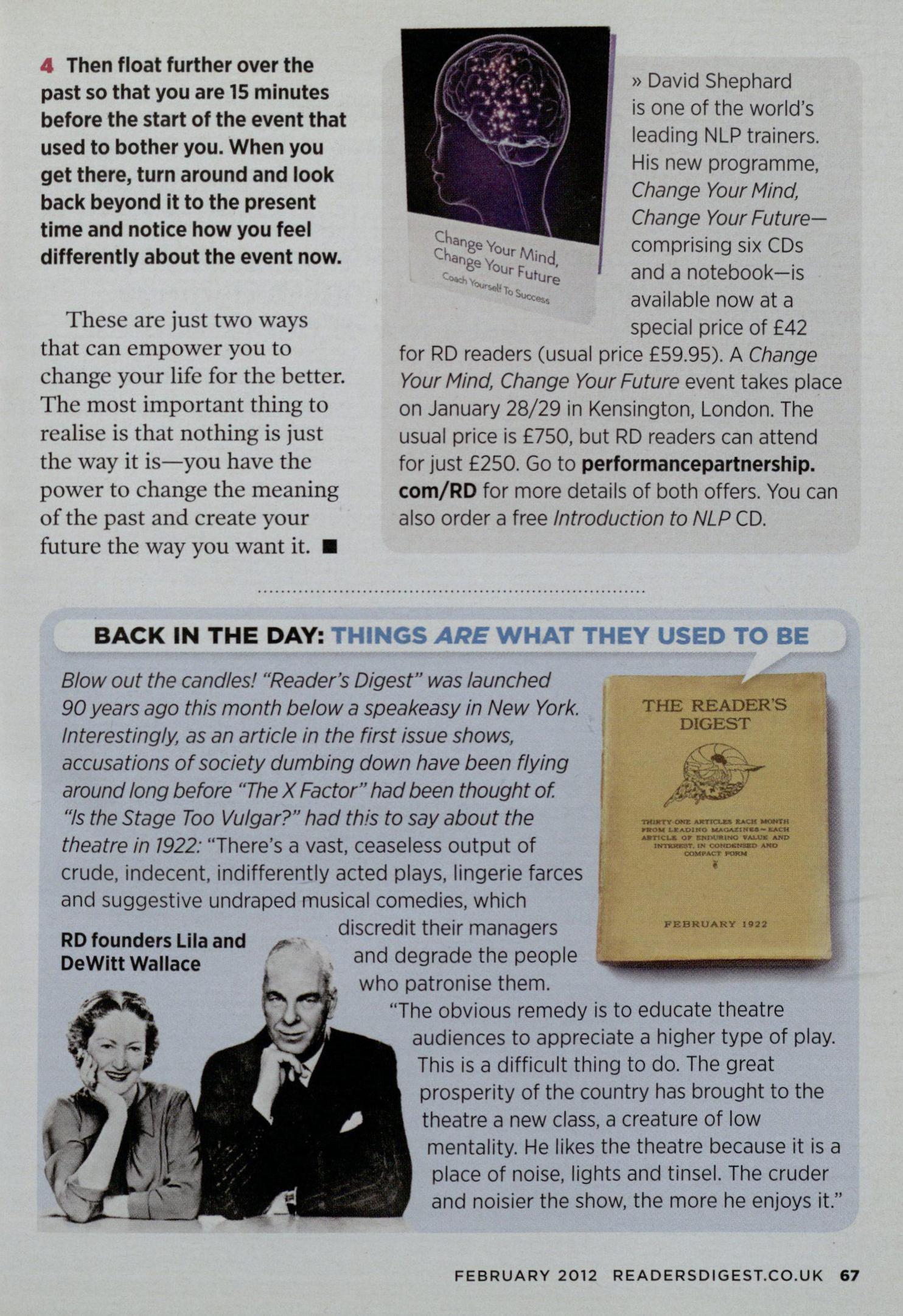
"The obvious remedy is to educate theatre audiences to appreciate a higher type of play. This is a difficult thing to do. The great prosperity of the country has brought to the theatre a new class, a creature of low mentality. He likes the theatre because it is a place of noise, lights and tinsel. The cruder and noisier the show, the more he enjoys it'
TOMTV Mira.. 4.11 WO/VOI Mont LltA.C4M0 br.4CALIKel.- FON ADM. Or BVIIMINO VALI. C010.9. /MD COW.TPDSOR FEEIRUA
—
.018.1.1.11111.1111.W FEBRUARY 2012 READERSDIGEST.CO.UK 67
RD founders Lila and DeWitt Wallace
,41
BY LOLA BORG

Whoever said that modern buildings are "monstrous carbuncles"? (Oh. Sorry, HRH.) The fact is that many of them are spectacular and extraordinary, and Britain has "a huge amount both in number and diversity", says historian Elain Harwood of English Heritage. Here are just a few of our favourites...
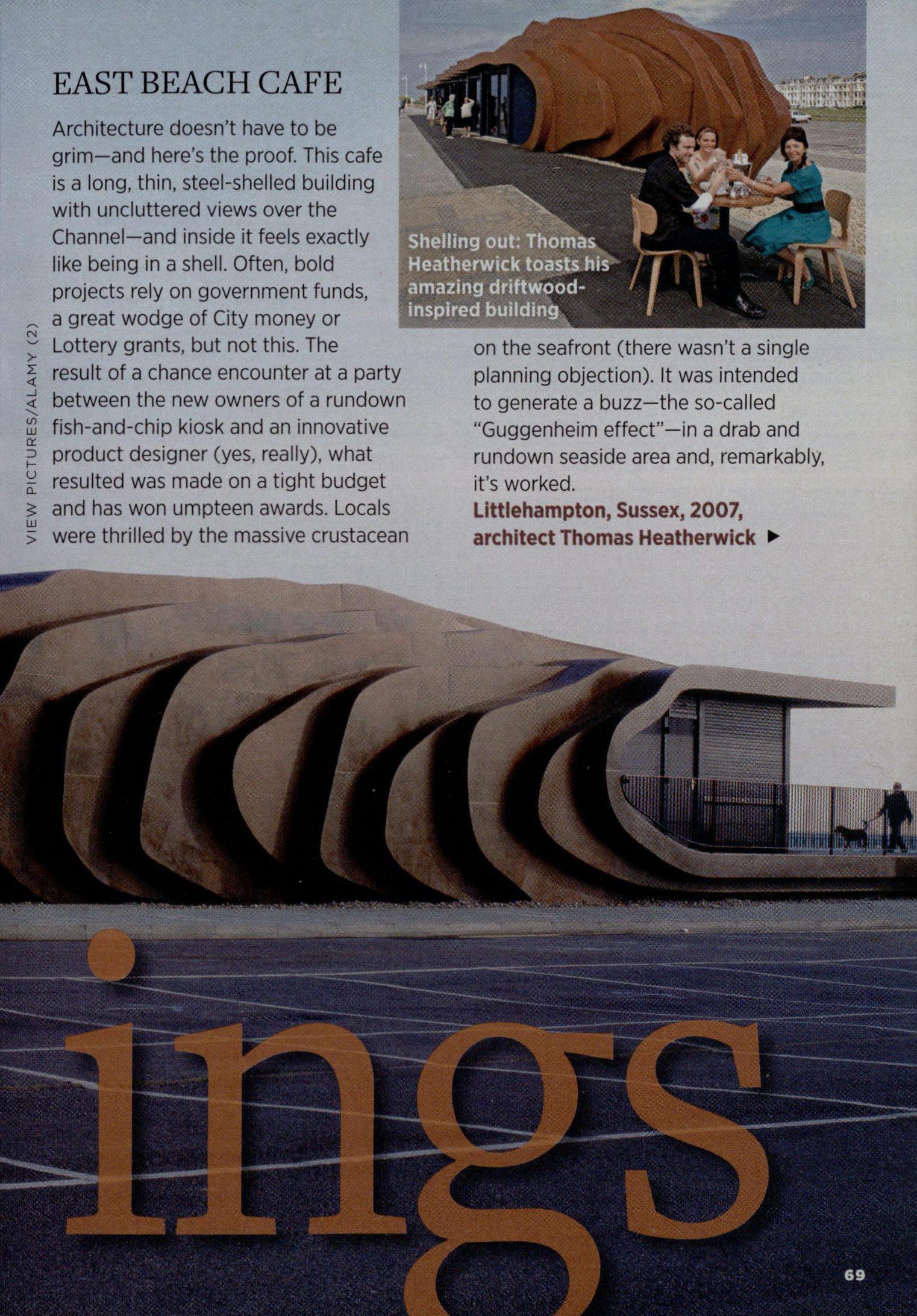
EAST BEACH CAFE
Architecture doesn't have to be grim—and here's the proof. This cafe is a long, thin, steel-shelled building with uncluttered views over the Channel—and inside it feels exactly like being in a shell. Often, bold projects rely on government funds, a great wodge of City money or Lottery grants, but not this. The result of a chance encounter at a party between the new owners of a rundown fish-and-chip kiosk and an innovative product designer (yes, really), what resulted was made on a tight budget and has won umpteen awards. Locals were thrilled by the massive crustacean
n in as 41eatterwick tc*Ithis 'amazing dr odInspired build'
on the seafront (there wasn't a single planning objection). It was intended to generate a buzz—the so-called "Guggenheim effect"—in a drab and rundown seaside area and, remarkably, it's worked.
Littlehampton, Sussex, 2007, architect Thomas Heatherwick
PICTUREV AL AMY ( 2)
VIEW
THE HEPWORTH WAKEFIELD
An intersecting set of ten concrete gallery spaces with a fabulous location on the banks of the River Calder, The Hepworth Wakefield contains some 40 artworks by local sculptor Barbara Hepworth, donated by her family, as well as works by other artists, such as her friend and fellow sculptor Henry Moore. But in contrast to the sculptures—famously all curves and ovals—the building's sharply angled trapezoid shapes reflect the area's industrial heritage, even though it was designed to be "all about the art". (It even has its own specially designed typeface, which can be seen on the building.)
Wakefield, Yorkshire, 2011, David Chipperfield Architects

COVENTRY CATHEDRAL
A potent symbol of Britain's recovery after the Second World War, the rebuilt modernist cathedral (it's next to the ruins of the 14th-century cathedral bombed by the Luftwaffe) was controversial from the get-go. It's unique because it's all of a piece—everything is from the same period: the building and the art it holds (from artists such as Graham Sutherland, Elisabeth Frink and Jacob Epstein), plus the extraordinary painterly stained glass of the nave windows. Even its architect famously described it as "a casket of jewels".
Coventry, 1962, architect Sir Basil Spence
COL IN U NDE RHILL / ALAMY; IAN DAGNALL/AL AM Y
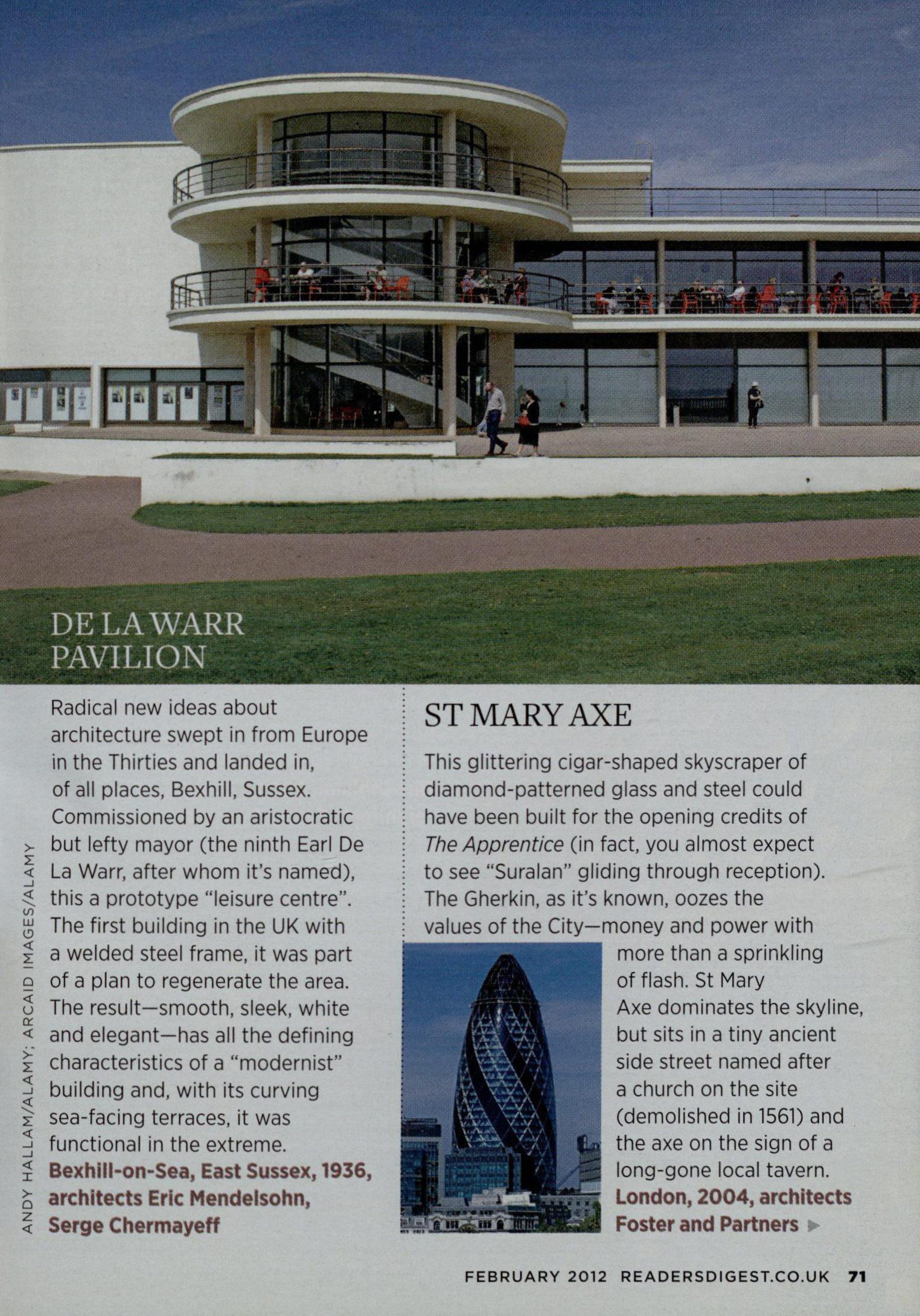
DE LA WARR PAVILION
Radical new ideas about architecture swept in from Europe in the Thirties and landed in, of all places, Bexhill, Sussex. Commissioned by an aristocratic but lefty mayor (the ninth Earl De La Warr, after whom it's named), this a prototype "leisure centre". The first building in the UK with a welded steel frame, it was part of a plan to regenerate the area. The result—smooth, sleek, white and elegant—has all the defining characteristics of a "modernist" building and, with its curving sea-facing terraces, it was functional in the extreme.
Bexhill-on-Sea, East Sussex,1936, architects Eric Mendelsohn, Serge Chermayeff
ST MARY AXE
This glittering cigar-shaped skyscraper of diamond-patterned glass and steel could have been built for the opening credits of The Apprentice (in fact, you almost expect to see "Suralan" gliding through reception). The Gherkin, as it's known, oozes the values of the City—money and power with more than a sprinkling of flash. St Mary Axe dominates the skyline, but sits in a tiny ancient side street named after a church on the site (demolished in 1561) and the axe on the sign of a long-gone local tavern. London, 2004, architects Foster and Partners 0. uglier& -117%,-.4-
1.11.17.21 17 17 " 4 grh°-
ANDY HALL AM/ ALAMY; ARCAI D I MAGES/ ALAMY
111
FEBRUARY 2012 READERSDIGEST.CO.UK 71

SELFRIDGES
The Bull Ring in Birmingham was once a depressingly grim and utilitarian inner-city precinct. But one building changed all that. It was a bold move for Selfridges to ask Future Systems (which also designed the media centre at Lord's Cricket Ground) for a new department store. The massive undulating building (it's known as "blobitecture") looks like a remnant from an episode of Doctor Who. Or maybe Teletubbies. In fact, the design was based on a Paco Rabanne Sixties chainmail dress and covered in 1,500 shiny aluminium discs that shimmer in the dark. The interior is as bold, with snaky white escalators leading down to the food hall. Some dismiss it as "silly", but as English Heritage's Elain Harwood says, "It's a building that always makes you smile." What could possibly tie wrong with that? Birmingham, 2003, architects Future Systems
BALTIC CENTRE FOR CONTEMPORARY ART
In the 1970s the UK saw an economic downturn, the start of the conservation movement and the stirrings of appreciation of our architectural heritage. This passion for "found spaces" meant that instead of ripping buildings down, we began to think of refurbishing them. Step forward the Baltic. Originally the Rank Hovis Flour Mill, it was a vast concrete hulk that had fallen into decline and was earmarked to be converted into flats until Gateshead Council stepped in. The extraordinary shell was retained and the interior (a huge wheat silo) turned into four floors of an arts centre that has a
THE HOMEWOOD
Very few architects get to design and live in their vision of the perfect house, but Patrick Gwynne achieved just that, at only 24. And what a house. The Homewood, built in Esher in 1938, is an elegant glass-and-concrete modernist box, raised up and seemingly floating over its 4,,.

feeling of airiness. The location can't be faulted—it overlooks the "Blinking Eye" (the elegant Wilkinson Bridge over the River Tyne)—and by hosting last year's Turner Prize award ceremony (usually held in London), the building generated more heat than even Geordie Shore.
Gateshead, 2002, Ellis Williams Architects
surrounding garden. Waft up the elegant white concrete staircase into the glasswalled living room and feel like you've turned into Mad Men's Don or Betty Draper. Gwynne didn't stint on detail or money (financed by the bank of Mum and Dad, it cost £10,000—a fortune at the time). He lived here all his life, constantly refining the house (it has a Seventies kitchen). It was left to the National Trust after his death on the condition that it's lived in by a family—and it is. But you can still visit (contact the National Trust to make the arrangements).
Esher, Surrey, 1938, architect Patrick Gwynne t4,
BL IMAG EVALAMY: MAR K F AN NES/ ARCAID/ AL AMY LAMY ( LEFT)
73
WALES MILLENNIUM CENTRE (CANOLFAN MILENIWM CYMRU)
"Architecture is the will of the age expressed in spatial terms," said influential German architect Mies van der Rohe. And this is a perfect example. Conceived in the heady days of New Labour and during the first noises about regional government, this huge sweeping arts complex had one brief—to be "unmistakably Welsh"—and there's really no arguing with that. The architect was Welsh, the materials—slate, steel, glass—are Welsh. Hell, even the inscriptions along the frontage, dramatically lit from inside at night, are mostly in Welsh. ("Creu
AND LOOK OUT FOR...
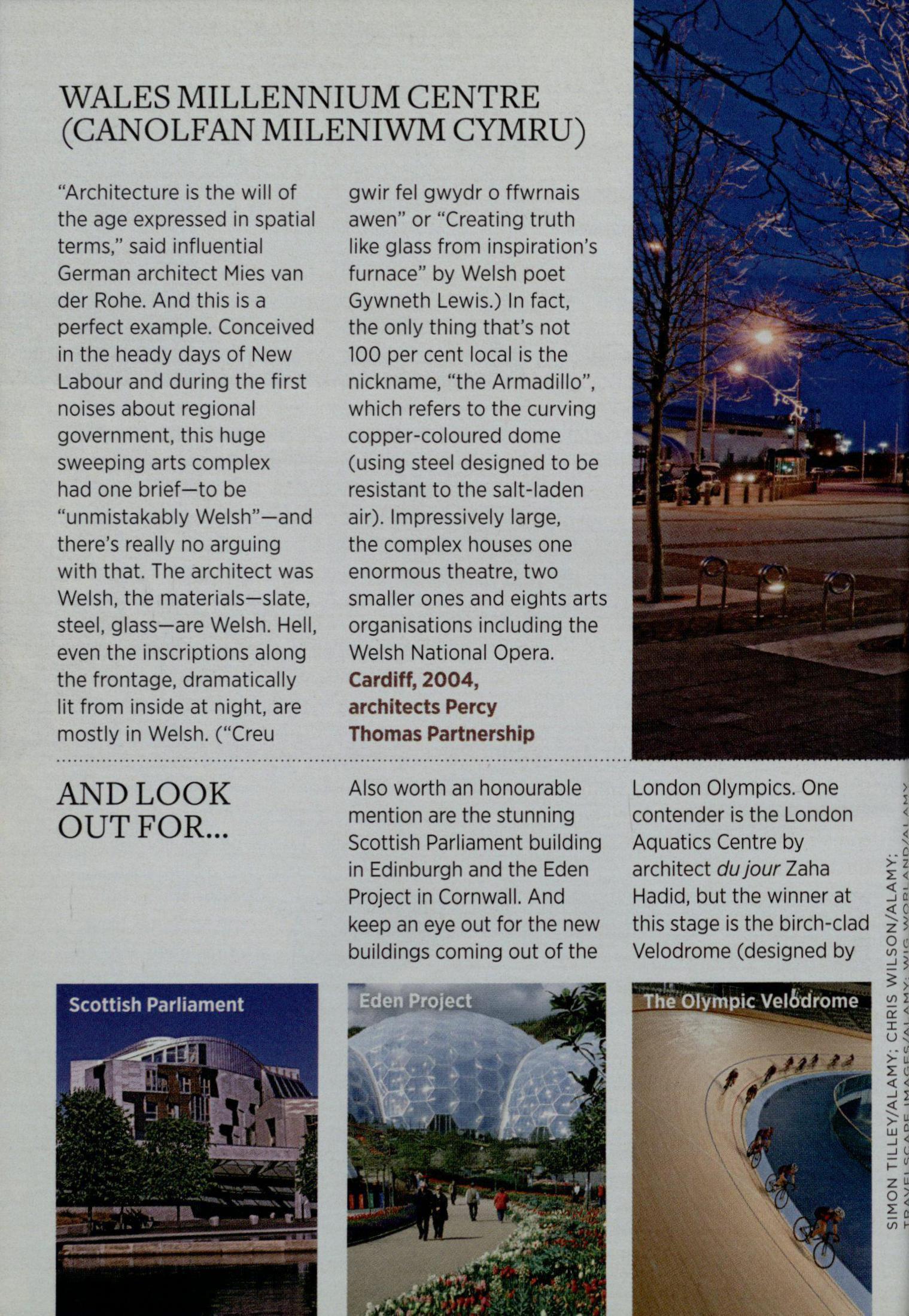
gwir fel gwydr o ffwrnais awen" or "Creating truth like glass from inspiration's furnace" by Welsh poet Gywneth Lewis.) In fact, the only thing that's not 100 per cent local is the nickname, "the Armadillo", which refers to the curving copper-coloured dome (using steel designed to be resistant to the salt-laden air). Impressively large, the complex houses one enormous theatre, two smaller ones and eights arts organisations including the Welsh National Opera. Cardiff, 2004, architects Percy Thomas Partnership
Also worth an honourable mention are the stunning Scottish Parliament building in Edinburgh and the Eden Project in Cornwall. And keep an eye out for the new buildings coming out of the
London Olympics. One contender is the London Aquatics Centre by architect du jour Zaha Hadid, but the winner at this stage is the birch-clad Velodrome (designed by
The Olympic Vel6drome
Yz x< ft z3 oc c.);' < _J <yu -1 4 L Z o C fa 71I-
Hopkins Architects), though this may be something to do with the anticipation of medals. Any building that has a nickname that's already worked its way into the public's affections— it's known as "the Pringle" because of its swooping roof— is a winner. Simple, understated, elegant—and finished (test events take place next month).
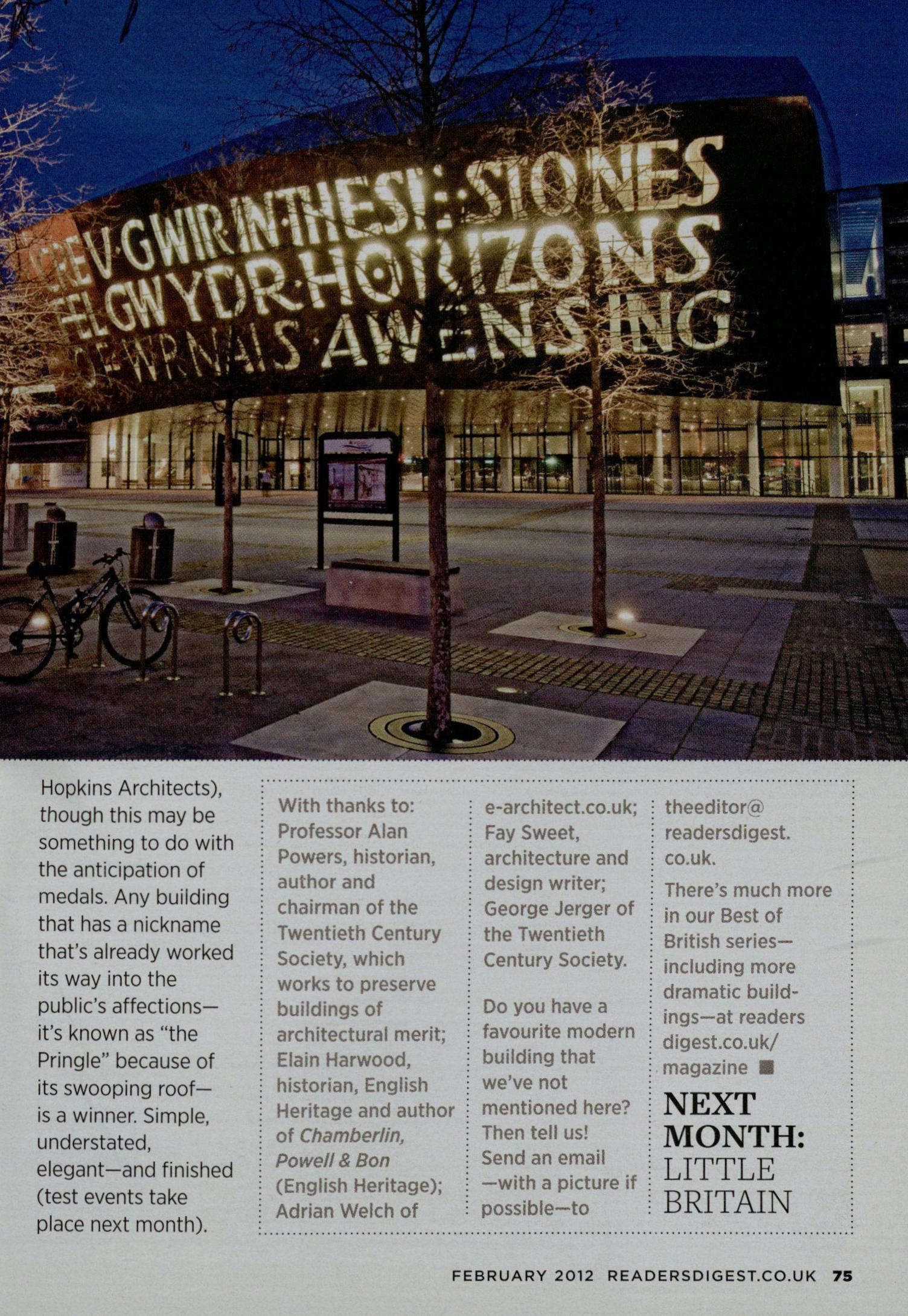
With thanks to: Professor Alan Powers, historian, author and chairman of the Twentieth Century Society, which works to preserve buildings of architectural merit; Elain Harwood, historian, English Heritage and author of Chamberlin, Powell & Bon (English Heritage); Adrian Welch of
e-architect.co.uk; Fay Sweet, architecture and design writer; George Jerger of the Twentieth Century Society.
Do you have a favourite modern building that we've not mentioned here? Then tell us! Send an email —with a picture if possible—to theeditor;a= readersdigest. co.uk.
There's much more in our Best of British series— including more dramatic buildings—at readers digest.co.uk/ magazine ■
NEXT MONTH: LITTLE BRITAIN
FEBRUARY 2012 READERSDIGEST.CO.UK 75
Art Malik

...THE SNOOKER TABLE IN OUR ONE-BEDROOM FLAT IN FINSBURY PARK, NORTH LONDON. Two of my older brothers slept underneath it, while my other brother and I slept on the floor in the dressing area. We were all born in Pakistan but came to England in 1956, when I was three, and my sister was born here. My father was studying for his ophthalmology fellowship. We later moved to a house in Balham, south London.
...COMING HOME BLOODIED AND BRUISED, AGED EIGHT. I'd been attacked by a gang of boys in Clapham Junction. My father said, "What did you do? You must have said something to provoke the attack."
But I hadn't. He suffered trom what I call the "invisible damage" inflicted on people who had grown up in the shadow of imperial rule, which left them with a deep-rooted—maybe unconscious—feeling that they were second-class citizens.
...THE WONDERFUL AROMAS FROM THE SPICES MY MOTHER USED IN HER DELICIOUS COOKING. If you sat down, she put food in front of you and, if she wasn't cooking, then she
was sewing clothes for us. There weren't many Asian restaurants in the UK in the 50s and early 60s, and none of my British friends had ever tasted anything quite so good as my mother's cooking.
...SHOWING MY TEACHER A LETTER I HAD WRITTEN TO BLUE PETER. She said, "Athar, I'm afraid the BBC isn't interested in people who aren't English." Even as a seven-year-old child I knew that her mindset was wrong and, years later, when I worked for the BBC, I found no evidence of any such racist attitudes.
...PEOPLE FROM ALL NATIONALITIES COMING TO OUR HOUSE. We socialised with Pakistanis, Indians, British, Scandanavians, South Americans —everyone was welcome in our home. I never felt like an outsider and it was an amazing way to grow up.
...MY FATHER WOULD DO ANYTHING FOR THE GOOD OF OUR EDUCATION. He and my mother believed every one of their children could achieve greatness. He only had three suits and four shirts but, if you needed a book, his wallet was open to you. Once, ►
76 READERSDIGEST.CO.UK FEBRUARY 2 012 COLIN BELL/CORBIS OUTLINE

• 0.10 if ‘, ,-. / ..:-; , • :. I • • iaivata.:7
wanted to go to the pictures and asked him for the price of the ticket, but he told me it wasn't a very good pursuit. So, a couple of days later, I told him there was this physics book I needed to buy...
...BEING SENT TO BOARDING SCHOOL IN QUETTA, WEST PAKISTAN. I was ten. The school was run by my uncle, an ex-Cambridge man, and two of my older brothers were already there. But, when my mother put us on the Fokker Friendship plane to fly from Karachi [in the south of the country] to Quetta, I bawled my eyes out. My mother returned to the UK and I didn't see either of my parents for a year.
...THAT WAS THE WORST YEAR OF MY LIFE.I'd not only left my parents behind but my best friend, too, and I was desperately homesick.
I was considered exotic in Quetta, because I was from London. They couldn't believe the stories I told—about the buses you could go upstairs in, how very cold it was, and how there weren't any servants in Britain so you had to get your own coal

My school reports always complained, "This boy is completely at sea"
Art with Gary Whelan in one of his earliest TV roles, in ITV's The Reaper (1979)
from the cellar. Pakistanis then had a sort of Dick Whittington attitude about London—a belief that the streets might be paved in gold. That was a misconception I soon put right!
...MY MOTHER SAID, "ENOUGH!" AT THE END OF THAT YEAR. She saw what an ordeal Quetta had been and said, "My children aren't going again." Later on in life, I had to acknowledge the feelings of abandonment and loneliness I'd felt there.
...MY FIRST ACTING ROLE AT TOOTING BEC GRAMMAR SCHOOL. I played the aunt in The Pen of My Aunt in our inter-house drama competition and, although we came last, I realised that acting was something I could do. I'm dyslexic and my school reports always complained, "This boy is completely at sea," which was true. If I didn't understand what was going on in lessons, I'd go somewhere else in my imagination.
...TELLING MY PARENTS I WANTED TO GO TO DRAMA SCHOOL.I needed to have some fairly pragmatic answers to their questions about the unemployment
V) LU Ce FLU LL X LU LU CC 7 Lu LL CC 0 6 -J 11.1 LU CC U78 READERSDIGEST.CO.UK FEBRUARY 2012
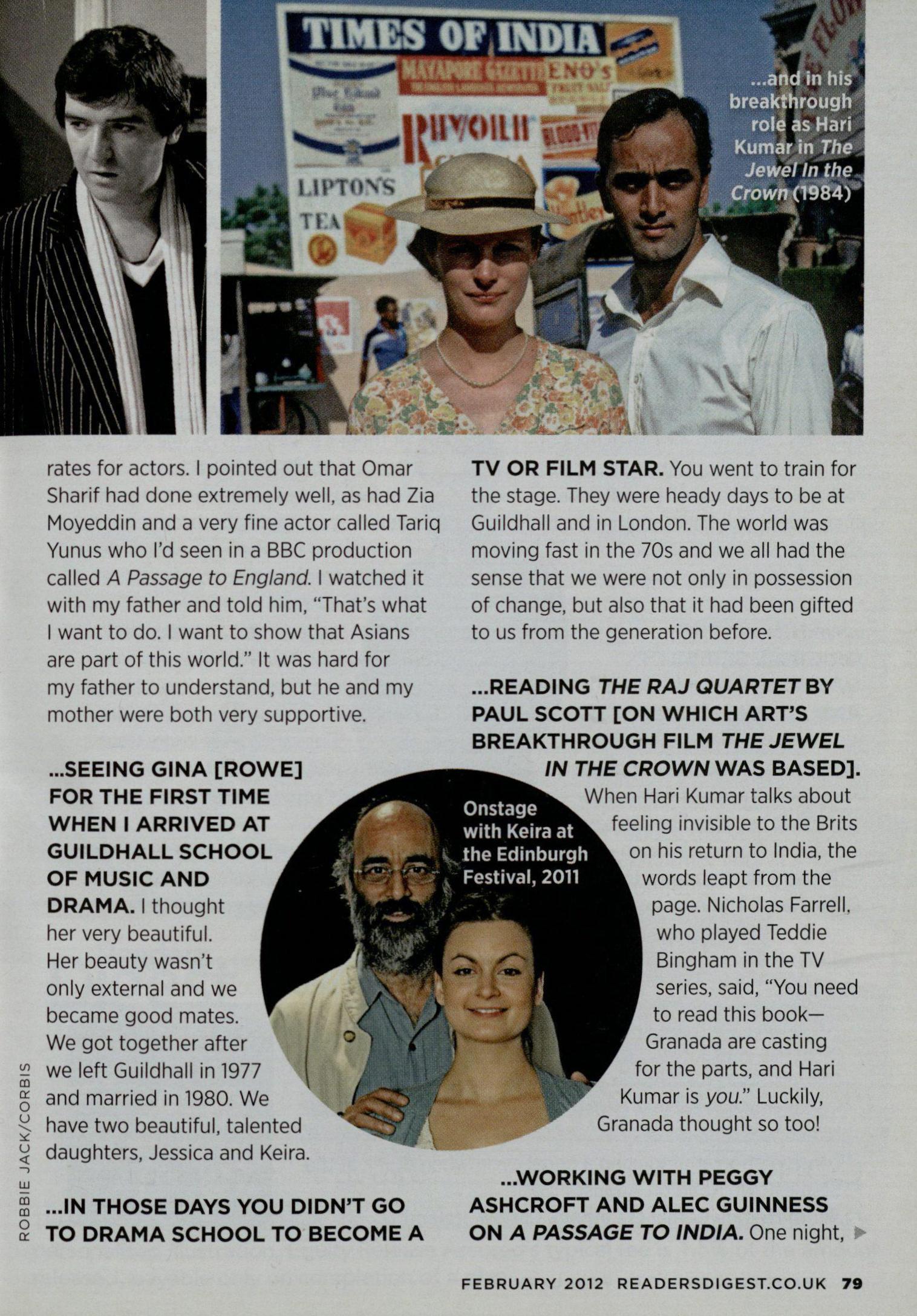
rates for actors. I pointed out that Omar Sharif had done extremely well, as had Zia Moyeddin and a very fine actor called Tariq Yunus who I'd seen in a BBC production called A Passage to England. I watched it with my father and told him, "That's what I want to do. I want to show that Asians are part of this world." It was hard for my father to understand, but he and my mother were both very supportive.
...SEEING GINA [ROWE] FOR THE FIRST TIME WHEN I ARRIVED AT GUILDHALL SCHOOL OF MUSIC AND DRAMA. I thought her very beautiful. Her beauty wasn't only external and we became good mates. We got together after we left Guildhall in 1977 and married in 1980. We have two beautiful, talented daughters, Jessica and Keira.
...IN THOSE DAYS YOU DIDN'T GO TO DRAMA SCHOOL TO BECOME A
TV OR FILM STAR. You went to train for the stage. They were heady days to be at Guildhall and in London. The world was moving fast in the 70s and we all had the sense that we were not only in possession of change, but also that it had been gifted to us from the generation before.
...READING THE RAJ QUARTET BY PAUL SCOTT [ON WHICH ART'S BREAKTHROUGH FILM THE JEWEL IN THE CROWN WAS BASED]. When Hari Kumar talks about feeling invisible to the Brits on his return to India, the words leapt from the page. Nicholas Farrell. who played Teddie Bingham in the TV series, said, "You need to read this book— Granada are casting for the parts, and Hari Kumar is you." Luckily, Granada thought so too!
...WORKING WITH PEGGY ASHCROFT AND ALEC GUINNESS ON A PASSAGE TO INDIA. One night, Onstage with Keira at the Edinburgh Festival, 2011
ROBBIE J ACK/ CORBIS
FEBRUARY 2012 READERSDIGEST.CO.UK 79
. Dame Peggy said to me, "Will you have dinner with me tonight?" and I replied, "It's February 14th, but I'd be delighted to be your Valentine!"
...ARNOLD SCHWARZENEGGER
INVITING ME TO JOIN HIM TO EAT
SUSHI IN HIS TRAILER during the filming of True Lies. "I'm having it flown in from Miami," he said, with as much insouciance as if he'd ordered a local takeaway. Tom Arnold joined Arnie and I, and they began discussing the cost of Lear jets. Tom told him he'd just got one for $25 million. Arnie said, "$25 million? That's good," but all I could think about was that Gina had just rung me to say the silencer on our old Volvo had gone...
...WATCHING THE ORIGINAL SERIES OF UPSTAIRS DOWNSTAIRS
AND LOVING IT. The first TV job I ever got was in ITV's The Professionals and, even though I only had one line, I worked so hard on it because I had to say it in front of Gordon Jackson—the legendary Hudson from Upstairs Downstairs! And now here I am

(below) in the new series. It's fantastic— the scripts are delightful, as are the cast.
...ONE OF THE NICEST MEMORIES WAS WORKING WITH JESSICA AND KEIRA LAST YEAR AT THE EDINBURGH FRINGE. We did a play together called Rose. Jessica produced and I acted alongside Keira. It was wonderful to be with them and the other fabulously energised young people there.
...GAINING SOME WISDOM.
If there's a lesson to be learned, then learn it. Perhaps the recession is helping people see what's important in life—your family and your health, as opposed to what you own. It doesn't matter whether you learn life's lessons from the old or young —everyone can teach you something. Right now, I'm learning what it feels like to be an actor in his late 50s— but I still never know what's around the corner. ■ As told to Caroline Hutton
» The new series of Upstairs Downstairs begins on February 19 on BBC One.
SLIGHTLY HARD TO SWALLOW
An extract from our local paper, the Car/ow People: "A bench warrant was issued at last week's sitting of Carlow District Court for George Butura, 48 Willow Park, Tullow Road. The warrant was issued when Butura failed to appear to answer a charge of riding a pedal cycle without reasonable consideration and drinking a pedal cycle when drunk at the Staplestown Road on August 1, 2011."
Submitted by Cathal 0 Cathain, Carlow, Ireland
80 READERSDIGEST.CO.UK FEBRUARY 2012

Readers Digest have teamed up with Equity Release Assured to offer a dedicated equity release advice service.
Equity release could help you enjoy life to the full by enabling you to unlock tax-free cash from your home to spend however you choose... without the need to move!
Equity Release Assured's specialist advisers will;
Help you safely release cash with no monthly repayments
Tell you if equity release is right for you
Recommend plans from leading providers who offer guarantees for your safety and protection
Arrange everything over the phone for your convenience - no intrusive home visit
Explain how plans reduce the value Pei of your estate and can affect your °KsJo' entitlement to state benefits FREEPHONE our UK-based team of specialist advisers on
4,.41 Do6gt ibp
Equity
a richer future...
0800 331 7728 To order your FREE guide today! Lines are open Monday to Friday 9am - 5.30pm
Financial Services =11=1:01
Release Assurec Enjoy
with equity release
This is an equity release plan. To understand the features and risks please ask for a personalised illustration. Equity Release Assured's typical fee is 1.5% of the amount released, payable only on completion of a plan.
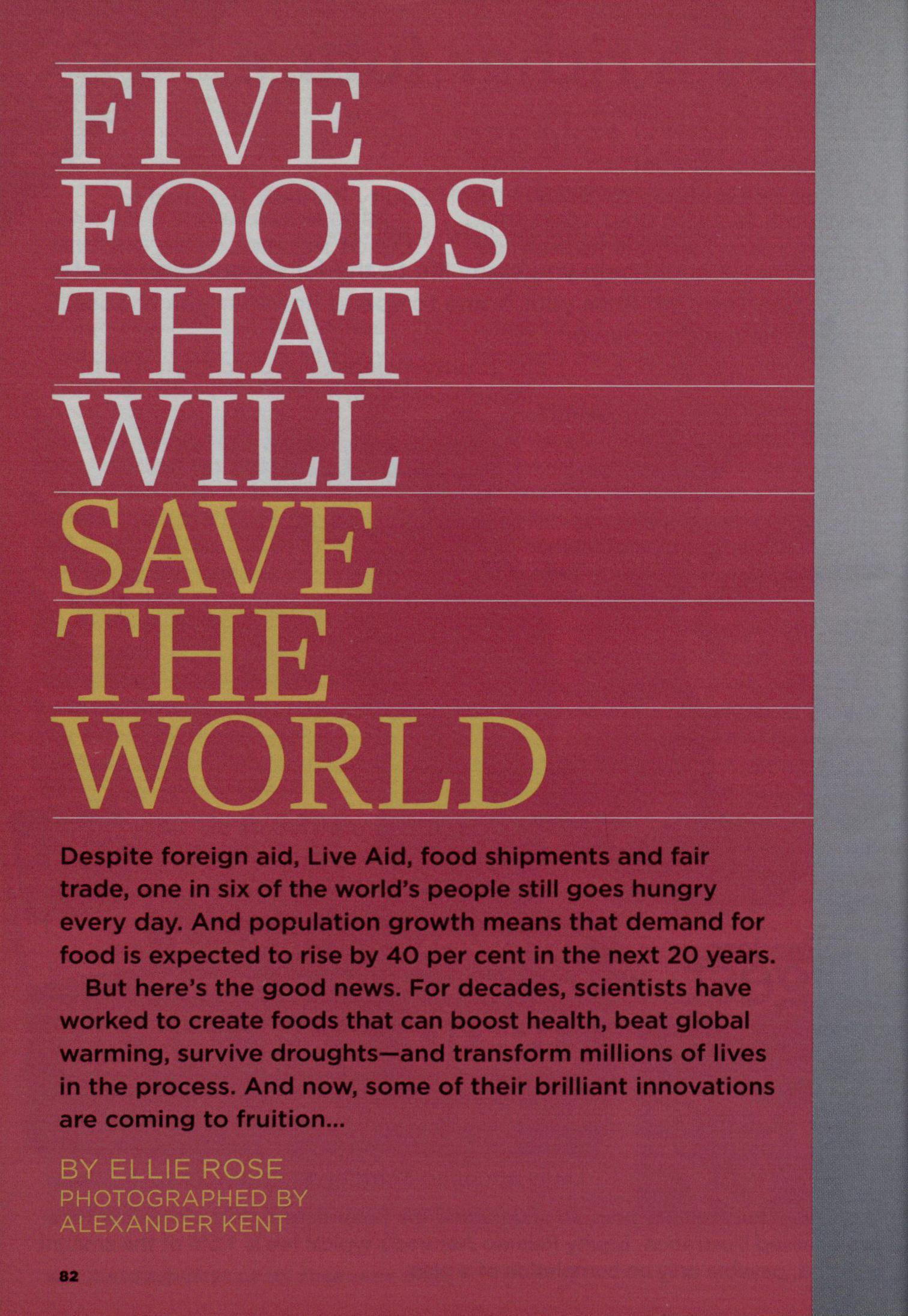
FIVE FOODS THAT WILL SAVE THE ttf in
Despite foreign aid, Live Aid, food shipments and fair trade, one in six of the world's people still goes hungry every day. And population growth means that demand for food is expected to rise by 40 per cent in the next 20 years.
But here's the good news. For decades, scientists have worked to create foods that can boost health, beat global warming, survive droughts—and transform millions of lives in the process. And now, some of their brilliant innovations are coming to fruition...
BY. L PHOTOGRAPHED ALEXANDER KENT
SCUBA RICE
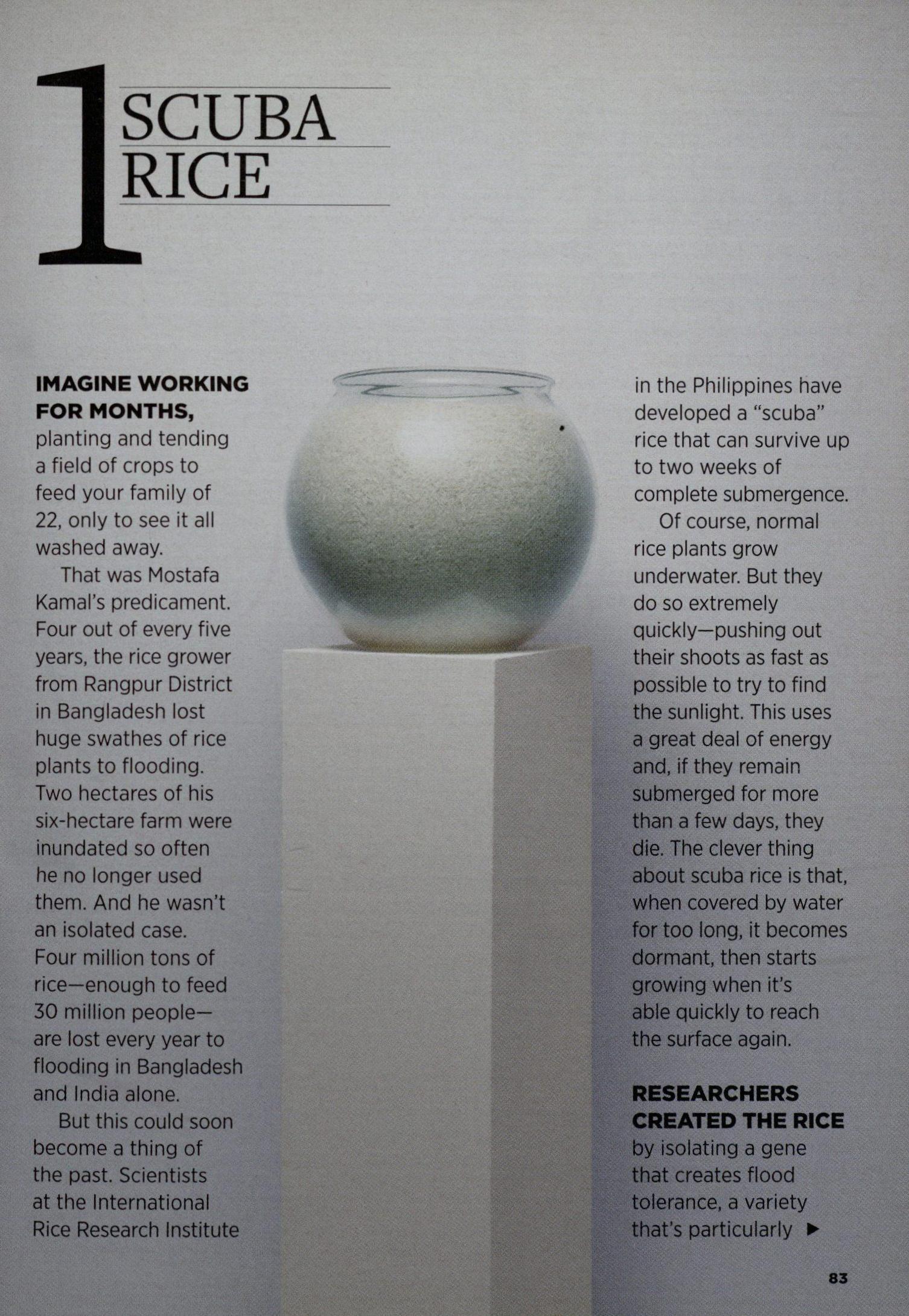
IMAGINE WORKING in the Philippines have FOR MONTHS, developed a "scuba" planting and tending rice that can survive up a field of crops to to two weeks of feed your family of complete submergence. 22, only to see it all Of course, normal washed away. rice plants grow
That was Mostafa underwater. But they Kamal's predicament. do so extremely
Four out of every five quickly—pushing out years, the rice grower their shoots as fast as from Rangpur District possible to try to find in Bangladesh lost the sunlight. This uses huge swathes of rice a great deal of energy plants to flooding. and, if they remain
Two hectares of his submerged for more six-hectare farm were than a few days, they inundated so often die. The clever thing he no longer used about scuba rice is that, them. And he wasn't when covered by water an isolated case. for too long, it becomes
Four million tons of dormant, then starts rice—enough to feed growing when it's 30 million people— able quickly to reach are lost every year to the surface again. flooding in Bangladesh and India alone. RESEARCHERS
But this could soon CREATED THE RICE become a thing of by isolating a gene the past. Scientists that creates flood at the International tolerance, a variety Rice Research Institute that's particularly •
83
hardy but whose yields are too low for commercial use. They then transferred the gene into new high-yield "mega varieties" with good grain quality and pest-resistance attributes.
After three years of testing across South Asia, the first scubarice strain was released in February 2009. Scientists are now trying to create more varieties that are adapted to different environments.
THE BREAKTHROUGH WAS 30 YEARS IN THE MAKING. Its lead developer, the International Rice Research Institute's Dr David Mackill, tried to breed a rice in the 1980s, but the science wasn't advanced enough and the results tasted awful. His perseverance has paid off now, though. Mostafa has been one of the farmers testing scuba seeds and has seen a 50 per cent increase in his crop. This, he says, is life-changing. "Two extra hectares [of production] is a big jump."
It's hoped that the rice will be available to some 18 million developingworld farming families by 2021.
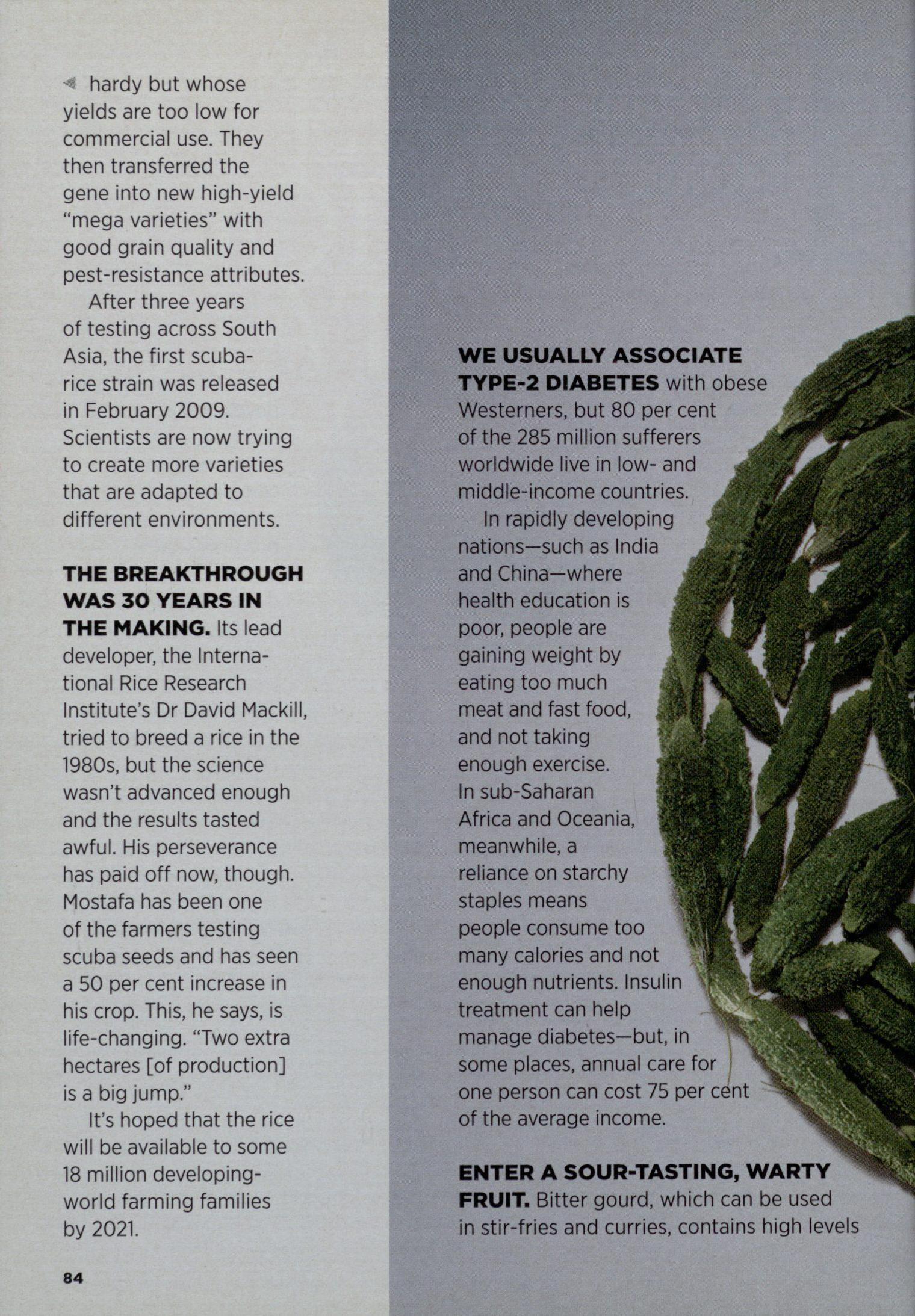
WE USUALLY ASSOCIATE TYPE-2 DIABETES with obese Westerners, but 80 per cent of the 285 million sufferers worldwide live in low- and middle-income countries.
In rapidly developing nations—such as India and China—where health education is poor, people are gaining weight by eating too much meat and fast food, and not taking enough exercise. In sub-Saharan Africa and Oceania, meanwhile, a reliance on starchy staples means people consume too many calories and not enough nutrients. Insulin treatment can help manage diabetes—but, in some places, annual care for one person can cost 75 per cent of the average income.
ENTER A SOUR-TASTING, WARTY FRUIT. Bitter gourd, which can be used in stir-fries and curries, contains high levels
84
2
BITTER GOURD

of charantin, which increases insulin sensitivity and compounds that activate AMPK, a protein that regulates glucose uptake. It also has a form of lectin (a sugar-binding protein) that lowers blood glucose and suppresses appetite. In 2007, the Philippine Department of Health found that a serving has a similar effect to a daily dose of the anti-diabetes drug glibenclamide.
SCIENTISTS AT THE WORLD
VEGETABLE CENTRE
based in Taiwan are experimenting with 280 different varieties of the fruit—which grows in the tropics and sub-tropics—to try to cross-breed a "super" version with maximum anti-diabetic effect. The centre hopes to have the variety ready for market within five to eight years.
85
THEY
MIGHT NOT SOUND DYNAMIC, but mung beans are playing a vital role in feeding some of the most vulnerable people in South Asia.
"Women and kids are particularly at risk as they often don't have a very high position in society, so the men eat first and they get the leftovers," says Dr Jacqueline Hughes, deputy director of the World Vegetable Centre. "Their diets lack micronutrients, which makes them ill. One in 15 South Asian children dies before they're five."
Iron deficiency—causing everything from anaemia to retarded growth—is a major concern, and mung beans are very rich in this mineral. But, until recently, farmers were reluctant to cultivate them,
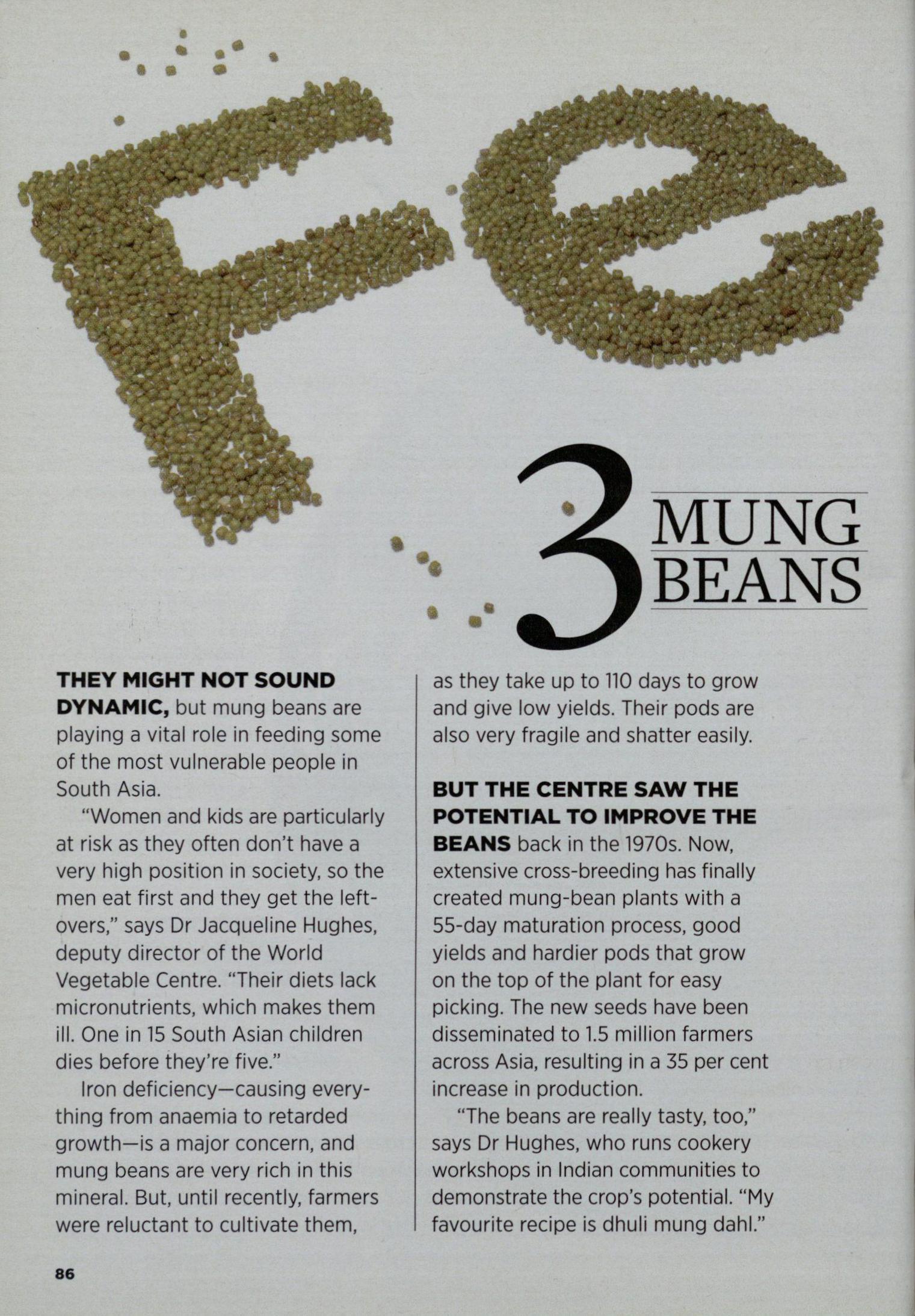
as they take up to 110 days to grow and give low yields. Their pods are also very fragile and shatter easily.
BUT THE CENTRE SAW THE POTENTIAL TO IMPROVE THE BEANS back in the 1970s. Now, extensive cross-breeding has finally created mung-bean plants with a 55-day maturation process, good yields and hardier pods that grow on the top of the plant for easy picking. The new seeds have been disseminated to 1.5 million farmers across Asia, resulting in a 35 per cent increase in production.
"The beans are really tasty, too," says Dr Hughes, who runs cookery workshops in Indian communities to demonstrate the crop's potential. "My favourite recipe is dhuli mung dahl."
• • • •• • • • •
86
BANANAS AND PLANTAIN ARE A CRUCIAL FOOD
SOURCE across sub-Saharan Africa. They also provide a vital income for some 50 million smallholders in the east-Africa highlands and Great Lakes region.
But, in 2001, an outbreak of a new disease, banana xanthomonas wilt (BXW), left a trail of destruction and misery in Uganda that spread to the Congo, Kenya, Rwanda and Tanzania. The disease causes the banana plant to drip with bacterial ooze, leaving the fruit inedible. It halved the income of many farmers, and plunged thousands of Ugandan families into destitution.
And it keeps coming back, causing half a billion dollars' worth of damage in Africa every year.
THE ANSWER?
A SUPER-BANANA. No ordinary banana can resist BXW, and no biochemical agent will stop it. So the Nigeriabased International Institute of Tropical Agriculture, and the National Agricultural
41

DISEASERESISTANT BANANAS
Research Organisation in Uganda, inserted genetic material from sweet pepper—known to be effective in engineering disease-resistant rice— into a variety of banana.
The injected plant proteins rapidly kill cells that come into contact with BXW, preventing it spreading.
Scientists are now conducting field trials. If they are successful, the new variety will be available to farmers within three years.
87
5DROUGHTHARDY
CLIMATE CHANGE IS BECOMING
A FRIGHTENING REALITY in many parts of the world. The UN Development Programme predicts that droughts will reduce Africa's production of maize (which feeds 300 million of its poorest people) by ten per cent by 2050.
But the Consultative Group on International Agricultural Research in Montpellier, France, and the Mexico-based
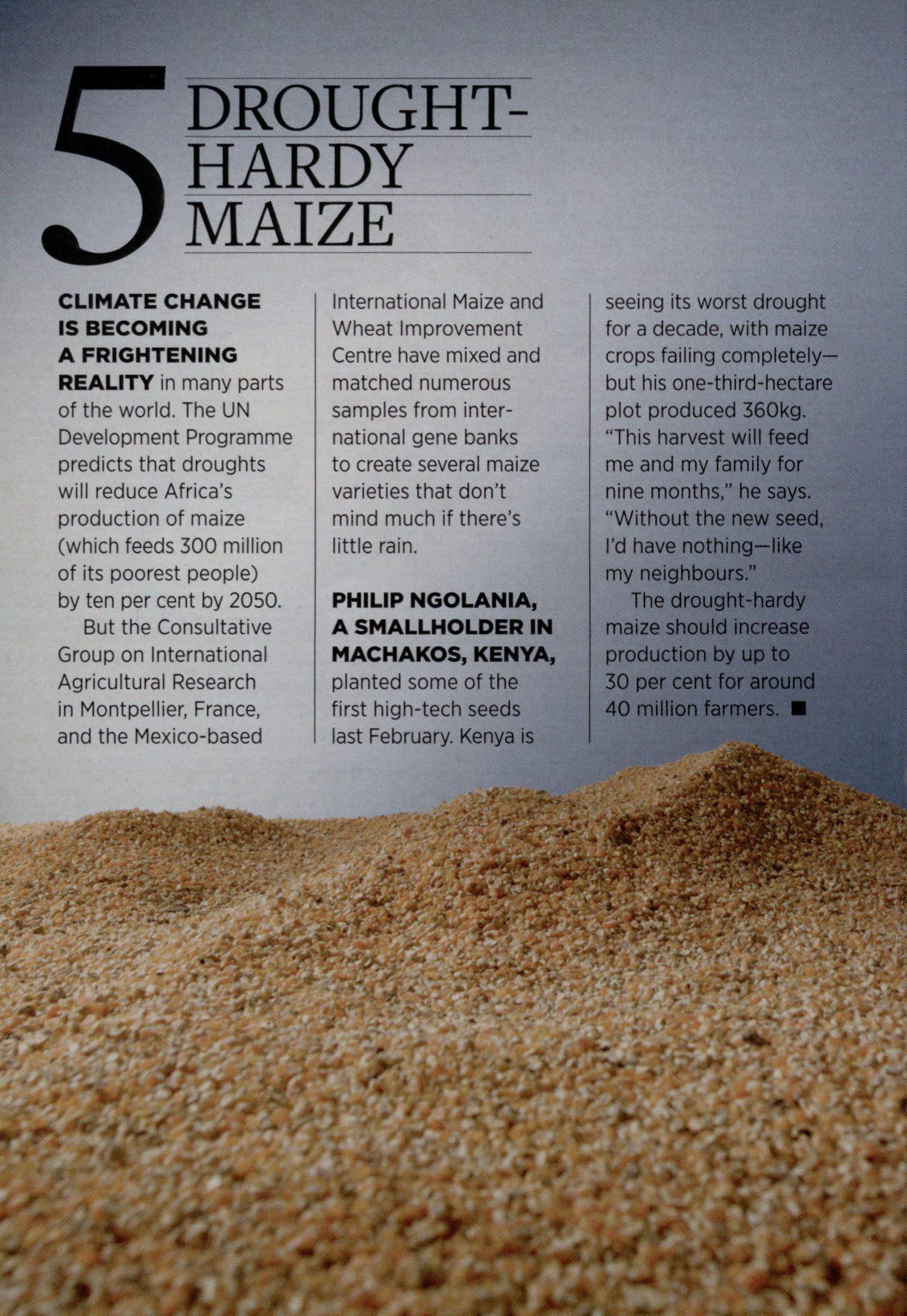
International Maize and Wheat Improvement Centre have mixed and matched numerous samples from international gene banks to create several maize varieties that don't mind much if there's little rain.
PHILIP NGOLANIA, A SMALLHOLDER IN MACHAKOS, KENYA, planted some of the first high-tech seeds last February. Kenya is
seeing its worst drought for a decade, with maize crops failing completely— but his one-third-hectare plot produced 360kg. "This harvest will feed me and my family for nine months," he says. "Without the new seed, I'd have nothing—like my neighbours."
The drought-hardy maize should increase production by up to 30 per cent for around 40 million farmers. •
 DVDS irsirll
Miss caw', &John
DVDS irsirll
Miss caw', &John
HEALTH & BEAUTY www.readersdigest.co.uk 100s OF ITEMS NOW ONLINE WEB EXCLUSIVES PLUS! FREE P&P no matter how many items you order TOP SELLERS Prices start from imils as little as £4.99 DON'T MISS OUT! Go online TODAY MR. MEN ...yr.,
1-`-',°7°^
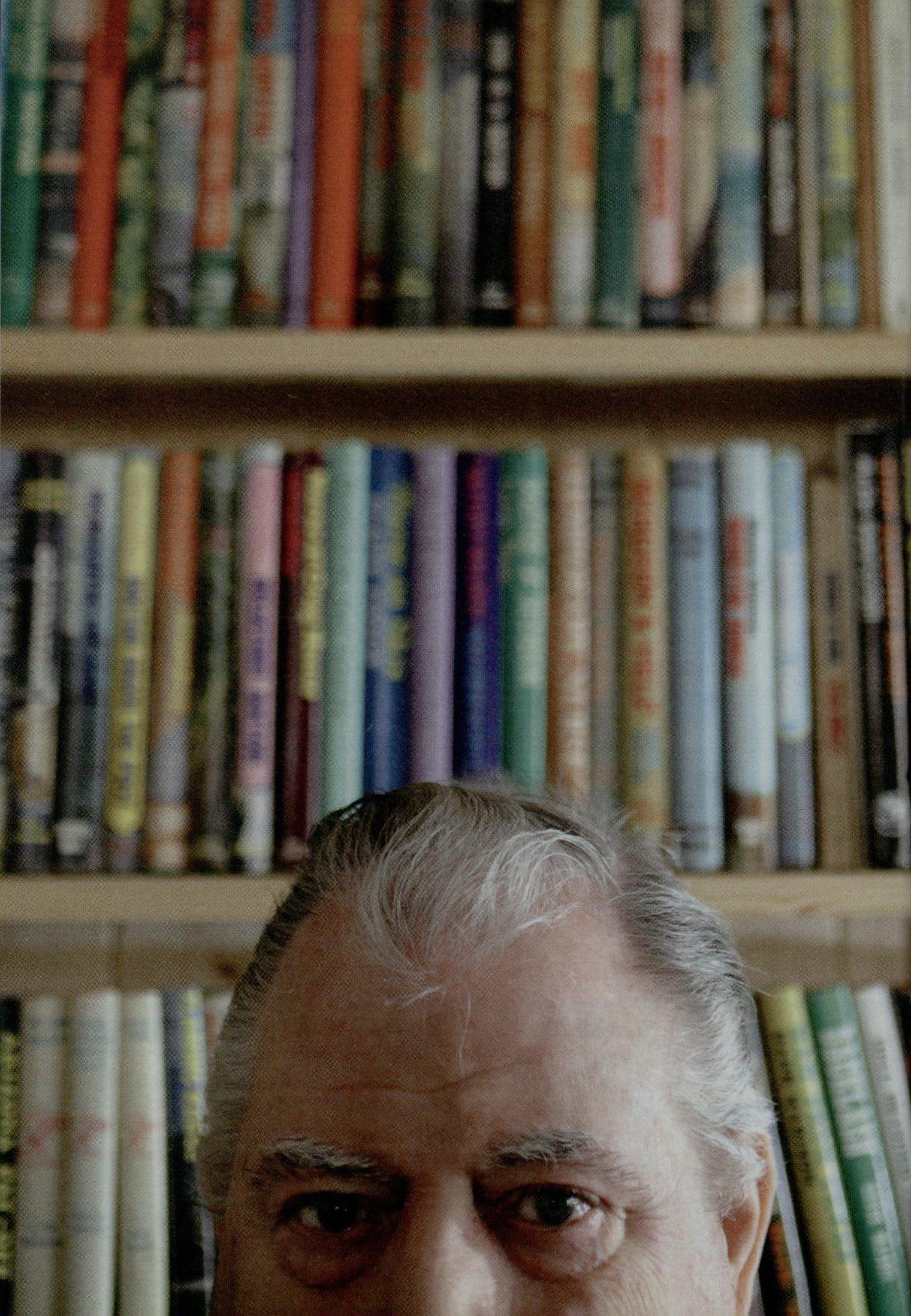
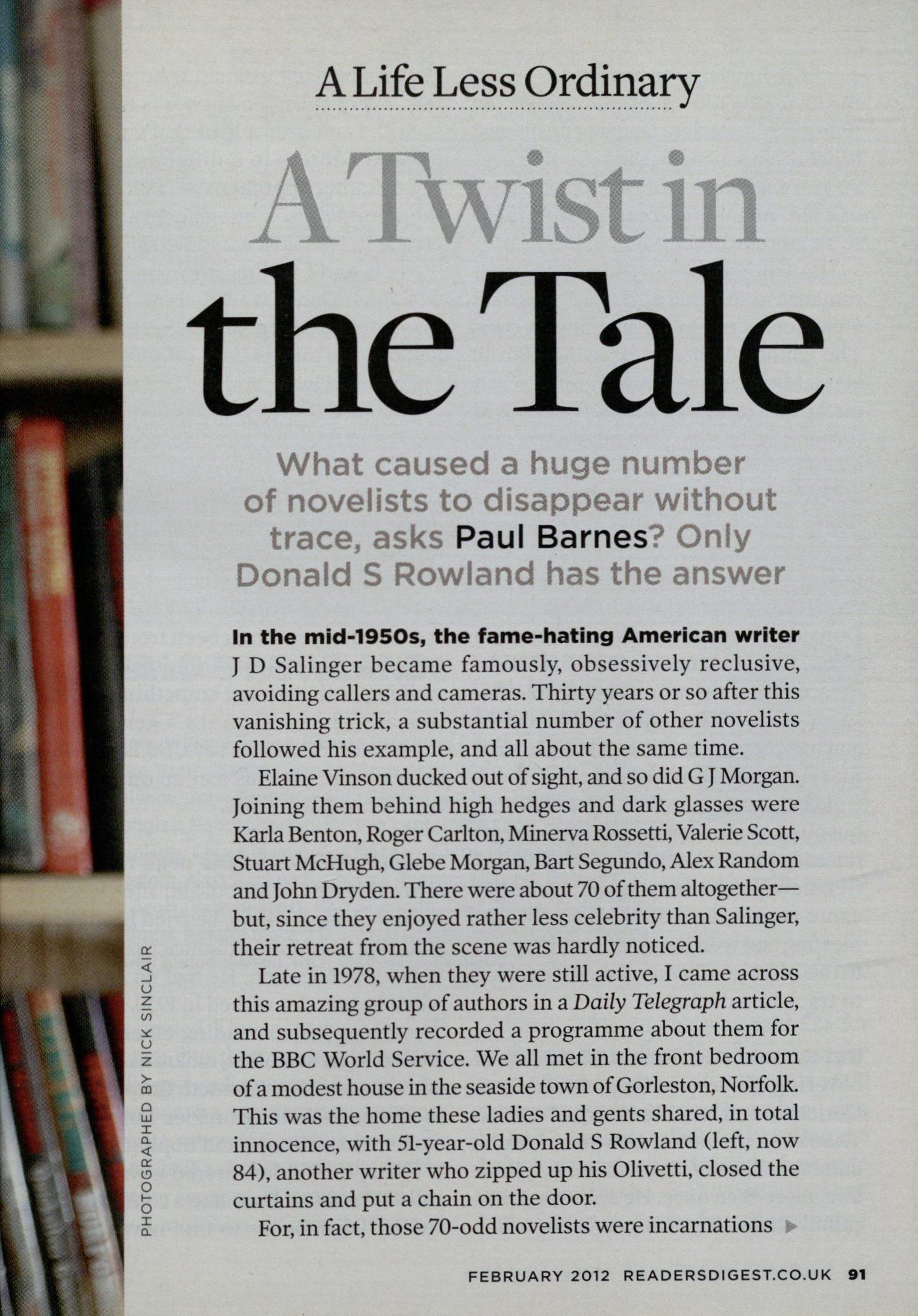 NI CK SIN CL A
NI CK SIN CL A
A Life Less Ordinary A_ 1 VN the Tale
What caused a huge number of novelists to disappear without trace, asks Paul Barnes? Only Donald S Rowland has the answer
In the mid-1950s, the fame-hating American writer J D Salinger became famously, obsessively reclusive, avoiding callers and cameras. Thirty years or so after this vanishing trick, a substantial number of other novelists followed his example, and all about the same time.
Elaine Vmson ducked out of sight, and so did G J Morgan. Joining them behind high hedges and dark glasses were Karla Benton, Roger Carlton, Minerva Rossetti, Valerie Scott, Stuart McHugh, Glebe Morgan, Bart Segundo, Alex Random and John Dryden. There were about 70 of them altogether— but, since they enjoyed rather less celebrity than Salinger, their retreat from the scene was hardly noticed.
Late in 1978, when they were still active, I came across this amazing group of authors in a Daily Telegraph article, and subsequently recorded a programme about them for the BBC World Service. We all met in the front bedroom of a modest house in the seaside town of Gorleston, Norfolk. This was the home these ladies and gents shared, in total innocence, with 51-year-old Donald S Rowland (left, now 84), another writer who zipped up his Olivetti, closed the curtains and put a chain on the door.
For, in fact, those 70-odd novelists were incarnations o•
PHOTOGRAPHED
BY
FEBRUARY 2012 READERSDIGEST.CO.UK 91
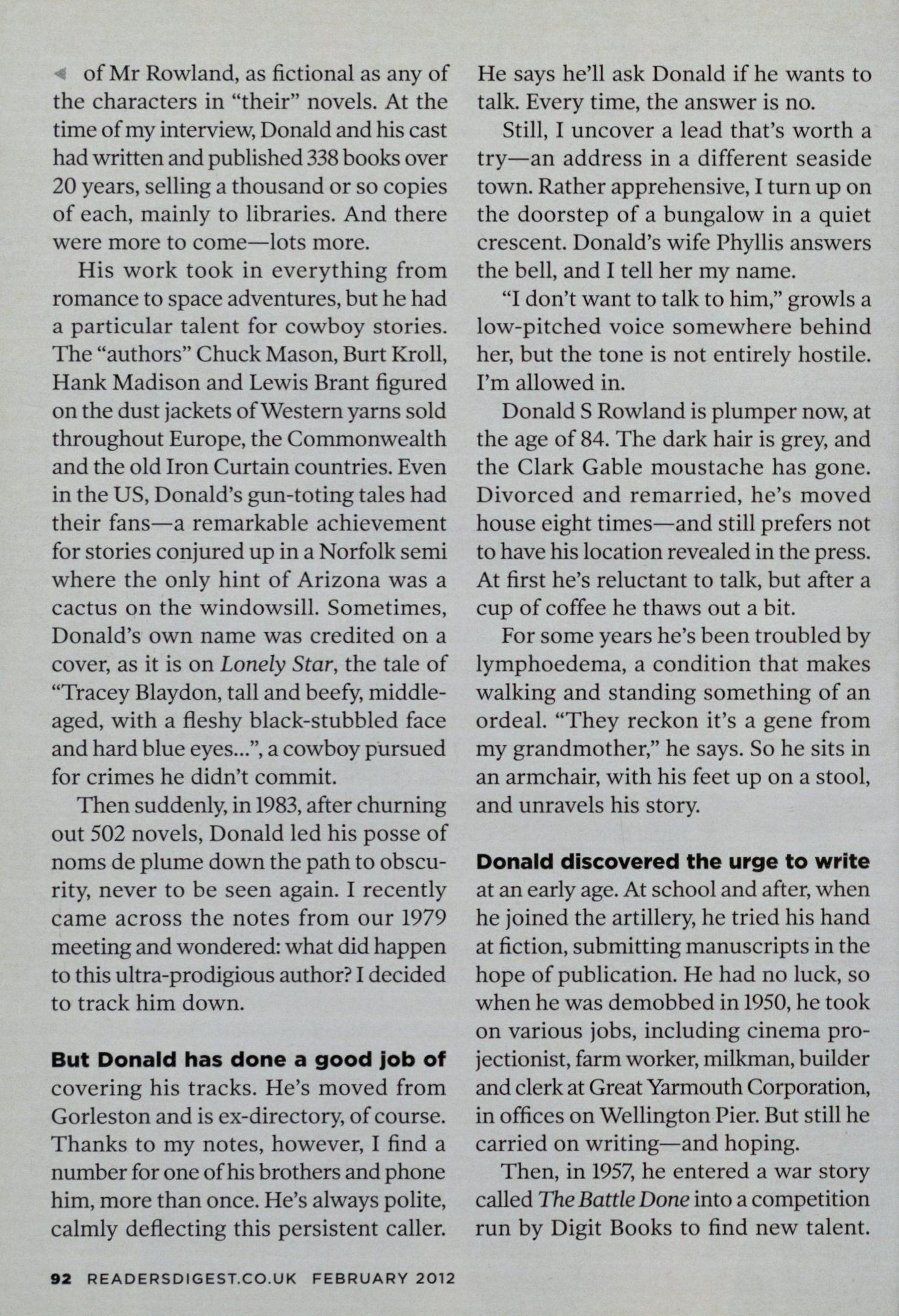
4 of Mr Rowland, as fictional as any of the characters in "their" novels. At the time of my interview, Donald and his cast had written and published 338 books over 20 years, selling a thousand or so copies of each, mainly to libraries. And there were more to come—lots more.
His work took in everything from romance to space adventures, but he had a particular talent for cowboy stories. The "authors" Chuck Mason, Burt Kroll, Hank Madison and Lewis Brant figured on the dust jackets of Western yarns sold throughout Europe, the Commonwealth and the old Iron Curtain countries. Even in the US, Donald's gun-toting tales had their fans—a remarkable achievement for stories conjured up in a Norfolk semi where the only hint of Arizona was a cactus on the windowsill. Sometimes, Donald's own name was credited on a cover, as it is on Lonely Star, the tale of "Tracey Blaydon, tall and beefy, middleaged, with a fleshy black-stubbled face and hard blue eyes...", a cowboy pursued for crimes he didn't commit.
Then suddenly, in 1983, after churning out 502 novels, Donald led his posse of noms de plume down the path to obscurity, never to be seen again. I recently came across the notes from our 1979 meeting and wondered: what did happen to this ultra-prodigious author? I decided to track him down.
But Donald has done a good job of covering his tracks. He's moved from Gorleston and is ex-directory, of course. Thanks to my notes, however, I find a number for one of his brothers and phone him, more than once. He's always polite, calmly deflecting this persistent caller.
He says he'll ask Donald if he wants to talk. Every time, the answer is no.
Still, I uncover a lead that's worth a try—an address in a different seaside town. Rather apprehensive, I turn up on the doorstep of a bungalow in a quiet crescent. Donald's wife Phyllis answers the bell, and I tell her my name.
"I don't want to talk to him," growls a low-pitched voice somewhere behind her, but the tone is not entirely hostile. I'm allowed in.
Donald S Rowland is plumper now, at the age of 84. The dark hair is grey, and the Clark Gable moustache has gone. Divorced and remarried, he's moved house eight times—and still prefers not to have his location revealed in the press. At first he's reluctant to talk, but after a cup of coffee he thaws out a bit.
For some years he's been troubled by lymphoedema, a condition that makes walking and standing something of an ordeal. "They reckon it's a gene from my grandmother," he says. So he sits in an armchair, with his feet up on a stool, and unravels his story.
Donald discovered the urge to write at an early age. At school and after,when he joined the artillery, he tried his hand at fiction, submitting manuscripts in the hope of publication. He had no luck, so when he was demobbed in 1950, he took on various jobs, including cinema projectionist, farm worker, milkman, builder and clerk at Great Yarmouth Corporation, in offices on Wellington Pier. But still he carried on writing—and hoping.
Then, in 1957, he entered a war story called The Battle Doneinto a competition run by Digit Books to find new talent.
92 READERSDIGEST.CO.UK FEBRUARY 2012
DONALD S ROWLAND IS ALSO KNOWN AS...
...Annette Adams, Lewis Brant, Hazel Baxter, Karla Benton, Alison Bray, William Brayce, Fenton Brockley, Chuck Buchanan, Rod Caley, Roger Carlton, Janita Cleve, Vera Craig, Wesley Craille, John Delaney, John Dryden, Freda Fenton, Graham Garner, Burt Kroll, Helen Langley, Henry Lansing, Harvey Lant, Irene Lynn, Stuart McHugh, Hank Madison, Chuck Mason, G J Morgan, Glebe Morgan, Edna Murray, Alex Random, Matt Rockwell, Charles Roscoe, Minerva Rossetti, Norford Scott, Valerie Scott, Bart Segundo, Bart Shane, Frank Shaul, Clinton Spurr, Roland Starr, J D Stevens, Mark Suffling, Will Travers, Sarah Vine, Elaine Vinson, Rick Walters, Neil
Months passed. Then a letter arrived. He hadn't won, but they wanted to publish his book anyway. Fourteen years after his first attempt, he was in print. He went on to write a handful of war books for Digit, and half a dozen westerns for the firm's other imprint, Wagon Wheel.
A book took him six months to write
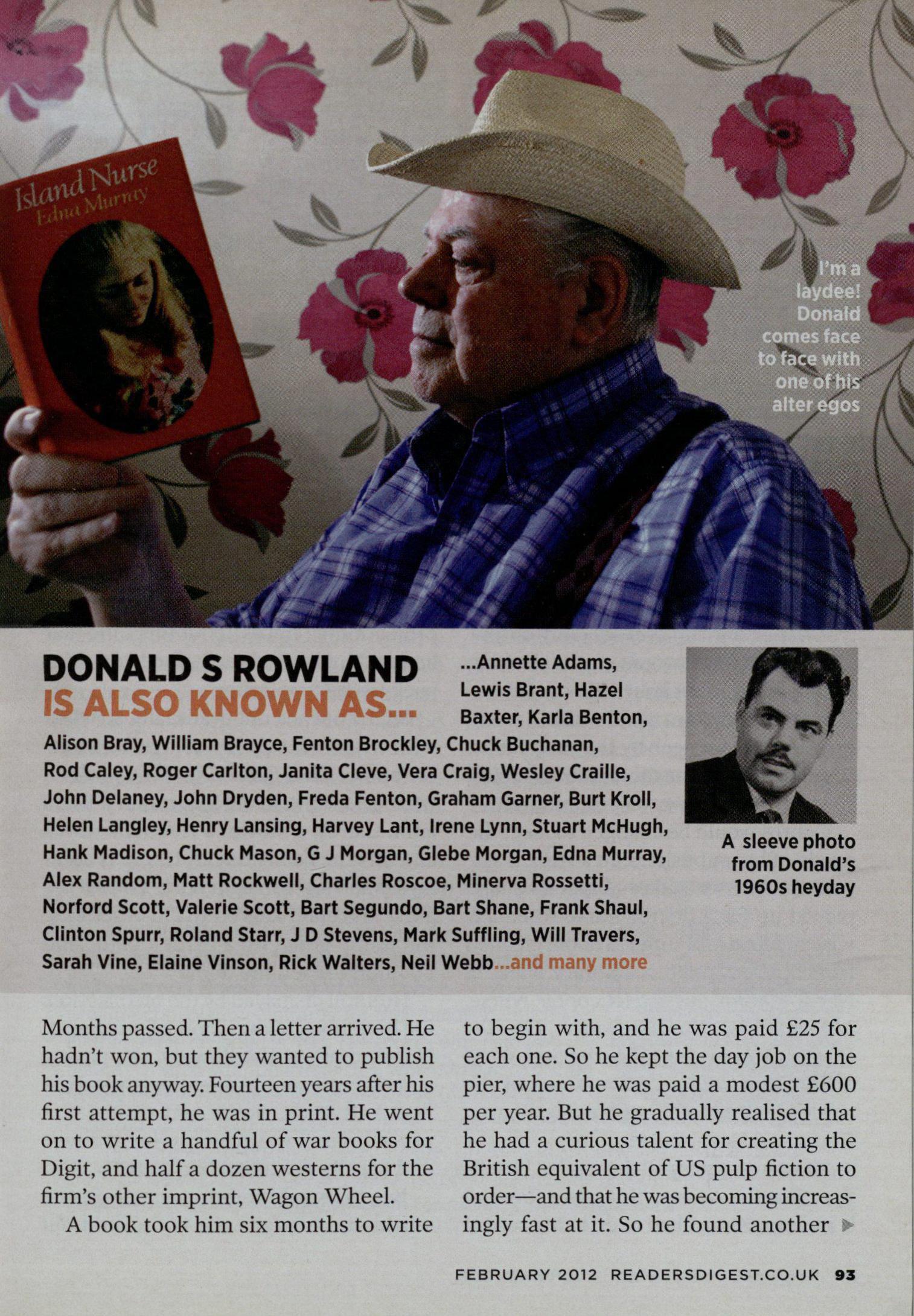
to begin with, and he was paid £25 for each one. So he kept the day job on the pier, where he was paid a modest £600 per year. But he gradually realised that he had a curious talent for creating the British equivalent of US pulp fiction to order—and that he was becomingincreasingly fast at it. So he found another
I'm a laydee! Donald comes face to face with one of his alter egos
Webb
A sleeve photo from Donald's 1960s heyday
FEBRUARY 2 012 READERSDIGEST.CO.UK 93
THE MAN FROM GREAT YARMOUTH
Donald was paid a flat rate for each book and received no royalties, so he never asked how many he sold
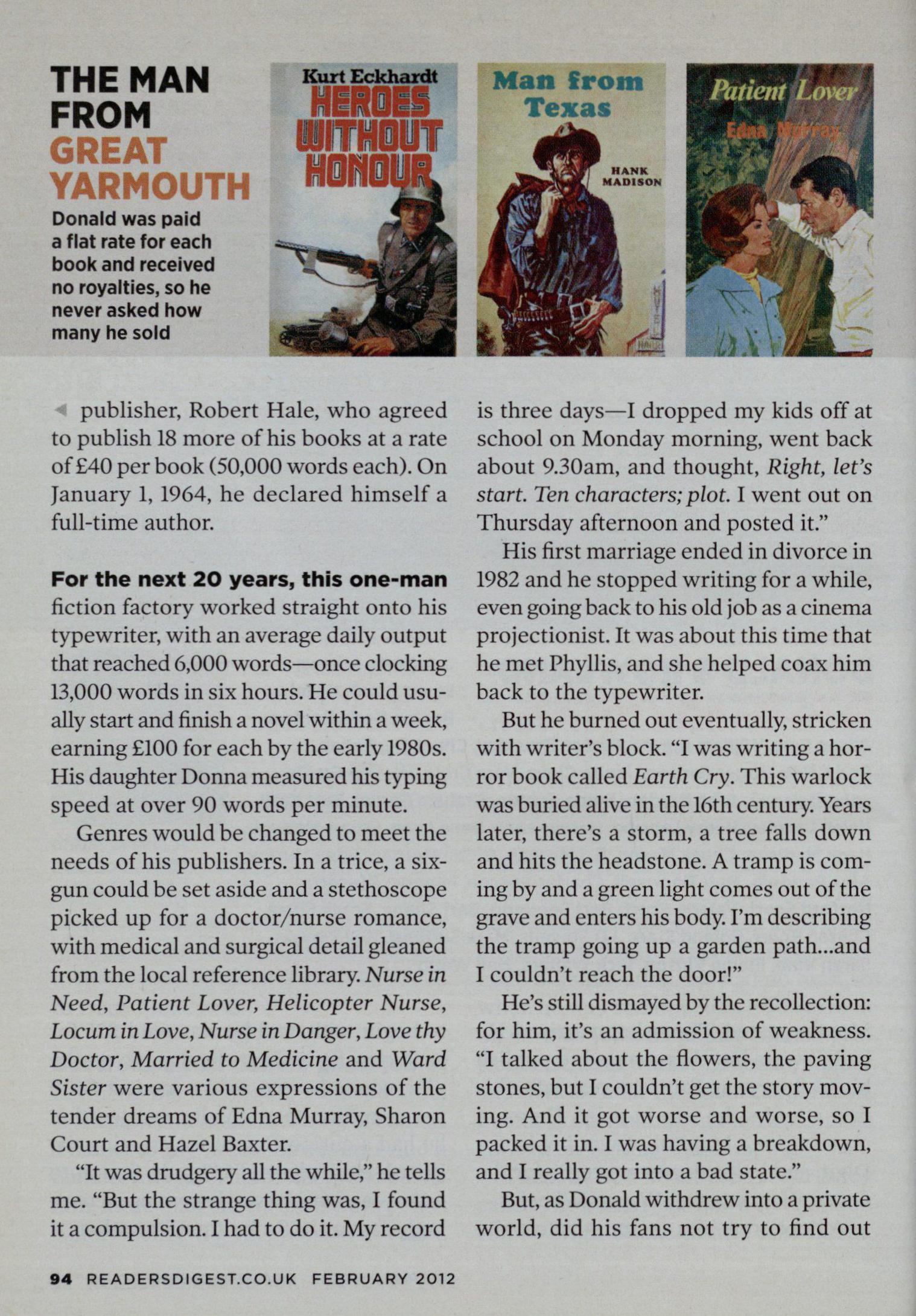
• publisher, Robert Hale, who agreed to publish 18 more of his books at a rate of E40 per book (50,000 words each). On January 1, 1964, he declared himself a full-time author.
For the next 20 years, this one-man fiction factory worked straight onto his typewriter, with an average daily output that reached 6,000 words—once clocking 13,000 words in six hours. He could usually start and finish a novel within a week, earning £100 for each by the early 1980s. His daughter Donna measured his typing speed at over 90 words per minute.
Genres would be changed to meet the needs of his publishers. In a trice, a sixgun could be set aside and a stethoscope picked up for a doctor/nurse romance, with medical and surgical detail gleaned from the local reference library. Nurse in Need, Patient Lover, Helicopter Nurse, Locum in Love, Nurse in Danger, Love thy Doctor, Married to Medicine and Ward Sister were various expressions of the tender dreams of Edna Murray, Sharon Court and Hazel Baxter.
"It was drudgery all the while," he tells me. "But the strange thing was, I found it a compulsion. I had to do it. My record
is three days—I dropped my kids off at school on Monday morning, went back about 9.30am, and thought, Right, let's start. Ten characters; plot. I went out on Thursday afternoon and posted it."
His first marriage ended in divorce in 1982 and he stopped writing for a while, even going back to his old job as a cinema projectionist. It was about this time that he met Phyllis, and she helped coax him back to the typewriter.
But he burned out eventually, stricken with writer's block. "I was writing a horror book called Earth Cry. This warlock was buried alive in the 16th century. Years later, there's a storm, a tree falls down and hits the headstone. A tramp is coming by and a green light comes out of the grave and enters his body. I'm describing the tramp going up a garden path...and I couldn't reach the door!"
He's still dismayed by the recollection: for him, it's an admission of weakness. "I talked about the flowers, the paving stones, but I couldn't get the story moving. And it got worse and worse, so I packed it in. I was having a breakdown, and I really got into a bad state."
But, as Donald withdrew into a private world, did his fans not try to find out
111111E111
WITHOUT HONOu Man from Texas
94 READERSDIGEST.CO.UK FEBRUARY 2012
GUNSMOKE SHOWDOWN
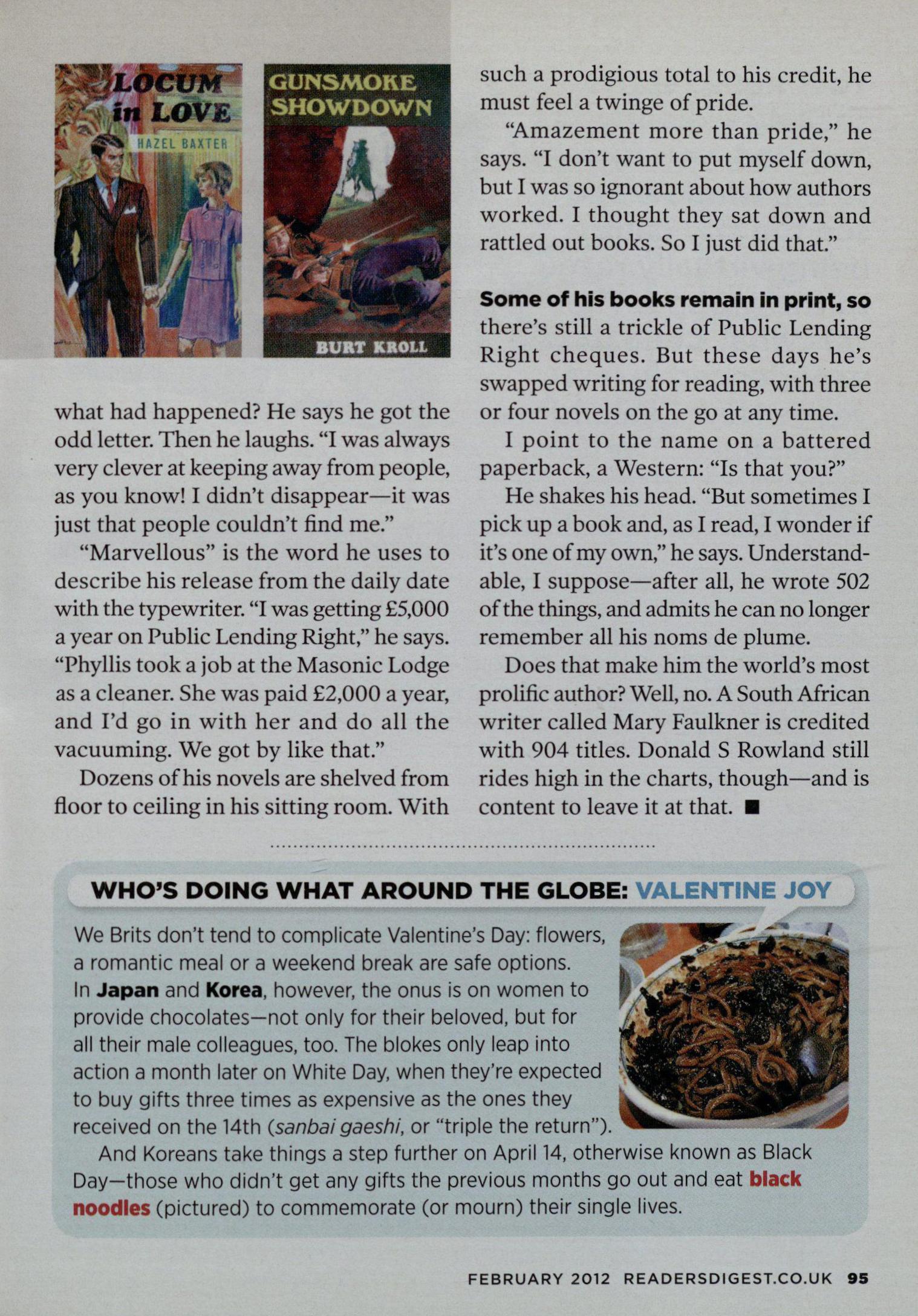
what had happened? He says he got the odd letter. Then he laughs. "I was always very clever at keeping away from people, as you know! I didn't disappear—it was just that people couldn't find me."
"Marvellous" is the word he uses to describe his release from the daily date with the typewriter. "I was getting £5,000 a year on Public Lending Right," he says. "Phyllis took a job at the Masonic Lodge as a cleaner. She was paid £2,000 a year, and I'd go in with her and do all the vacuuming. We got by like that."
Dozens of his novels are shelved from floor to ceiling in his sitting room. With
such a prodigious total to his credit, he must feel a twinge of pride.
"Amazement more than pride," he says. "I don't want to put myself down, but I was so ignorant about how authors worked. I thought they sat down and rattled out books. So I just did that."
Some of his books remain in print, so there's still a trickle of Public Lending Right cheques. But these days he's swapped writing for reading, with three or four novels on the go at any time.
I point to the name on a battered paperback, a Western: "Is that you?"
He shakes his head. "But sometimes I pick up a book and, as I read, I wonder if it's one of my own," he says. Understandable, I suppose—after all, he wrote 502 of the things, and admits he can no longer remember all his noms de plume.
Does that make him the world's most prolific author? Well, no. A South African writer called Mary Faulkner is credited with 904 titles. Donald S Rowland still rides high in the charts, though—and is content to leave it at that. ■
WHO'S DOING WHAT AROUND THE GLOBE: VALENTINE JOY
We Brits don't tend to complicate Valentine's Day: flowers, a romantic meal or a weekend break are safe options.
In Japan and Korea, however, the onus is on women to provide chocolates—not only for their beloved, but for all their male colleagues, too. The blokes only leap into action a month later on White Day, when they're expected to buy gifts three times as expensive as the ones they received on the 14th (sanbai gaeshi, or "triple the return").
And Koreans take things a step further on April 14, otherwise known as Black Day—those who didn't get any gifts the previous months go out and eat black noodles (pictured) to commemorate (or mourn) their single lives.
BURT KROLL
FEBRUARY 2 012 READERSDIGEST.CO.UK 95
Your house starts shaking violently.
Terrified, you rush to the window and see the city centre being virtually razed to the ground. That was what Celia Coyne experienced in last year's New Zealand earthquake. Twelve months on, she reveals how it's changed her life
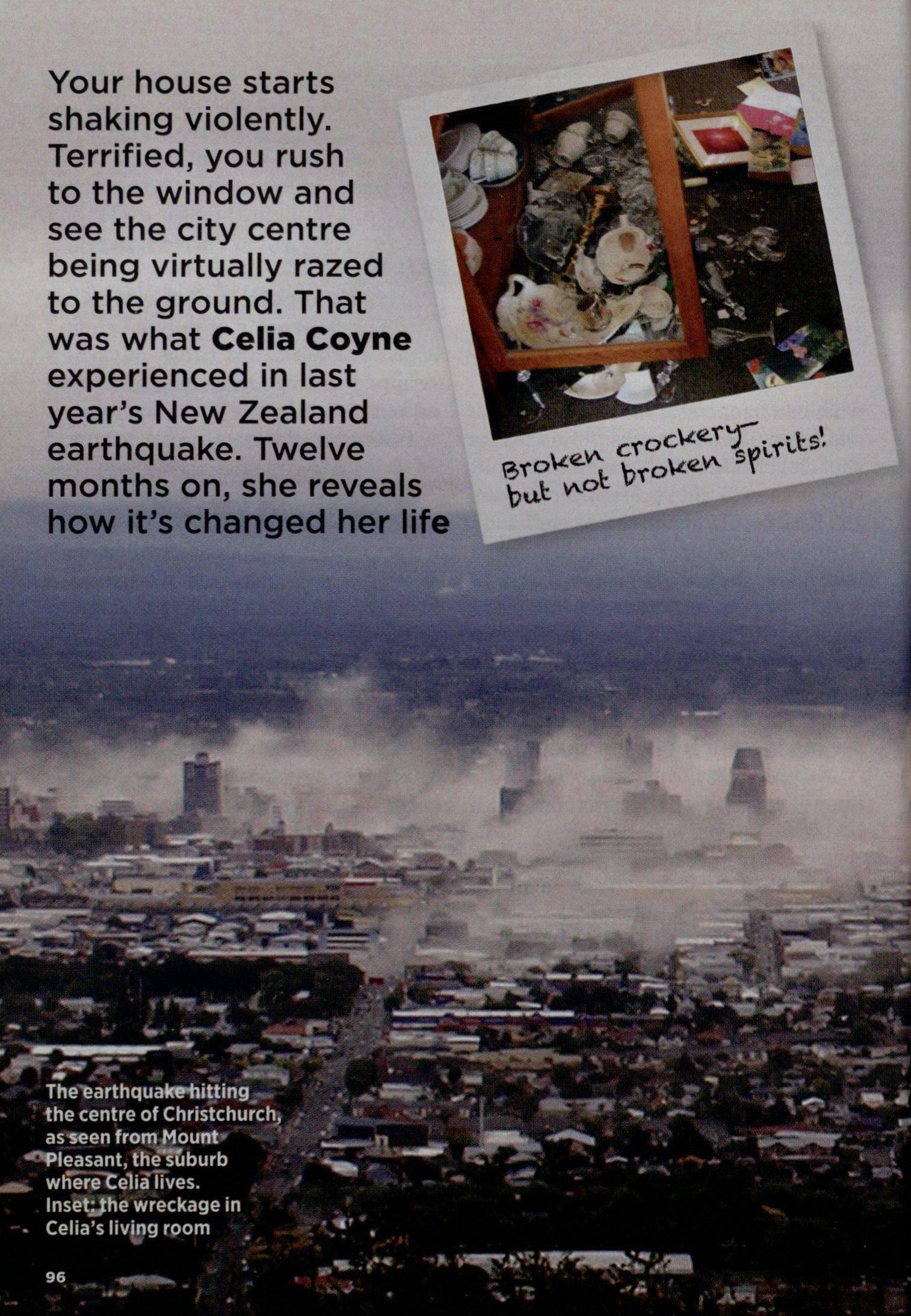
-vmr-Iwas■P-
The earthquaketitting the centre of Christchurch, as seen from Mount 'Pleasant, thelriburb wkiere Celia lives. Insetjhe wreckage in - Celia's living room
• •
, h
h
C3i-oVev. crocI4vel-Li— i .L bud vt.ot. tvoUg.v. SrSts.51.
h
■
OW
h,
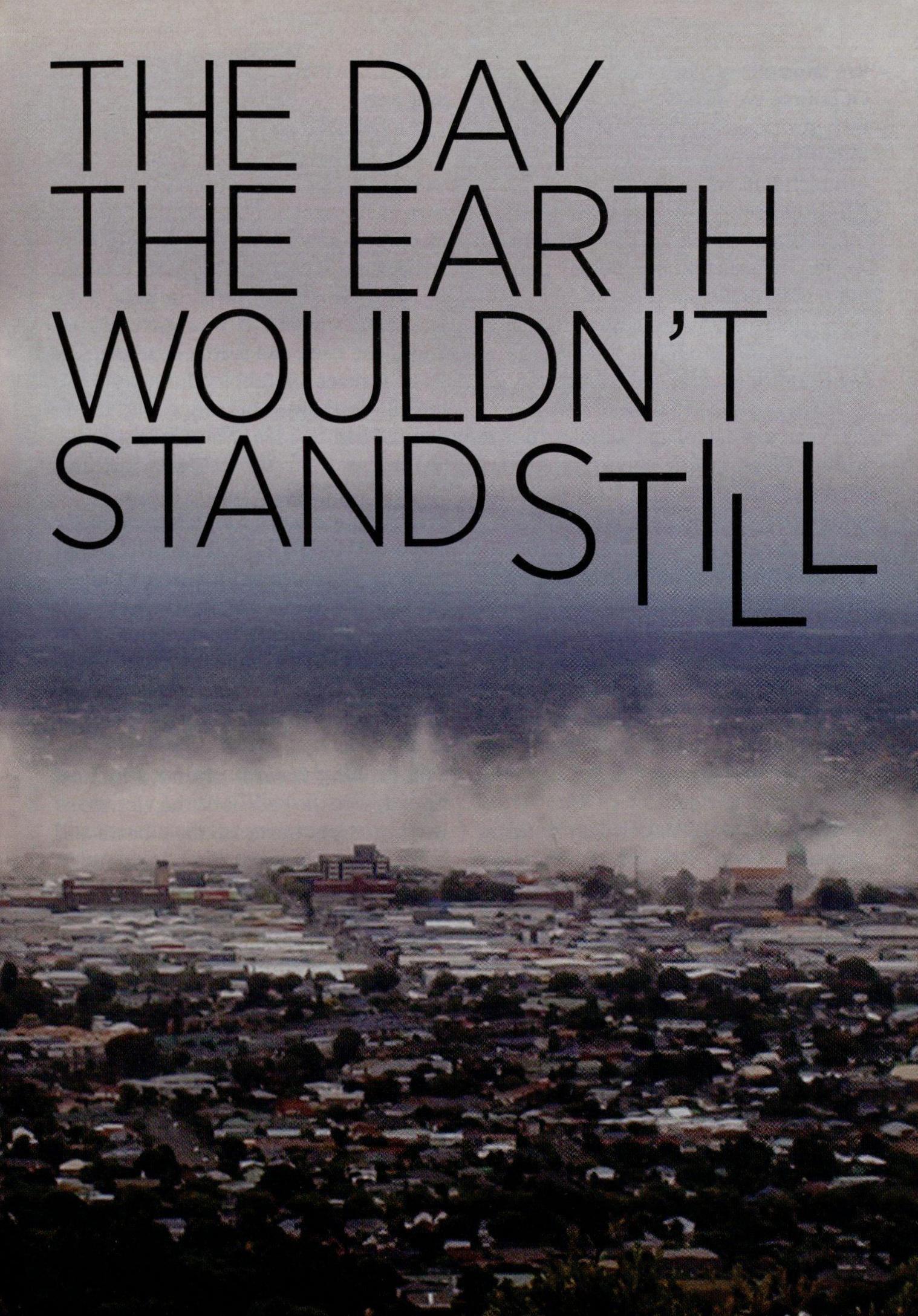
THE DAY THE EARTH WOULDN'T STANDSTILL
We thought we were safe on the hill. Of course we did. Our house was built on bedrock, and we'd survived a 7.1 magnitude earthquake on September 4, 2010 —which had ruined many buildings in Christchurch—without so much as a toppled picture frame. I'd even assured my family back home in Surrey that we were in the safest part of the city.
But, like other Christchurch residents, we were about to learn the geology of the Canterbury Plains the hard way.
After a short spell of rain, February 22 last year was a cool and windless day in Mount Pleasant, the suburb where my husband Matthew and I settled after emigrating to New Zealand in 2009.
As a freelance writer, I'd spent the morning in my home office. But I was in my living room, having just finished lunch, when the earthquake struck at 12.51. We'd been experiencing aftershocks from the September quake, but, when the first sudden jolt came through, I immediately knew it was different. It was sharp and strong. I dropped to the floor next to my sofa.
The house was being shaken violently, as though it was in the hands of an angry giant. I could hear crockery smashing on the floor, punctuated by the occasional loud crash as a bookcase came down.
This wasn't supposed to happen, I
thought. All I could do was lie there and pray.
An odd side effect of living through a quake and its aftershocks is that you develop a feel for them—they all have their own characteristics. The 2010 quake had an up-and-down action accompanied by a swirling circular motion, like a mixture of Riverdance and the hula-hula. This was more vicious. It was jerking back and forth, back and forth—it seemed to go on forever. I scrabbled for my mobile to call Matthew at his office, but, in my panic, I had no idea where it was.
I began to crawl, keeping low and close to walls, counting on the "triangle of life" theory that, if a building collapses, there will be a void left next to a wall or large piece of furniture. As I moved through the house, I heard creaking and rattling, and a tremendous thud. I contemplated the grim reality that these could be my final moments. The house can't stand up to this.
Still looking for my phone, I inched my way into the bedroom, the vibrations leaving carpet burns on my elbows and knees. The search for the phone ended abruptly—because it was ringing, with Matthew on the other end.
"I'm scared," I said. "The house sounds like it's falling down."
CHRISTCHURCH EARTHQUAKE IN NUMBERS
• It registered 6.3 magnitude and occurred 5.5 miles from Christchurch's city centre. Technically, it was an aftershock from the September 2010 quake, but it occurred nearer the surface, 20 miles closer to the city, and had a peak ground acceleration value of 2.2G (against its predecessor's 1.2G), making it much more destructive.
As a result of the quake, the Port Hills have risen 40cm
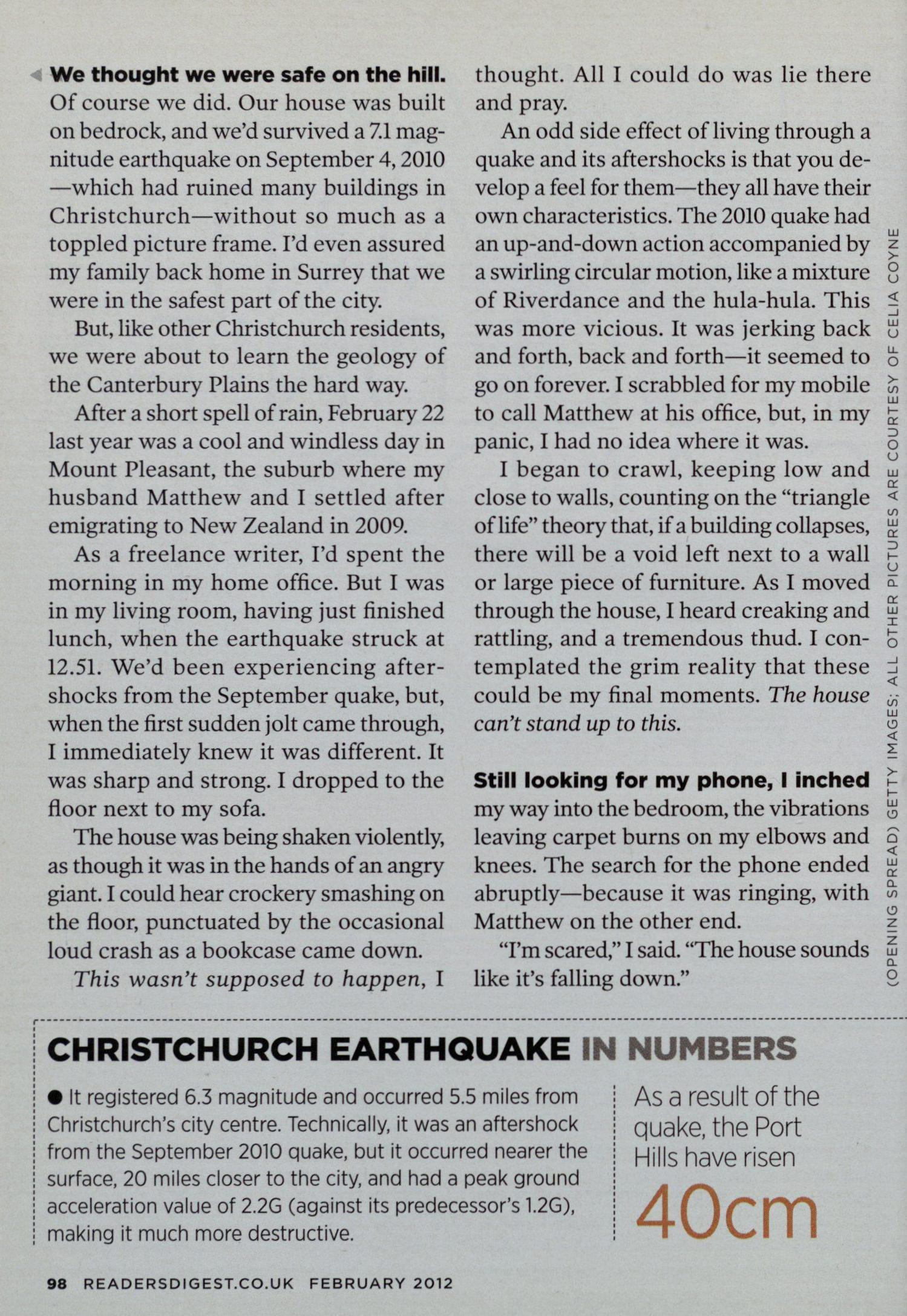
(
4
OPENING SPREAD) G ETTY IMAGES; A LL O THER PI CTURES ARE COU RTES Y OF CELIA COYNE
98 READERSDIGEST.CO.UK FEBRUARY 2012
cxffi.ce o4le.r BA.e. eo,rLIA.uo..t4e..••
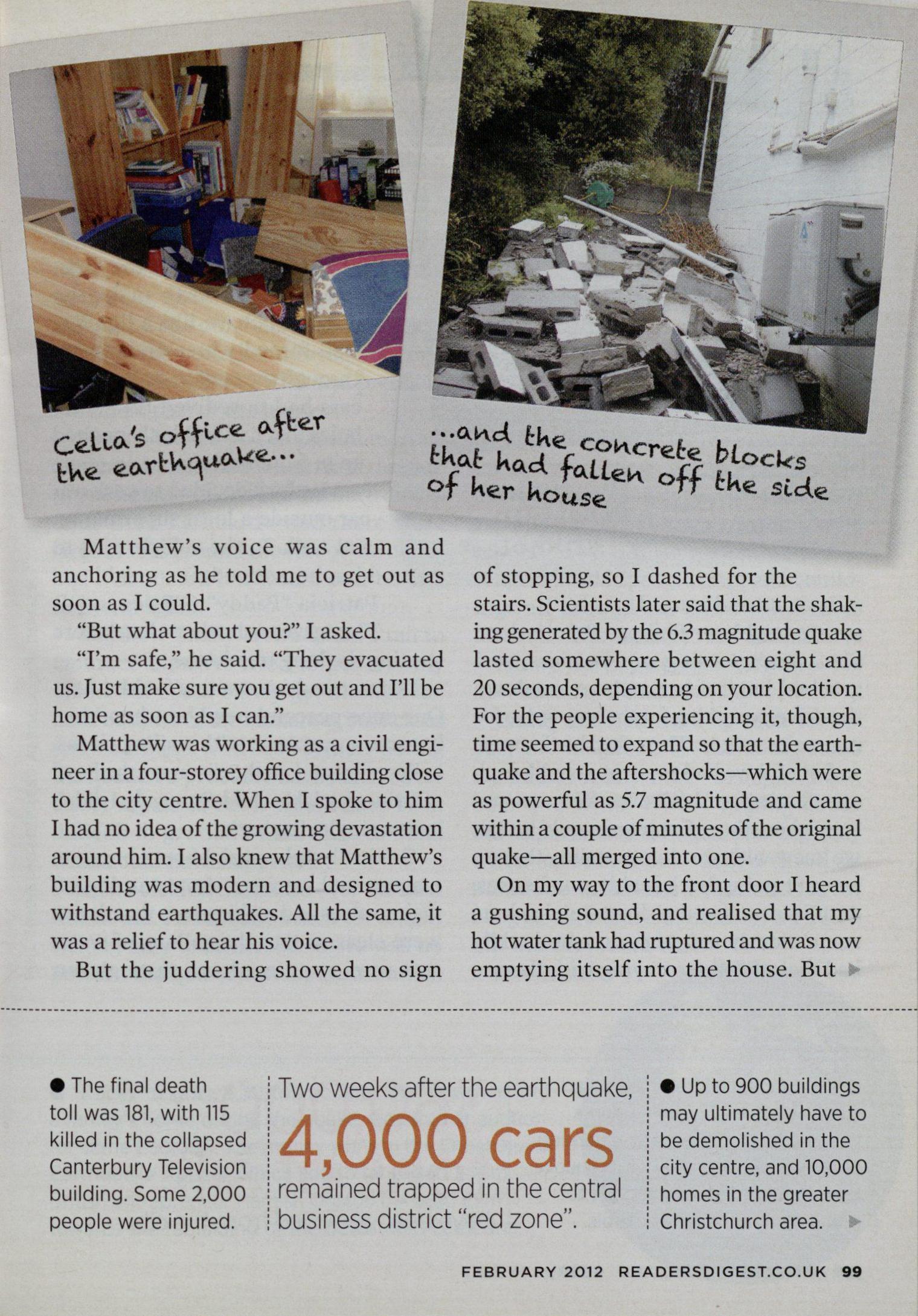
••.akka Eke cokereEe blocks
EkaE had fattek. off Eke si.de. of her house.
Matthew's voice was calm and anchoring as he told me to get out as soon as I could.
"But what about you?" I asked.
"I'm safe," he said. "They evacuated us. Just make sure you get out and I'll be home as soon as I can."
Matthew was working as a civil engineer in a four-storey office building close to the city centre. When I spoke to him I had no idea of the growing devastation around him. I also knew that Matthew's building was modern and designed to withstand earthquakes. All the same, it was a relief to hear his voice.
But the juddering showed no sign
• The final death toll was 181, with 115 killed in the collapsed Canterbury Television building. Some 2,000 people were injured.
of stopping, so I dashed for the stairs. Scientists later said that the shaking generated by the 6.3 magnitude quake lasted somewhere between eight and 20 seconds, depending on your location. For the people experiencing it, though, time seemed to expand so that the earthquake and the aftershocks—which were as powerful as 5.7 magnitude and came within a couple of minutes of the original quake—all merged into one.
On my way to the front door I heard a gushing sound, and realised that my hot water tank had ruptured and was now emptying itself into the house. But 0,
Two weeks after the earthquake,
000 cars remained trapped in the central business district "red zone".
• Up to 900 buildings may ultimately have to be demolished in the city centre, and 10,000 homes in the greater Christchurch area. t-
FEBRUARY 2012 READERSDIGEST.CO.UK 99
Tke n•odev ibketiotAs of 9 etake grot.ttna behave Like 49tti.ct, opetA6A9 "st:tAkkoles"
® I got out and banged on my neighbour Philippa Baker's door. She came running out in tears, so I grabbed hold of her and we ran down the drive, searching for the stop valve for my mains water. The aftershocks were so forceful we had to sit down with each one, fearing we'd fall over. We were unsure where the safest place would be, but we knew with absolute certainty that we weren't going back inside our houses. Arm in arm, we ran down to check on some elderly neighbours, who luckily had their daughter staying with them.
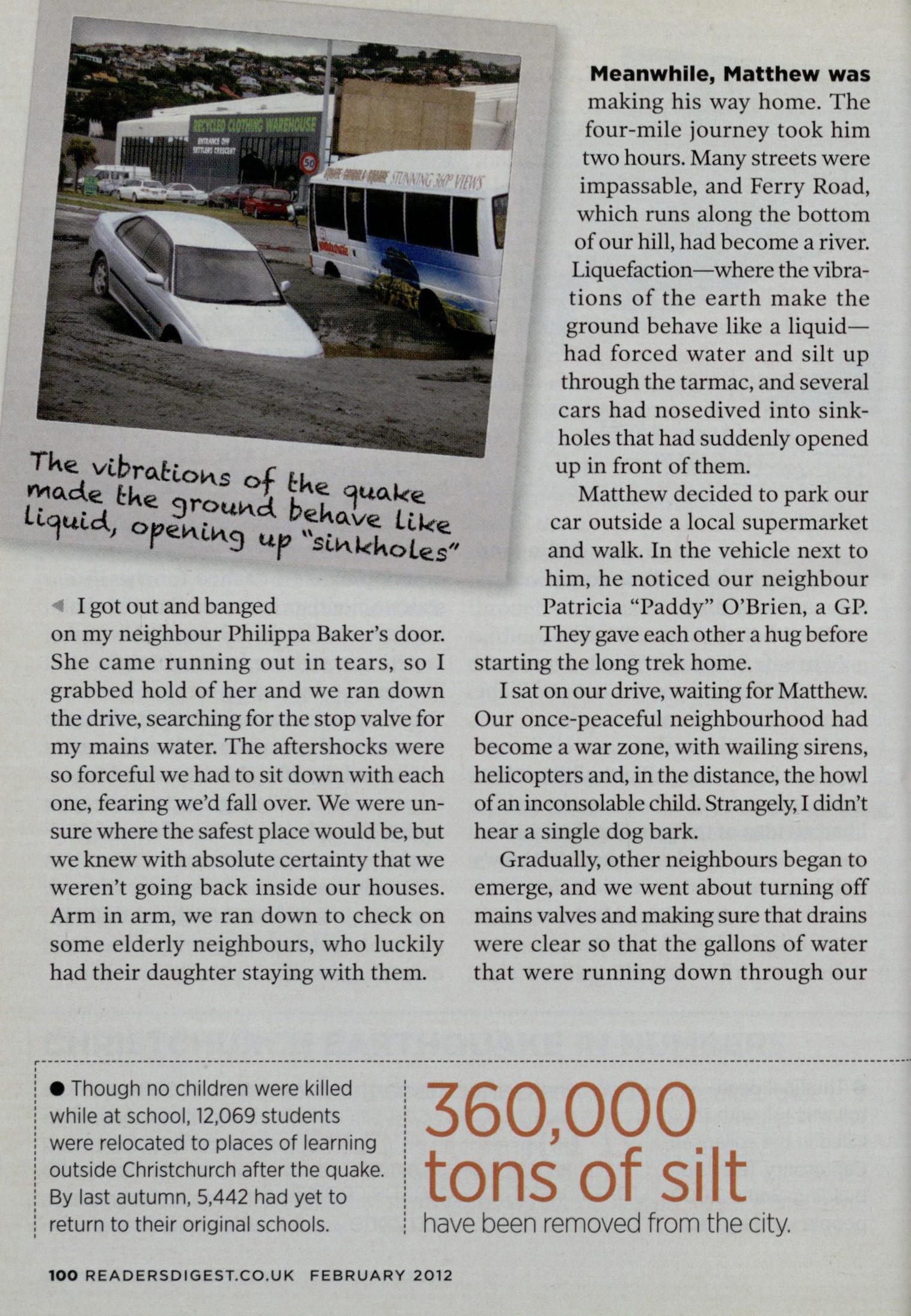
• Though no children were killed while at schoo1,12,069 students were relocated to places of learning outside Christchurch after the quake. By last autumn, 5,442 had yet to return to their original schools.
Meanwhile, Matthew was making his way home. The four-mile journey took him two hours. Many streets were impassable, and Ferry Road, which runs along the bottom of our hill, had become a river.
Liquefaction—where the vibrations of the earth make the ground behave like a liquid— had forced water and silt up through the tarmac, and several cars had nosedived into sinkholes that had suddenly opened up in front of them.
Matthew decided to park our car outside a local supermarket and walk. In the vehicle next to him, he noticed our neighbour Patricia "Paddy" O'Brien, a GP. They gave each other a hug before starting the long trek home.
I sat on our drive, waiting for Matthew. Our once-peaceful neighbourhood had become a war zone, with wailing sirens, helicopters and, in the distance, the howl of an inconsolable child. Strangely, I didn't hear a single dog bark.
Gradually, other neighbours began to emerge, and we went about turning off mains valves and making sure that drains were clear so that the gallons of water that were running down through our
360,000 tons of silt have been removed from the city.
100 READERSDIGEST.CO.UK FEBRUARY 2012
gardens from the broken pipe several roads above could escape.
Some people tried to make their houses safe by clearing debris, but it took me a while to gather the courage to go back into my home. Our cats were inside, and I dreaded finding them trapped under a fallen bookshelf Happily, as I opened the front door, one of them ran out. I eventually found the other crouching beneath a stair in the central reinforced-concrete stairwell. He'd found what was probably the safest part of the house.
I was shocked to see that numerous concrete blocks had fallen from the side of our home—they'd caused the tremendous thud I'd heard—and there were large cracks around the rest of the building. I wondered if it would ever be safe to live in again.
Matthew finally arrived, and I ran to embrace him. We tried to get into my office, but could barely get through the door because of the numerous bookcases strewn around. If I'd been in there during the quake I'd probably have taken cover under my desk, but it would have been difficult to get out. I didn't like to think what could have happened.
As we cleared the house over the next few hours, I'd casually reach for a light switch, only to remember there was no power. I thought of developing countries
and how much we take for granted. There were many breakages—but they're only "things". So much more important was that we'd survived it unharmed. The task of tidying and binning was punctuated with moments of delight, when we unearthed a treasured ornament that had remained miraculously intact.
Some residents got in their cars and left for relatives or friends on the outskirts of the city. Those of us who remained gathered together in the street like a ragtag bunch of refugees, stunned and unsteady, but thankful for the camaraderie. Paddy brought out the brandy and her husband Lew turned on the radio.
"The cathedral has gone," said one report. "Two buses crushed with passengers inside...people trapped in buildings all around the central business district." The damage was unthinkable —but we were spared the full horror for now because we had no TV.
Paddy and Lew fired up their barbecue, and neighbours—including some we hadn't really met—brought meat, beer and wine. We sat talking about our experiences for ages, pausing only when an aftershock rattled through. Someone mentioned that the top of Shag Rock, a local landmark, had fallen off. Matthew said that it would just ►
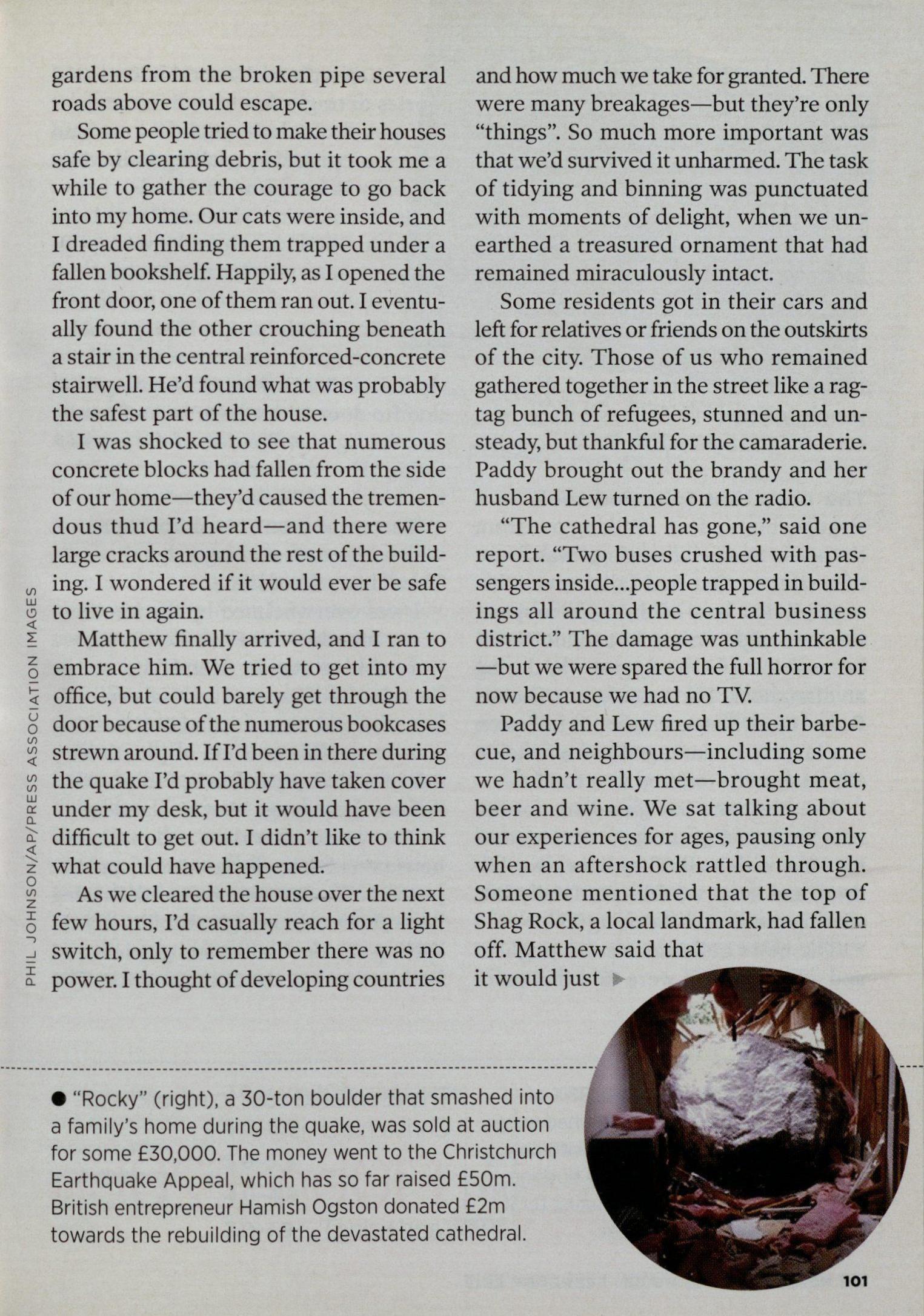
• "Rocky" (right), a 30-ton boulder that smashed into a family's home during the quake, was sold at auction for some £30,000. The money went to the Christchurch Earthquake Appeal, which has so far raised £50m. British entrepreneur Hamish Ogston donated £2m towards the rebuilding of the devastated cathedral.
PHIL JO HNSO N/ AP/ PRESS ASSOCIA TI O N I M AG ES
have to be called "Very Shagged Rock" from now on.
As daylight faded, we returned to the shells of our houses. The fear that night was almost worse than during the earthquake itself. There would be a rumble followed by a jolt, or a sudden deafening boom-boom!Matthew and I decided that the safest place to go to bed would be the downstairs guest room. But, even though my body ached with tiredness, I couldn't sleep. I thought of all those people trapped in buildings. Like a child, I wanted the light on, so we lit a candle.
The days that followed took on a strange, blurry feel. Walking out from the house that first morning, I was aware of a silence that had fallen over this once-vibrant area. I didn't want to spend another night in my house, not least because it might finally give way during an aftershock. Fortunately, our friends Di and Mark Slater, who live in Rolleston —a largely undamaged town outside Christchurch—offered us a room.
They became our guardians for the next week, giving us support as we came to terms with it all. They have two children, and soon we fell into family life, sharing meals and watching TV.
The news bulletins were repugnant and addictive. We were told that more
than 160 people had lost their lives, and stories of tragic deaths and miraculous escapes abounded—such as a woman who was crushed by a falling wall, while the baby in her arms survived.
But community spirit has always been strong in Christchurch, and it was uplifting to see how people rallied round: the 2,000 student volunteers on the streets shovelling silt; the people baking cookies and handing them out to rescue workers; the Salvation Army members going from door to door with advice and a friendly ear; the signs at the side of the road offering "Hot showers", "Use of washing machine" and "Good water".
There was even a bit of Kiwi humour, with one person sticking a sign that read "Free" in a pile of silt.
I was overwhelmed by the kindness of my friends. As well as Rolleston, we were able to stay in friends' houses in the suburbs of Papanui and Halswell. We were fed and watered, and our washing was done. This attitude of practicality mixed with compassion is, I think, what defines the average New Zealander.
Two weeks after the earthquake, our house was finally declared safe, and the power and water were restored. Driving home, I saw men in high-visibility jackets sorting out the drains, and glaziers and builders going about their work. The
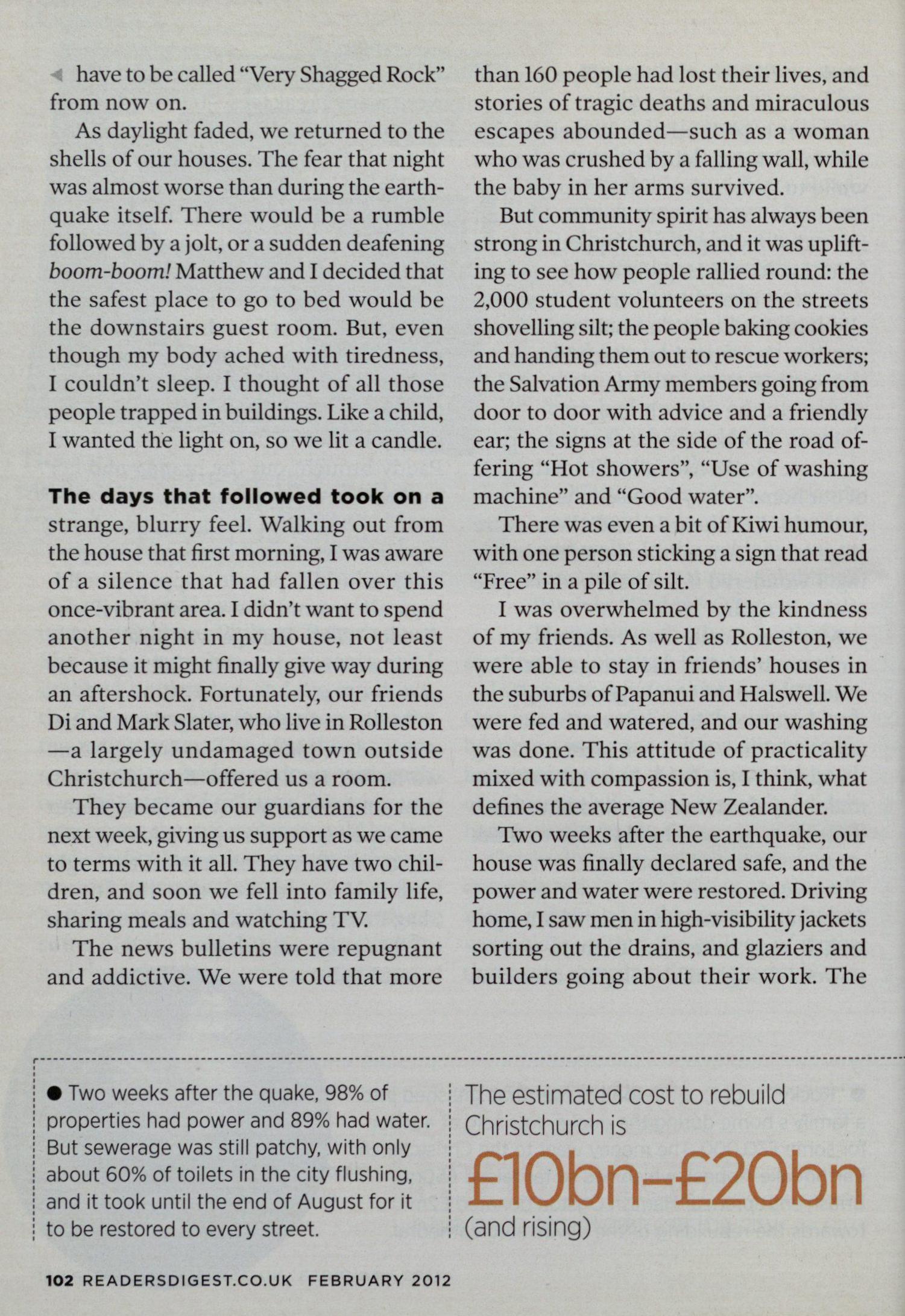
• Two weeks after the quake, 98% of properties had power and 89% had water. But sewerage was still patchy, with only about 60% of toilets in the city flushing, and it took until the end of August for it to be restored to every street.
The estimated cost to rebuild Christchurch is
(and rising)
102 READERSDIGEST.CO.UK FEBRUARY 2 012
ElObn f2Obn
silence had been replaced with the sound of power tools and hammers. Things were far from normal—the damage to the city's sewerage meant we'd have to use a Portaloo in the street for another two weeks—but I knew it wouldn't be long before the city found its feet again.
That said, a year later, Christchurch is a strange place to live. Our house still hasn't been repaired—we're part of a long queue waiting for an assessment and cheque from the government's Earthquake Commission. When you visit someone's house, you may admire the new "Christchurch chic" (cracked plaster and tied-in bookcases) but if you have any decency, you don't ask about the foundations.
Living with uncertainty is the hardest part. Back in June we had just started putting things back onto shelves, and feeling a little more confident, when a 5.6 and a 6.3 came roaring through from Lyttelton. That was a real sickener. But for many, the final straw came on December 23, when all Christmas cheer was vanquished as we endured a 5.8 followed by a 6 and several 5s. Only around 20 people were admitted to hospital with relatively minor injuries and there wasn't
much damage to buildings, but I can understand why a few of my friends—and some 9,000 people in total from a population of just under 400,000—have left the city. But most people I know, like me, intend to tough it out. There is something character-forming about "feeling the fear and doing it anyway".
Christchurch will never be quite the same, and we will always mourn the dead, but our love for the city is fierce. If anything, this tragedy has told us what we already knew: that the spirit and heart of this place are indestructible.
Oh, and the locals now call Shag Rock "Shag Pile". •
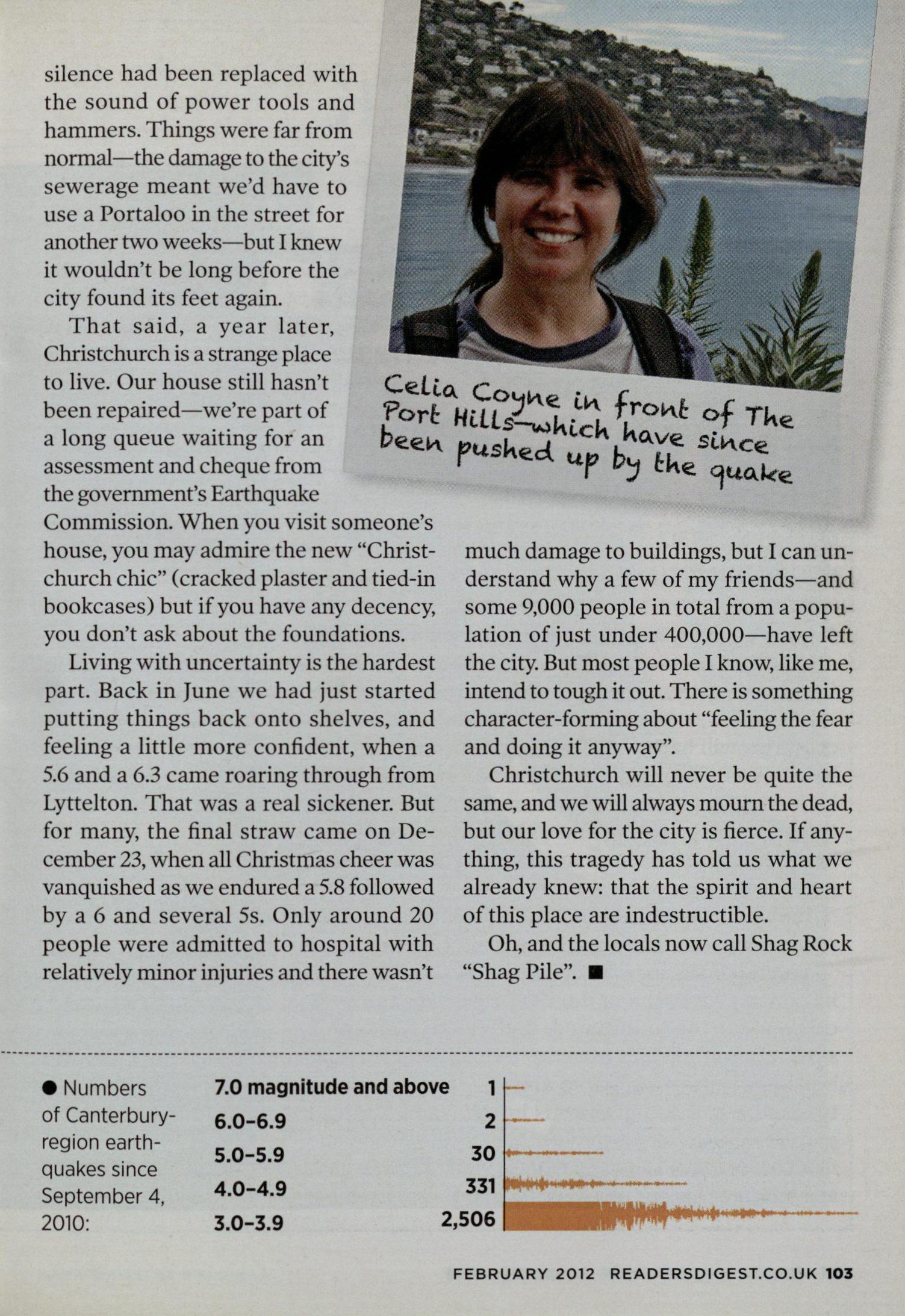
• Numbers of
region earthquakes since September 4, 2010:
Delta
tip by
Caykke Lt4 fro of The ForE NELLs—whick have sElAce beekk rushed
Eke (ittake
7.0 magnitude and above 1 6.0-6.9 2 5.0-5.9 30 4.0-4.9 331 3.0-3.9 2,506 ,•4•4011.1.0"" 111144104**4---
Canterbury-
FEBRUARY 2 012 READERSDIGEST.CO.UK 103
THE MAVERICK
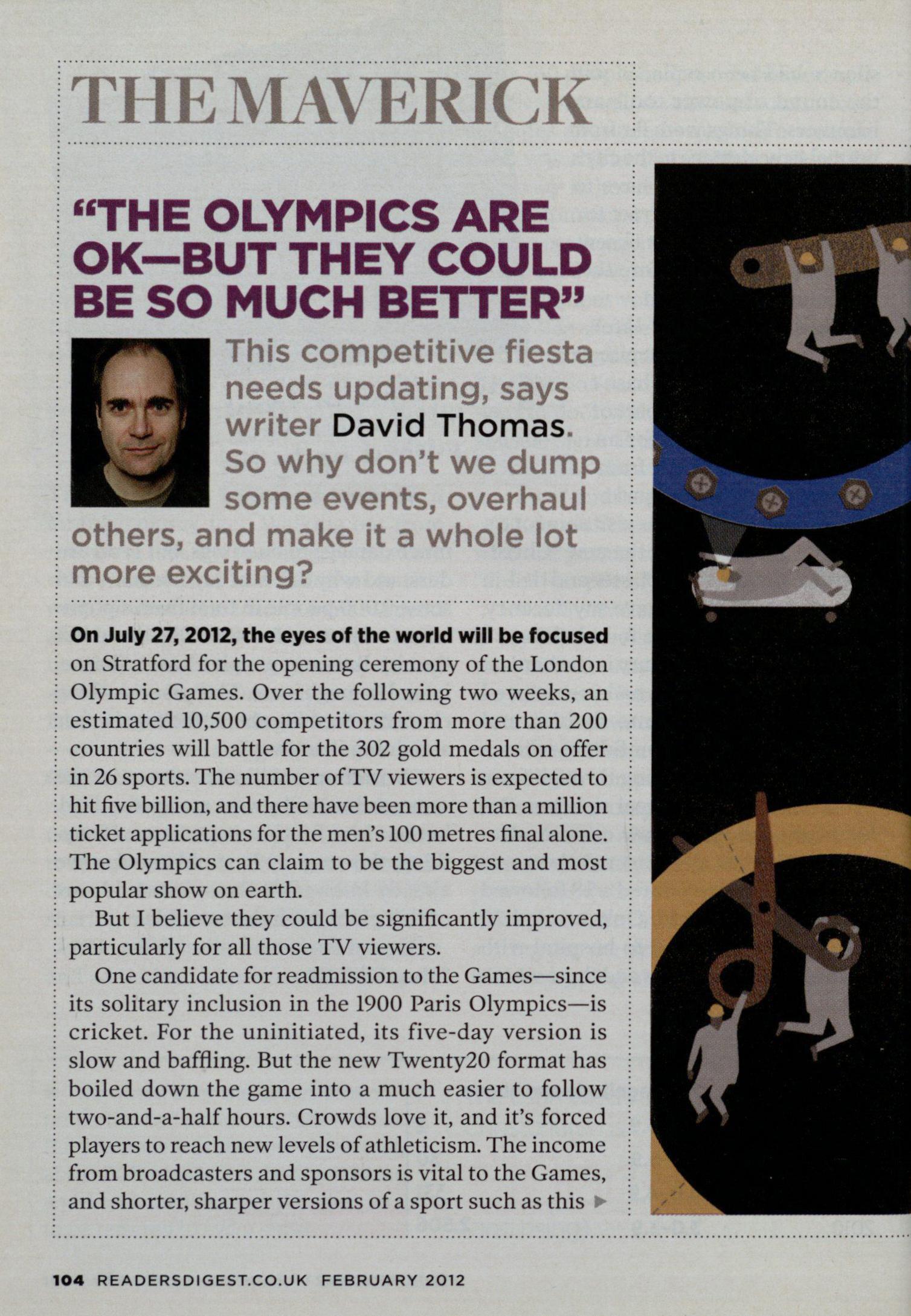
"THE OLYMPICS ARE OK-BUT THEY COULD BE SO MUCH BETTER"
This competitive fiesta needs updating, says writer David Thomas. So why don't we dump some events, overhaul others, and make it a whole lot more exciting?
On July 27, 2012, the eyes of the world will be focused on Stratford for the opening ceremony of the London Olympic Games. Over the following two weeks, an estimated 10,500 competitors from more than 200 countries will battle for the 302 gold medals on offer in 26 sports. The number of TV viewers is expected to hit five billion, and there have been more than a million ticket applications for the men's 100 metres final alone. The Olympics can claim to be the biggest and most popular show on earth.
But I believe they could be significantly improved, particularly for all those TV viewers.
One candidate for readmission to the Games—since its solitary inclusion in the 1900 Paris Olympics—is cricket. For the uninitiated, its five-day version is slow and baffling. But the new Twenty20 format has boiled down the game into a much easier to follow two-and-a-half hours. Crowds love it, and it's forced players to reach new levels of athleticism. The income from broadcasters and sponsors is vital to the Games, and shorter, sharper versions of a sport such as this ►
104 READERSDIGEST.CO.UK FEBRUARY 2012
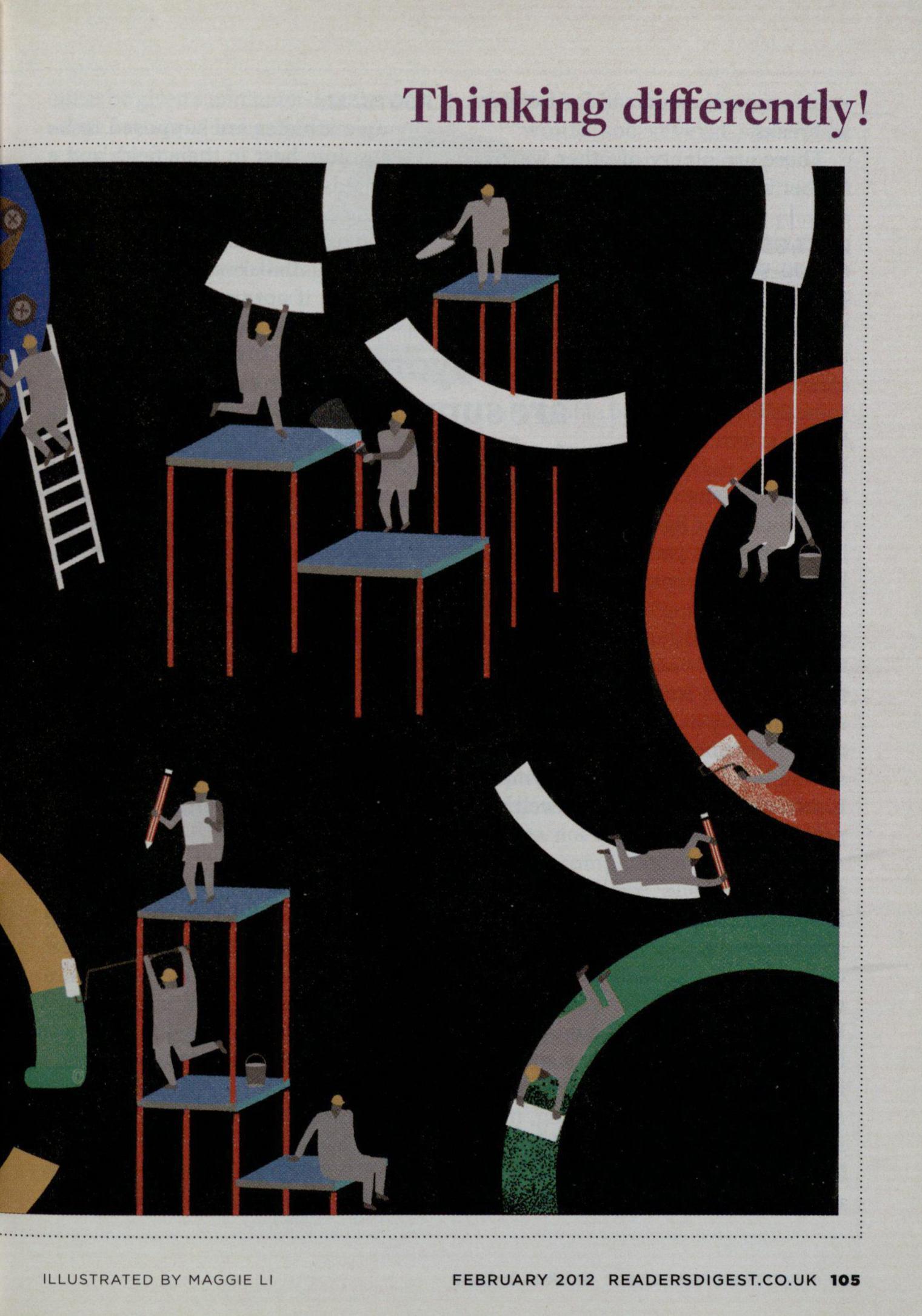
differently! ILLUSTRATED BY MAGGIE LI FEBRUARY 2012 READERSDIGEST.CO.UK 105
Thinking
• also meet the demand for frequent ad breaks.
There are plenty of other ways to further improve the Olympics, too....
LET'S GET RID OF... GRECO-ROMAN WRESTLING
The clue is in the name: "Greco-Roman" Wrestling dates back
FOOTBALL
Olympic athletes are supposed to be the absolute best in their field, and a gold medal should be their greatest sporting achievement. Yet the men's football teams are composed of players under 23, plus three over-age participants —so many, if not most, of the game's greatest stars will be to the very start of the classical Olympics, some 2,700 years ago. But if you were starting the Games today and looking for the best way to present fighting or wrestling, you'd leave this in the past.
SYNCHRONISED SWIMMING
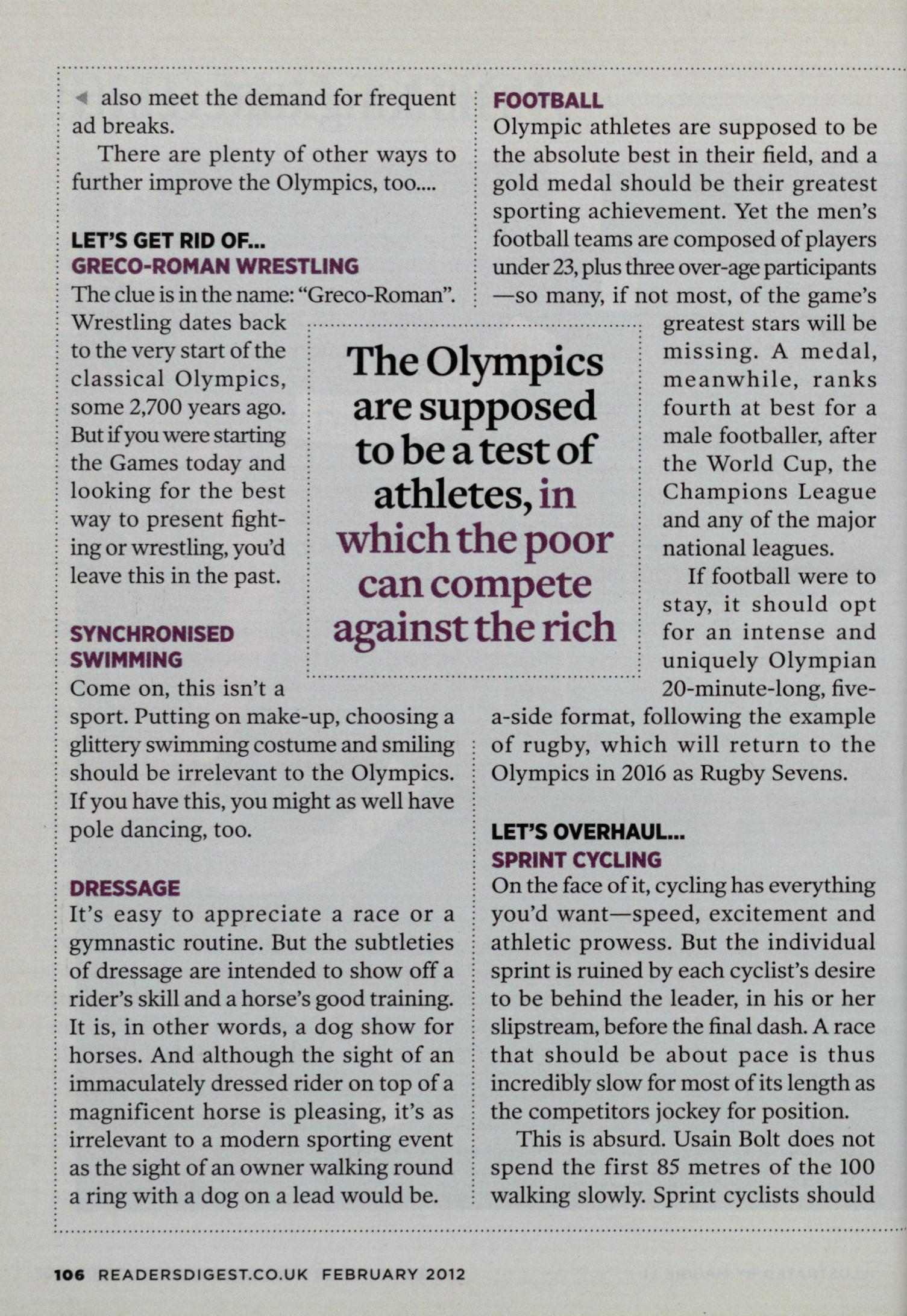
The Olympics are supposed to be a test of athletes, in which the poor can compete against the rich
20-minute-long, fivea-side format, following the example of rugby, which will return to the Olympics in 2016 as Rugby Sevens.
missing. A medal, meanwhile, ranks fourth at best for a male footballer, after the World Cup, the Champions League and any of the major national leagues. If football were to stay, it should opt for an intense and uniquely Olympian Come on, this isn't a sport. Putting on make-up, choosing a glittery swimming costume and smiling should be irrelevant to the Olympics. If you have this, you might as well have pole dancing, too.
DRESSAGE
It's easy to appreciate a race or a gymnastic routine. But the subtleties of dressage are intended to show off a rider's skill and a horse's good training. It is, in other words, a dog show for horses. And although the sight of an immaculately dressed rider on top of a magnificent horse is pleasing, it's as irrelevant to a modern sporting event as the sight of an owner walking round a ring with a dog on a lead would be.
LET'S OVERHAUL... SPRINT CYCLING
On the face of it, cycling has everything you'd want—speed, excitement and athletic prowess. But the individual sprint is ruined by each cyclist's desire to be behind the leader, in his or her slipstream, before the final dash. A race that should be about pace is thus incredibly slow for most of its length as the competitors jockey for position. This is absurd. Usain Bolt does not spend the first 85 metres of the 100 walking slowly. Sprint cyclists should
106 READERSDIGEST.CO.UK FEBRUARY 2 012
either be given a minimum time for their event, or race side-by-side along a straight track.
SHOOTING
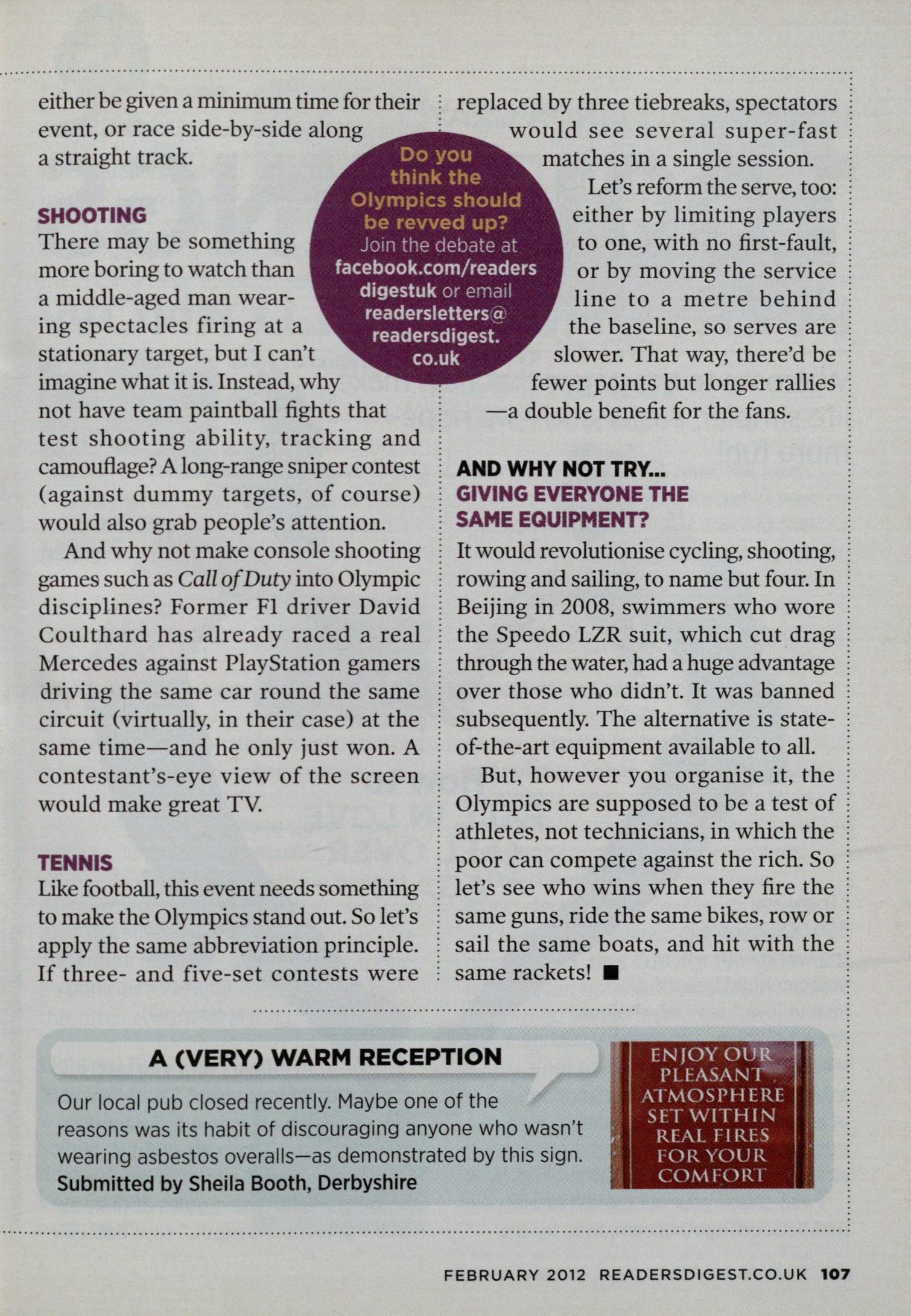
replaced by three tiebreaks, spectators would see several super-fast matches in a single session.
Do you think the Olympics should be revved up?
There may be something more boring to watch than a middle-aged man wearing spectacles firing at a stationary target, but I can't imagine what it is. Instead, why not have team paintball fights that test shooting ability, tracking and camouflage? A long-range sniper contest (against dummy targets, of course) would also grab people's attention. And why not make console shooting games such as Call of Duty into Olympic disciplines? Former Fl driver David Coulthard has already raced a real Mercedes against PlayStation gamers driving the same car round the same circuit (virtually, in their case) at the same time—and he only just won. A contestant's-eye view of the screen would make great TV.
Join the debate at facebook.com/readers digestuk or email readersletters readersdigest. co.uk
Let's reform the serve, too: either by limiting players to one, with no first-fault, or by moving the service line to a metre behind the baseline, so serves are slower. That way, there'd be fewer points but longer rallies —a double benefit for the fans.
AND WHY NOT TRY... GIVING EVERYONE THE SAME EQUIPMENT?
It would revolutionise cycling, shooting, rowing and sailing, to name but four. In Beijing in 2008, swimmers who wore the Speedo LZR suit, which cut drag through the water, had a huge advantage over those who didn't. It was banned subsequently. The alternative is stateof-the-art equipment available to all.
TENNIS
Like football, this event needs something to make the Olympics stand out. So let's apply the same abbreviation principle. If three- and five-set contests were
But, however you organise it, the Olympics are supposed to be a test of athletes, not technicians, in which the poor can compete against the rich. So let's see who wins when they fire the same guns, ride the same bikes, row or sail the same boats, and hit with the same rackets! ■
A (VERY) WARM RECEPTION
Our local pub closed recently. Maybe one of the reasons was its habit of discouraging anyone who wasn't wearing asbestos overalls—as demonstrated by this sign. Submitted by Sheila Booth, Derbyshire
ENJOY OUR PLEASAN ATMOSPHERE SET WITHIN REAL FIRES FOR YOUR COMFORT
FEBRUARY 2 012 READERSDIGEST.CO.UK 107
HOW TO...
BY LINDA GRAY
1,001 THINGS EVERYONE SHOULD KNOW
Welcome to the pages that help make life simpler, easier and—we hope— more fun! ,
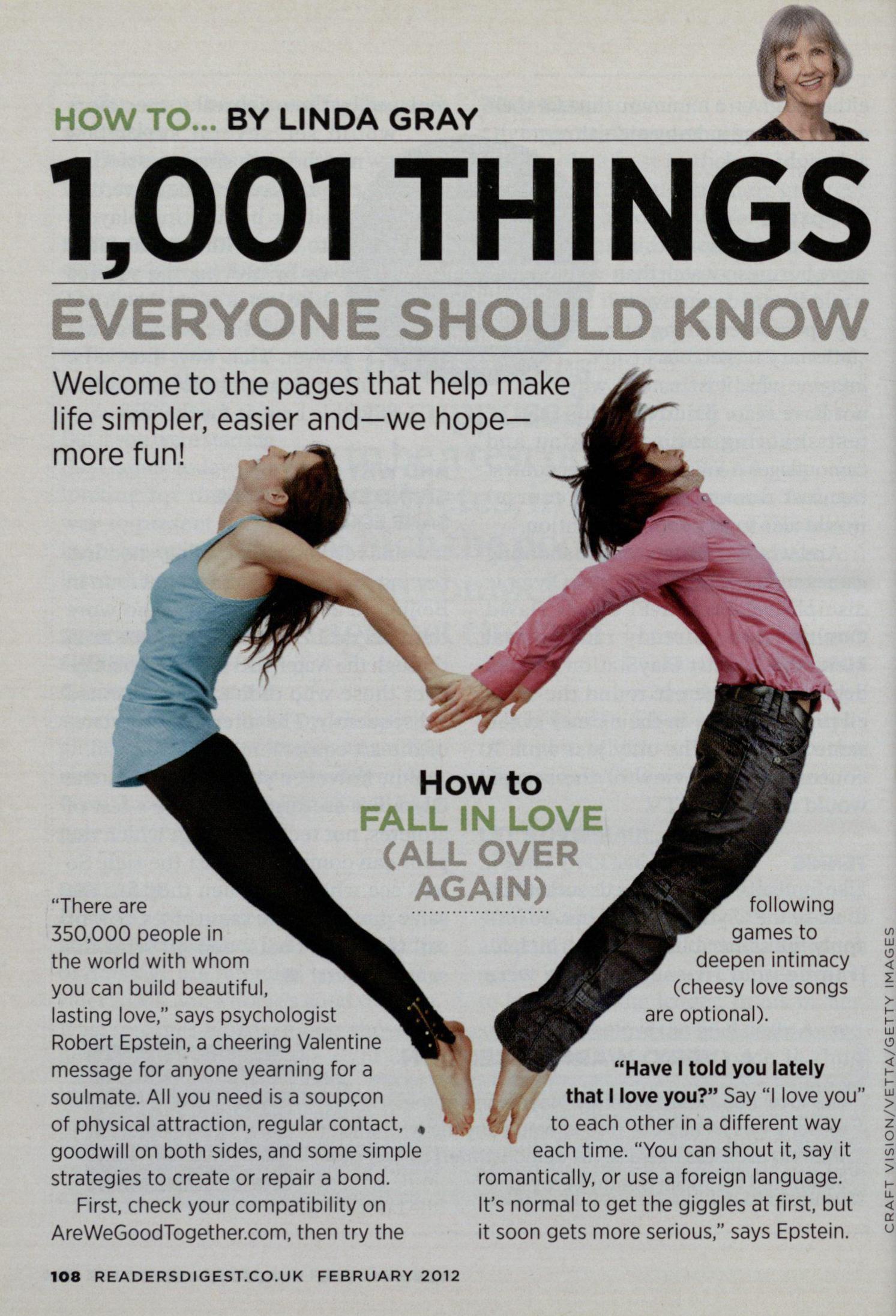
"There are 350,000 people in the world with whom you can build beautiful, lasting love," says psychologist Robert Epstein, a cheering Valentine message for anyone yearning for a soulmate. All you need is a soupcon of physical attraction, regular contact, goodwill on both sides, and some simple strategies to create or repair a bond.
First, check your compatibility on AreWeGoodTogether.com, then try the
following games to deepen intimacy (cheesy love songs are optional).
"Have I told you lately that I love you?"Say "I love you" to each other in a different way each time. "You can shout it, say it romantically, or use a foreign language. It's normal to get the giggles at first, but it soon gets more serious," says Epstein.
108 READERSDIGEST.CO.UK FEBRUARY 2012
CRAFT VIS ION/VETTA/G ETTY IMA GE S
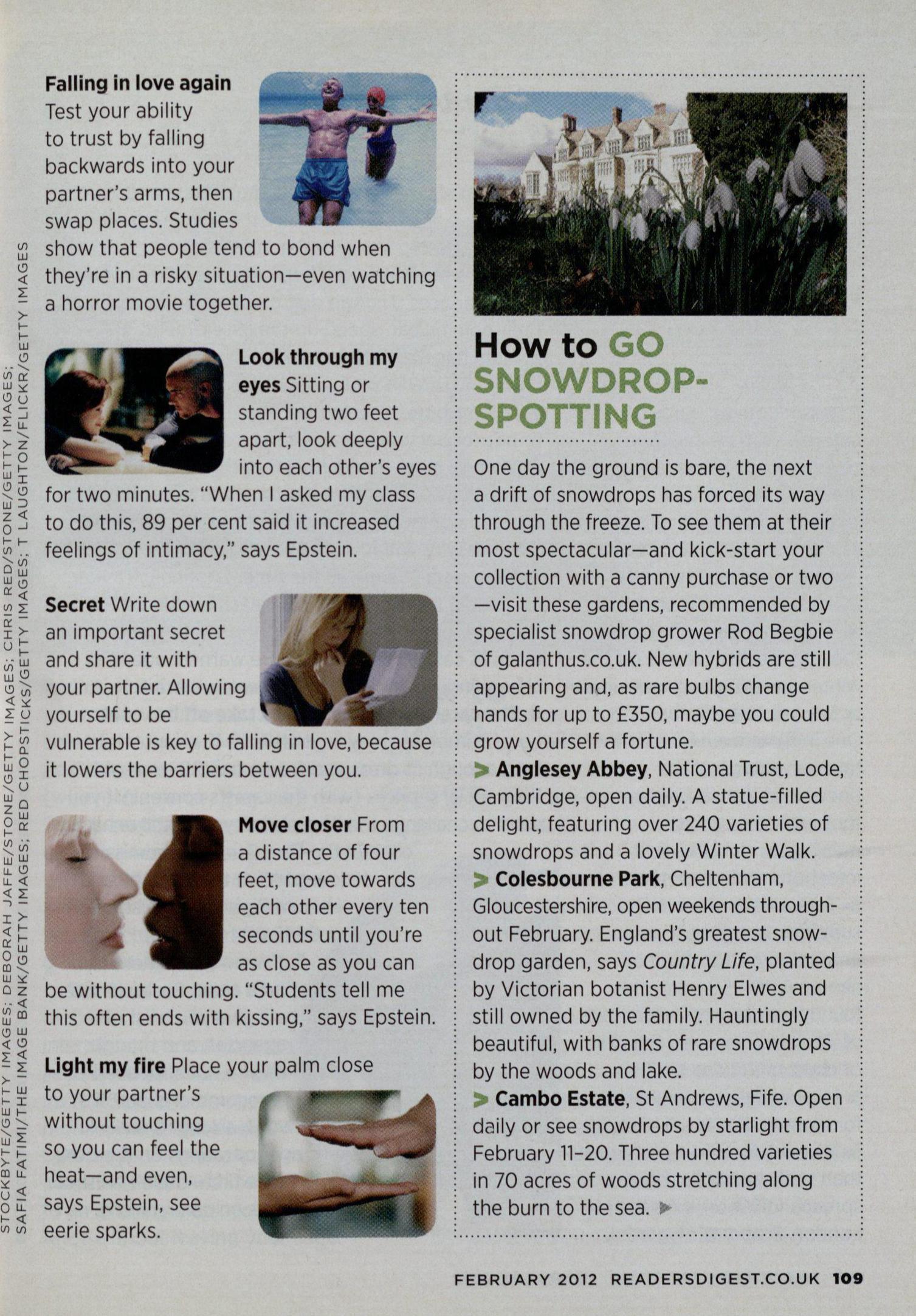
Falling in love again
Test your ability to trust by falling backwards into your partner's arms, then swap places. Studies show that people tend to bond when they're in a risky situation—even watching a horror movie together.
Look through my eyes Sitting or standing two feet apart, look deeply into each other's eyes for two minutes. "When I asked my class to do this, 89 per cent said it increased feelings of intimacy," says Epstein.
Secret
Write down an important secret and share it with your partner. Allowing yourself to be vulnerable is key to falling in love, because it lowers the barriers between you.
Move closer From a distance of four feet, move towards each other every ten seconds until you're as close as you can be without touching. "Students tell me this often ends with kissing," says Epstein.
Light my fire
Place your palm close to your partner's without touching so you can feel the r/12 heat—and even, says Epstein, see eerie sparks.
How to GO SNOWDROPSPOTTING
One day the ground is bare, the next a drift of snowdrops has forced its way through the freeze. To see them at their most spectacular—and kick-start your collection with a canny purchase or two —visit these gardens, recommended by specialist snowdrop grower Rod Begbie of galanthus.co.uk. New hybrids are still appearing and, as rare bulbs change hands for up to £350, maybe you could grow yourself a fortune.
> Anglesey Abbey, National Trust, Lode, Cambridge, open daily. A statue-filled delight, featuring over 240 varieties of snowdrops and a lovely Winter Walk.
> Colesbourne Park, Cheltenham, Gloucestershire, open weekends throughout February. England's greatest snowdrop garden, says Country Life, planted by Victorian botanist Henry Elwes and still owned by the family. Hauntingly beautiful, with banks of rare snowdrops by the woods and lake.
> Cambo Estate, St Andrews, Fife. Open daily or see snowdrops by starlight from February 11-20. Three hundred varieties in 70 acres of woods stretching along the burn to the sea.
LU Lt = 7 , z u, za u, 2 o uF El o U 'an 0 W o 21' 1 ' Wa of C O'(13 j Z 15.1 W < 0 < W I1.1 IX u? 0
FEBRUARY 2012 READERSDIGEST.CO.UK 109

How to.:SEAT SEASONAL BUGS
It's peak time for some of nature's nastiest infections, so keep yourself safe with these 60-second tips.
> Wash your hands as soon as you get home, singing "Happy Birthday" twice to make sure you do it properly.
> Wipe surfaces with bleach, the only cleanser to see off the winter-vomiting bug norovirus.
> Say yes to free jabs. One in three over-65s don't take advantage of the pneumococcal vaccination that protects against meningitis, sinusitis, ear infections and pneumonia.
> Take a daily vitamin D supplement to boost your immunity. A UCL study of almost 8,000 50-year-olds found that every ten nanomoles of vitamin D lowered the risk of chest infections by 7%.
> Microwave kitchen cloths for two minutes to kill bacteria.
> Mwaah! Air kissing is better than shaking hands, which spreads infection, says the London School of Hygiene.
How to FIND A HOME CARER
When an elderly parent is felled by illness and needs care, more than one of you is left floundering. Here's how to sidestep some common pitfalls.
1.It takes months to get help. Ask the GP to contact social services. Though doctors have no formal role, their opinion can speed up the assessment.
2. Mum has £25,000 in savings. If your parent has under £13,000 in savings and less than £10,000 a year in income, it's a fair bet that they won't have to pay for personal care (it's free for the over-65s in Scotland). More than £23,250 in the bank (£1,000 less in Wales) and they have to pay in full—up to £17 an hour. Contact social services to request a review when they're within £1,000 of the limit.
3. The carers change all the time. Continuity is vital for people with dementia or speech problems—to be sure of it, opt for direct payments, where your parent receives cash to pay for care. Be warned: agencies charge individuals more than local authorities.
4. The carer barely has time to take off her coat. Local authorities may limit visits to 15 minutes, not long enough to dress and feed a frail 90-year-old. Ring social services (with the caree's consent) if you want to challenge the care plan. If you're still unhappy, contact the Care Quality Commission (cqc.org.uk) or the Equality and Human Rights Commission on 0845 604 6610.
5. I've no idea where to find a carer. Social services will give you a list of agencies, and though they're not supposed to recommend one, it's worth asking. Check agency ratings on the CQC website first—there's a list of questions on carersuk.org.
M IEKE DALLE/TAXI/GETTY IMAGES: RON CHAPPIE/ T A XI / GETTY I M AGES 1,001 THINGS
110 READERSDIGEST.CO.UK FEBRUARY 2 012
A click of the mouse and there are your loved ones on the other side of the world, but chatting as if they were in the same room (which, in a sense, they are). Eighty-seven per cent of over-55s use the internet to keep in touch with family and friends abroad, say Skype. And because it's free, you can check up on that new baby or globetrotting gapper as often as you wish.
How to MAKE THE MOST OF SKYPE
All you need is the latest version of Skype (5) and a reliable broadband connection, microphone and webcam—open up a contact and click "check settings" before you start. Next, click the Call Quality icon and tick "automatically select" to adjust the microphone and speakers. Then block spammers by changing the privacy settings on Tools>Options>Calls.

But Skype is more than an electronic umbilical cord. Other free services include Internet phone calls worldwide, voicemail, instant messaging and conference calls for up to 25 people. You can access it on your mobile, Facebook page, or make Skype calls on your home phone using a Freetalk adaptor (E35). And instead of trudging to an evening class, you can link to your tutor without leaving your chair.
Skype doesn't do everything better. It isn't always the cheapest option: TalkTalk currently offers anytime calls to landlines in the UK and ten countries plus North American mobiles for just £4.71 a month. Sound can also be an issue, so a headset's often recommended for phone calls. And please don't ditch your old phone, because you can't ring 999 with Skype.
DIM ITRI VERVITSI OTIS/ PH OTOGRAPHERS CHOICE/ GE TTY IMAGES
FEBRUARY 2012 READERSDIGEST.CO.UK 111
ATTENTION!
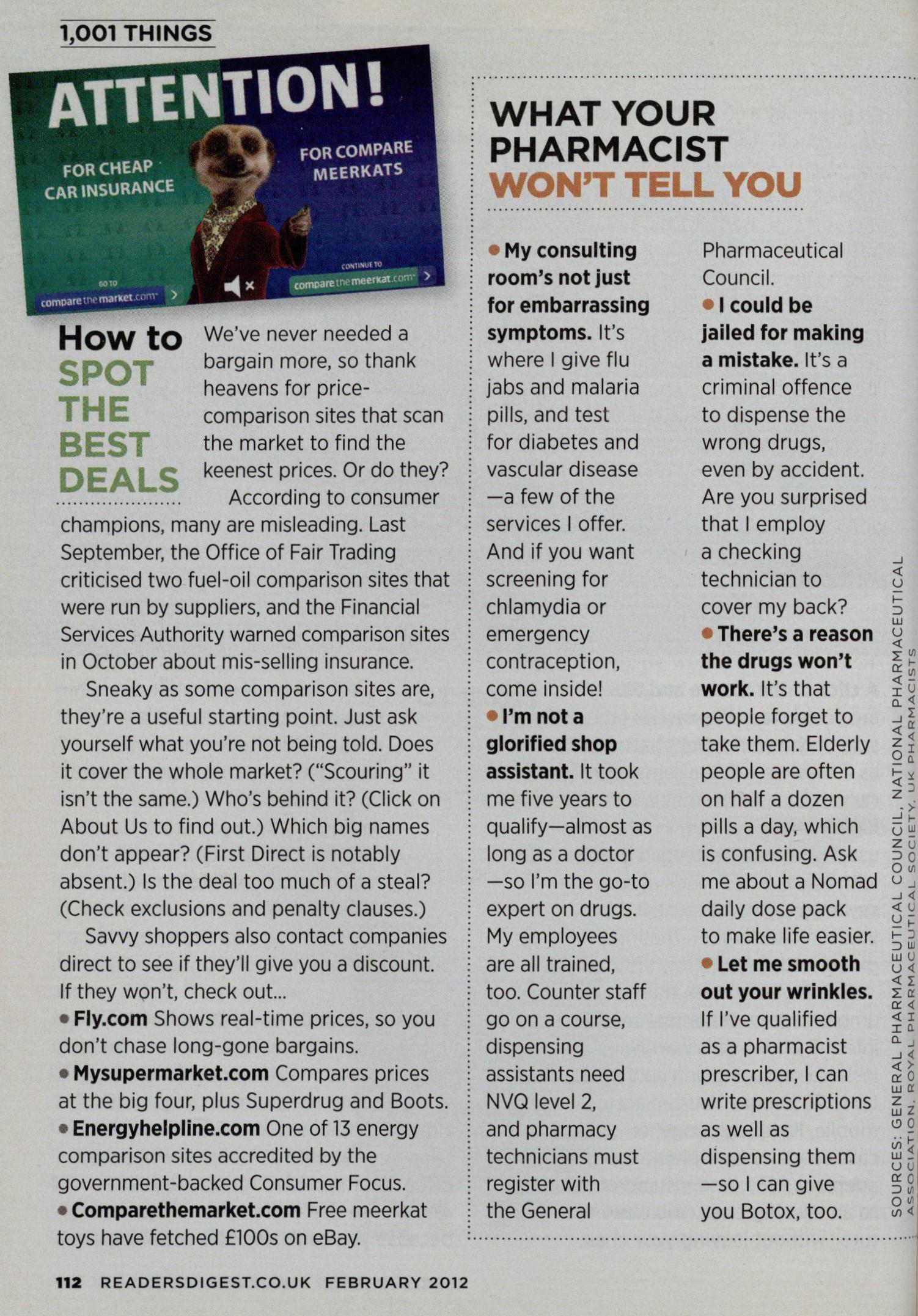
How to SPOT THE
We've never needed a bargain more, so thank heavens for pricecomparison sites that scan BEST the market to find the DEALS keenest prices. Or do they?
According to consumer champions, many are misleading. Last September, the Office of Fair Trading criticised two fuel-oil comparison sites that were run by suppliers, and the Financial Services Authority warned comparison sites in October about mis-selling insurance. Sneaky as some comparison sites are, they're a useful starting point. Just ask yourself what you're not being told. Does it cover the whole market? ("Scouring" it isn't the same.) Who's behind it? (Click on About Us to find out.) Which big names don't appear? (First Direct is notably absent.) Is the deal too much of a steal? (Check exclusions and penalty clauses.) Savvy shoppers also contact companies direct to see if they'll give you a discount. If they won't, check out...
• Fly.com Shows real-time prices, so you don't chase long-gone bargains.
• Mysupermarket.com Compares prices at the big four, plus Superdrug and Boots.
• Energyhelpline.com One of 13 energy comparison sites accredited by the government-backed Consumer Focus.
• Comparethemarket.com Free meerkat toys have fetched E100s on eBay.
WHAT YOUR PHARMACIST WON'T TELL YOU
• My consulting room's not just for embarrassing symptoms. It's where I give flu jabs and malaria pills, and test for diabetes and vascular disease —a few of the services I offer. And if you want screening for chlamydia or emergency contraception, come inside!
• I'm not a glorified shop assistant. It took me five years to qualify—almost as long as a doctor —so I'm the go-to expert on drugs. My employees are all trained, too. Counter staff go on a course, dispensing assistants need NVQ level 2, and pharmacy technicians must register with the General Pharmaceutical Council.
• I could be jailed for making a mistake. It's a criminal offence to dispense the wrong drugs, even by accident. Are you surprised that I employ a checking technician to cover my back?
• There's a reason the drugs won't work. It's that people forget to take them. Elderly people are often on half a dozen pills a day, which is confusing. Ask me about a Nomad daily dose pack to make life easier.
* Let me smooth out your wrinkles. If I've qualified as a pharmacist prescriber, I can write prescriptions as well as dispensing them —so I can give you Botox, too.
X re tnenlarKet.co,FOR CHEAP • CAR INSURANCE
J w • (-1 ) au E‹ ,o ( = 1 uW Zu o f au 17 J DUJ WU U< <2 Ice a< <1 ma a, Ja a0 w. LTJi uo `f" -1 uti a0 ,`,)4 1,001 THINGS
FOR COMPARE MEERKATS
112 READERSDIGEST.CO.UK FEBRUARY 2012
e If you want a fancy brand, ask your GP. I have to supply what doctors prescribe, and if they name a brand, that's what you'll get. If they ask for a generic medicine, I'll choose the cheapest available to help the cashstrapped NHS. If you're unhappy with that, take it up with your doctor, not me.
• I have to ask nosy questions. The Royal Pharmaceutical Society says you should make an informed choice when buying medicines, so I need to find out how much you know. Expect more of a grilling when choosing P-rated medicines such as codeine, which can only be sold when a pharmacist is in charge.
• So you bought it from a garage? That doesn't mean it's safe.
Eighty-four per cent of us are given paracetamol by the age of six months and, at the right dose, it's fine. But taking just a few pills more than the recommended eight tabs in 24 hours can cause fatal liver damage. There's an antidote but it needs to be given in the first eight hours, so if you overdose, ring 999.
• I'm a counsellor, too. If you're prescribed two or more meds long-term, or you've started taking blood thinners or medication for blood pressure, diabetes or lung disease, ask for a review. But don't settle for a few words at the counter. The NHS is paying, so it should last 20 minutes.
• Sorry, I've run out. Don't blame my sloppy
stocktaking. Pharmaceutical companies sometimes limit supplies for commercial reasons or withdraw drugs altogether. And if your eyedrops aren't being made, there's nothing I can do. a I'll salvage your holiday plans. If you've forgotten to pack your medicine and can't get to a doctor, I'll sell you up to 30 days' supplies. But I'll have to be convinced you need it—and I'll charge.
• I can cut the cost of illness
For £29.10— less than four prescribed meds—I can

sell you a three-month pre-payment certificate, which covers as many as you need. Prescriptions are free if you're young, old, pregnant, on benefit or a low income, or have cancer, a disability, or a chronic health condition. See prescription costs on nhs.uk. ■
ECHO/ CUL TURA/GETTY IMAGES
MEDICINE WITH MAX PEMBERTON
HIDDEN BENEFITS
The more people we can get working, the better their health will be
When I was at medical school, I lived with a group of friends in a flat on a council estate. It was well planned, with low-rise blocks, plenty of green space and trees, a community centre and playground. I felt rather smug that I'd managed to find somewhere to OF live that fitted in so well with my political ideologies. Then I met some of my neighbours. They were lovely. They'd make us cakes and help us with DIY. But it gradually dawned on me that none of them worked. The mother had a bad back, the father had stress and the two sons had depression. They said they were on incapacity benefit.
One summer, before graduating, I sat for a week studying in my room. It was swelteringly hot and I had to keep the window open. But I was incessantly interrupted by my neighbours' banter outside. Laughing, joking, playing football, having rows; their entire social life was being played out in front of me. And then
it occurred to me: I had the education, but wasn't I the stupid one? I was studying while they sunbathed. What was even more galling was that their apparent illnesses didn't hinder their lives—they didn't seem to be incapacitated at all. I don't wish to be critical, but as I watched the sons kicking a ball around, I wondered if this was the best cure for their depression.
Now that I work as a doctor, I see people battling crippling, disabling illnesses who deserve help from the state; people who are unable to work and whose lives are blighted by their conditions. I'd hate to think that any restrictions on benefit w applications might mean that a proportion of those who really deserved it were excluded. That would be a tragedy. Similarly, I'd be the last person to belittle $the impact of mental illness and the way it devastates lives. But in outpatient clinics
One of the best cures for depression is work. It forces you to get up and structure your day
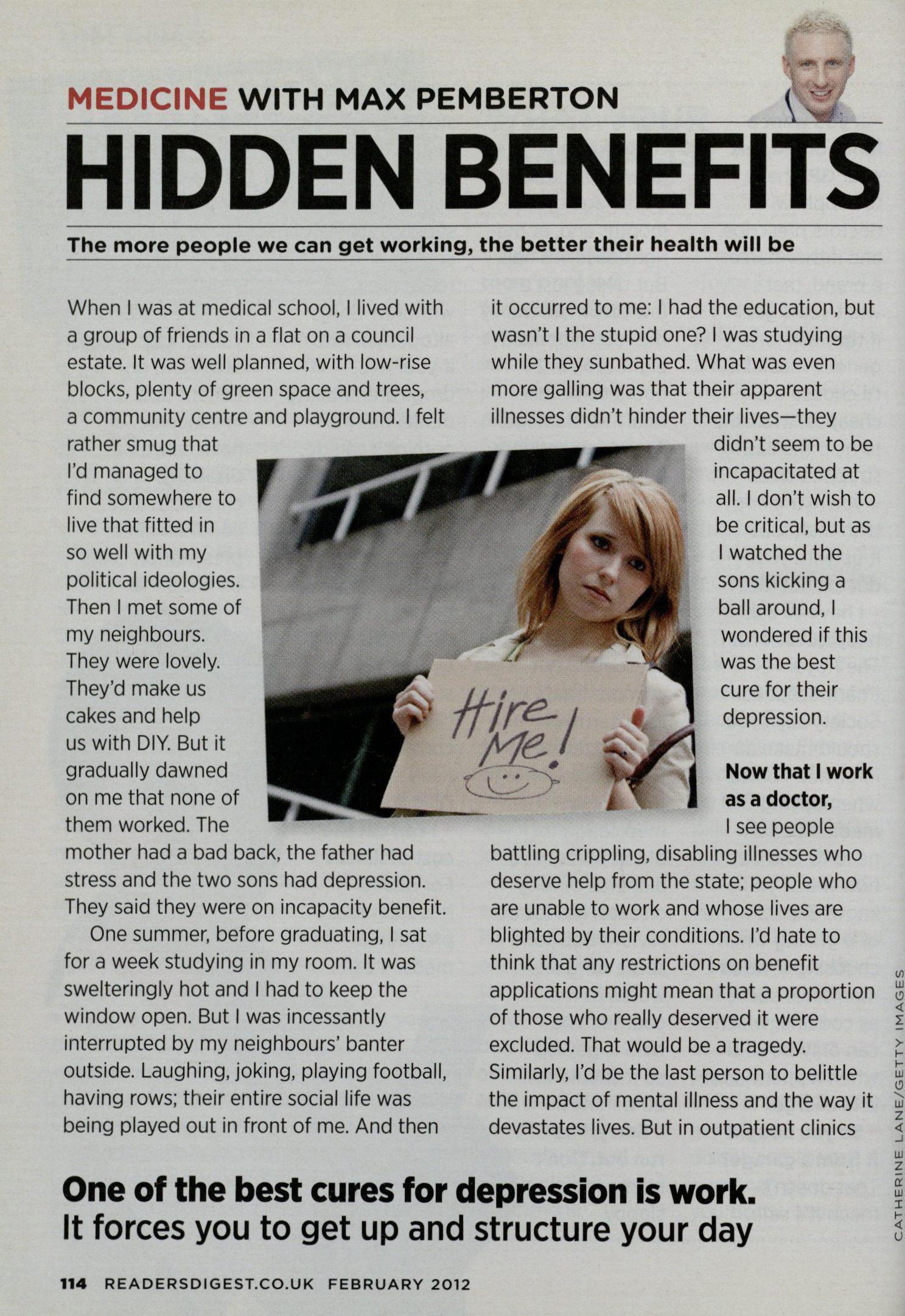
U 4
114 READERSDIGEST.CO.UK FEBRUARY 2 012
it's unusual to see people who are so incapacitated by depression that they can't actually work long-term.
In fact, one of the best cures for depression is work. It forces you to get up, get dressed and structure your day. Unemployment and depression are interrelated, and as those who are unemployed become depressed, they're moved from unemployment benefit to incapacity benefit, where they languish. It's difficult to get people out of this spiral of hopelessness. But in the long run doing so will not just reduce the number of people claiming benefit, it will also be therapeutic for them. And it's got to be more effective than playing football all day.
Max Pemberton is a hospital doctor, and the Mind Journalist of the Year 2010
KNOW YOUR ORGANS
The chances are that if you're reading this, you don't have much of a thymus. But you did once. Unlike other organs such as the heart and liver, it's the only organ in the body that's at its largest when we're children. The thymus lives in the chest, behind the breastbone and in front of the heart. We have known about the thymus for thousands of years—it's thought the word comes from the Greek thumos, meaning soul, because the Ancient Greeks noticed its location in the chest. But it wasn't until the 1960s that we realised what it actually does and how important it is.
control the immune response to ensure that the right cell is attacked. The thymus starts producing T-cells while the foetus is in the womb, releasing them into the bloodstream, where they live. It does this until puberty—by which time there are more than enough T-cells in the blood and we don't really need the thymus any more.

The thymus is responsible for producing a very special type of white blood cell called a T-cell. These form a vital part of the immune system—they detect cells in the body that are infected with viruses and kill them. They also help to
When we're born, the thymus weighs about 15 grams and this increases throughout childhood to about 25 grams. It then starts shrinking so that it weighs less than five grams when we're in our seventies, and in some older people it seems to vanish altogether.
HEART OF THE MATTER
Cancer of the thymus is rare. In open-heart surgery the thymus has to be removed so that the heart can be reached. Even in children removal rarely causes a problem because it's already produced enough T-cells for the body while in the womb. But in conditions where the thymus has never developed properly, the person may have a very weakened immune system. ■
ILLU STRATED BY DAVID HUMPHRIES/M ONSTER
FEBRUARY 2 012 READERSDIGEST.CO.UK 115
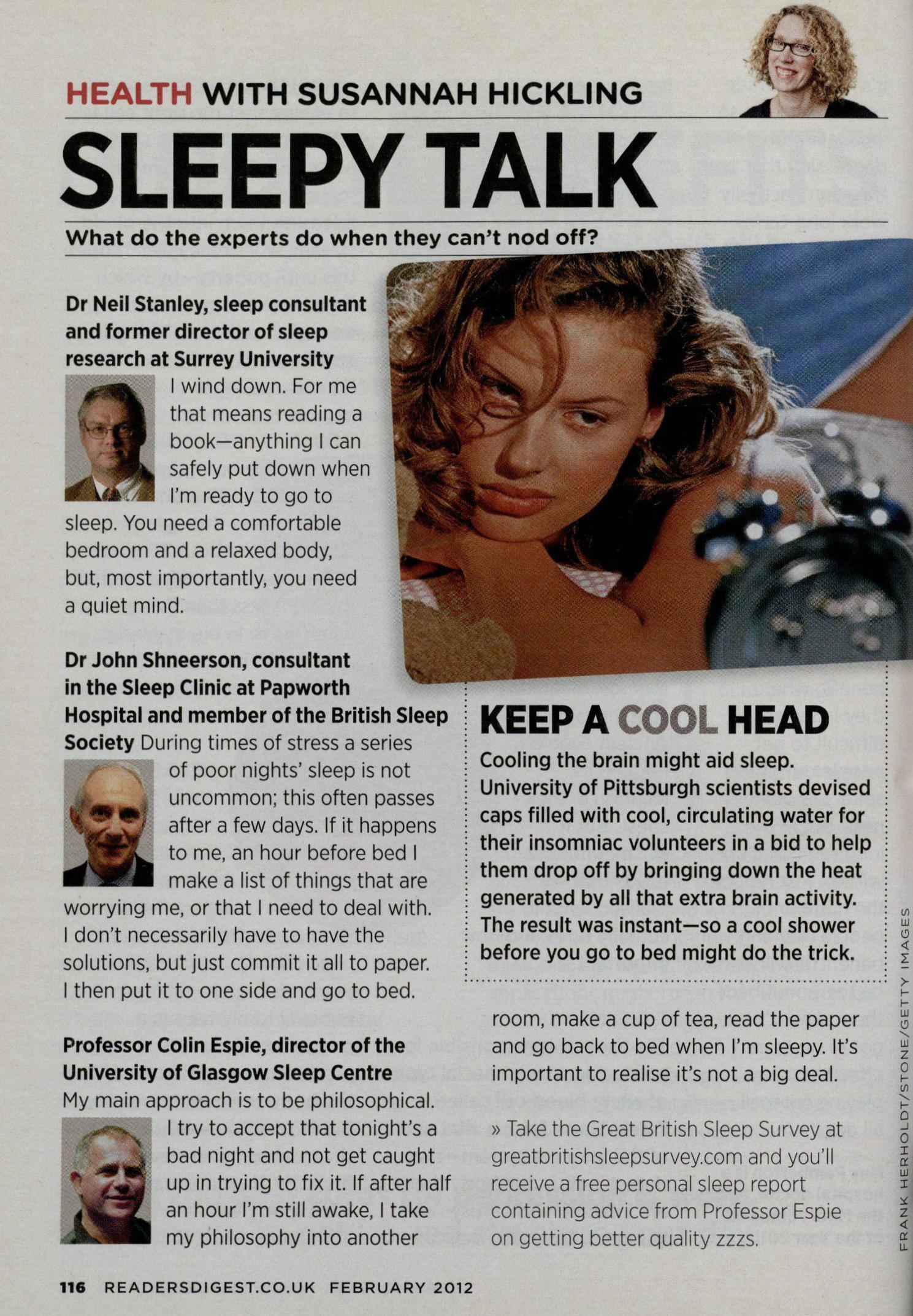
HEALTH WITH SUSANNAH HICKLING
SLEEPY TALK
What do the experts do when they can't nod off?
Dr Neil Stanley, sleep consultant and former director of sleep research at Surrey University I wind down. For me that means reading a book—anything I can safely put down when I'm ready to go to sleep. You need a comfortable bedroom and a relaxed body, but, most importantly, you need a quiet mind.
Dr John Shneerson, consultant in the Sleep Clinic at Papworth Hospital and member of the British Sleep Society During times of stress a series of poor nights' sleep is not uncommon; this often passes after a few days. If it happens to me, an hour before bed I make a list of things that are worrying me, or that I need to deal with. I don't necessarily have to have the solutions, but just commit it all to paper. I then put it to one side and go to bed.
Professor Colin Espie, director of the University of Glasgow Sleep Centre
My main approach is to be philosophical.
I try to accept that tonight's a bad night and not get caught up in trying to fix it. If after half an hour I'm still awake, I take my philosophy into another
KEEP A COOL. HEAD
Cooling the brain might aid sleep. University of Pittsburgh scientists devised caps filled with cool, circulating water for their insomniac volunteers in a bid to help them drop off by bringing down the heat generated by all that extra brain activity. The result was instant—so a cool shower before you go to bed might do the trick.
room, make a cup of tea, read the paper and go back to bed when I'm sleepy. It's important to realise it's not a big deal.
» Take the Great British Sleep Survey at greatbritishsleepsurvey.com and you'll receive a free personal sleep report containing advice from Professor Espie on getting better quality zzzs.
z 0
116 READERSDIGEST.CO.UK FEBRUARY 2 012
I HAD A LUNG TRANSPLANT
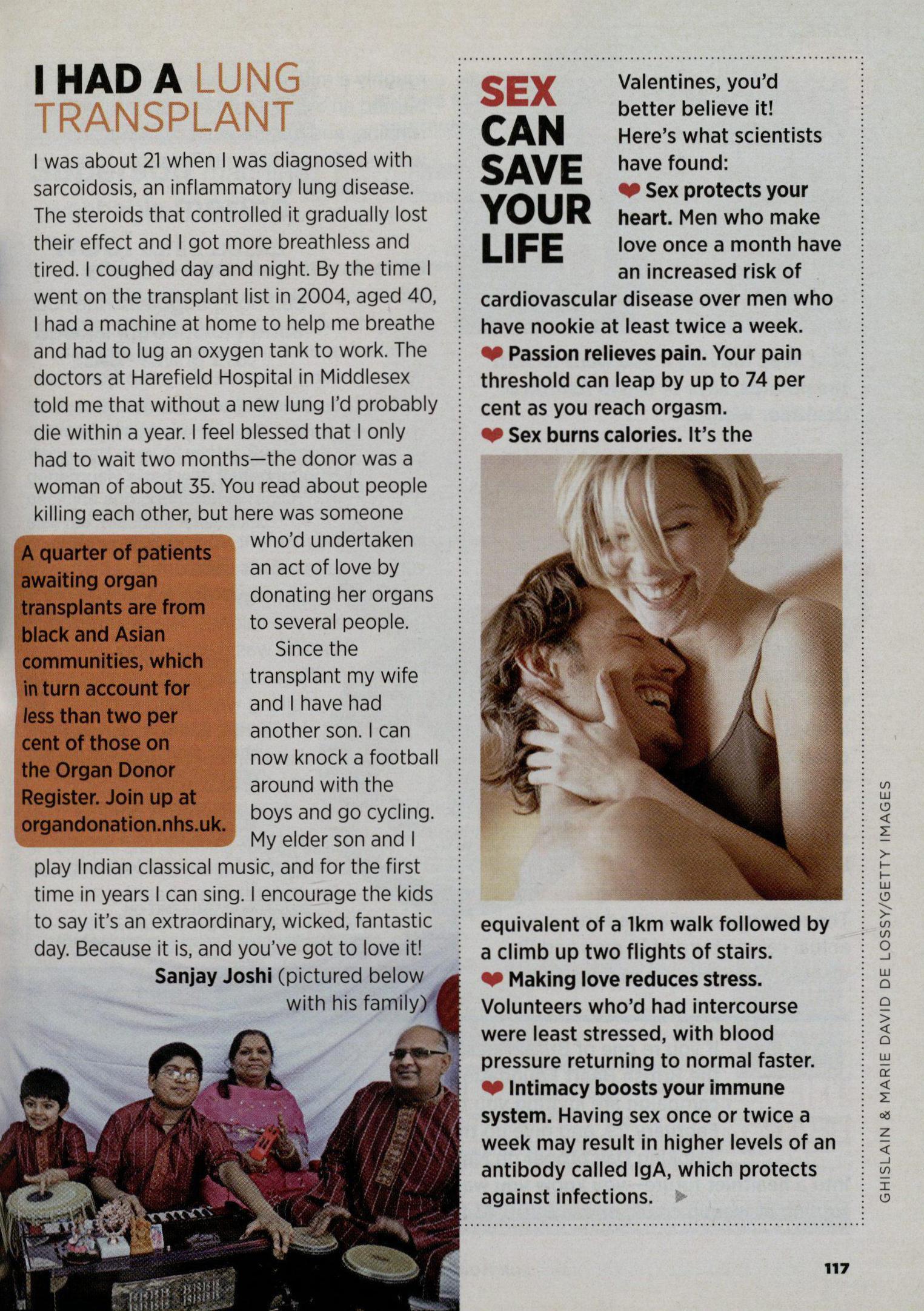
A quarter of patients awaiting organ transplants are from black and Asian communities, whic in turn account for less than two per cent of those on the Organ Donor Register. Join up at organdonation.nhs
I was about 21 when I was diagnosed with sarcoidosis, an inflammatory lung disease. The steroids that controlled it gradually lost their effect and I got more breathless and tired. I coughed day and night. By the time I went on the transplant list in 2004, aged 40, I had a machine at home to help me breathe and had to lug an oxygen tank to work. The doctors at Harefield Hospital in Middlesex told me that without a new lung I'd probably die within a year. I feel blessed that I only had to wait two months—the donor was a woman of about 35. You read about people killing each other, but here was someone who'd undertaken an act of love by donating her organs to several people. Since the transplant my wife and I have had another son. I can now knock a football around with the boys and go cycling. My elder son and I play Indian classical music, and for the first time in years I can sing. I encourage the kids to say it's an extraordinary, wicked, fantastic day. Because it is, and you've got to love it!
Sanjay Joshi (pictured below with his familyY1
SEX CAN SAVE YOUR LIFE
Valentines, you'd better believe it!
Here's what scientists have found:
OP Sex protects your heart. Men who make love once a month have an increased risk of cardiovascular disease over men who have nookie at least twice a week.
*OP Passion relieves pain. Your pain threshold can leap by up to 74 per cent as you reach orgasm.
41► Sex burns calories. It's the equivalent of a 1km walk followed by a climb up two flights of stairs.
gir Making love reduces stress. Volunteers who'd had intercourse were least stressed, with blood pressure returning to normal faster.
V Intimacy boosts your immune system. Having sex once or twice a week may result in higher levels of an antibody called IgA, which protects against infections.
117
GHISLAIN & MARIE DAVID DE LOSSY/ GETTY IMAG ES
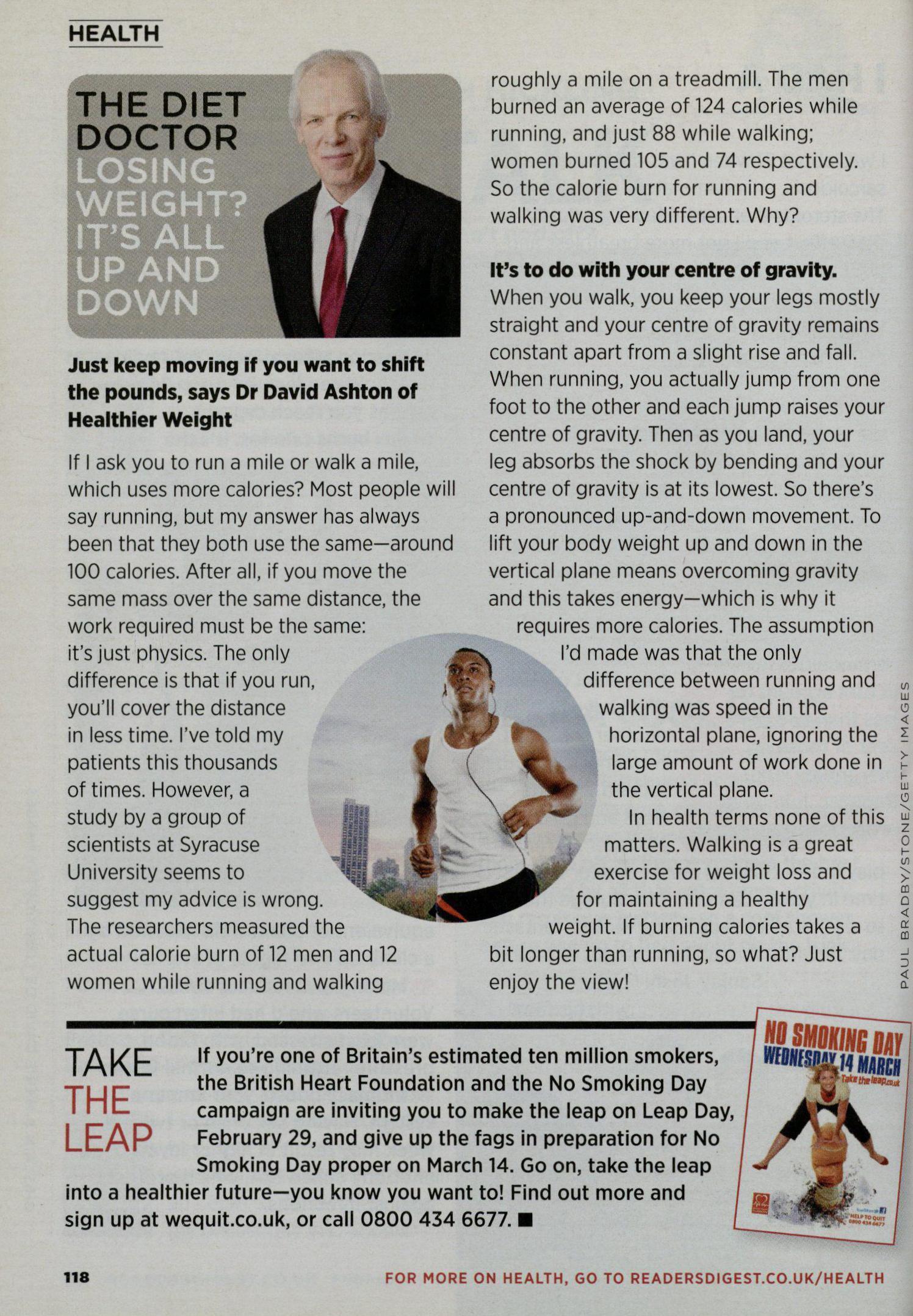
Just keep moving if you want to shift the pounds, says
Dr David Ashton of Healthier Weight
If I ask you to run a mile or walk a mile, which uses more calories? Most people will say running, but my answer has always been that they both use the same—around 100 calories. After all, if you move the same mass over the same distance, the work required must be the same: it's just physics. The only difference is that if you run, you'll cover the distance in less time. I've told my patients this thousands of times. However, a study by a group of scientists at Syracuse University seems to suggest my advice is wrong. The researchers measured the actual calorie burn of 12 men and 12 women while running and walking
roughly a mile on a treadmill. The men burned an average of 124 calories while running, and just 88 while walking; women burned 105 and 74 respectively. So the calorie burn for running and walking was very different. Why?
It's to do with your centre of gravity. When you walk, you keep your legs mostly straight and your centre of gravity remains constant apart from a slight rise and fall. When running, you actually jump from one foot to the other and each jump raises your centre of gravity. Then as you land, your leg absorbs the shock by bending and your centre of gravity is at its lowest. So there's a pronounced up-and-down movement. To lift your body weight up and down in the vertical plane means overcoming gravity and this takes energy—which is why it requires more calories. The assumption I'd made was that the only difference between running and walking was speed in the horizontal plane, ignoring the large amount of work done in the vertical plane.
In health terms none of this matters. Walking is a great exercise for weight loss and for maintaining a healthy weight. If burning calories takes a bit longer than running, so what? Just enjoy the view!
NO SMOKING OM Milli MARCH TAKE THE LEAP
If you're one of Britain's estimated ten million smokers, the British Heart Foundation and the No Smoking Day campaign are inviting you to make the leap on Leap Day, February 29, and give up the fags in preparation for No Smoking Day proper on March 14. Go on, take the leap into a healthier future—you know you want to! Find out more and sign up at wequit.co.uk, or call 0800 434 6677. ■
uJ z 0 En a 4 a HEALTH
118 FOR MORE ON HEALTH, GO TO READERSDIGEST.CO.UK/HEALTH
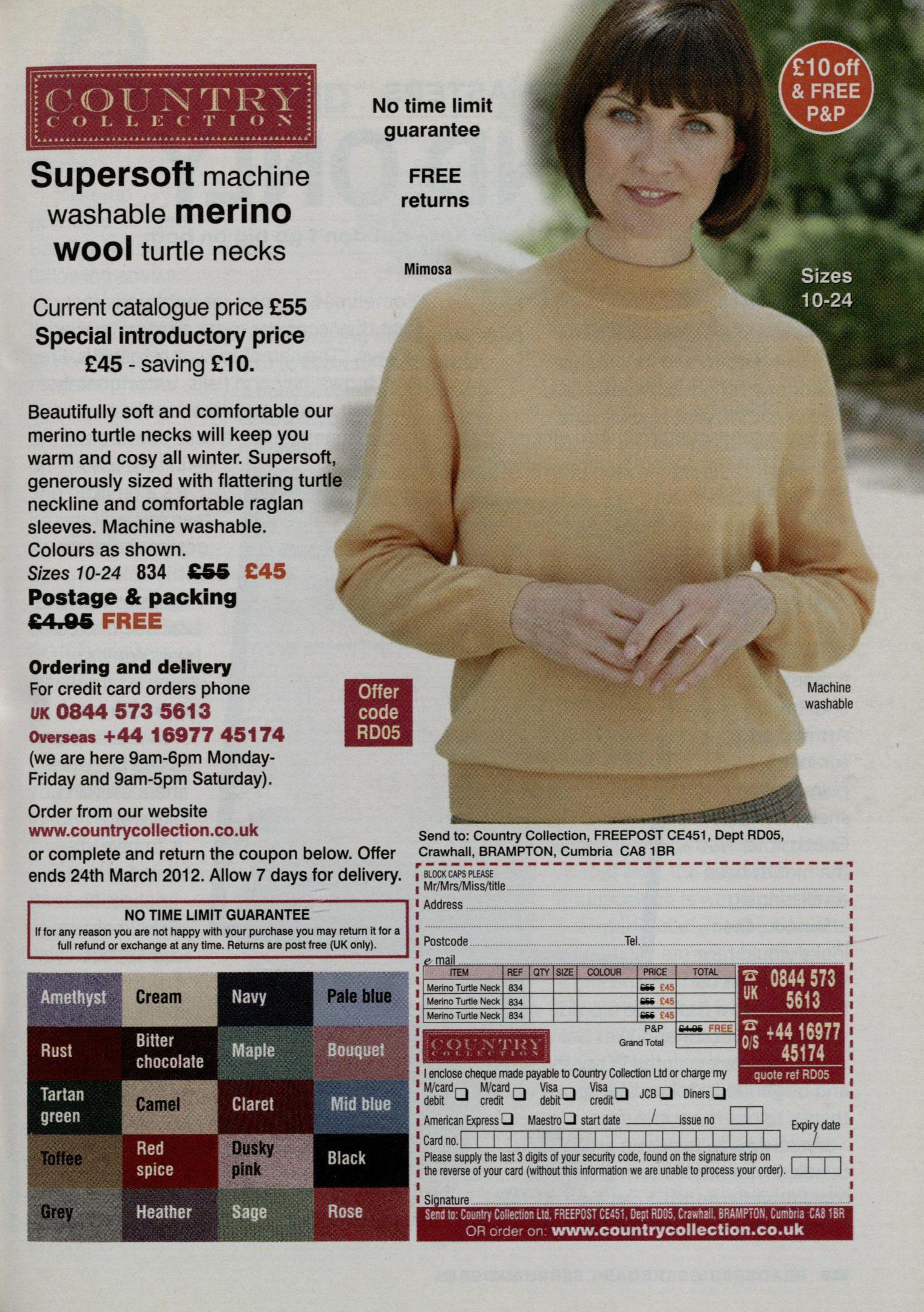
Current catalogue price £55
Special introductory price £45 - saving £10.
Beautifully soft and comfortable our merino turtle necks will keep you warm and cosy all winter. Supersoft, generously sized with flattering turtle neckline and comfortable raglan sleeves. Machine washable. Colours as shown.
Sizes 10-24 834 1.55
Postage & packing 1.4.85
Ordering and delivery
For credit card orders phone UK 0844 573 5613
Overseas +44 16977 45174 (we are here 9am-6pm MondayFriday and 9am-5pm Saturday).
Order from our website www.countrycollection.co.uk or complete and return the coupon below. Offer ends 24th March 2012. Allow 7 days for delivery.
Machine washable low Send to: Country Collection, FREEPOST CE451, Dept RD05, Crawhall, BRAMPTON, Cumbria CAB 1 BR Card no I inclose chequemade payable to Country Collection Ltd or charge my Wcard, Wcard ❑ Ada Visa ❑ 1"1" uDiners ❑ debit credit ❑ American Express 0 Maestro ❑ start date Issue no Ill IIIIIIIIIIIIIIIIIIII Exphy dale PUP Gram/Taal GAS FREE Menne Turtle Neck Medno Turtle Ned, 8.14 Marino Tures Neck ace LOS use Tel. REF OTY SIZE COLOUR PRICE TOTAL ERIK%CAPSFLFASE Mr/Mrs/Miss/title Postcode e mail ITEM ale Cos aK Los 0844 573 UK 5613 F s+44 16977 45174 quote ref RD05 Please sapphire last 3 digits of your security code, found on the signature ship on the reverse of your card (without this information we are unable to process your order) Sir nature Sendto:CountryCollectionLtd.FREEPOSTCE451DeptROSS,CrawhanBRAMPIONCumbriaCAB1BR OR order on: www.countrycollection.co.uk 1111 No time limit guarantee Supersoft
FREE
returns
Mimosa
Cream Bitter Maple Bouquet chocolate Claret Mid blue Red Dusky Black spice pink Heather Sagi Rose Amethyst`' Tartan green Camel
machine
washable merino
wool turtle necks
NO TIME LIMIT GUARANTEE If for any reason you are not happy with your purchase you may return it for a full refund or exchange at any time. Returns are post free (UK only). Offer
RD05
code

BEAUTY WITH JAN MASTERS
ONE AND ONLY
Choose between your eyes or your lips—but don't go big on both
It's a lesson I learned while watching top make-up pros at work over the years. The way to make a stylish statement is to emphasise one feature—lips or eyes—holding back on the other so it plays a supporting role. And when I checked out the spring/summer catwalk shows, it's clearly a strategy that still holds true.
Eyes were decidedly dark at Emilio Pucci (smouldering) and Emporio Armani (graphic), both paired with shell-pale lips. Good move. Had the mouth been an all-singing affair, too, the looks would have slipped from cool to cartoon in a flash. The flip side was showcased at Dior and Yves Saint Laurent, where lips were painted in ravishing red and bright berry tones that spoke volumes thanks to nicely neutral eyes.
According to make-up artist Daniel Sandler, who has his own line of cosmetics (danielsandler.com), it can be a mistake to make every feature larger than life.
"Sometimes, women set out to create what they consider to be an ideal image," he says. "They emphasise their cheeks, lips, eyes, brows, hair and nails. Unfortunately, the result can look synthetic—like a shop mannequin. It's a case of more is definitely less!"
It's a bit like teaming a designer dress with necklace, rings, earrings and bracelet. It's too busy. What's more, a targeted approach holds even more value as you get older and a useful piece of advice is to take your time for better application. Less makeup applied with greater care is one of the best anti-ageing tips I know.
Whether you choose to emphasise your eyes or lips Sandler advises keeping a clean skin tone. "If you're going for stronger lips and you haven't prepped your face with foundation and concealer, the lip shade tends to flag up any flaws in your complexion. The same goes for dark eyes.
If you don't start with a finessed canvas,
120 READERSDIGEST.CO.UK FEBRUARY 2012
a smouldering gaze can end up making the skin look grubby."
Make-up professional Jane Bradley has the following advice: "If you're homing in on lips, you still need a lick of mascara on your lashes, a neutral or subtle base on your lids and groomed brows. If you're dramatising eyes, use a naturalcoloured lip pencil and smudge a little of the same colour all over, mixed with lip balm. And don't forget a touch of blusher, otherwise you risk wandering into the Twilight zone."
Experiment with this edited approach in other ways, too. Partner bold, immaculate nails with a simple hairstyle. Or a glam hairdo with minimal make-up. Far from limiting your options, it's a great way to bring variety to your beauty style.
BAND AID
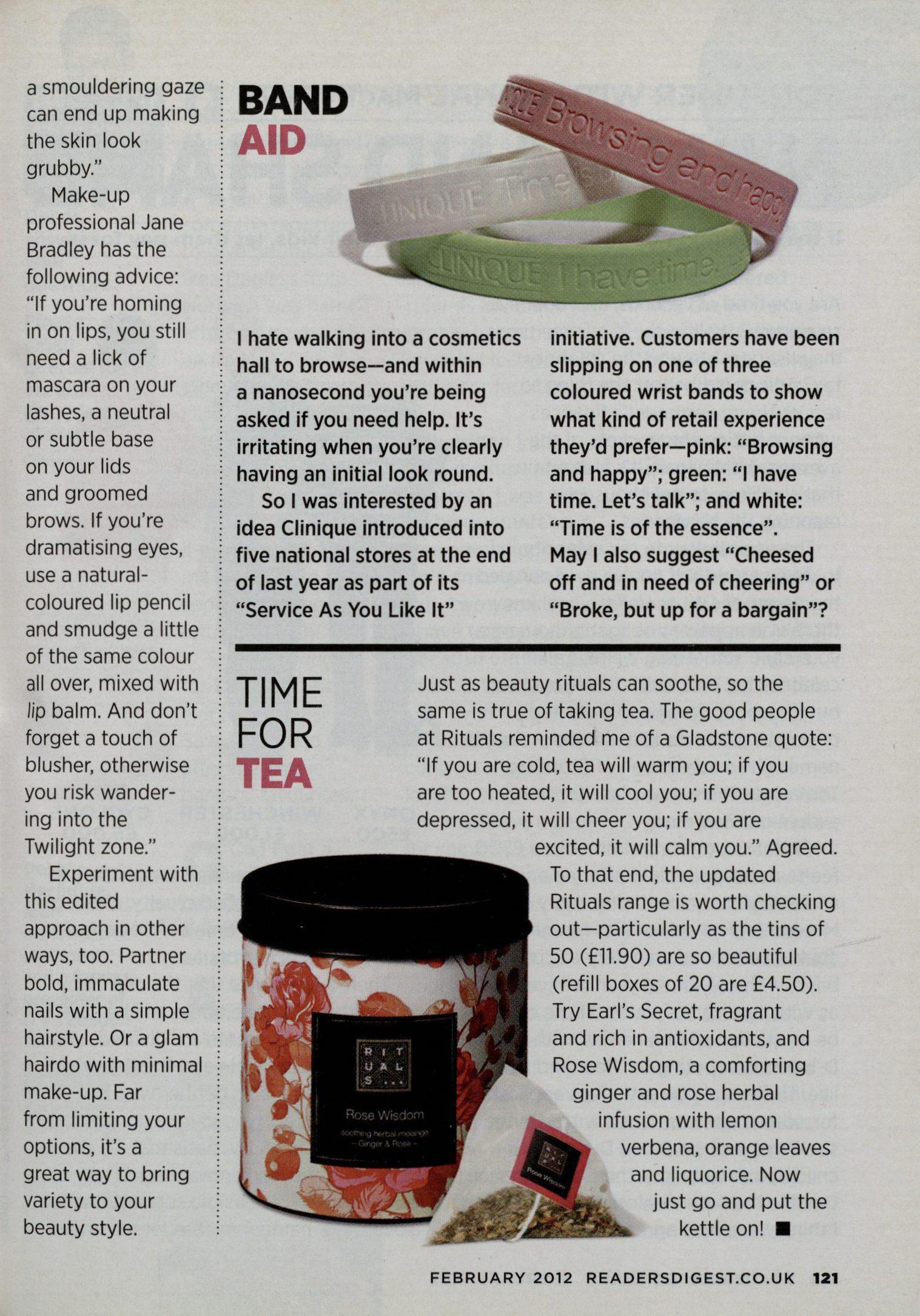
I hate walking into a cosmetics hall to browse—and within a nanosecond you're being asked if you need help. It's irritating when you're clearly having an initial look round. So I was interested by an idea Clinique introduced into five national stores at the end of last year as part of its "Service As You Like It"
initiative. Customers have been slipping on one of three coloured wrist bands to show what kind of retail experience they'd prefer—pink: "Browsing and happy"; green: "I have time. Let's talk"; and white: "Time is of the essence".
May I also suggest "Cheesed off and in need of cheering" or "Broke, but up for a bargain"? TIME
FOR TEA
Just as beauty rituals can soothe, so the same is true of taking tea. The good people at Rituals reminded me of a Gladstone quote: "If you are cold, tea will warm you; if you are too heated, it will cool you; if you are depressed, it will cheer you; if you are excited, it will calm you." Agreed. To that end, the updated Rituals range is worth checking out—particularly as the tins of 50 (£11.90) are so beautiful (refill boxes of 20 are £4.50). Try Earl's Secret, fragrant and rich in antioxidants, and Rose Wisdom, a comforting ginger and rose herbal infusion with lemon infusion verbena, orange leaves and liquorice. Now just go and put the kettle on! •
FEBRUARY 2012 READERSDIGEST.CO.UK 121
CONSUMER
WITH DONAL MAcINTYRE NAME AND SHAME
If the rich and famous like weird names for their kids, let them pay for it
Are you tired of vacuous, unproductive celebrities? Well, in these austere times, may I suggest to you the celebrity tax? This could be just the thing to rescue the government's finances without hitting the pockets of the average Joe or Joan. It's also a tax that's unlikely to get thousands manning the barricades.
The easiest way to tax celebrity is to do so at birth. If you've ever perused the pages of OK! or Hello!, you'll know there's an apparent obligation to name your child something weird. Call it a celebrity tax or a tariff on silly names, but it's about time people started paying to give their kids weather-related names. I've had enough of Storms or Tornados—there's no place for them except on Gladiators.
So let's suggest an immediate £500 fee to name your child after an animal, and £1,000 to name it after a city or town. Meteorological systems as forenames could be licensed on a very exclusive basis, with only one a year being allocated, as with car licence plates. There could be an auction of fruit names, with baying D-listers competing for Pear and the like. There could be extra fees applicable for odd names combined with strange spellings, such as David Duchovny's child Kyd (a truly "out there" designation). Despite the potential loss to the exchequer, I think we can all agree that vegetable
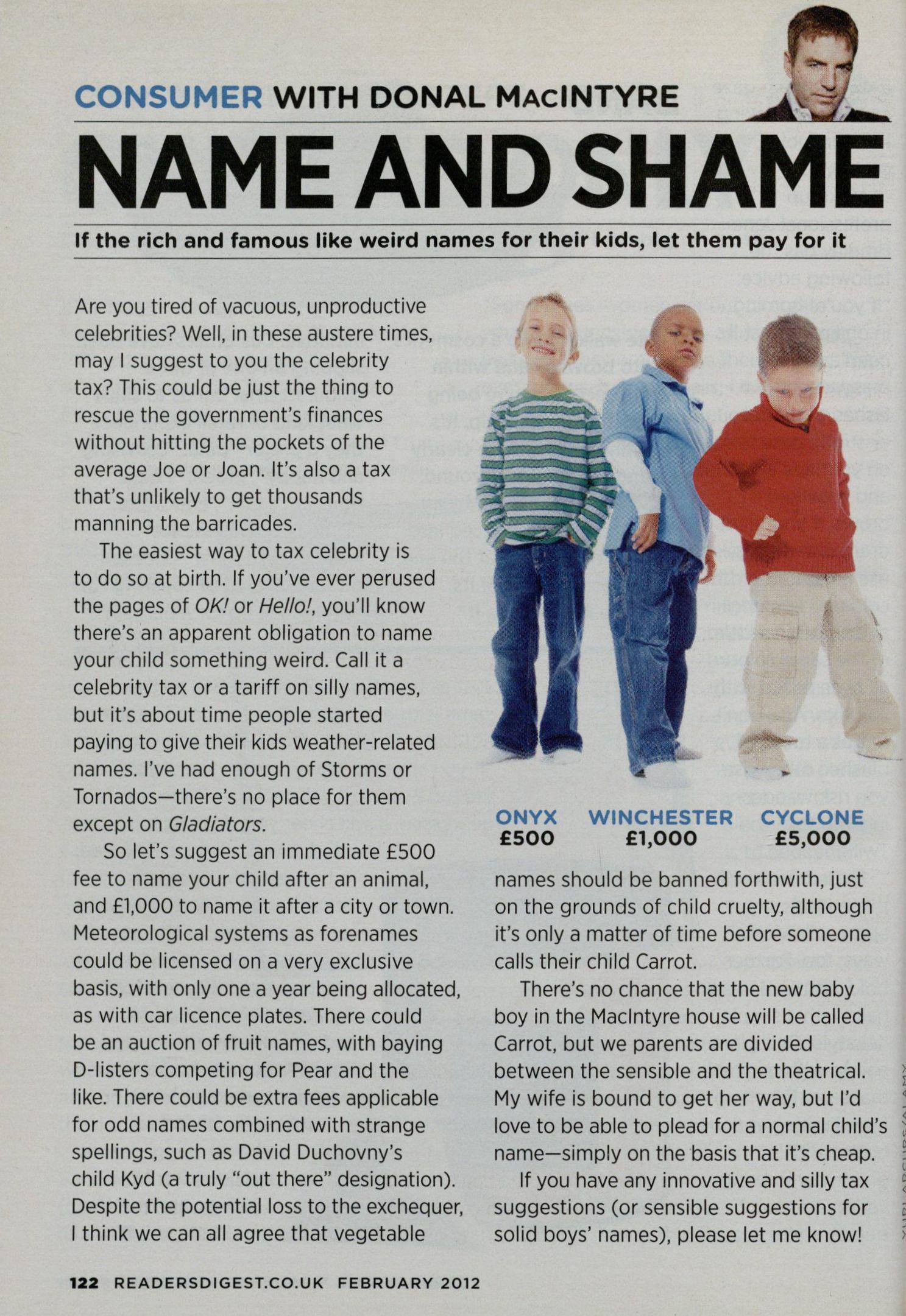
ONYX WINCHESTER CYCLONE
£500 £1,000 £5,000 names should be banned forthwith, just on the grounds of child cruelty, although it's only a matter of time before someone calls their child Carrot. There's no chance that the new baby boy in the Maclntyre house will be called Carrot, but we parents are divided between the sensible and the theatrical. My wife is bound to get her way, but I'd love to be able to plead for a normal child's name—simply on the basis that it's cheap.
If you have any innovative and silly tax suggestions (or sensible suggestions for solid boys' names), please let me know!
122 READERSDIGEST.CO.UK FEBRUARY 2012
IF YOU DON'T ASK...
Donal answers your questions. Please email queries to excerpts @readers digest. co.uk

et Can I name my ‘alr child after a brand and get paid?
A In this country you can, but in some the registrar has to give permission.
Ikea Dagless from Norwich was named after her mum saw an ad on TV for the store. She isn't paid to carry the name, but
service—if the service is below par, you could get a refund. Universities have their own procedures to deal with any complaints before litigation, but typically refunds are made for problems such as crowded lecture halls and poor facilities.
Qit wouldn't surprise me if kids were given sponsors' names in return for cash.
Spare a thought for Wisconsin-born Marijuana Pepsi Sawyer, named after her hippie parents' favourites.
e% Can I get a ‘31 refund if my university course doesn't deliver what it promised?
AAn education in private school or university is just a
When I got my new phone contract, I was told I'd be guaranteed a free annual upgrade on a smartphone. But, two years on, I have to pay extra because of the small print. Is this legal?
AEven if it's in the small print, the contract may not be legal or enforceable. You may have a case for compensation if you feel you were mis-sold the product. I had a similar issue and got a £50 voucher from the company, plus an option to break my contract. If any contract has an unfair clause, the courts have the option to cancel it or allow it to continue without including the clause. Donal Maclntyre is an investigative journalist and a former presenter of ITV's London Tonight
NO TIME FOR CHAT
Ever wondered why the whitegoods installation brigade are rather talk-shy? It's not bad manners—it's all about the speed demanded by most high-street chains. Typically, workers are allowed only 14 minutes to take out an old washing machine and install a new one. Teams are paid by the job, and no allowance is made for flights of stairs or tight corners. Fridges are given just 12 minutes, and flat-screen TV installations—with link-ups to games consoles and Sky boxes—are allocated 22 minutes.
It's surely just a matter of time before it becomes an Olympic event. And when it does, I really fancy my chances. "Honey, pass me the toolbox and trainers!" •
y I CERTIFICATE OF BRIT! I
FEBRUARY 2012 READERSDIGEST.CO.UK 123
MONEN WITH JASMINE BIRTLES
FEEL THE HEAT
Cut £100s off your energy bill with
DIY insulation

You can stay warm and cosy at home without spending a fortune. Just try these simple DIY moves to cut down your heating bills:
Tin foil behind the radiators
This works by reflecting heat back into the room, rather than letting it escape through the walls—so you should be able to turn the radiators down a bit. You just attach the foil to the wall (make sure the shiny side is facing the radiator) with Blu-Tack or wallpaper glue.
If you'd like to do it properly, you can pick up some specially designed radiator foil from Wickes for just £18.49, but good-quality kitchen foil will work almost as well.
HOT FACT
According to energysavingcommunity. co.uk, if every house in the UK were fully draught-proofed, the nation would save enough energy to heat easily all the homes in Belfast and Cardiff combined.
Insulate your windows, uuurs and floors
Check the draughts around your house. Lots of cold air comes in under the doors and through the letterbox, floorboards, cat flaps and window cracks.
You can find out where the draughts are by lighting a candle and placing it near your windows and doors. If the
candle flame starts to dance around like crazy, you know you've got a draught!
Use draught-excluder seal around your windows and doors and you can eliminate chilly air running through your home. It's really easy to install and makes a
cs7 S.... 4G e ... . . . . . . / ._ \ .c -., C( < 4■,... z r . . r . . ....., lt•i • t _ - —)c_?c - _.s-,; e....,„ .....____„ ....
going out now. I may be some time getting the draught excluder..." 1?
"I'm
124 READERSDIGEST.CO.UK FEBRUARY 2 012
surprisingly big difference.
Insulate your fireplace
Whatever you do—don't try this if you actually use your chimney!
However, if you don't, all you need to do is stuff the opening in your room with newspaper or cardboard to stop draughts from creeping in.
If you do have an open fire during the winter months, there's an easier way to insulate your fireplace: a chimney balloon. You can get them at Amazon from just £16.95.
You need to inflate it to block the draught from the chimney cavity, then when you want to light a fire, you deflate it and remove it.
THE BEST
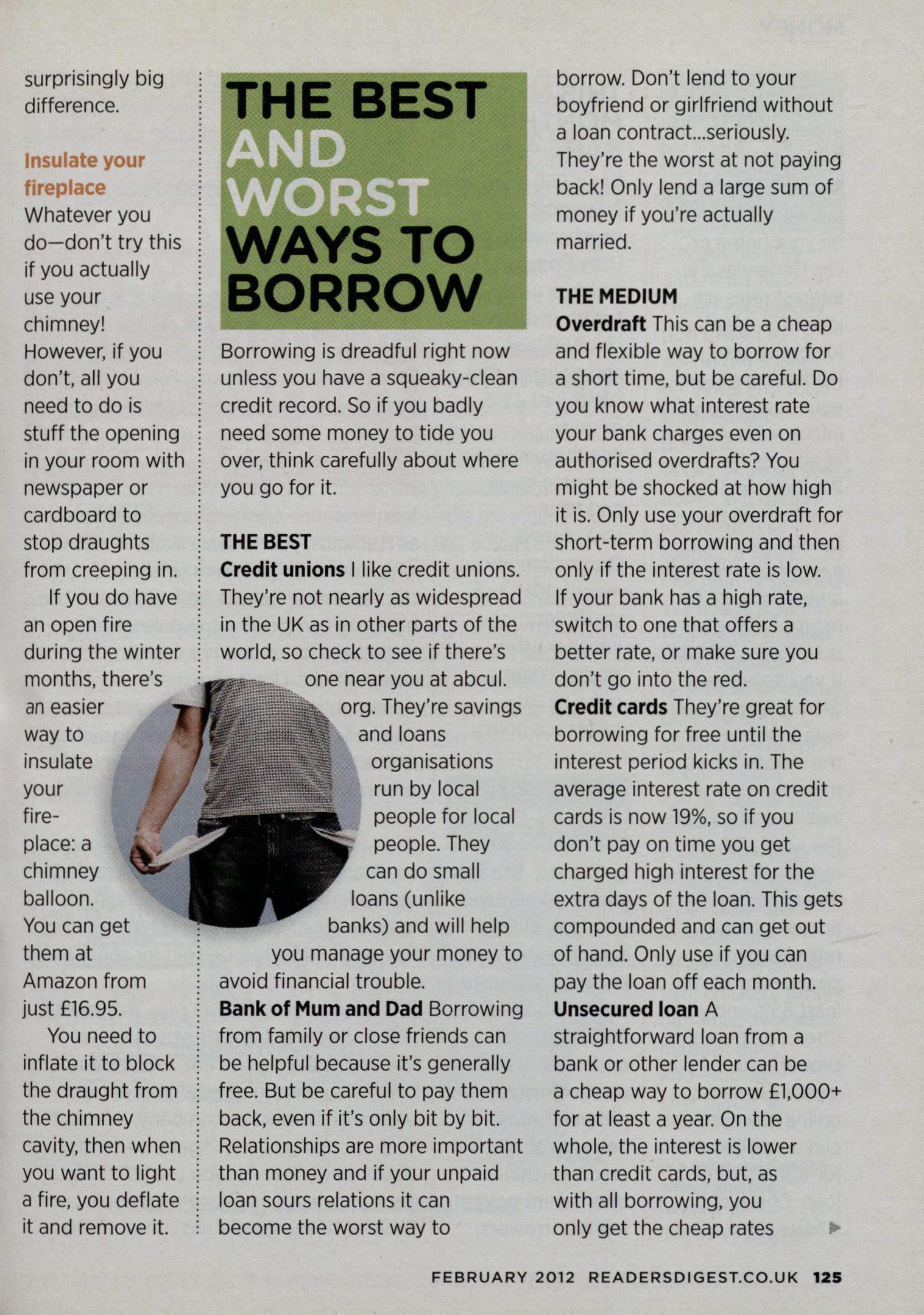
AYS TO ORROW
Borrowing is dreadful right now unless you have a squeaky-clean credit record. So if you badly need some money to tide you over, think carefully about where you go for it.
THE BEST
Credit unions I like credit unions. They're not nearly as widespread in the UK as in other parts of the world, so check to see if there's one near you at abcul. org. They're savings and loans organisations run by local people for local people. They can do small loans (unlike banks) and will help you manage your money to avoid financial trouble.
Bank of Mum and Dad Borrowing from family or close friends can be helpful because it's generally free. But be careful to pay them back, even if it's only bit by bit. Relationships are more important than money and if your unpaid loan sours relations it can become the worst way to
borrow. Don't lend to your boyfriend or girlfriend without a loan contract...seriously. They're the worst at not paying back! Only lend a large sum of money if you're actually married.
THE MEDIUM
Overdraft
This can be a cheap and flexible way to borrow for a short time, but be careful. Do you know what interest rate your bank charges even on authorised overdrafts? You might be shocked at how high it is. Only use your overdraft for short-term borrowing and then only if the interest rate is low. If your bank has a high rate, switch to one that offers a better rate, or make sure you don't go into the red.
Credit cards They're great for borrowing for free until the interest period kicks in. The average interest rate on credit cards is now 19%, so if you don't pay on time you get charged high interest for the extra days of the loan. This gets compounded and can get out of hand. Only use if you can pay the loan off each month.
Unsecured loan
A straightforward loan from a bank or other lender can be a cheap way to borrow £1,000+ for at least a year. On the whole, the interest is lower than credit cards, but, as with all borrowing, you only get the cheap rates
FEBRUARY 2012 READERSDIGEST.CO.UK 125
if your credit rating is good.

THIS MONTH'S
THE BAD
Secured loan The loan is "secured" on your home or car. Generally, the interest rates are lower for these loans, but the lenders could take your home if you fall into arrears. Avoid if at all possible.
Payday loans Ugh. I can't stand these, but they are used by a lot of people. The annual interest for most of these loans is well over 2,000%! If you have to use them, please make sure that you have the money for no more than a few weeks, and you pay the whole lot off as quickly as possible.
Pawnbroking The annual interest rate charged by pawnbrokers is at least 85% and you often don't get the proper value of your goods. However, online pawnbrokers can be a decent bet for a short-term loan. Check out 62days.com.
Get a £50 Marks & Spencer voucher with Usay Compare, which provides health-insurance comparisons and policies. Call 0845 880 3355 or go to healthinsurance compare.co.uk and fill in your details. Quote "money magpie101" and you'll get the voucher after you've taken out a healthinsurance policy.
JARGON
Eurobond This is a jointly guaranteed bond for all Eurozone governments. It's been suggested as a solution to the Eurozone debt crisis as it would prevent markets differentiating between the creditworthiness of different government borrowers.
WAYS MAKE MONEY FROM YOUR DESK
1.Enter online ns Incredible as it sounds, you're more likely to win a high-value prize than a smaller prize because fewer people bother to enter the big-prize competitions. But be careful, there are a lot of dodgy internet competitions. Don't give them your bank details unless you're 100 per cent sure they're kosher. Try primeprizes.co.uk, which is free to join, and loquax.co.uk, which has new competitions every day.
2. Recycle your mobile Send it to mopay. co.uk and receive between £2.50 and £200 depending on the make and condition. Even battered old models can be worth a few quid if they can be sold for spare parts.
3.Take part in online surveys This is really just pocket money while you're on the internet, but it can be fun, too. It's simply a case of answering questions about a particular product or company, or about your shopping habits. Again, be careful about which surveys you use as some are fraudulent (check moneymagpie.com for a list of the good ones). Among the
MONEY
126 READERSDIGEST.CO.UK FEBRUARY 2 012
best of the genuine ones are panelbase.net, which pays between 25p and £10 a survey and valuedopinions.co.uk, which pays between 50p and £5 a survey.
4. Se:i vow photos Send them in to one or more online agency and any they like will be uploaded to the site. When people buy them you get a commission—you could end up getting paid for years to come! You don't have to be an expert. Picturenation.co.uk reckons that many of their photographers make hundreds of pounds a month, and some are simply good amateurs. Also worth trying are fotolia.com and iStockphoto.com.
5.Get cashback If you use your lunch hour to buy essentials, make sure you get paid to do it. Shop around first to find the
best deals, then look on cashback sites to see if you could get money back by buying through them. Start with sites that give you instant cash just by signing up, such as cashbackshopper.co.uk, which gives you £5, and ecashback. co.uk, which gives you £2.50.
6. Sell your old junk online
There are more ways than ever to turn your trash into cash using the internet. eBay is probably the best-known site for selling your old stuff, but you might also consider eBid, which has the advantage of letting you list your items for free. You could also check out gumtree.com, which has a strong buy-and-sell section a little like the "classified" section in your local freesheet. For old books you could try greenmetropolis.co.uk, which guarantees £3 per book.

"So, I thought, how can I earn extra money while I'm still at work?"
THE ONE THING THIS MONTH...
...is get healthy and fit on the cheap—you really don't need to spend big money on gyms and food supplements doing it.
Get yourself some active Wii games like boxing or tennis, or Wii Fit. In one test, 12 hours of Wii usage a week was found to burn 1,830 calories. Wherever you go, take the stairs instead of the lift.
Eat "happy foods" rather than winter stodge. Foods with high levels of serotonin (the happiness booster) are wholegrain bread, fish, chicken, turkey, bananas, avocados, cereals, nuts, and—luckilychocolate! •
Jasmine Birtles is a personal finance writer and the founder of moneymagpie.com
FOR MORE ON MONEY, GO TO RDMONEY.CO.UK 127
FOOD WITH MARCO PIERRE WHITE
CHICKEN TONIGHT
Add some competition-standard flair to an old favourite
Sometimes I get asked what I make of MasterChef and other TV cookery programmes. Because I've done one myself, I need to be careful with my answer. I prefer the non-celebrity version of MasterChef to the one where household names come on and have one eye on the meat and one eye on their publicity ratings.
What really impresses me about the non-celebrities is how keen they are. I love their intensity. It's not because they want to be famous and get recognised on the red carpet. It's because they want to cook. During the programme they're up against the clock—and that's what brings out the intensity and creativity. Try it at home. Give yourself a restricted period of time to produce a winning meal and you'll be surprised at the results. It teaches you to trust the ingredients and to use your own judgement.
Cooking is instinctive once you get to know how flavours work. The key is not being afraid of failure. This month's recipe allows for a degree of intuition. You must keep tasting the vinegar and then add the cooled juices according to taste. The more you add, the richer the sauce. And the beauty of this dish is that it looks fabulous on the plate. Guaranteed to make you a MasterChef winner.
Marco Pierre White, the "godfather" of modern British cooking, is a restaurateur and TV personality
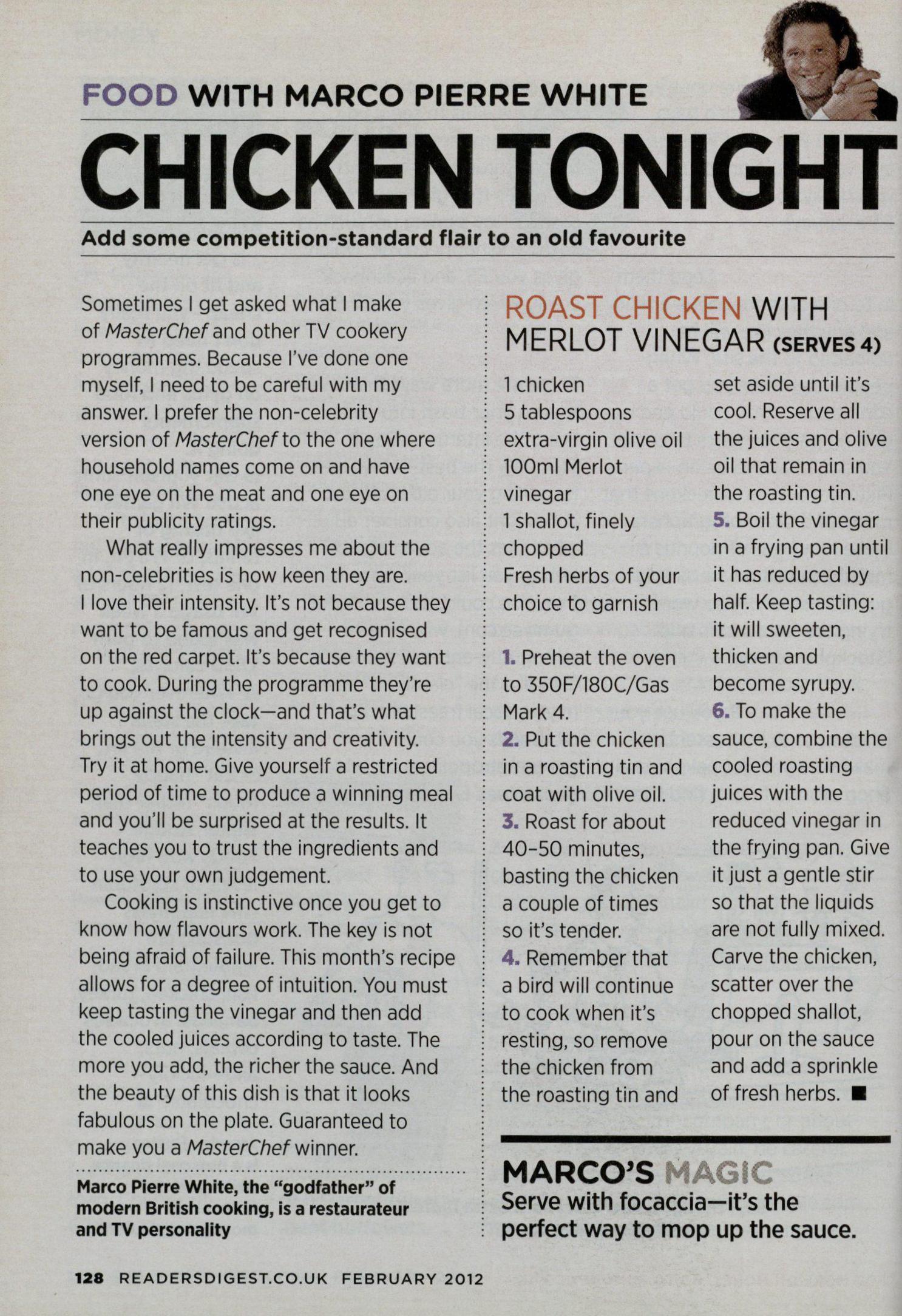
ROAST CHICKEN WITH MERLOT VINEGAR (SERVES 4)
1 chicken set aside until it's 5 tablespoons cool. Reserve all extra-virgin olive oil the juices and olive 100mI Merlot oil that remain in vinegar the roasting tin. 1 shallot, finely 5. Boil the vinegar chopped in a frying pan until Fresh herbs of your it has reduced by choice to garnish half. Keep tasting: it will sweeten,
1.Preheat the oven thicken and to 350F/180C/Gas become syrupy.
Mark 4. 6. To make the
2. Put the chicken sauce, combine the in a roasting tin and cooled roasting coat with olive oil. juices with the
3. Roast for about reduced vinegar in 40-50 minutes, the frying pan. Give basting the chicken it just a gentle stir a couple of times so that the liquids so it's tender. are not fully mixed.
4. Remember that Carve the chicken, a bird will continue scatter over the to cook when it's chopped shallot, resting, so remove pour on the sauce the chicken from and add a sprinkle the roasting tin and of fresh herbs. ■
MARCO'S
Serve with focaccia—it's the perfect way to mop up the sauce.
128 READERSDIGEST.CO.UK FEBRUARY 2012

DRINK WITH NIGEL BARDEN
HIT THE JUICE!
The world of cordials has come a long way since Ribena
Posh cordials (or "concentrates", if not quite so posh) have been stacking up on supermarket shelves. Originally thought

of as health-enhancing elixirs, the sophisticated cordial market is all about quality ingredients and
flavour combinations. They're refreshing with water, soda and ice—or with hot water as winter warmers. The addition of a shot of alcohol doesn't go amiss either. Try these for starters:
• Bckmii
Robert de Toeni, William the Conqueror's standard bearer, built a castle with a beautiful view (or "belvoir"—weirdly, pronounced "beever"), which now lends its name to excellent Lincolnshire
fruit-based cordials. Lime & Lemongrass hits the refresh button, while in cold weather there's Spiced Winter Berries, or Ginger (E3.84 for 500m1 bottle).
■ Bottlegreen have been around since 1989, with enticing combinations such as Pomegranate & Elderflower, Orange & Mango, and Cox's Apple & Plum out of their Gloucestershire base (E2.99 for 500m1 bottle).
Alex Brodie (Hawkshead Brewery, Cumbria) was a BBC correspondent before producing pints of Windermere Pale, Organic Oatmeal Stout and Brodie's Prime.
MICRO MANAGERS
Micro-brewery numbers have surged in recent years, with almost 800 breweries in the UK-142 more than 1976. (That said, there were 1,300 in 1900, and allegedly 49,417 in the mid-1700s—but would anyone have been sober enough to count?)
It's intriguing to discover the former careers of some of our regional brewers...
Lawrence Washington (Purple Moose Brewery, Porthmadog) volunteered on the Ffestiniog Railway in North Wales before paying homage to Pink Floyd by turning out 25,000 pints a week of his awardwinning brew: Dark Side of the Moose.
Nick Stafford (Hambleton Brewery, Yorkshire) was a headmaster before turning his mother-in-law's shed into a microbrewery 20 years ago. ■
Purple Moose's Lawrence Washington
LURON J ONE
Nigel Barden is the food and drink presenter on Simon Mayo's show on BBC Radio 2, and chairman of the Great Taste Awards
Th
130 READERSDIGEST.CO.UK FEBRUARY 2 012
We've paid out over £24.4 million in prizes to 364,365 winners

That's the equivalent of £50,000 every month since the launch of the Reader's Digest Prize Draw.
In every draw, someone is guaranteed to win. You could be next.
Find out more today at. D
www.readersdigest.co.uk/prize-draw
ADVERTISEMENT
igest
GARDENIN WITH BOB FLOWERDEW
PROUD PUMPKIN
How to make sure yours is the biggest and best in show
Last year we entered a pumpkin competition. We grew a huge one and felt smug on the way to the weigh-in—until we saw the others! We want to win this year. Any tips?
AObviously, you need the right variety, not an improved culinary sort—Atlantic Giant is a winner. Most importantly, grow the plant continuously without check, so don't start too early. In mid-April, sow several seeds in pots in the warm, select the most vigorous seedlings and grow these on, potting up frequently. Meanwhile, dig a hole you could bury a car in and fill with all manner of manure and vegetable waste, well mixed and moistened. Cover with at least a couple of feet of well-rotted grass turves and top off with another foot or two of rich potting compost. Cover this mound with black plastic, insert sticks for support, then
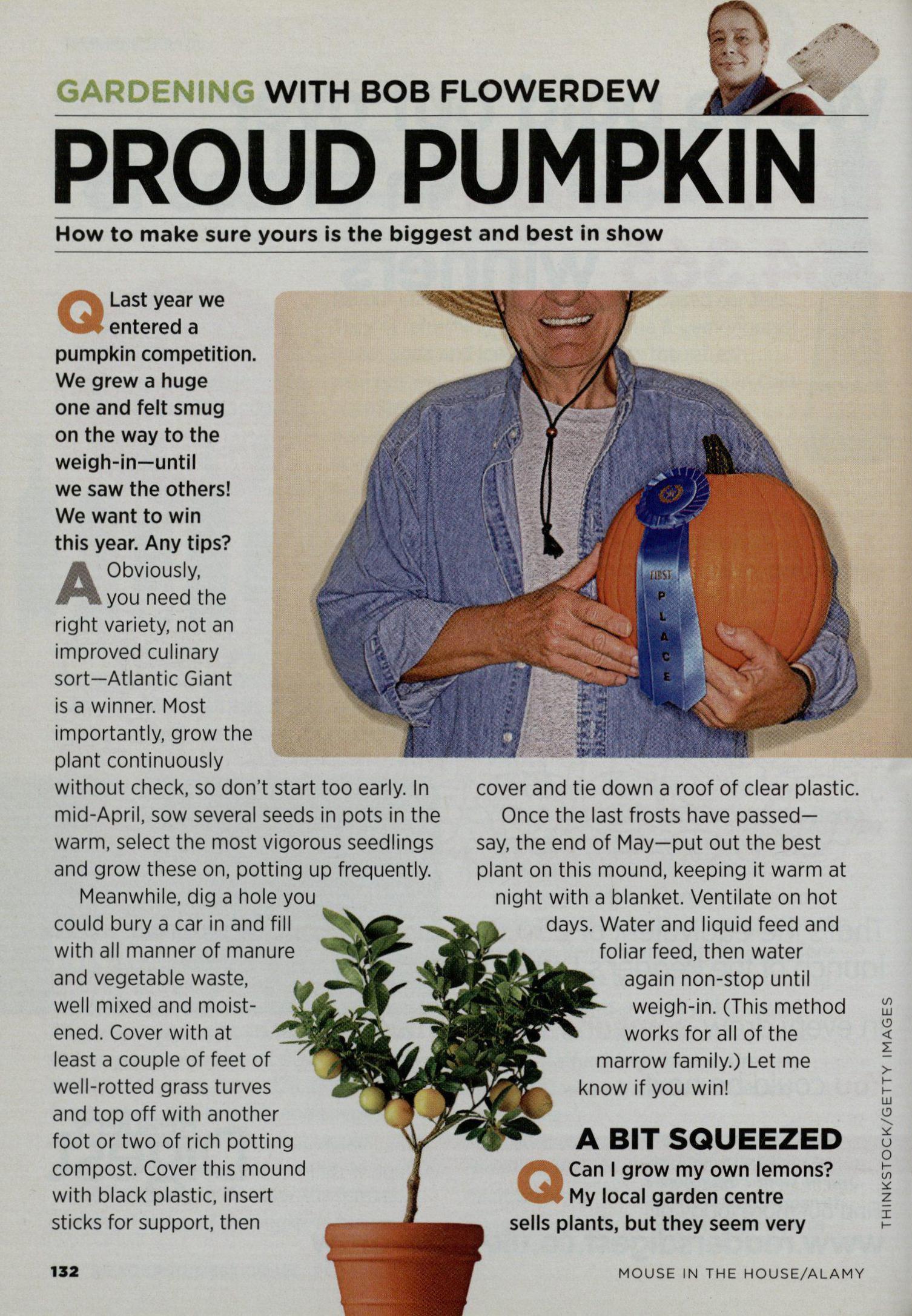
cover and tie down a roof of clear plastic.
Once the last frosts have passed— say, the end of May—put out the best plant on this mound, keeping it warm at night with a blanket. Ventilate on hot days. Water and liquid feed and foliar feed, then water again non-stop until weigh-in. (This method works for all of the marrow family.) Let me know if you win!
A BIT SQUEEZED
QCan I grow my own lemons?
My local garden centre sells plants, but they seem very
132
MOUSE IN THE HOUSE/ALAMY THINKSTOCK/GE TTY IMAGES
expensive, as they're not that big, although they do already have some fruit on.
ALemons and other citrus are slowgrowing, hence the expensive plants. However, they can be long-lived, self-fertile and very productive. And they're glorious when in bloom, as their perfume's so sweet. They need freedraining, almost-ericaceous compost, and rainwater (not tap). Regular feeding during the growing season also helps. They're fine outdoors all summer. During winter, bring them indoors to a frost-free but cool, bright place.
RESTORE OR DIE
My leylandii conifer hedge seems to be dying—it has big brown areas. Can I do anything?
AMine too! It's happening countrywide, and by the time you've spotted it happening it's too late to do much. And it never re-sprouts either. Some people have apparently resorted to spraying their hedge with green paint to gain a little more time before the necessary eviction has to be undertaken.
One option is to establish ivy at the base and allow it to supplant the hedge, reducing this to, say, head height for safety. Likewise, the side branches can be cut off and the trunks reduced to be, in effect, head-height posts. These can support wires or netting so that climbers can cover it for many years.
In the long run, though, dead roots rot and the trunks cannot support a mass of climbers without other posts.
Bob Flowerdew is an organic gardener and a regular on BBC Radio 4's Gardeners' Question Time. Send your gardening questions to Bob at excerpts@readersdigest.co.uk
It won't be that hoe) and sort out long before grass, labels, trays, pots, weeds and almost canes, strings, ties everything else and other sundry bursts into life, essentials. so ensure your And bring mower is serviced some sacks of and ready to go. sowing and Likewise, clean and potting composts fettle your tools, indoors so they're sharpen blades already warmed (especially the when needed.
READER'S TIP
the middle and slipped over the handle of a metal bucket to protect your hands— particularly handy when the weather is cold! •
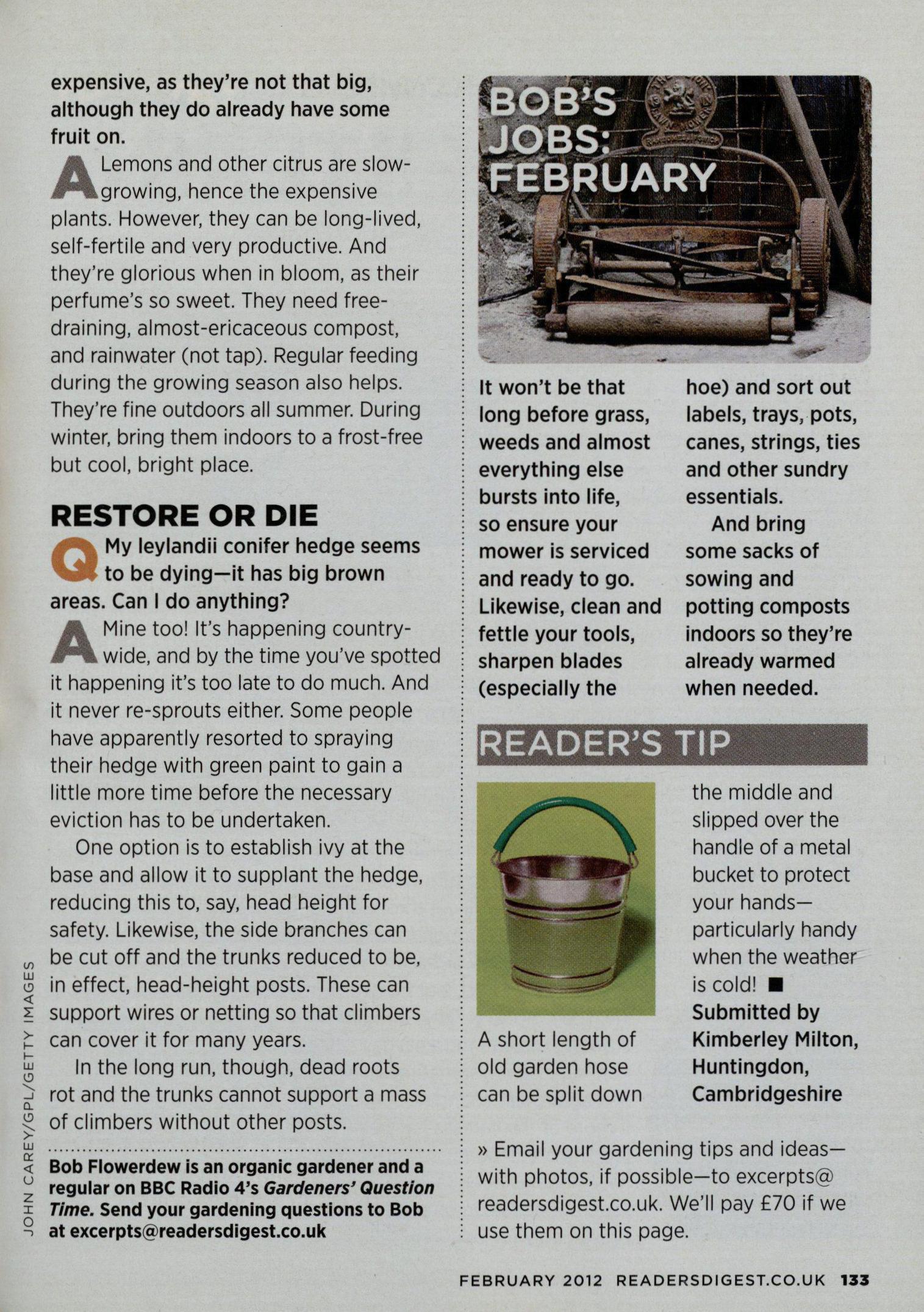
A short length of old garden hose can be split down
Submitted by Kimberley Milton, Huntingdon, Cambridgeshire
» Email your gardening tips and ideas— with photos, if possible—to excerpts@ readersdigest.co.uk. We'll pay £70 if we use them on this page.
JOHN C ARE Y/ GPL/ GE TTY IMAGES
FEBRUARY 2 012 READERSDIGEST.CO.UK 133
WILDLIV WITH MARTIN HUGHES-GAMES
EM PTY NESTERS
How much of a threat are parakeets to our native birdlife?
I've just returned from India, and one of the iconic sounds of Delhi is the harsh, early-morning cry of passing parakeets. So it's quite a surprise to hear the same call in London.
I was amazed to learn from Project Parakeet.co.uk that we now have around 32,000 ring-necked parakeets living wild in the UK. Mystery surrounds their origin. Were they released from the film set of The African Queen in 1951? Or (my favourite theory) did Jimi Hendrix release a pair in the Sixties to "like, add some colour to London, man"?
Parakeets are early nesters, so they'll be starting around now—often using nest holes made in the previous year by green woodpeckers. People worry that parakeets might affect other birds by monopolising
WILDLIFE
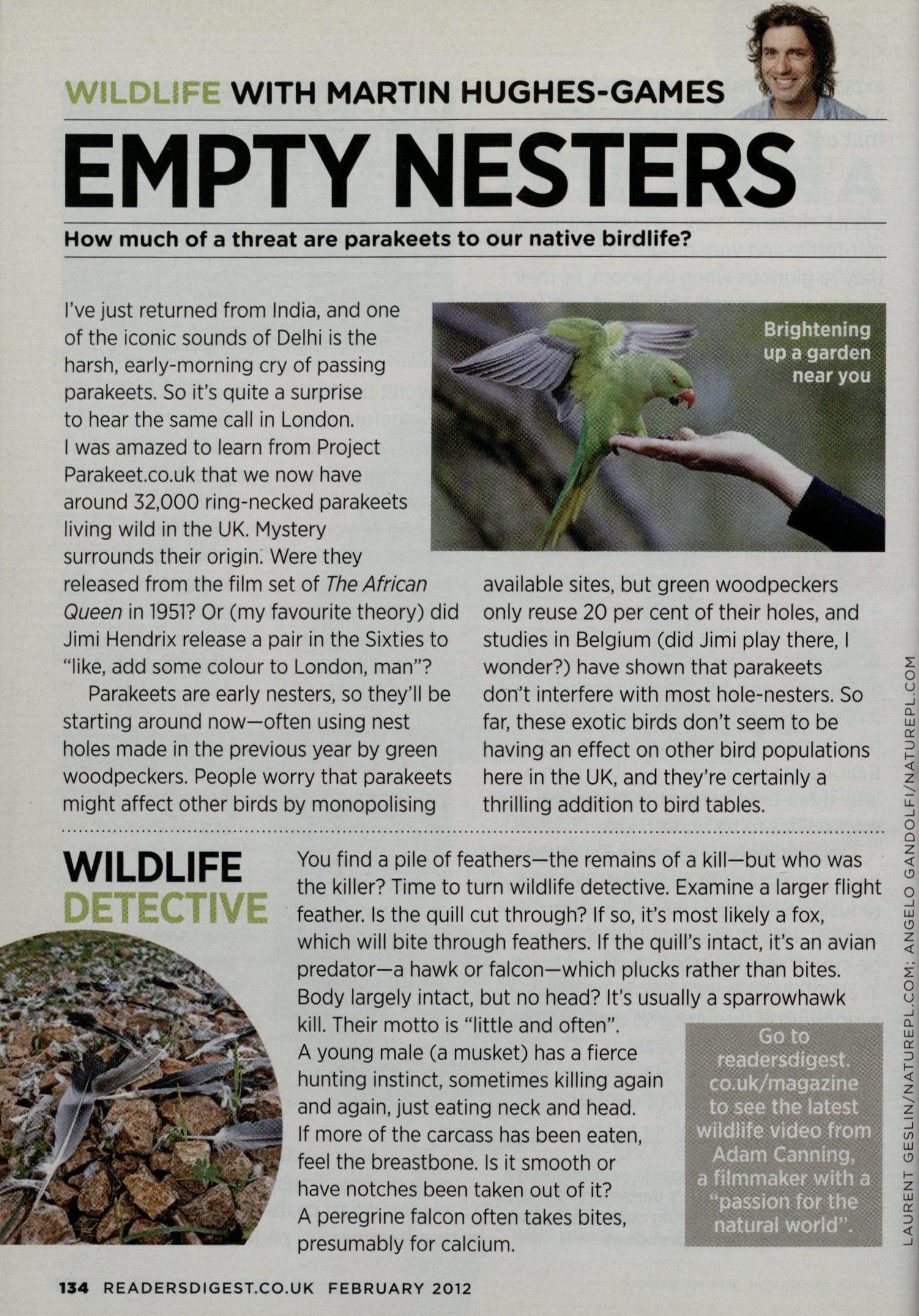
available sites, but green woodpeckers only reuse 20 per cent of their holes, and studies in Belgium (did Jimi play there, I wonder?) have shown that parakeets don't interfere with most hole-nesters. So far, these exotic birds don't seem to be having an effect on other bird populations here in the UK, and they're certainly a thrilling addition to bird tables.
You find a pile of feathers—the remains of a kill—but who was the killer? Time to turn wildlife detective. Examine a larger flight feather. Is the quill cut through? If so, it's most likely a fox, which will bite through feathers. If the quill's intact, it's an avian predator—a hawk or falcon—which plucks rather than bites. Body largely intact, but no head? It's usually a sparrowhawk kill. Their motto is "little and often".
A young male (a musket) has a fierce hunting instinct, sometimes killing again and again, just eating neck and head. If more of the carcass has been eaten, feel the breastbone. Is it smooth or have notches been taken out of it?
A peregrine falcon often takes bites, presumably for calcium.
URENT GESL IN/NATU REPL. COM; A NGELO G AND OL FIMATUREPL. COM 134 READERSDIGEST.CO.UK FEBRUARY 2 012
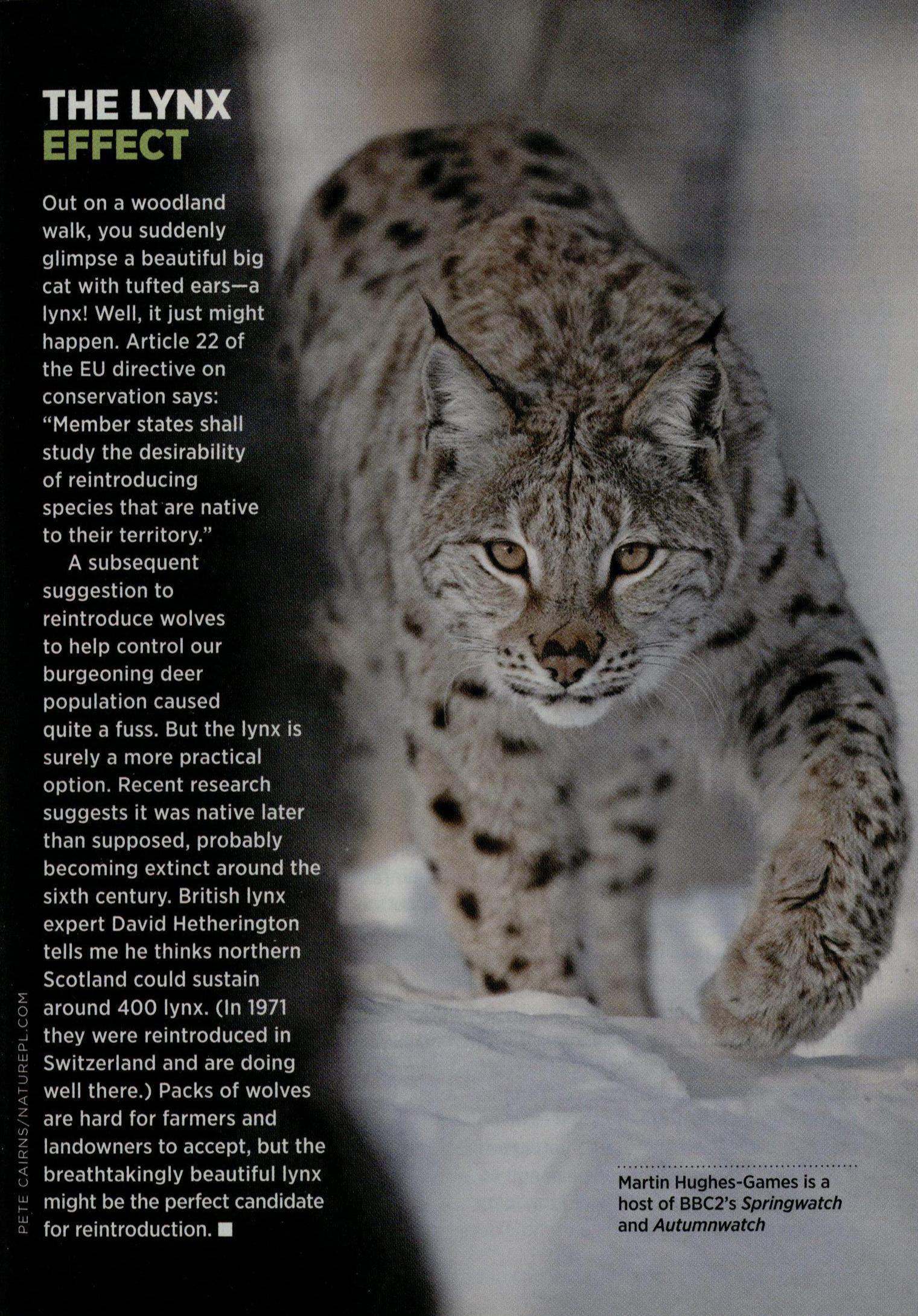
Out on a woodland walk, you suddenly glimpse a beautiful big cat with tufted ears—a lynx! Well, it just might happen. Article 22 of the EU directive on conservation says: "Member states shall study the desirability of reintroducing species that are native to their territory."
A subsequent suggestion to reintroduce wolves to help control our burgeoning deer population caused quite a fuss. But the lynx is surely a more practical option. Recent research suggests it was native later than supposed, probably becoming extinct around the sixth century. British lynx expert David Hetherington tells me he thinks northern Scotland could sustain around 400 lynx. (In 1971 they were reintroduced in Switzerland and are doing well there.) Packs of wolves are hard for farmers and landowners to accept, but the breathtakingly beautiful lynx might be the perfect candidate for reintroduction. ■
•
Martin Hughes-Games is a host of BBC2's Springwatch and Autumnwatch
DIGITAL WITH MARTHA LANE FOX
SLICK GETAWAYS
Booking and planning holidays online can save time, money and hassle
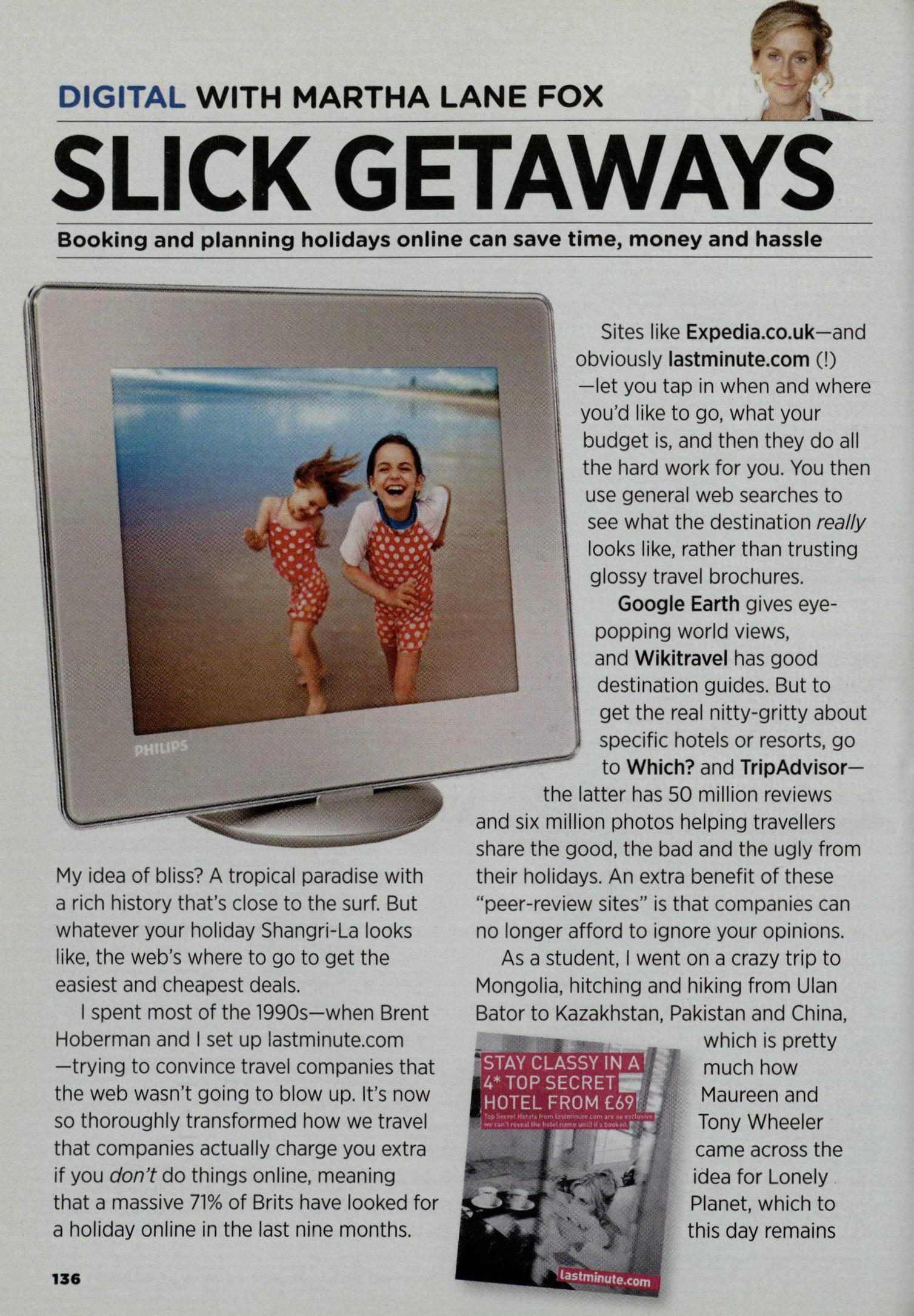
My idea of bliss? A tropical paradise with a rich history that's close to the surf. But whatever your holiday Shangri-La looks like, the web's where to go to get the easiest and cheapest deals.
I spent most of the 1990s—when Brent Hoberman and I set up lastminute.com —trying to convince travel companies that the web wasn't going to blow up. It's now so thoroughly transformed how we travel that companies actually charge you extra if you don't do things online, meaning that a massive 71% of Brits have looked for a holiday online in the last nine months.
Sites like Expedia.co.uk—and obviously lastminute.com —let you tap in when and where you'd like to go, what your budget is, and then they do all the hard work for you. You then use general web searches to see what the destination really looks like, rather than trusting glossy travel brochures.
Google Earth gives eyepopping world views, and Wikitravel has good destination guides. But to get the real nitty-gritty about specific hotels or resorts, go to Which?and TripAdvisorthe latter has 50 million reviews and six million photos helping travellers share the good, the bad and the ugly from their holidays. An extra benefit of these "peer-review sites" is that companies can no longer afford to ignore your opinions.
As a student, I went on a crazy trip to Mongolia, hitching and hiking from Ulan Bator to Kazakhstan, Pakistan and China, which is pretty much how Maureen and Tony Wheeler came across the idea for Lonely Planet, which to this day remains
STAY CLASSY IN A 4* TOP SECRETE HOTEL FROM £69'
..: •
136
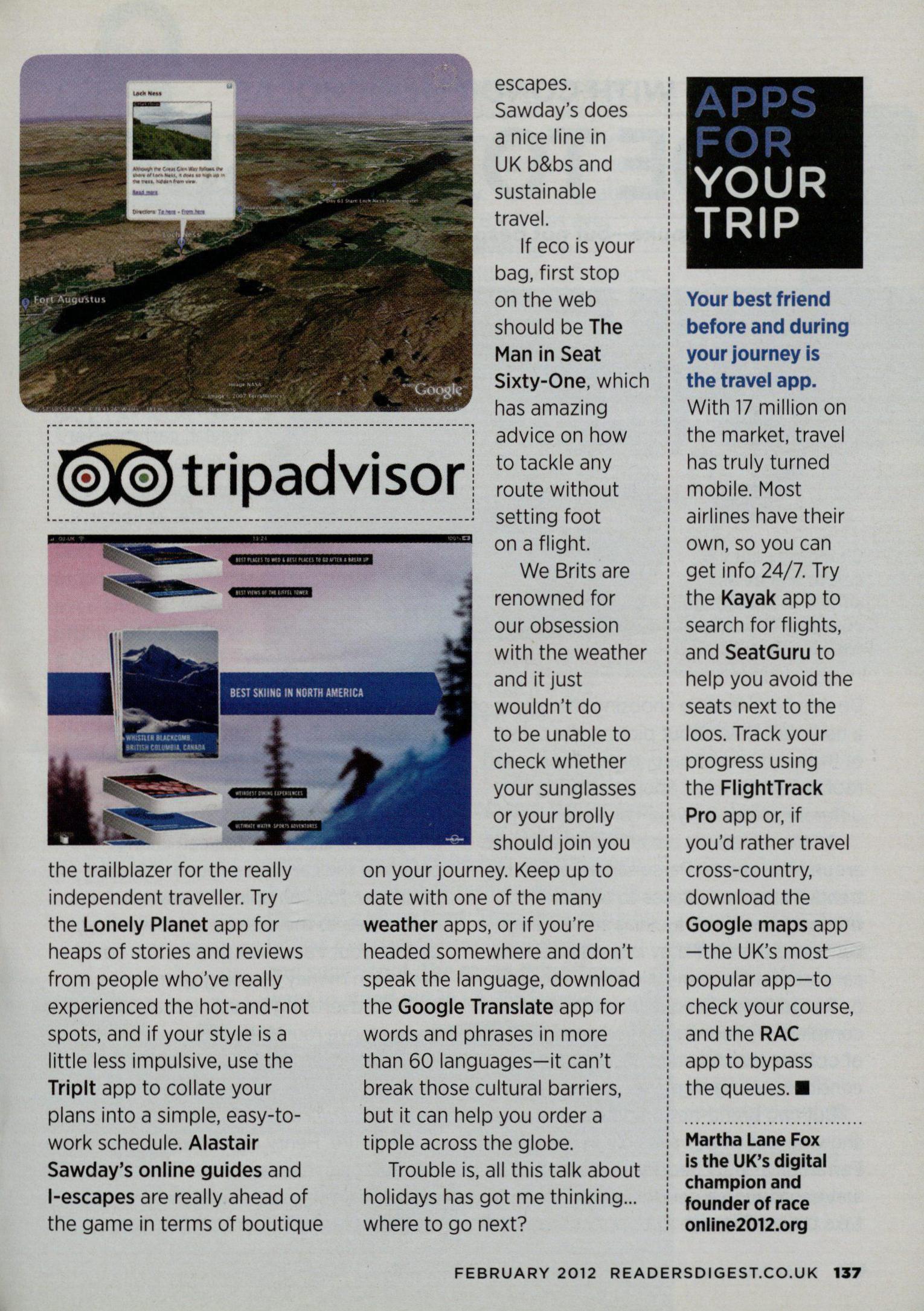
the trailblazer for the really independent traveller. Try the Lonely Planet app for heaps of stories and reviews from people who've really experienced the hot-and-not spots, and if your style is a little less impulsive, use the TripIt app to collate your plans into a simple, easy-towork schedule. Alastair Sawday's online guides and I-escapes are really ahead of the game in terms of boutique
escapes. Sawday's does a nice line in UK b&bs and sustainable travel.
If eco is your bag, first stop on the web should be The Man in Seat Sixty-One, which has amazing advice on how to tackle any route without setting foot on a flight.
We Brits are renowned for our obsession with the weather and it just wouldn't do to be unable to check whether your sunglasses or your brolly should join you on your journey. Keep up to date with one of the many weather apps, or if you're headed somewhere and don't speak the language, download the Google Translate app for words and phrases in more than 60 languages—it can't break those cultural barriers, but it can help you order a tipple across the globe.
Trouble is, all this talk about holidays has got me thinking... where to go next?
APPS Pr) P YOUR TRIP
Your best friend before and during your journey is the travel app. With 17 million on the market, travel has truly turned mobile. Most airlines have their own, so you can get info 24/7. Try the Kayak app to search for flights, and SeatGuru to help you avoid the seats next to the loos. Track your progress using the FlightTrack Pro app or, if you'd rather travel cross-country, download the Google maps app —the UK's most popular app—to check your course, and the RAC app to bypass the queues. ■
Martha Lane Fox is the UK's digital champion and founder of race online2012.org
11111111■ CS=3 4=== UST SKIING IN NOM AN'EPICA
tripadvisor 1,
FEBRUARY 2012 READERSDIGEST.CO.UK 137
MOTORING WITH CONOR McNICHOLAS
MADE TO MEASURE
The future is bespoke—but not bespoke as we know it
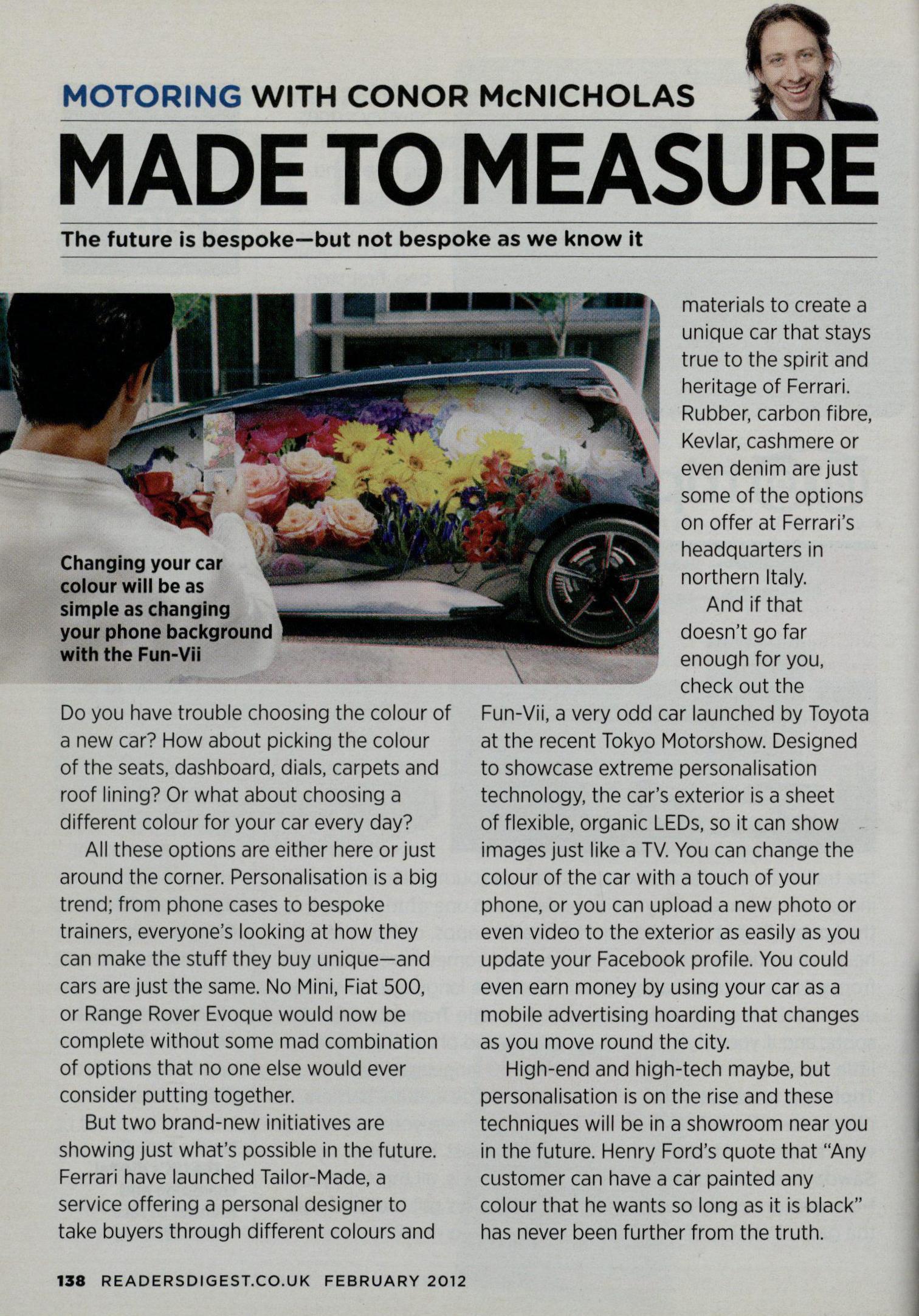
Changing your car colour will be as simple as changing your phone background with the Fun-Vii
Do you have trouble choosing the colour of a new car? How about picking the colour of the seats, dashboard, dials, carpets and roof lining? Or what about choosing a different colour for your car every day?
All these options are either here or just around the corner. Personalisation is a big trend; from phone cases to bespoke trainers, everyone's looking at how they can make the stuff they buy unique—and cars are just the same. No Mini, Fiat 500, or Range Rover Evoque would now be complete without some mad combination of options that no one else would ever consider putting together.
But two brand-new initiatives are showing just what's possible in the future. Ferrari have launched Tailor-Made, a service offering a personal designer to take buyers through different colours and
materials to create a unique car that stays true to the spirit and heritage of Ferrari. Rubber, carbon fibre, Kevlar, cashmere or even denim are just some of the options on offer at Ferrari's headquarters in northern Italy.
And if that doesn't go far enough for you, check out the Fun-Vii, a very odd car launched by Toyota at the recent Tokyo Motorshow. Designed to showcase extreme personalisation technology, the car's exterior is a sheet of flexible, organic LEDs, so it can show images just like a TV. You can change the colour of the car with a touch of your phone, or you can upload a new photo or even video to the exterior as easily as you update your Facebook profile. You could even earn money by using your car as a mobile advertising hoarding that changes as you move round the city.
High-end and high-tech maybe, but personalisation is on the rise and these techniques will be in a showroom near you in the future. Henry Ford's quote that "Any customer can have a car painted any colour that he wants so long as it is black" has never been further from the truth.
138 READERSDIGEST.CO.UK FEBRUARY 2012
ONE Tn Buy ONE

(U8,080) This car is so important as a benchmark—not just for BMW, but the whole auto industry— that there's been huge anticipation. No need to worry. This is arguably the finest car BMW has ever produced, delivering an outstanding ride and refinement, and it's now even lighter, too. If it's a saloon car you want, put this right at the top of your list.
TOP OF THE STOPS
(£7,995)
This new titchy city car squeezes the quality of a Golf into a small package as big companies chase ever-smaller motors for our urban mobility needs. Being a VW car it will also come in Skoda and SEAT flavours. I'd be tempted by the Skoda version—it has a touch more quirk about it and is £500 cheaper in the lowest spec.
ONE TO DREAM ABOUT
(E103,000)
Behold! The fastest drop-top Jaguar ever produced. The current XK sports coupe was launched in 2006 but Jag has done a fantastic job of refreshing and fettling this motor since then. This latest model hitting the streets now is super-fast and super-cool. The car to drive if you want to stand out in LA. Or Surrey.
Britain's motorway service stations are much improved from the greasy dives of my youth, but there's a world beyond. Five minutes from any motorway are all sorts of pubs and walks to give you a truly relaxing break—if only you knew where they are. Step in a new smartphone app called Motorway Walks & Breaks (£2.99 from iTunes app store). Click on the motorway you're on and for most junctions there are maps to nearby walks, sites of interest, or stops or food and efreshments.
Simple, but very effective. Just don't use it when you're driving! ■
Conor McNicholas is the former editor of BBC Top Gear Magazine
139
TRAVEL WITH KATE PETTIFER
MY GREAT ESCAPE
Sally and Frank O'Hare toured the Outer Hebrides in a motorhome
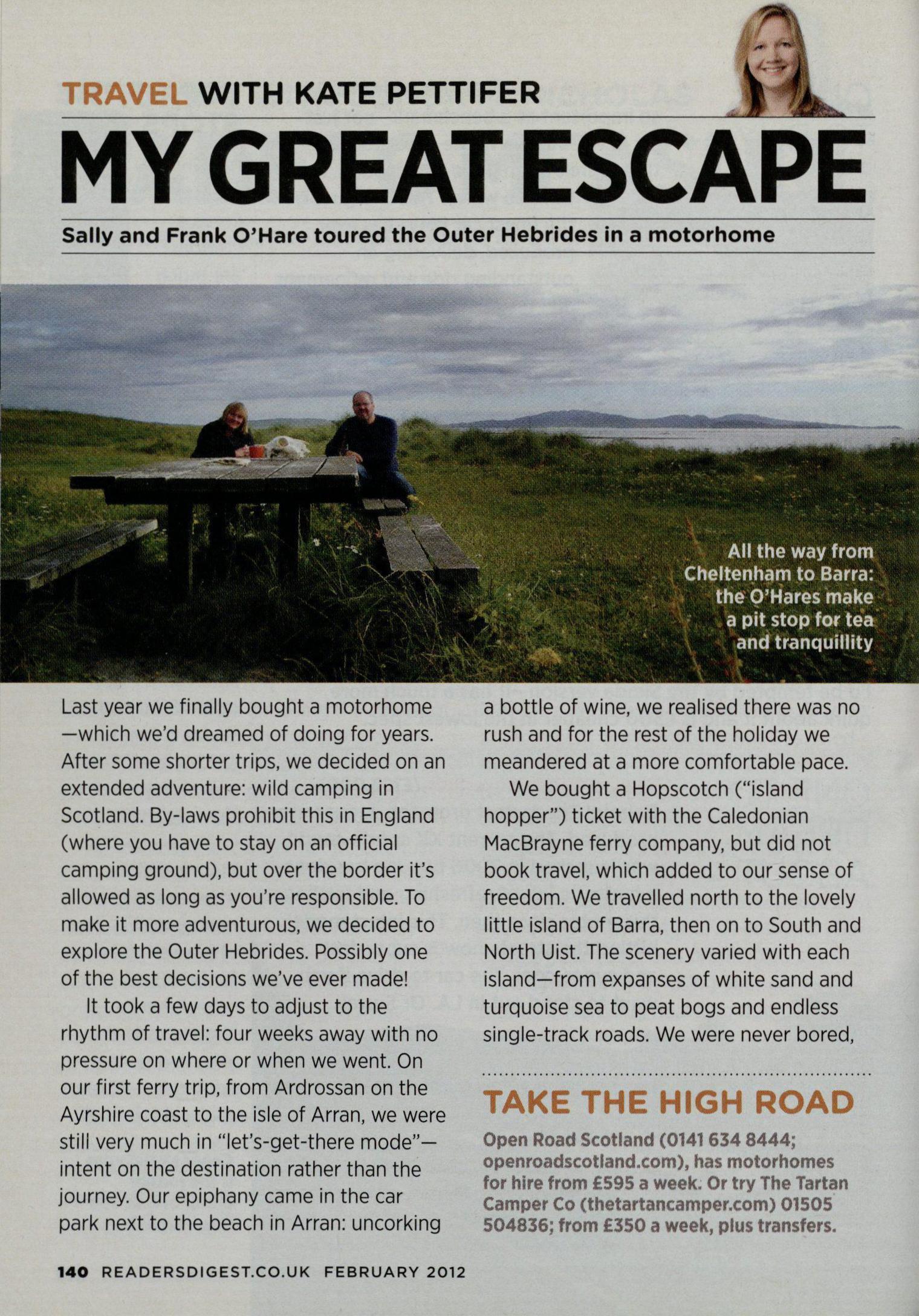
Last year we finally bought a motorhome —which we'd dreamed of doing for years. After some shorter trips, we decided on an extended adventure: wild camping in Scotland. By-laws prohibit this in England (where you have to stay on an official camping ground), but over the border it's allowed as long as you're responsible. To make it more adventurous, we decided to explore the Outer Hebrides. Possibly one of the best decisions we've ever made!
It took a few days to adjust to the rhythm of travel: four weeks away with no pressure on where or when we went. On our first ferry trip, from Ardrossan on the Ayrshire coast to the isle of Arran, we were still very much in "let's-get-there mode"— intent on the destination rather than the journey. Our epiphany came in the car park next to the beach in Arran: uncorking
All the way from Cheltenham to Barra: the O'Hares make a pit stop for tea and tranquillity
a bottle of wine, we realised there was no rush and for the rest of the holiday we meandered at a more comfortable pace. We bought a Hopscotch ("island hopper") ticket with the Caledonian MacBrayne ferry company, but did not book travel, which added to our sense of freedom. We travelled north to the lovely little island of Barra, then on to South and North Uist. The scenery varied with each island—from expanses of white sand and turquoise sea to peat bogs and endless single-track roads. We were never bored,
TAKE THE HIGH ROAD
Open Road Scotland (0141 634 8444; openroadscotland.com), has motorhomes for hire from £595 a week. Or try The Tartan Camper Co (thetartancamper.com) 01505 504836; from £350 a week, plus transfers.
140 READERSDIGEST.CO.UK FEBRUARY 2012
yet never felt pressured; the pace of life was reminiscent of a previous age. And chatting to the friendly locals really brings the place to life. The most memorable moment was our night camping at the Butt of Lewis by the lighthouse. The birdlife was fantastic, with cormorants and gannets, and we were lucky enough to see the Northern Lights. The place was magical, although eerie with sheep bleating, the waves crashing and fierce winds rocking the van!
Send us a photo of your favourite holiday, tell us briefly what made it so special, and if we include it on this page we'll pay you f70. See address on page 4.
TRAVEL WEBSITE

mrandmrssmith.com
Skiers looking to maximise their time in the Austrian Tirol should consider the resorts of Alpbach, Soil and Hopfgarten, now packaged with overnight train travel from Paris to Wergl by Skiline. Leave London on Friday afternoon; be in Austria for brunch on Saturday. It's great value for families, too, with child fares from only €20 each way on top of the Eurostar ticket. Seven nights from £519-£609 per adult (020 8313 3999; skiline.co.uk).
Drifters Boating Holidays has come over all mushy and is urging couples to think of its canal-based fleet as "love boats" to mark Valentine's Day. And you can't deny that wood-burning stoves, frosty towpaths and quiet moorings do sound romantic! Try a long weekend in Bath with the option to head east along the Kennet & Avon canal or west to Bristol via the River Avon. From £445 for a short break (0844 984 0322; drifters.co.uk).
Apologies to anyone still suffering a turkey hangover, but now is the best time to book long-haul flights for next Christmas, says Bob Atkinson of TravelSupermarket.com: "Scheduled flight seats are released on a rolling 11-month window ahead of departure date, so book 11 months prior to your return date of travel to ensure you get the dates you need, before fares rise for the peak period."
This boutique hotels outfit started as a guide for romantic couples. Now it has more than 850 hotels and self-catering properties worldwide. The site's design is as classy as its flamboyant reviews, and themes such as "child friendly" and "budget" make it easy to sift through options. Membership is free and earns you loyalty points plus a free "extra" with every booking. ■
GO NOW STAY NOW BOOK
NOW
FEBRUARY 2012 READERSDIGEST.CO.UK 141
(:Si /j iiJi
Simon Says
Dawn Grace Laroza
6 x 9
SOFTCOVER 1 $ 19.99
HARDCOVER 1$ 29.99
EBOOK I $ 9.99
139 pages
A bright young kid is the main character of the novel Simon Says by Dawn Grace Laroza. Born deaf, his life becomes a positive adventure upon discovering he could write.
Evolution Exposed and Intelligent Designed Explained
Walter Starkey
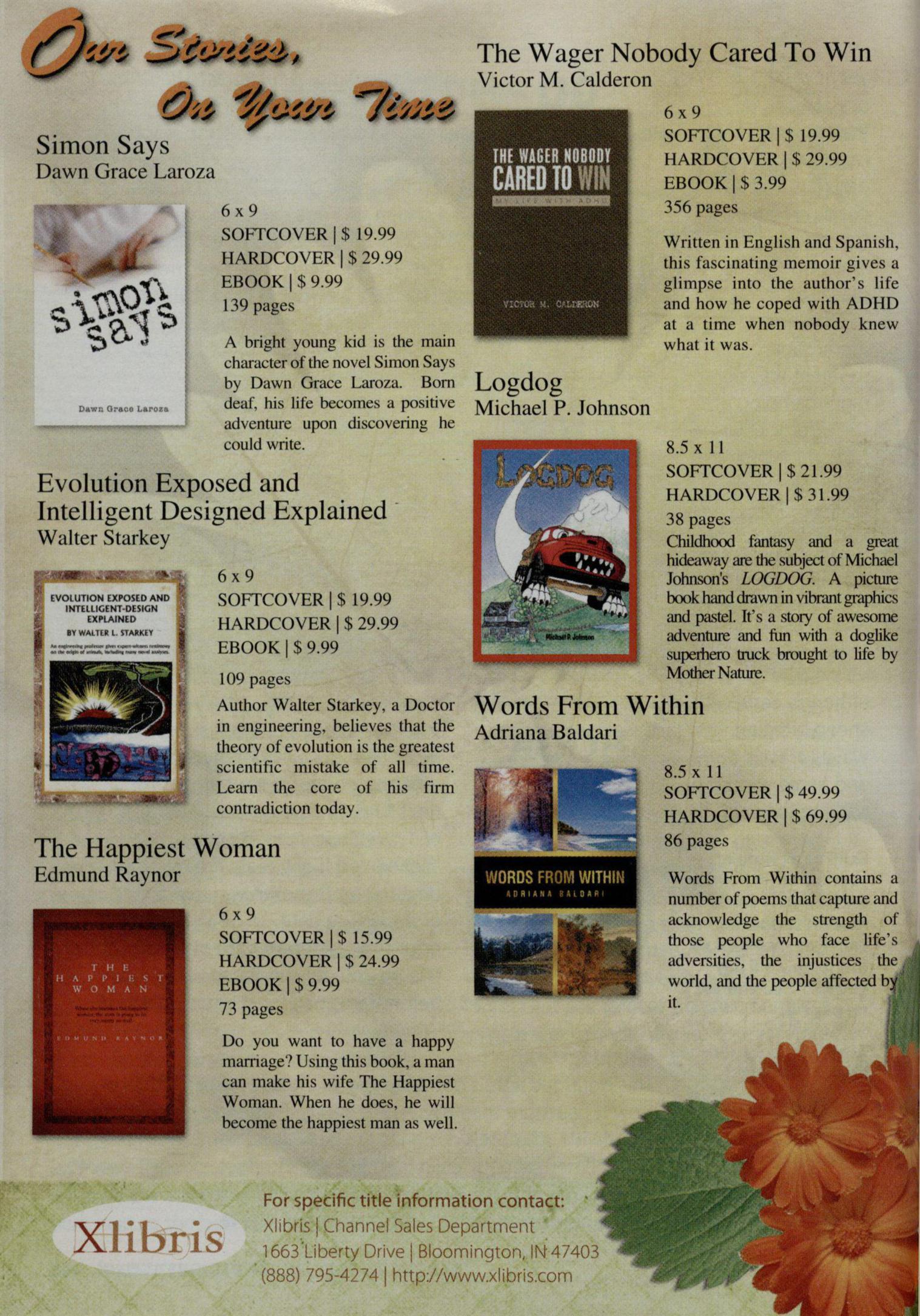
6 x 9
SOFTCOVER 1$ 19.99
HARDCOVER 1$ 29.99
EBOOK 1 $ 9.99
109 pages
Author Walter Starkey, a Doctor in engineering, believes that the theory of evolution is the greatest scientific mistake of all time. Learn the core of his firm contradiction today.
The Happiest Woman
Edmund Raynor
6 x 9
SOFTCOVER $ 15.99
HARDCOVER 1$ 24.99
EBOOK 1$ 9.99
73 pages
Do you want to have a happy marriage? Using this book, a man can make his wife The Happiest Woman. When he does, he will become the happiest man as well.
The Wager Nobody Cared To Win
Victor M. Calderon
6 x 9
SOFTCOVER 1 $ 19.99
HARDCOVER 1$ 29.99
EBOOK 1$ 3.99
356 pages
Written in English and Spanish, this fascinating memoir gives a glimpse into the author's life and how he coped with ADHD at a time when nobody knew what it was.
Logdog
Michael P. Johnson
8.5 x 11
SOFTCOVER 1$ 21.99
HARDCOVER 1$ 31.99
38 pages
Childhood fantasy and a great hideaway are the subject of Michael Johnson's LOGDOG. A picture book hand drawn in vibrant graphics and pastel. It's a story of awesome adventure and fun with a doglike superhero truck brought to life by Mother Nature.
Words From Within Adriana Baldari
8.5 x 11
SOFTCOVER 1$ 49.99
HARDCOVER 1$ 69.99
86 pages
WORDS FROM WITHIN • 3,/,
Words From Within contains a number of poems that capture and acknowledge the strength of those people who face life's adversities, the injustices the world, and the people affected b it.
EVOLUTION
EXPOSED AND INTELLIGENT.DESIGN EXPLAINED RV WALTER L. 'TARIM
Xlibris For spetific title information contact: Xlibris I Channel Sales Department 16631iberty Drive I Bloomington, IN 47403 (888) 795-4274 I http://www.xlibris.com
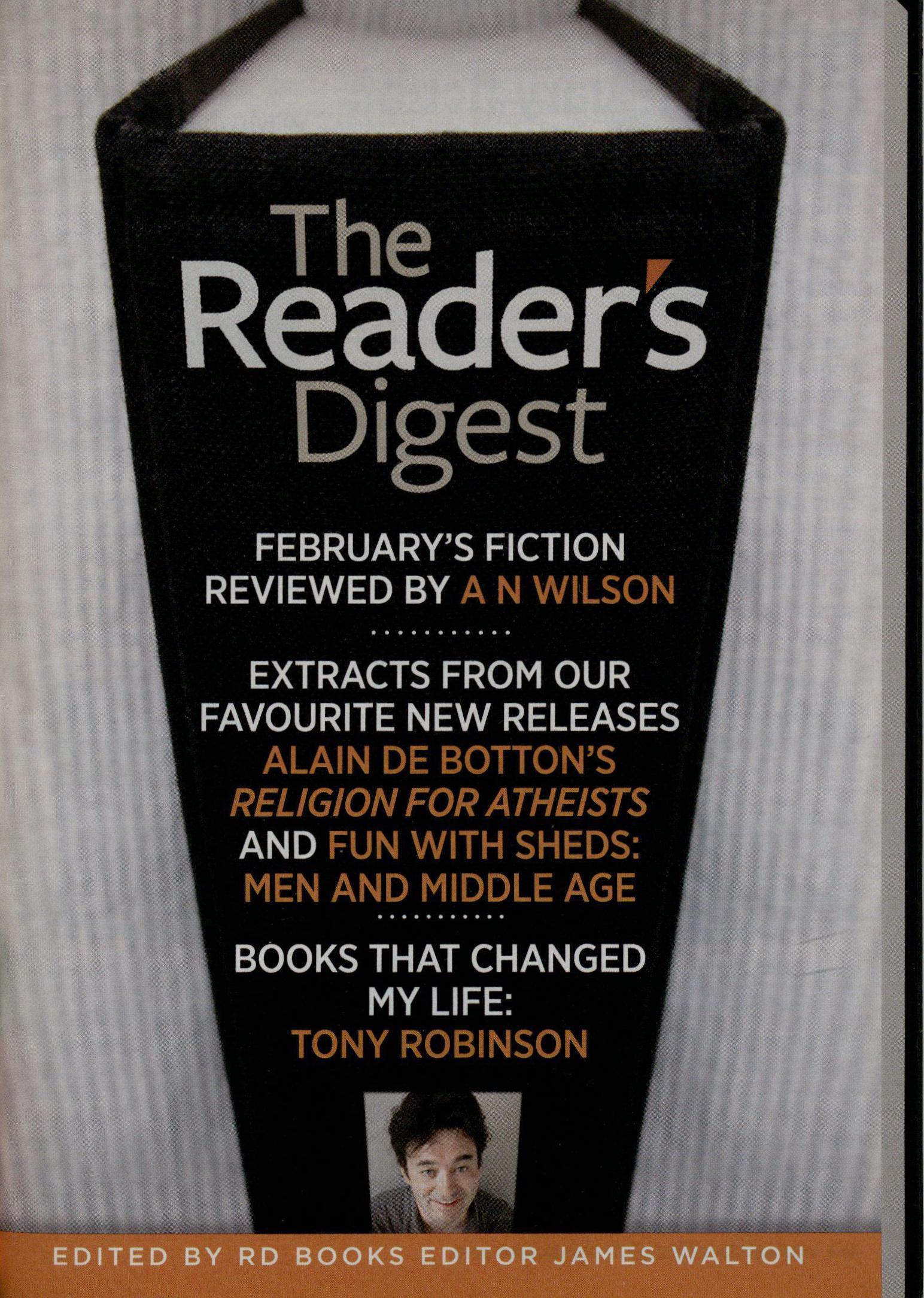
FEBRUARY'S FICTION
REVIEWED BY A N WILSON
EXTRACTS FROM OUR FAVOURITE NEW RELEASES
ALAIN DE BOTTON'S RELIGION FOR ATHEISTS AND FUN WITH SHEDS: MEN AND MIDDLE AGE BOOKS THAT CHANGED MY LIFE: TONY ROBINSON
T Reaheders Digest
EDITED BY RD BOOKS EDITOR JAMES WALTON
February fiction
The Soldier's Wife
by Joanna Trollope
(Doubleday, £18.99)
Alexa Riley is married to Dan, a major in the British Army who's just returned from a tour of duty in Afghanistan. A wellorganised and highly intelligent woman, Alexa loves her husband—but he can't see how she suffers when he puts the army first in their marriage. His homecoming provokes the sense that enough is enough, and that Alexa
must make some choices. So will she leave him?
All the characters here are realistic and believable, but one of the novel's strongest elements is the relationship between Alexa and Jack: the man she might have married. Jack acts as a kind of uncle to her daughters, and even goes with her to meet the headmistress of teenage Isabel's boarding school when the girl develops attention-seeking kleptomania. Full of incident and packed with moral and emotional dilemmas, this is vintage Trollope.
A Sentimental Traitor
by Michael Dobbs (Simon & Schuster, £17.99) Dobbs, now a Tory peer, shot to fame with House of Cards, featuring the
CLASSICS CORNER: REBECCA
For the month of Valentine's Day, it seemed only right to pick the book that the Romantic Novelists' Association voted the most romantic British novel of the 20th century. From the first sentence onwards— all together now, "Last night I dreamt I went to Manderley again"—Daphne du
A N Wilson finds plenty to enjoy in this month's new novels
Michael DOBBS
yenIilflentai Traitor
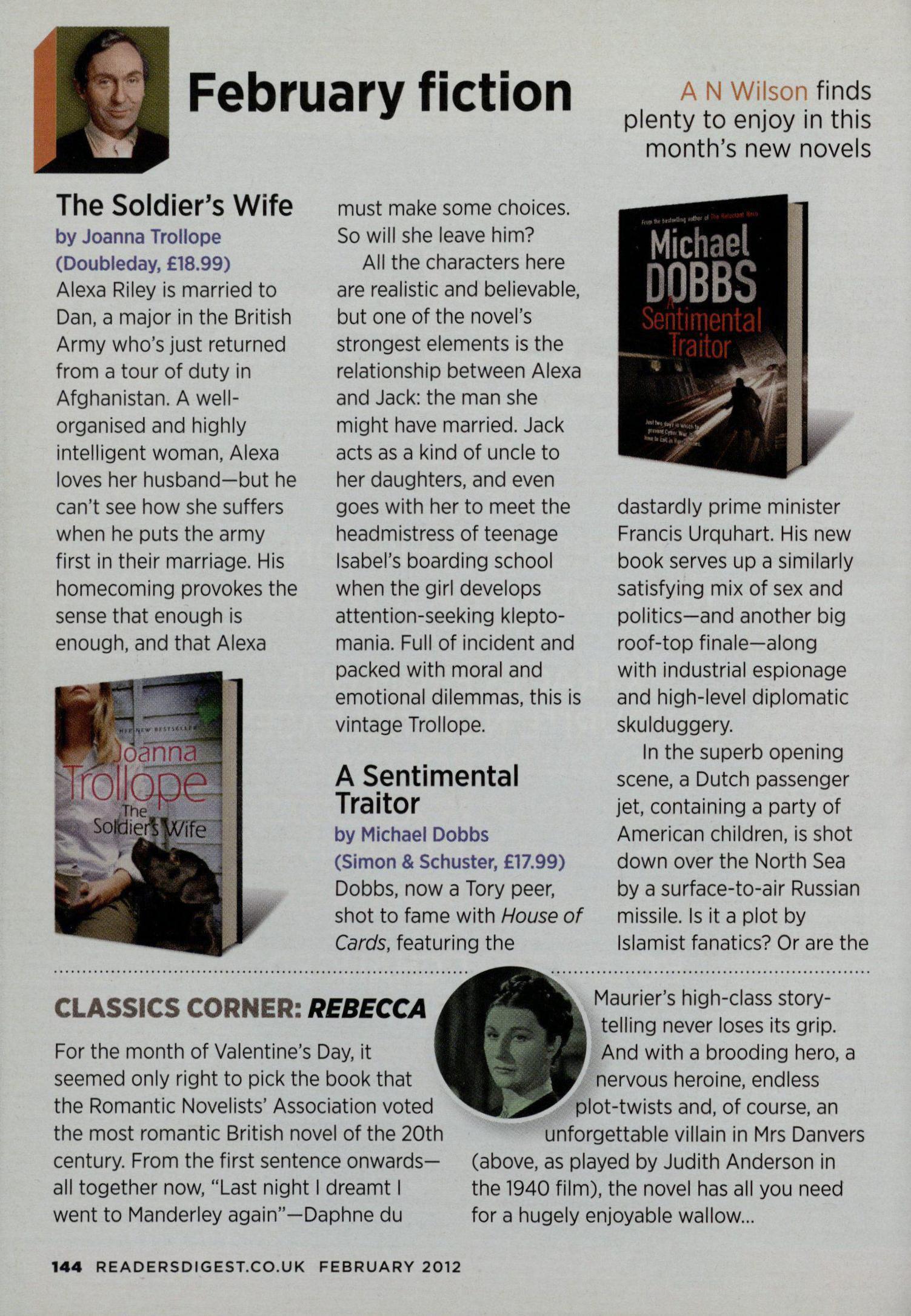
dastardly prime minister Francis Urquhart. His new book serves up a similarly satisfying mix of sex and politics—and another big roof-top finale—along with industrial espionage and high-level diplomatic skulduggery.
In the superb opening scene, a Dutch passenger jet, containing a party of American children, is shot down over the North Sea by a surface-to-air Russian missile. Is it a plot by Islamist fanatics? Or are the
Maurier's high-class storytelling never loses its grip. And with a brooding hero, a nervous heroine, endless plot-twists and, of course, an unforgettable villain in Mrs Danvers (above, as played by Judith Anderson in the 1940 film), the novel has all you need for a hugely enjoyable wallow...
144 READERSDIGEST.CO.UK FEBRUARY 2 012
Russians to blame? Or what? Throw in a dose of the shadiest, sexiest secrets of European Intelligence networks, top with a good old clubman hero in the tradition of Buchan and Le Carre, and you have an irresistible mixture.
The Snow Child
by Eowyn Ivey
(Headline Review, £14.99)
An old Russian folk tale has it that a childless couple, living on the edge of the woods, build themselves a child out of snow, who then comes to life. In a stunning debut novel, Alaskan Eowyn Ivey reworks this story. Mabel and Jack, a
couple from Pennsylvania, come to 1920s Alaska to forget the pain of losing a baby. They struggle through a long, dark winter and build their own snow child. But does she really come to life, or is Faina just a feral local girl? With Mabel still grieving for her lost child, we drift in and out of uncertainty as the whole spellbinding story unfolds...
The Street Sweeper
by Elliot Perlman (Faber, £14.99)
Perlman's story of modern New York is a big book in every sense. Huge in its scope, it covers two of the most searingly painful aspects of 20th-century history: the Holocaust and the abuse of AfricanAmericans' rights. The framework of the novel is the relationship between Lamont Williams, a black ex-con trying to rebuild his life as a hospital janitor,
QUICK QUIZ
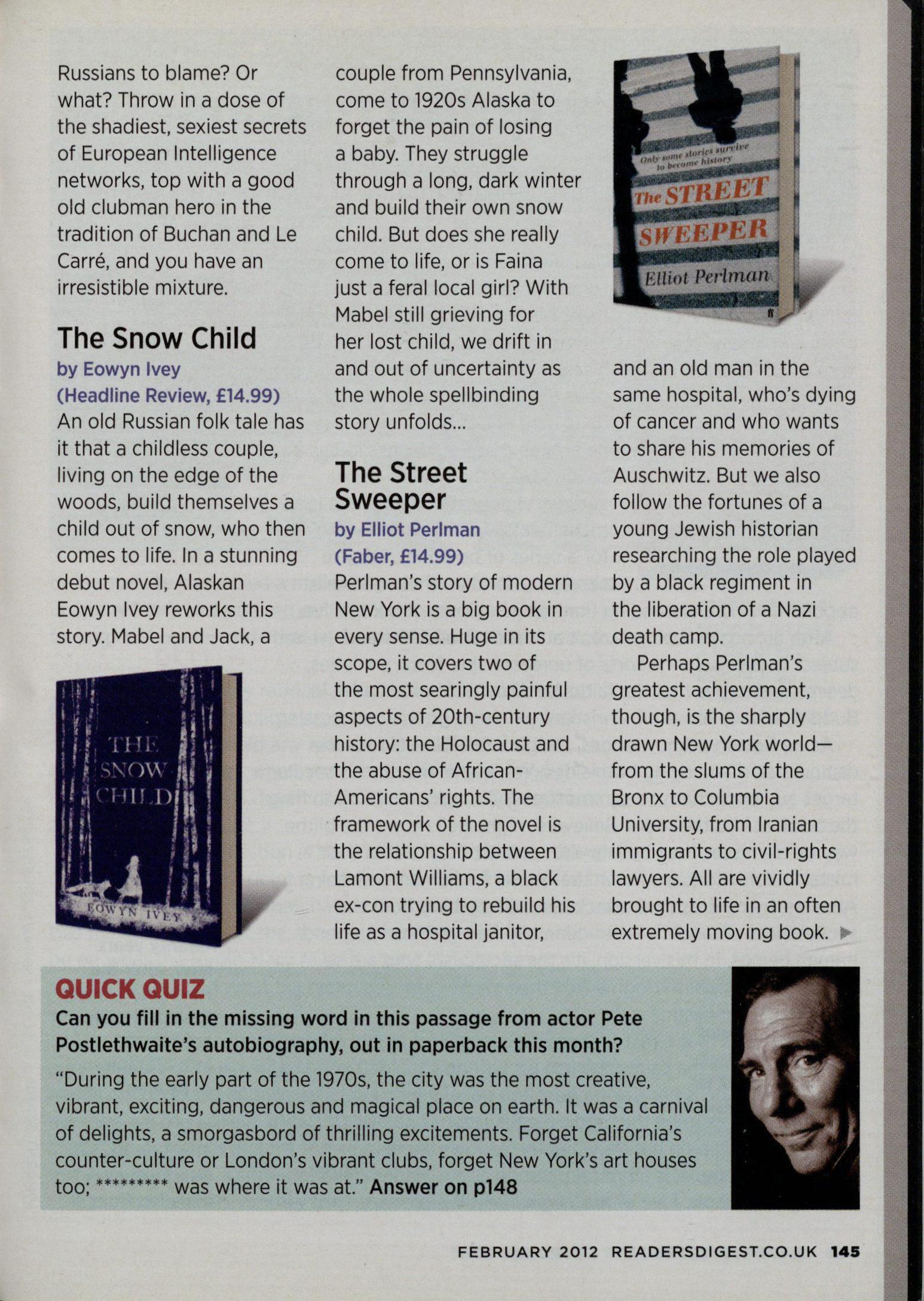
and an old man in the same hospital, who's dying of cancer and who wants to share his memories of Auschwitz. But we also follow the fortunes of a young Jewish historian researching the role played by a black regiment in the liberation of a Nazi death camp.
Perhaps Perlman's greatest achievement, though, is the sharply drawn New York world— from the slums of the Bronx to Columbia University, from Iranian immigrants to civil-rights lawyers. All are vividly brought to life in an often extremely moving book.
Can you fill in the missing word in this passage from actor Pete Postlethwaite's autobiography, out in paperback this month?
"During the early part of the 1970s, the city was the most creative, vibrant, exciting, dangerous and magical place on earth. It was a carnival of delights, a smorgasbord of thrilling excitements. Forget California's counter-culture or London's vibrant clubs, forget New York's art houses too; ********* was where it was at." Answer on p148
FEBRUARY 2 012 READERSDIGEST.CO.UK 145
Mary, Mary, quite contrary
A bestselling philosopher (no, really) urges his fellow non-believers to accept how much they have to learn from their "infantile" opponents
Usually, when atheists admit there are some things about religion they like, the list is purely aesthetic—the King James Bible, say, or devotional art. In his new book, Alain de Botton (right) goes a lot further than that. Although quite sure about God's non-existence, he argues that the great religions haven't been the world's "most successful educational and intellectual movements" for no reason—or even for a series of bad ones. They're simply better than their rationalist opponents at understanding the tricky business of being alive.
After all, human beings aren't at heart rational. Instead, we're subject to precisely the sorts of unreasonable fears, anxieties, desires and hopes that the faiths he discusses here—Judaism, Buddhism and, above all, Christianity—are so good at addressing.
As de Botton acknowledges, Religion for Atheists runs the distinct risk of annoying both sides, Yet, in the end, it's his secular target audience that you can most easily imagine wanting to fling the book across the room. Believers might well resent the blithe way he dismisses their beliefs—but at least they're told their mistaken faith contains much that's vital for human well-being. Atheists, by contrast, are attacked for everything from the soullessness of modern art to generally failing to comprehend human beings. In this version, it's the secularists who are so imprisoned by foolish dogma that their world view becomes damagingly simplistic.
De Botton is that rarest of things: a bestselling, highly readable philosopher. But the calm clarity of his writing shouldn't blind us to how daring he is here, as he goes out on a limb so intellectually unfashionable as to be the modern equivalent of heresy. (If I were him, I'd invest in a tin hat for when the reviews come in.)
This, for example, is a typical passage about Marian devotion— the largely Catholic love of the Virgin Mary. We pick it up just after
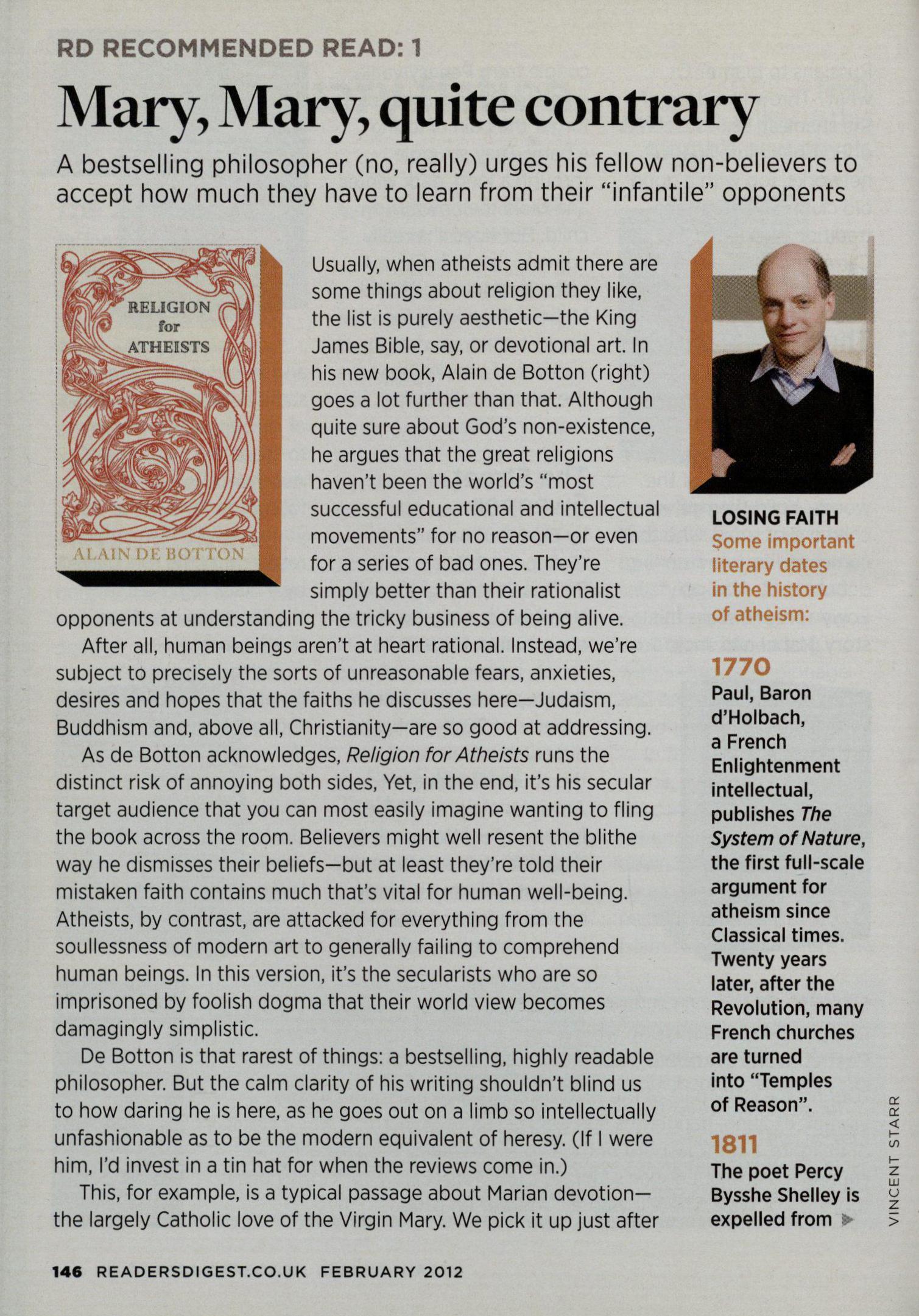
LOSING FAITH
Some important literary dates in the history of atheism:
1770
Paul, Baron d'Holbach, a French Enlightenment intellectual, publishes The System of Nature, the first full-scale argument for atheism since Classical times. Twenty years later, after the Revolution, many French churches are turned into "Temples of Reason".
1811
The poet Percy Bysshe Shelley is expelled from
V INCENT TA R RD RECOMMENDED READ: 1
146 READERSDIGEST.CO.UK FEBRUARY 2012
de Botton has described a middle-aged man kneeling before an image of Mary and pouring out all the disappointments and feelings of hopelessness that he keeps hidden from the world...
g‘ From a robustly rational perspective, Marian devotion seems to exemplify religion at its most infantile and soft-headed. How could any reasonable adult trust in the existence of a woman who lived thousands of years ago (if she lived at all), much less draw comfort from her selfless sympathy and limitless patience?
The drift of the question is hard to refute; it is simply the wrong question to raise. The point is not whether the Virgin exists, but what it tells us about human nature that so many Christians over two millennia have felt the need to invent her. Our focus should be on what the Virgin Mary reveals about our emotional requirements—and what becomes of these requirements when we lose our faith.
The cult of Mary speaks of the extent to which, despite our adult powers of reasoning, our responsibilities and our status, the needs of childhood endure within us. While for long stretches of our lives we can believe in our maturity, we never succeed in insulating ourselves against the kind of catastrophic events that throw us back into a state of helplessness.
At such moments we may long to be held and reassured, as o,
irrational—and entirely human: a man prays before the Virgin Mary in a French church
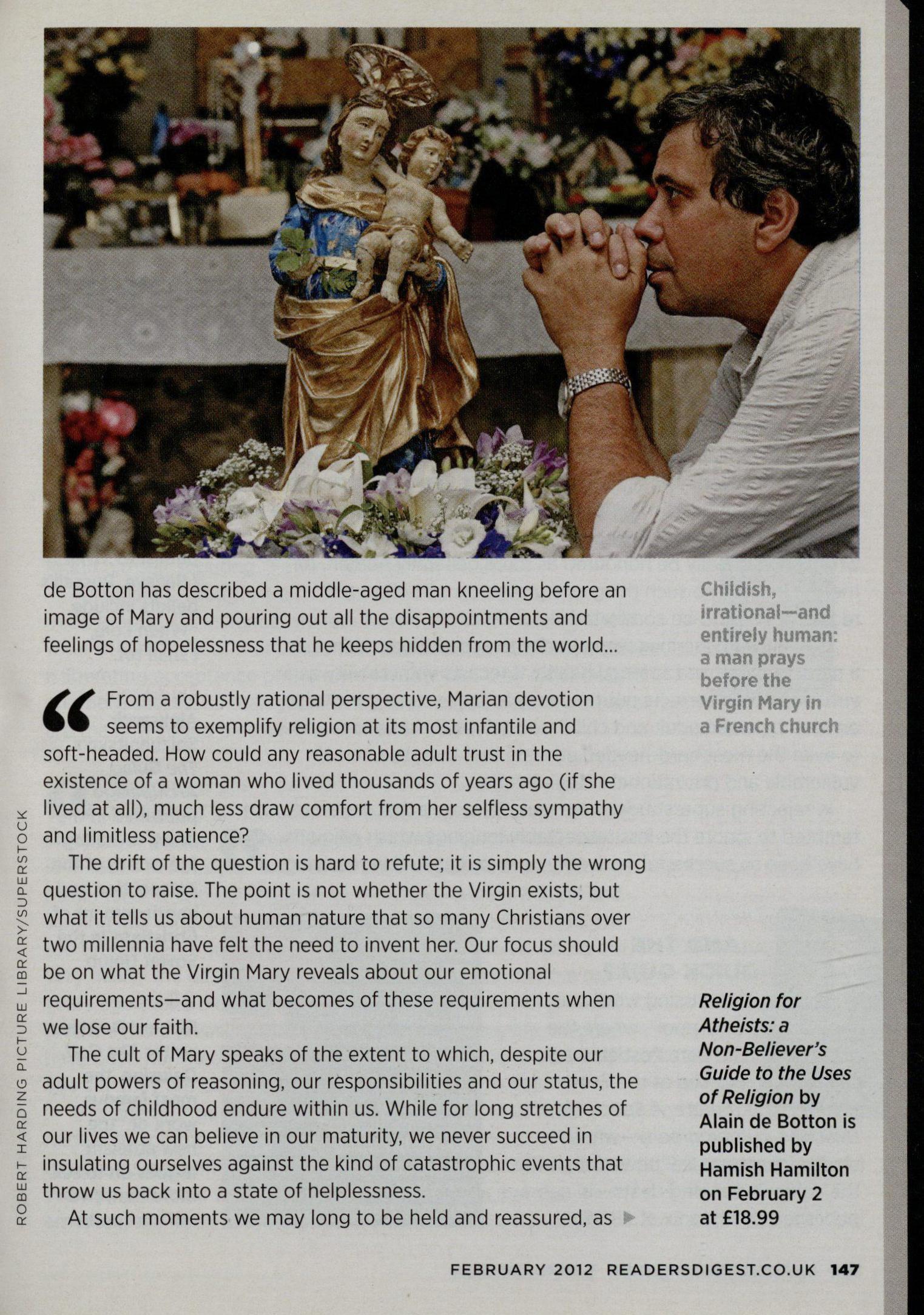
Religion for Atheists: a Non-Believer's Guide to the Uses of Religion by Alain de Botton is published by Hamish Hamilton on February 2 at £18.99
ROBERT HARDING PICTURE LIBRARY/ SU PERSTO CK
FEBRUARY 2012 READERSDIGEST.CO.UK 147
og we were decades ago by some sympathetic adult who made us feel physically protected, stroked our hair, looked at us with tenderness. Though such longings go largely unmentioned in adult society, it has been the achievement of religions to know how to reanimate and legitimate them...
By contrast, atheism is prone to seem coldly impatient with our neediness. The longing for comfort at the heart of the Marian cult seems at odds with the rational engagement with existence on which atheists pride themselves. Mary has been framed as a symptom of urges which adults ought to outgrow.
At its most pugnacious, atheism has attacked religion for being unwilling to acknowledge that it is nothing more than a glorified response to childhood longings. This charge may well be correct. The problem is that those who level it are themselves often involved in denial, a denial of the needs of childhood. In their zeal to attack believers whose frailties have led them to embrace the supernatural, atheists may neglect the frailty that is an inevitable feature of all our lives. They may label as childish particular needs which should really be honoured as more generally human, for there is in truth no such thing as a grown-up who does not regularly yearn to be comforted like a child.
Christianity describes the capacity to accept dependence as a mark of moral and spiritual health. It recasts vulnerability as a virtue and thus corrects our tendency to believe in a conclusive division between adult and childhood selves. It dares to propose to even the most hard-headed atheists that they, too, remain vulnerable and pre-rational in their hearts.
In rejecting superstition, we should take care that we aren't tempted to ignore the less respectable longings which religions have been so successful in identifying and dignified in resolving.
...AND THE QUICK QUIZ?
The missing word was "Liverpool", where the late Pete Postlethwaite worked at the Everyman Theatre. A Spectacle of Dust: the Autobiography—whose closing chapters deal powerfully with the author's pending death—is published by Phoenix at £8.99.
•VE STAR HUGH
BONNEVILLE'S favourite book?
"John Mortimer's Clinging to the Wreckage, because I'm reading it at the moment. Next week's favourite will be The Girl et. Who Kicked the Hornets' Nest."
Oxford University for writing the pamphlet The Necessity of Atheism.
1881
The phrase "God is dead" appears for the first time in the works of Friedrich Nietzsche. 1925
Bertrand Russell, philosopher and future winner of the Nobel Prize for Literature, publishes What / Believe. Russell's beliefs include, "When I die, I shall rot."
1973
Aleksandr Solzhenitsyn's
The Gulag Archipelago is published in the West, revealing the extent of the persecution and imprisonment of Christians in the Soviet Union.
2006
4t.
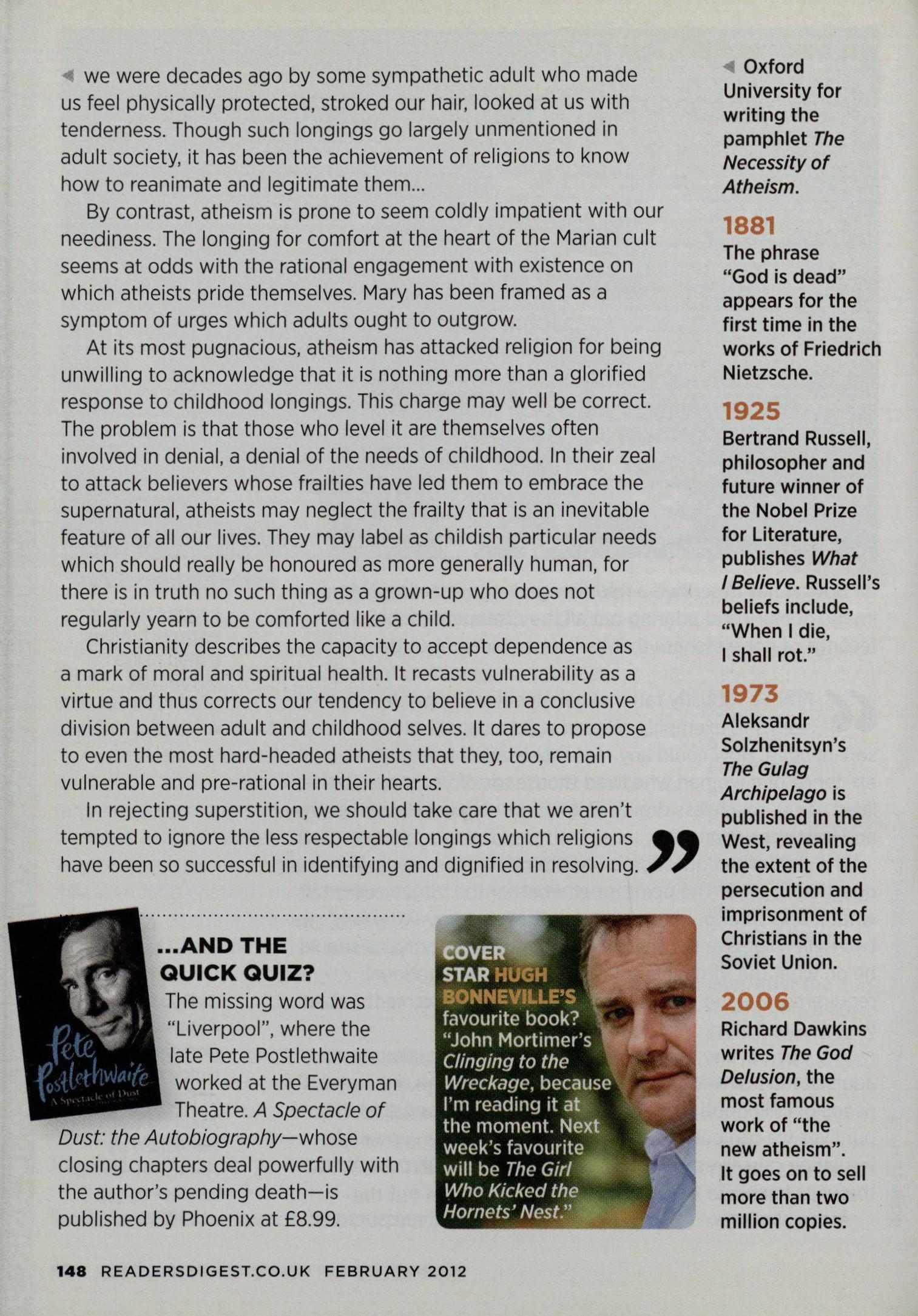
Richard Dawkins writes The God Delusion, the most famous work of "the new atheism". It goes on to sell more than two million copies.
148 READERSDIGEST.CO.UK FEBRUARY 2012
The joys of staring into space
Who says middle age is no fun?
After all, when else can you be so happy doing absolutely nothing?
In the past, Marcus Berkmann has written funny, sharp, slightly melancholy books on cricket, fatherhood and pubquizzing. Now he applies the same qualities to the ticklish subject of male middle age. A Shed of One's Own doesn't avoid the humiliations involved: the physical decline, the painful pangs of nostalgia, the sudden appeal of both pomposity and pedantry. (One of Berkmann's friends realised he was middle-aged when he found himself shouting "Fewer, not less!" at Radio 4.)
A SHED OF ONE'S OWN
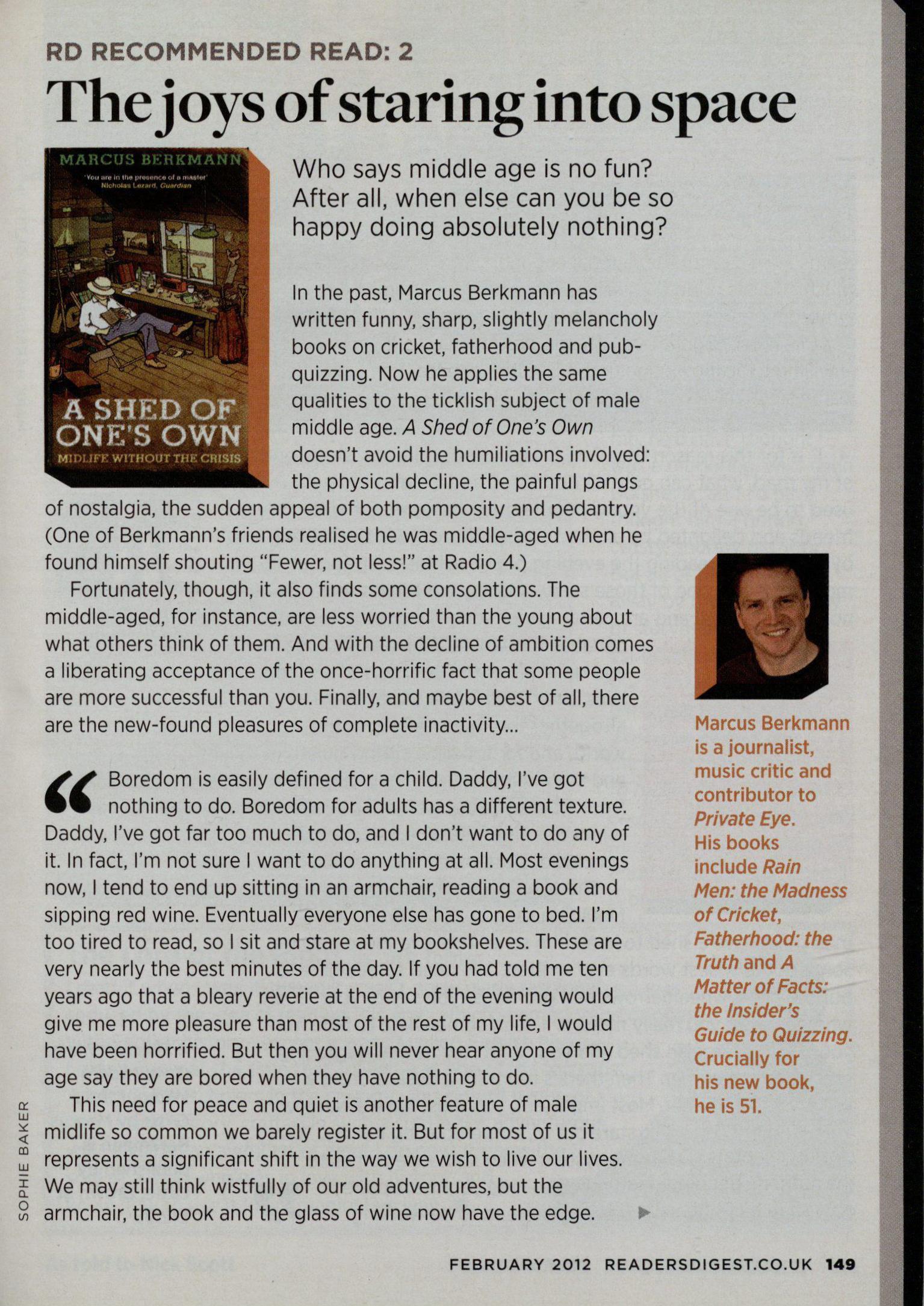
Fortunately, though, it also finds some consolations. The middle-aged, for instance, are less worried than the young about what others think of them. And with the decline of ambition comes a liberating acceptance of the once-horrific fact that some people are more successful than you. Finally, and maybe best of all, there are the new-found pleasures of complete inactivity...
Boredom is easily defined for a child. Daddy, I've got nothing to do. Boredom for adults has a different texture. Daddy, I've got far too much to do, and I don't want to do any of it. In fact, I'm not sure I want to do anything at all. Most evenings now, I tend to end up sitting in an armchair, reading a book and sipping red wine. Eventually everyone else has gone to bed. I'm too tired to read, so I sit and stare at my bookshelves. These are very nearly the best minutes of the day. If you had told me ten years ago that a bleary reverie at the end of the evening would give me more pleasure than most of the rest of my life, I would have been horrified. But then you will never hear anyone of my age say they are bored when they have nothing to do.
This need for peace and quiet is another feature of male midlife so common we barely register it. But for most of us it represents a significant shift in the way we wish to live our lives. We may still think wistfully of our old adventures, but the armchair, the book and the glass of wine now have the edge.
Marcus L. oann is a journalist, music critic and contributor to Private Eye. His books include Rain Men: the Madness of Cricket, Fatherhood: the Truth and A Matter of Facts: the insider's Guide to Quizzing Crucially for his new book he is 51.
MARCUS BIiHriMAN
RD RECOMMENDED READ: 2
SOPHI E BAKER
FEBRUARY 2012 READERSDIGEST.CO.UK 149
It is for this reason that God invented pubs. I have, at the end of my road, what can only be described as an old man's pub. I used to be one of the young people there hanging out with friends and delighted by all the sorry, grumpy old blokes sitting by themselves reading the evening paper. Within ten years at most, I shall be one of those sorry, grumpy old blokes, who are not grumpy at all and are certainly not sorry. They sit in the pub because it is where they can find peace and quiet. Over the course of their long lives, they have learned that there is altogether too much talking in the world, and far too little sitting quietly and staring into space. They may differ from Tibetan Buddhist monks in a few minor details of lifestyle, but their conclusions are much the same.
These men sit in the pub because it is where they can find peace and quiet
Sheds fulfil a similar purpose. As Colin Moulding sang in XTC's 'Fruit Nut', 'A man must have a shed to keep him sane.' I believe these may be some of the wisest words ever written. 'We need somewhere to put the hoes, wheelbarrows and gro-bags,' you say to your family, whereas what you really mean is `I need somewhere to hide from you.' Build a largeish shed and you can throw all that gardening rubbish in the corner. Then there's room for a desk, a chair, a kettle and a mini-bar. Most important, you must have a window. You need something to stare out of, contemplating infinity. You also need an early warning system when someone comes to b bother you, thus giving you time to hide your newspaper/ eer/secret stash of biscuits and pretend to be working.
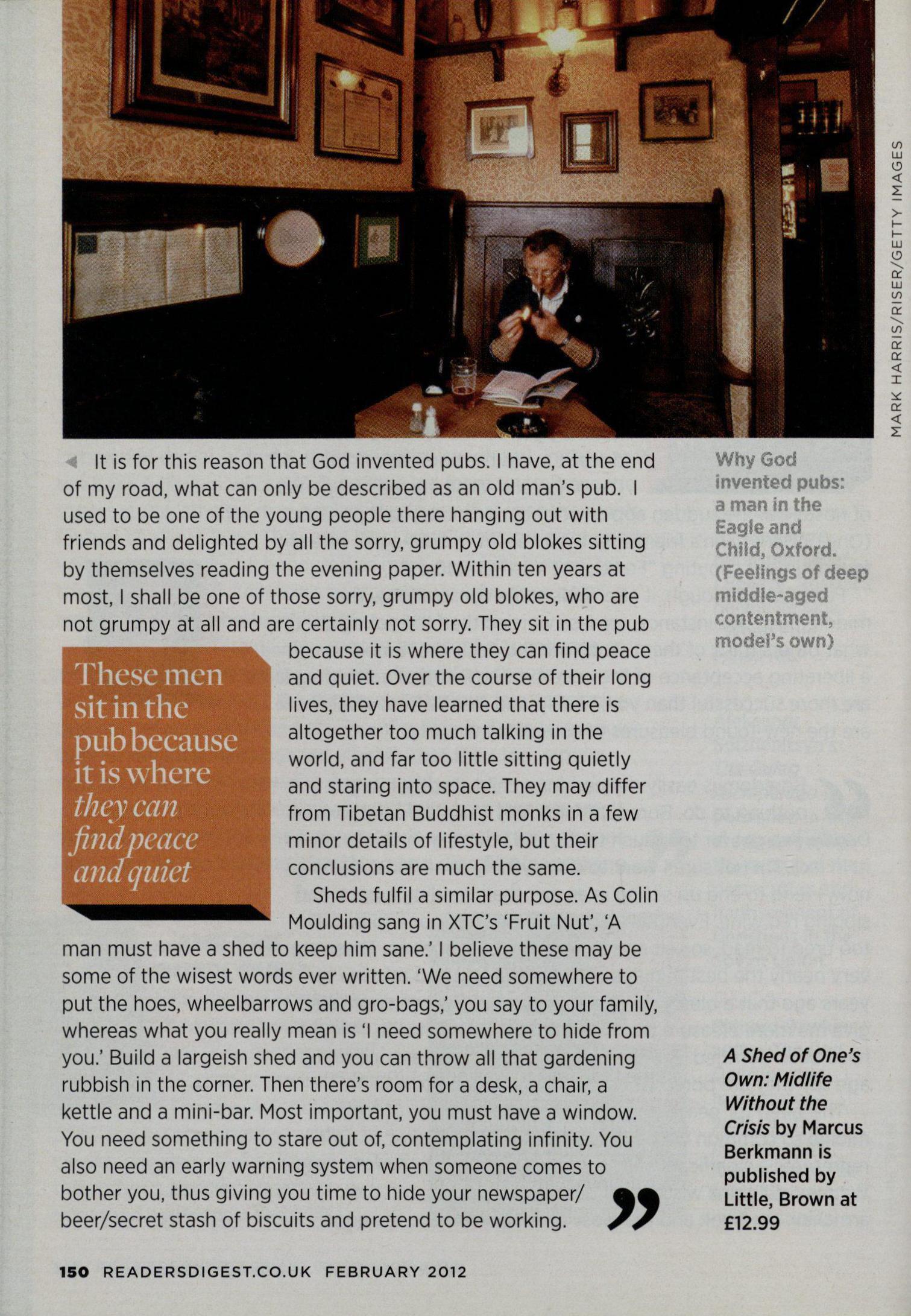
A Shed of One's Own: Midlife Without the Crisis by Marcus Berkmann is published by Little, Brown at £12.99
Why God invented pubs: a man in the Eagle and Child, Oxford. (Feelings of deep middle-aged contentment, model's own)
150 READERSDIGEST.CO.UK FEBRUARY 2012
Books that Changed my Life
He became a household name as the dunce Baldrick in historical sitcom Blackadder, but Tony Robinson is now better known as an author of children's books and maker of TV programmes about the past. The new series of Time Team is on Channel 4 this month.
Half Magic
by Edward Eager
As a child in the Fifties, I read every book I could lay my hands on, and identified with every hero in every single one of them. Even now, I still want to be the hero in the last novel I read. And this—the first book that really had an impact on me—has four of them. Set in the 1920s, it's about a group of very ordinary kids in Ohio who find a magic coin, but the magic only half works. For example, if you wished to be back home, it'd get you halfway, stuck in the middle of nowhere with no money. The resulting mayhem makes for a kind of Monty Python for five-year-olds, and completely blew me away. It altered my understanding of what was —and what was allowed to be—funny.
The Lord of the Rings by
ERR Tolkien
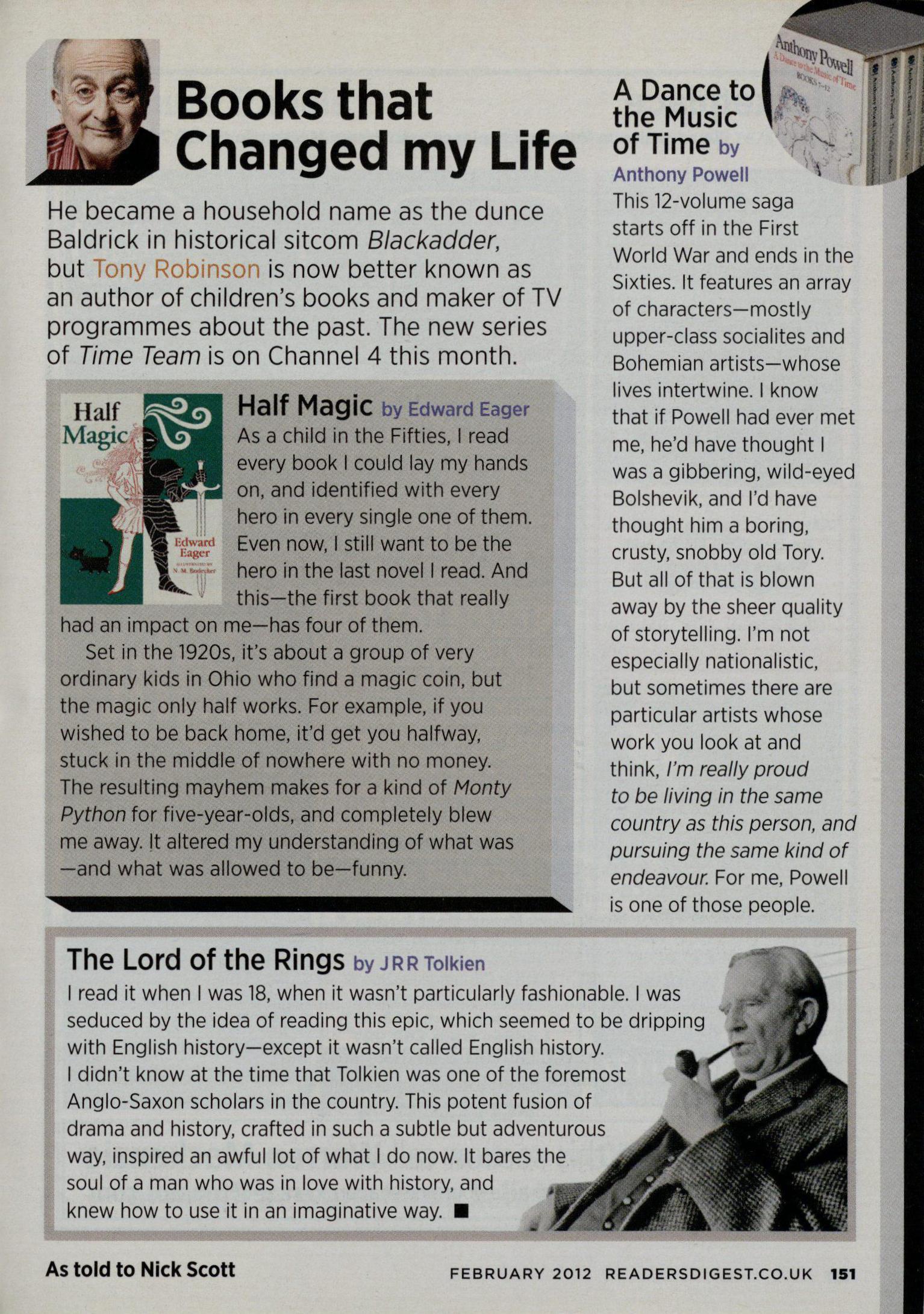
the Music
A Dance to of Time by
Anthony Powell
This 12-volume saga starts off in the First World War and ends in the Sixties. It features an array of characters—mostly upper-class socialites and Bohemian artists—whose lives intertwine. I know that if Powell had ever met me, he'd have thought I was a gibbering, wild-eyed Bolshevik, and I'd have thought him a boring, crusty, snobby old Tory. But all of that is blown away by the sheer quality of storytelling. I'm not especially nationalistic, but sometimes there are particular artists whose work you look at and think, I'm really proud to be living in the same country as this person, and pursuing the same kind of endeavour. For me, Powell is one of those people.
I read it when I was 18, when it wasn't particularly fashionable. I was seduced by the idea of reading this epic, which seemed to be dripping with English history—except it wasn't called English history. I didn't know at the time that Tolkien was one of the foremost Anglo-Saxon scholars in the country. This potent fusion of drama and history, crafted in such a subtle but adventurous way, inspired an awful lot of what I do now. It bares the soul of a man who was in love with history, and knew how to use it in an imaginative way. •
As told to Nick Scott FEBRUARY 2 012 READERSDIGEST.CO.UK 151
Marketplace
To advertise in this section please call Warren Mackenzie on 020 7675 1828
Concertinas urgently wanted by Britain's top specialist
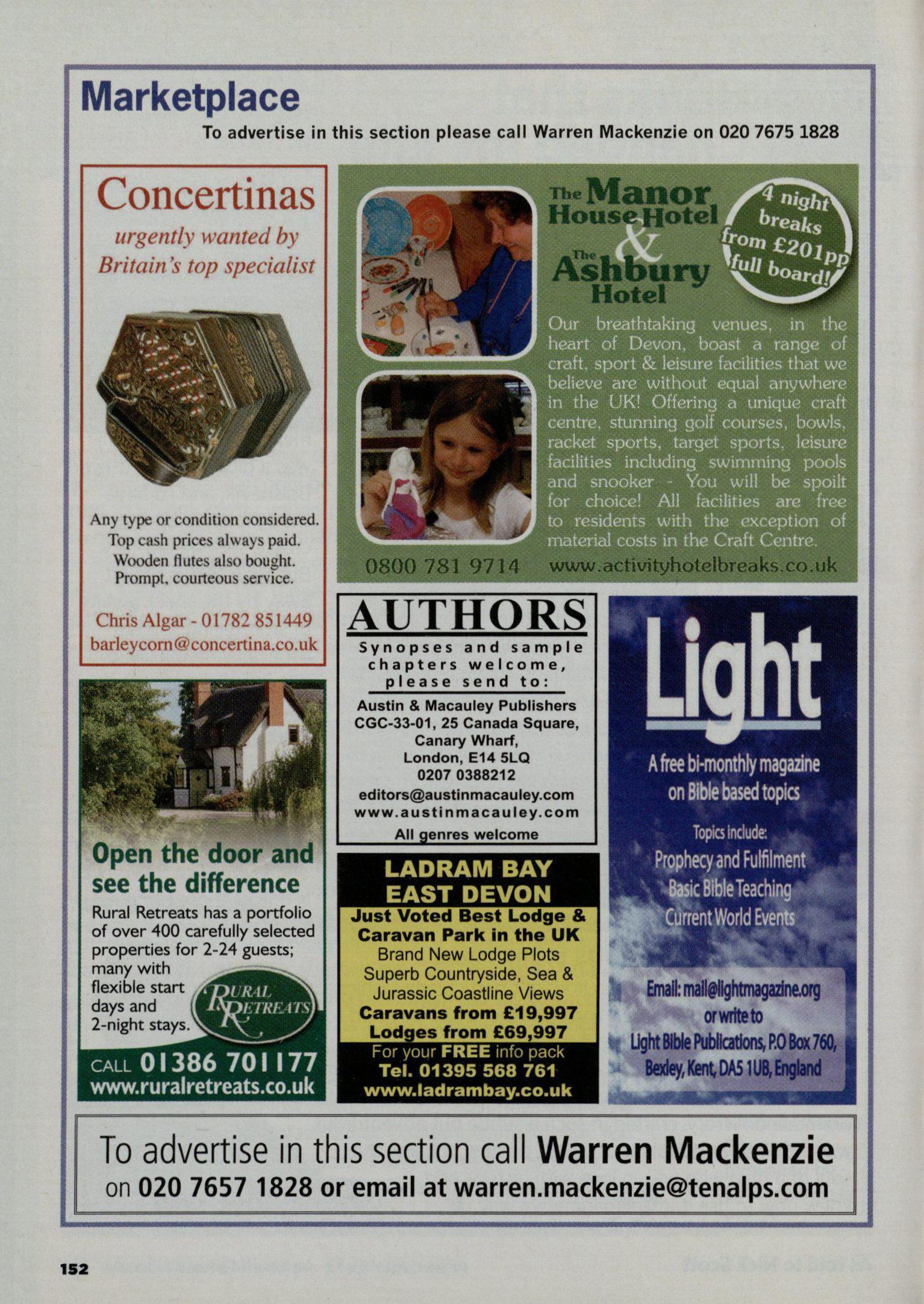
Any type or condition considered. Top cash prices always paid. Wooden flutes also bought. Prompt. courteous service.
Chris Alger - 01782 851449 barleycomgconcertina.co.uk
Open the door and see the difference
Rural Retreats has a portfolio of over 400 carefully selected properties for 2-24 guests; many with flexible start days and 2-night stays.
CALL 01386 701177
www.ruralretreats.co.uk
00 781 9
The Mono House Ho Ashbu Hotel
Our breathtaking venues, in the heart of Devon, boast a range of craft, sport & leisure facilities that we believe are without equal anywhere in the UK! Offering a unique craft centre, stunning golf courses, bowls, racket sports, target sports. leisure facilities including swimming pools and snooker - You will be spoilt for choice! All facilities are free to residents with the exception of costs in the Craft Centre.
AUTHORS
Synopses and sample chapters welcome, please send to:
Austin & Macauley Publishers
CGC-33-01, 25 Canada Square, Canary Wharf, London, E14 5LQ 0207 0388212
editors@austinmacauley.com
www.austinmacauley.com
All genres welcome
LADRAM BAY EAST DEVON
Just Voted Best Lodge & Caravan Park in the UK
Brand New Lodge Plots
Superb Countryside, Sea & Jurassic Coastline Views
Caravans from £19,997
Lod. es from £69,997
For your FREE info pack
Tel. 01395 568 761
www.ladrambay.co.uk
Topics inc ude PiphecyandFulfilment BibleTeaching 9rrentWorldEvents
Email:mallgghtmagazineorg orwriteto LightBiblePublications,P.OBox760, Bexley,KentDA51U8,England
To advertise in this section call Warren Mackenzie on 020 7657 1828 or email at warren.mackenzie@tenalps.com
Afreebi-monthlymagazine onBiblebasedtopics
152

Guri ii•Or Rediscover what life's about Breathtaking scenery, fabulous food, and an island steeped in a rich and diverse history - there's so much to discover, that's what makes Guernsey so special. With regular flights and ferries from the UK, Guernsey is within easy reach.To order your free brochure and DVD, go to www.visitguernsey.com or freephone 0800 028 5353 quoting ref 4356/2. Girlings in
in retirement can bring..
Did you know you can rent private retirement property on a Life Long Tenancy which gives you the right to remain living in the property for as Ion as you wish, with service charge and maintenance included in the rent?
Warner Leisure Hotels ----Getyour 2012 UK short breaks brochureNOW Call Free on 0800 1 388 399 Visit wamerhotels.co.uk See: your travel agent Quote 24MA8 Oder ends 5.01.12 'Terms and conditions apply. see brochure. SCENIC TOIJ Luxury European and Russian River Cruising Call FREE for your brochure & DVD 0800 020 9780 www.scenictours.co.uk nTEN AL NUJ MEDIA PS To advertise in this section call Warren Mackenzie
7657 1828 or email at warren.mackenzie© tenalps.com (60)11 LiveCarHire.com Search & book online for the cheapest all-inclusive worldwide car hire Brochure
To
in this
please call Warren Mackenzie on 020 7675 1828
the
RETIREMENT
•ta •Peace
•
•
•
Call:
184 or visit www.girlings.co.uk ®TEN ALPS MEDIA To advertise in this section call Warren Mackenzie on 020 7657 1828 or email at warren.mackenzie@tenalps.com 153
on 020
Panels
advertise
section
GUERNSEY
freedom renting
RENTALS
55+?
of Mind
Flexibility
Independence
Choice
0800 525
Beat the Puzzleman!
Not one for Valentine's romance, the Puzzleman has instead done these five questions in just 20 minutes. But can you top that?
1 Rearrange the order of the following words and place one on each row of the grid. If placed correctly, two types of wood will be read down the shaded columns. What are they?
ALMOND AMAZED OPTION DELAYS GAZEBO
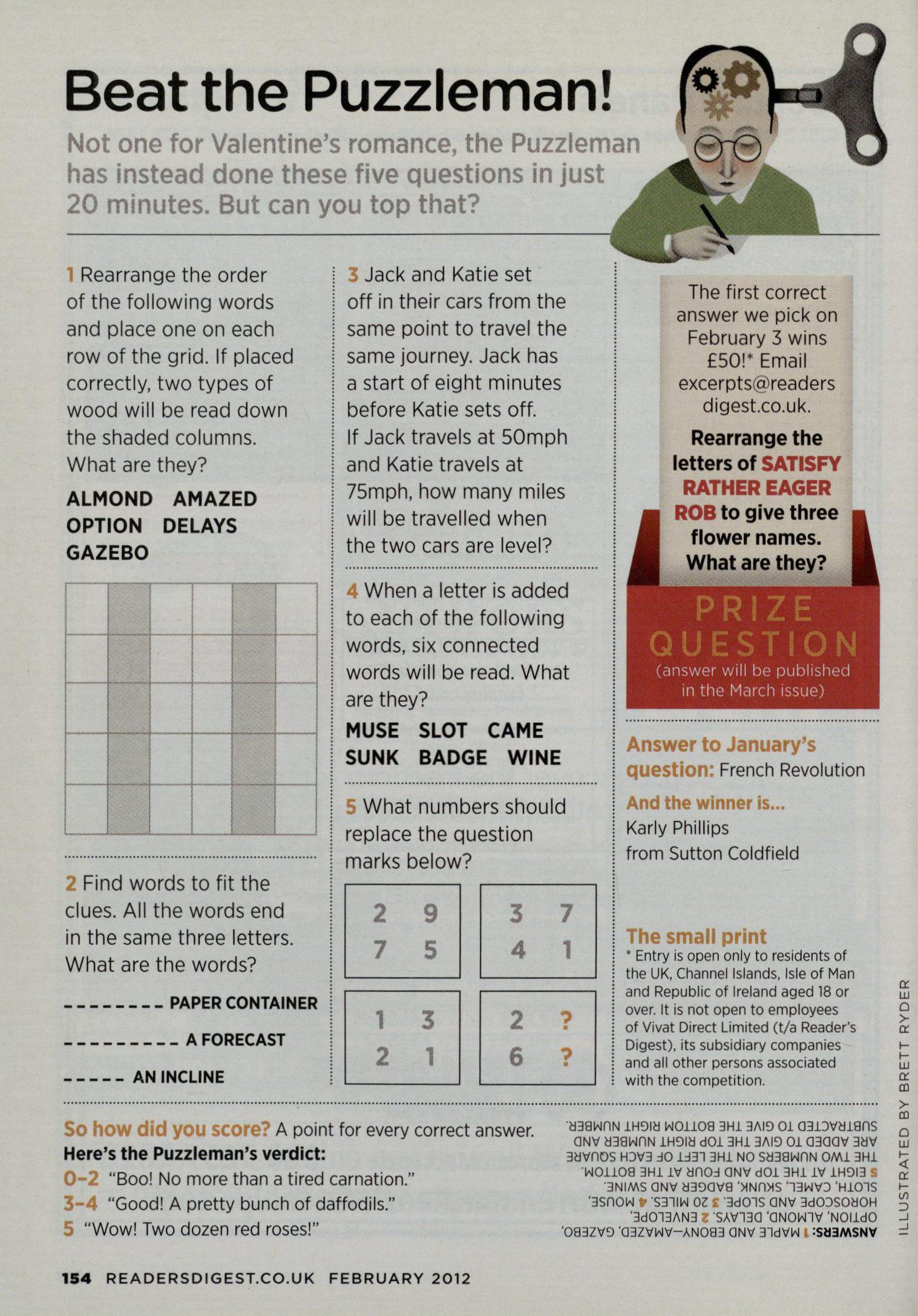
3 Jack and Katie set off in their cars from the same point to travel the same journey. Jack has a start of eight minutes before Katie sets off. If Jack travels at 50mph and Katie travels at 75mph, how many miles will be travelled when the two cars are level?
4 When a letter is added to each of the following words, six connected words will be read. What are they?
MUSE SLOT CAME SUNK BADGE WINE
5 What numbers should replace the question marks below?
2 Find words to fit the clues. All the words end in the same three letters. What are the words? AN INCLINE
So how did A point for every correct answer. Here's the Puzzleman's verdict:
0-2 "Boo! No more than a tired carnation."
3-4 "Good! A pretty bunch of daffodils." 5 "Wow! Two dozen red roses!"
The first correct answer we pick on February 3 wins E50!* Email excerpts@readers digest.co.uk.
Rearrange the letters of SATISFY RATHER EAGER ROB to give three flower names. What are they?
Answer to January's question: French Revolution
And the winner is... Karly Phillips from Sutton Coldfield
is open only to residents of the
of
and Republic of Ireland aged 18 or over. It is not open to employees of Vivat Direct Limited (t/a Reader's Digest), its subsidiary companies and all other persons associated with the competition.
114918 W01108 3H13A19 01 miDwitans ONV2138WON 11-19121 d01 3F113A19 01 0300V 38V
4j)
answer will dil 1,,I in ill.' LI nf 111,,11,`
PRI7c F .
154 READERSDIGEST.CO.UK FEBRUARY 2 012 The
print 'Entry
38VOOS
5e13EININN 0M1 3HI '440110£1 31-111V anoj ONV d01
IV 1H913S '3NIMS
8390V8 'ANnms '1314VD .Nims lsnow OZ '3,101S
3dODS0801-1 '38013AN3 Z 'SAV130 'ONOW1V 'N01180 '083ZVO '03ZVV1V AN083 ONV 31dVW 8:5213ms5v PAPER CONTAINER A FORECAST 2 9 3 7 7 5 4 1 1 3 2 2 1 6 '? ILLU STRATED BY BR ETT RYDER
small
UK, Channel Islands, Isle
Man
'8381411N
H3V3 JO I331 3H1 NO
OH!
ONV
ONV

ACROSS: 1Inadequate 5 Cups 7 SilencJ 9 Liediuom 10 Actor 11 Destroyed 13 Tie 14 Opportunity 18 Catastrophe 20 Top 22 Represent 25 Error 26 Indoors 27'' 75t 7c) . ■ -, DOWN: 1Instant 2 Allotment 3 Upend 4 L ,,ant 5 Cartoon 6 Someday 8 Nervous 12 Syrup 15 Purse16 Useless 17 Interfere 18 Carried 19 Airport 21Pirates 23 -‘v 24 Tired TEST-YOUR-KNOWLEDGE CROSSWORD ACROSS 1 Planetary paths (6) 4 Snatching (8) 9 Job (6) 10 Tiny piece of anything (8) 11 All people (9) 13 Line of travel (5) 14 Fling up (4) 15 Paper, pens, etc (10) 19 Agent who conducts a sale by lots (10) 21 Go by (4) 23 Remnant of the past (5) 24 Habit-forming (9) 26 Representation of the cross on which Jesus died (8) 27 Brought in (6) 9 ■ 18 10 20 23 24 26 2, 28 29 28 Left office voluntarily (8) 29 Tastelessly showy (6) DOWN 1 Musical group (9) 2 Containers made by coopers (7) 3 Scour (5) 5 Prepared (5) 0 Place to wash (8) 7 Consider as part of something (7) 8 Domestic birds (5) 12 Frequently (5) 16 Horizontal part of a stair (5) 17 Twenty-four hours ago (9) 18 Going round and round (8) 20 Hues, tints (7) 22 Arranged so as to be parallel or straight (7) 23 Happen again (5) 24 Equally (5) 25 Chemically inactive (5) • Find the answers in next month's issue, or online now at readersdigest.co.uk/magazine CROSSWORD SUPPLIED BY PUZZLE PRESS LTD, QUESTIONS SUPPLIED BY MENSA. FOR FURTHER DETAILS OF MENSA IQ TESTING, VISIT MENSA.ORG.UK. FEBRUARY 2012 READERSDIGEST.CO.UK 155
WIN £70 FOR EVERY READER'S JOKE WE PUBLISH. EMAIL EXCERPTS@ READERSDIGEST.CO.UK OR GO TO FACEBOOK.COM/READERSDIGESTUK
1 I've just tried to buy tickets for an Elvis tribute act. It was a right nightmare—I had to press one for the money, two for the show... Gavin M( Vie. Letham, Perth
I A woman said to her husband, "Look at this! I've had it since we got married 20 years ago, and it still fits me perfectly."
"It's a scarf," he replied. D Goightly, South Shields, Tyne and Wear
I A scientist says, "My findings are pointless when taken out of context."
Media: "Scientist claims 'findings are pointless' " Seen on the internet
I'm not very interested in tobogganing, but I'd do it if pushed.
Comedian Gary Delaney
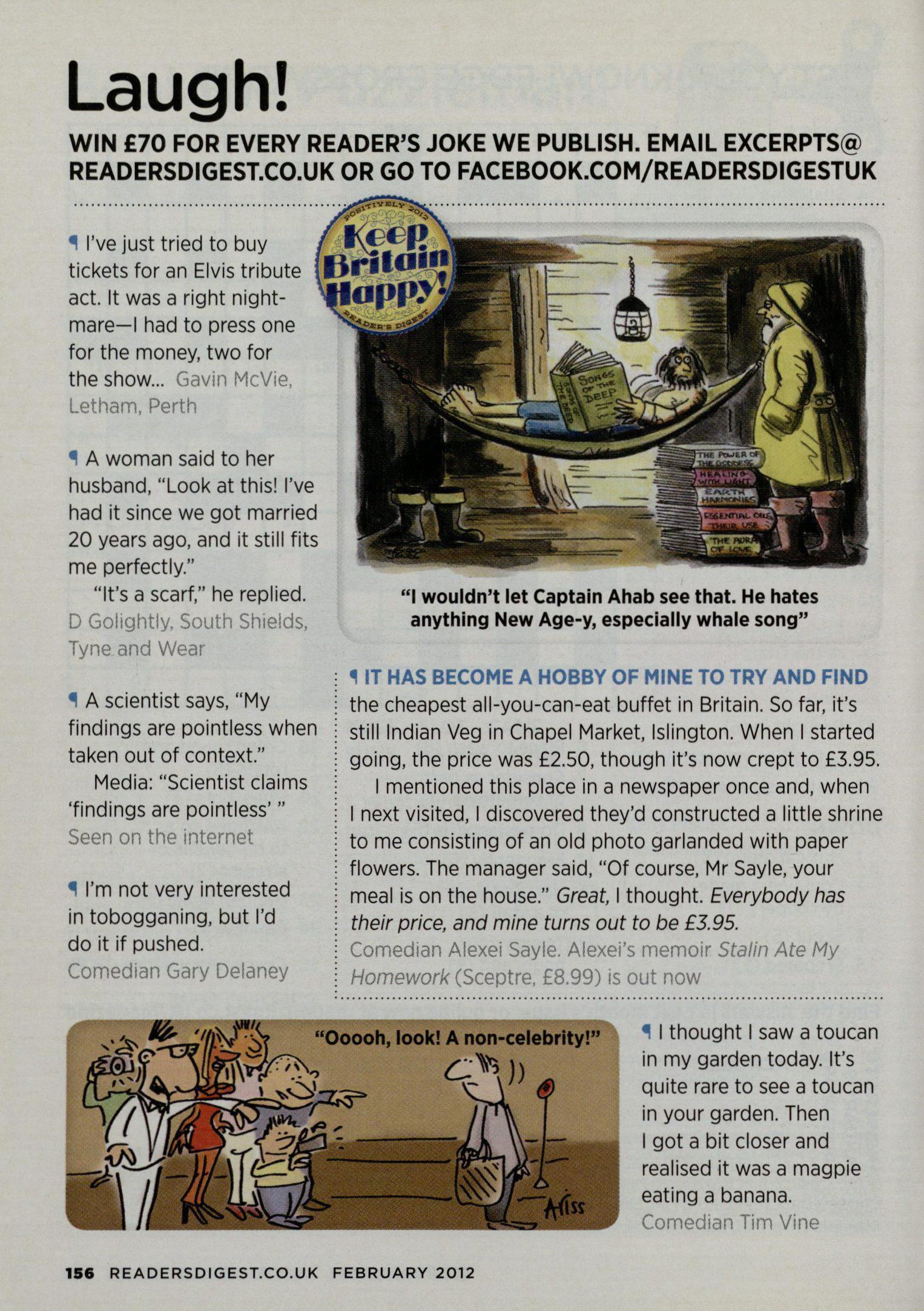
"I wouldn't let Captain Ahab see that. He hates anything New Age-y, especially whale song"
IT HAS BECOME A HOBBY OF MINE TO TRY AND FIND the cheapest all-you-can-eat buffet in Britain. So far, it's still Indian Veg in Chapel Market, Islington. When I started going, the price was £2.50, though it's now crept to £3.95.
I mentioned this place in a newspaper once and, when I next visited, I discovered they'd constructed a little shrine to me consisting of an old photo garlanded with paper flowers. The manager said, "Of course, Mr Sayle, your meal is on the house." Great, I thought. Everybody has their price, and mine turns out to be £3.95.
Comedian Alexei Sayle. Alexei's memoir Stalin Ate My Homework (Sceptre, £8.99) is out now
"O000h, look! A non-celebrity!"
N.Jliz„. 1
1 I thought I saw a toucan in my garden today. It's quite rare to see a toucan in your garden. Then I got a bit closer and realised it was a magpie eating a banana.
Comedian Tim Vine
Laugh!
156 READERSDIGEST.CO.UK FEBRUARY 2012
A chicken walks into a library and says to the librarian, "Bock." The librarian gives him a book. The next day, the chicken comes back and says, "Bock, bock, bock." So the librarian gives the chicken three more books. The day after, the chicken returns and says, "Bock, bock, bock, bock, bock." After giving the chicken five books, the librarian follows him to a small cottage. She looks inside and
I think my wife's sick of me.
She keeps wrapping up my sarnies in a road map
Eleri Webber, Cheshire
sees the chicken handing each book to a frog. Every time the chicken hands over a book, the frog says, "Reddit, reddit, reddit..."
Seen on the internet
I I bought a box of animal crackers. It said on it, "Do not eat if seal is broken." I opened the box, and sure enough... Comedian Brian Kiley
I Primark was safer during the riots than it is during a sale.
Corr eciian Chris A ci dison
I've been diagnosed with chronic fear of giants— it's called fee-fi-phobia
Seen on the internet
LITTLE EPIPHANIES
#10:
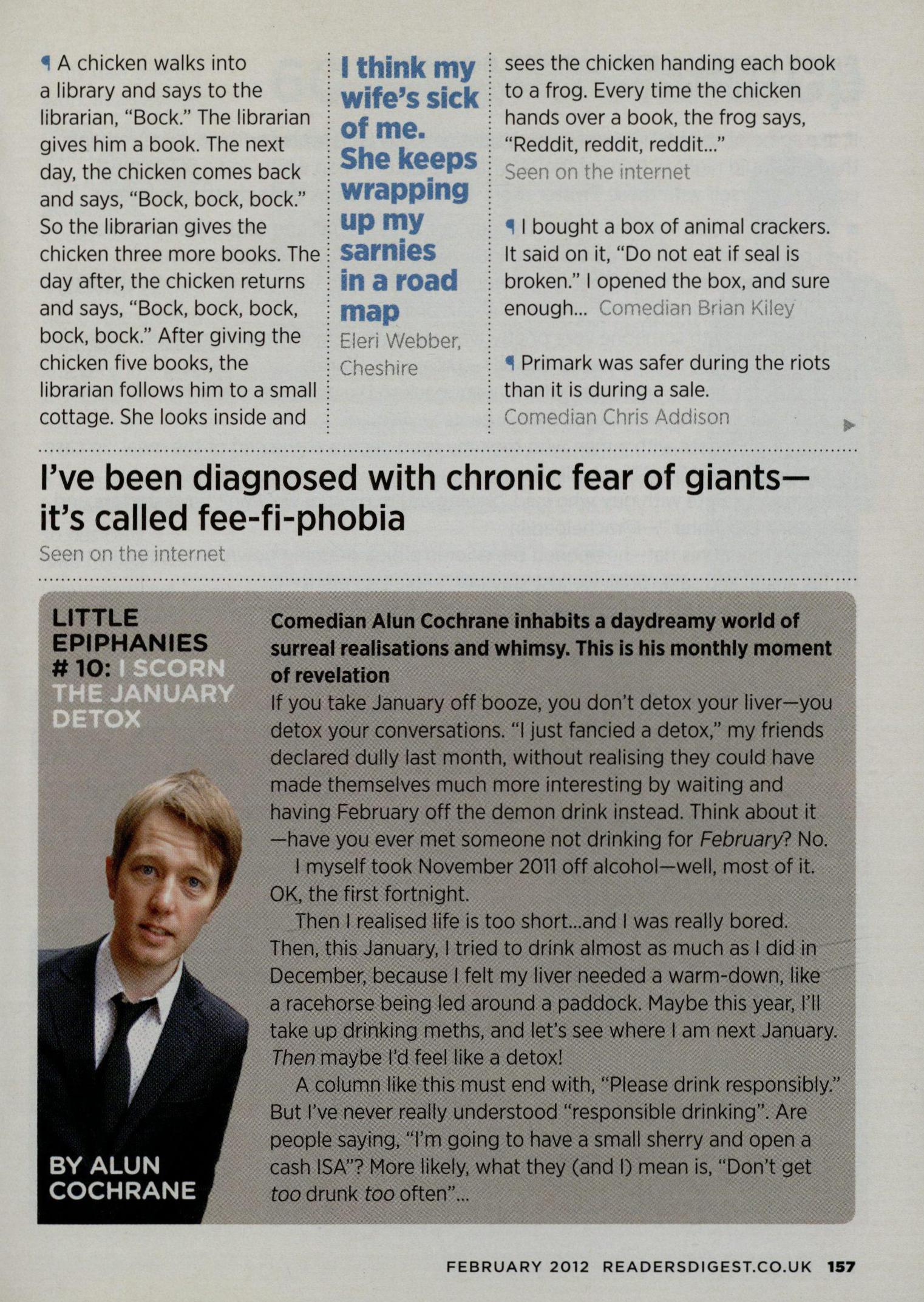
Comedian Alun Cochrane inhabits a daydreamy world of surreal realisations and whimsy. This is his monthly moment of revelation
If you take January off booze, you don't detox your liver—you detox your conversations. "I just fancied a detox," my friends declared dully last month, without realising they could have made themselves much more interesting by waiting and having February off the demon drink instead. Think about it —have you ever met someone not drinking for February? No.
I myself took November 2011 off alcohol—well, most of it. OK, the first fortnight.
Then I realised life is too short...and I was really bored. Then, this January, I tried to drink almost as much as I did in December, because I felt my liver needed a warm-down, like a racehorse being led around a paddock. Maybe this year, I'll take up drinking meths, and let's see where I am next January. Then maybe I'd feel like a detox!
A column like this must end with, "Please drink responsibly." But I've never really understood "responsible drinking". Are people saying, "I'm going to have a small sherry and open a cash ISA"? More likely, what they (and I) mean is, "Don't get too drunk too often"...
FEBRUARY 2012 READERSDIGEST.CO.UK 157
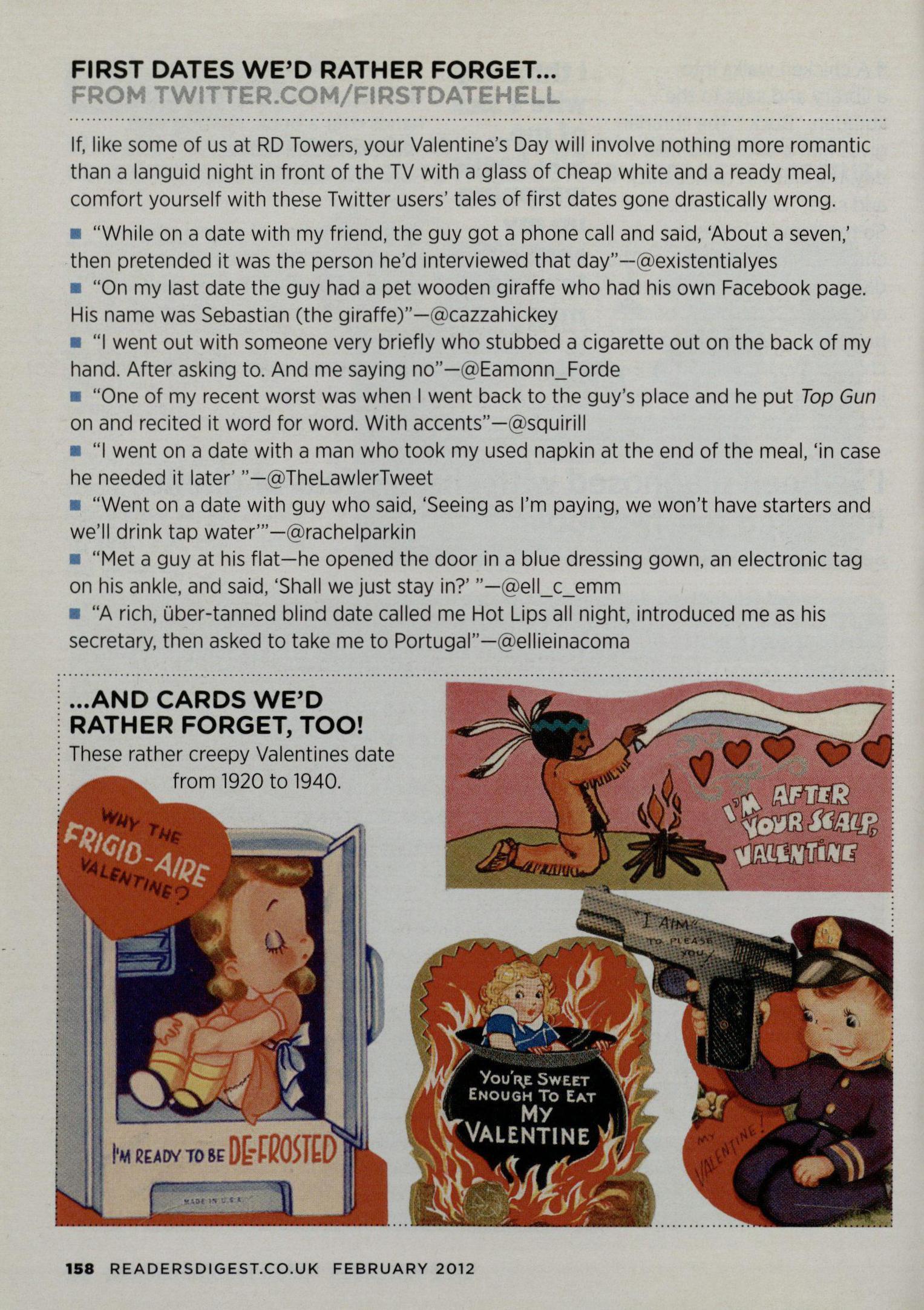
FIRST DATES WE'D RATHER FORGET... FROM TWITTER.COM/FIRSTDATEHELL
If, like some of us at RD Towers, your Valentine's Day will involve nothing more romantic than a languid night in front of the TV with a glass of cheap white and a ready meal, comfort yourself with these Twitter users' tales of first dates gone drastically wrong.
■ "While on a date with my friend, the guy got a phone call and said, 'About a seven,' then pretended it was the person he'd interviewed that day"—@existentialyes
■ "On my last date the guy had a pet wooden giraffe who had his own Facebook page. His name was Sebastian (the giraffe)"—@cazzahickey
■ "I went out with someone very briefly who stubbed a cigarette out on the back of my hand. After asking to. And me saying no"—@Eamonn_Forde
■ "One of my recent worst was when I went back to the guy's place and he put Top Gun on and recited it word for word. With accents"—@squirill
■ "I went on a date with a man who took my used napkin at the end of the meal, in case he needed it later' "—@TheLawlerTweet
■ "Went on a date with guy who said, 'Seeing as I'm paying, we won't have starters and we'll drink tap water"—@rachelparkin
■ "Met a guy at his flat—he opened the door in a blue dressing gown, an electronic tag on his ankle, and said, 'Shall we just stay in?' "—@ell_c_emm
■ "A rich, fiber-tanned blind date called me Hot Lips all night, introduced me as his secretary, then asked to take me to Portugal"—@ellieinacoma
...AND CARDS WE'D RATHER FORGET, TOO!
These rather creepy Valentines date from 1920 to 1940.
158 READERSDIGEST.CO.UK FEBRUARY 2 012
I My dad used to work in a tiddlywink factory—but he didn't like it. He said it was counterproductive.
Comedian Alex Horne
I 0: What comes out of the ground shouting, "Knickers, knickers, knickers!"?
Ai Crude oil.
.JH Ini ■ ;H
I I'm half Iranian, half American— so basically, I hate myself.
Comedy writer
Ariane Sherine
1Q: How many social workers does it take to change a light bulb?
A Ten. One to change the bulb, and nine to form a "Coping with Darkness" work group.
Norma Makin, Banchory, Aberdeenshire
1 I know a guy who called up the Home Shopping Network. They said, "Can I help you?" and he said, "No, I'm just looking."
Comedian George Miller
60-Second Stand-Up
Ladies and gentlemen, please welcome Chris R msey
FAVOURITE BIT OF STAND-UP EVER?
It's a Billy Connolly routine that was filmed for An Audience With Billy Connolly in 1985. In it, he talks about young people putting on incontinence pants before a night out. I saw it when I was a kid, and I nearly cried laughing!
BEST JOKE YOU'VE EVER WRITTEN?
I like one from my 2010 show Aggrophobic. It goes: "My venue for the Edinburgh Festival is a Portakabin—it's literally a Portakabin! I'm a Geordie...in a Portakabin. I was going to call the show Auf Wiedersehen Pet Live."
FUNNIEST THING THAT'S EVER HAPPENED TO YOU? I was walking along a street in London the other day, and in the distance was a woman screaming—really going crazy—to someone on the other end of the phone. She'd calmed down by the time I walked past, and all I heard as I came to her—a little snapshot of her life—was her saying into the receiver, to whoever was on the other end of the phone, "OK, OK, I love you as well. Alright, I love you too...but I'm still your parole officer."
FAVOURITE TV SHOW?
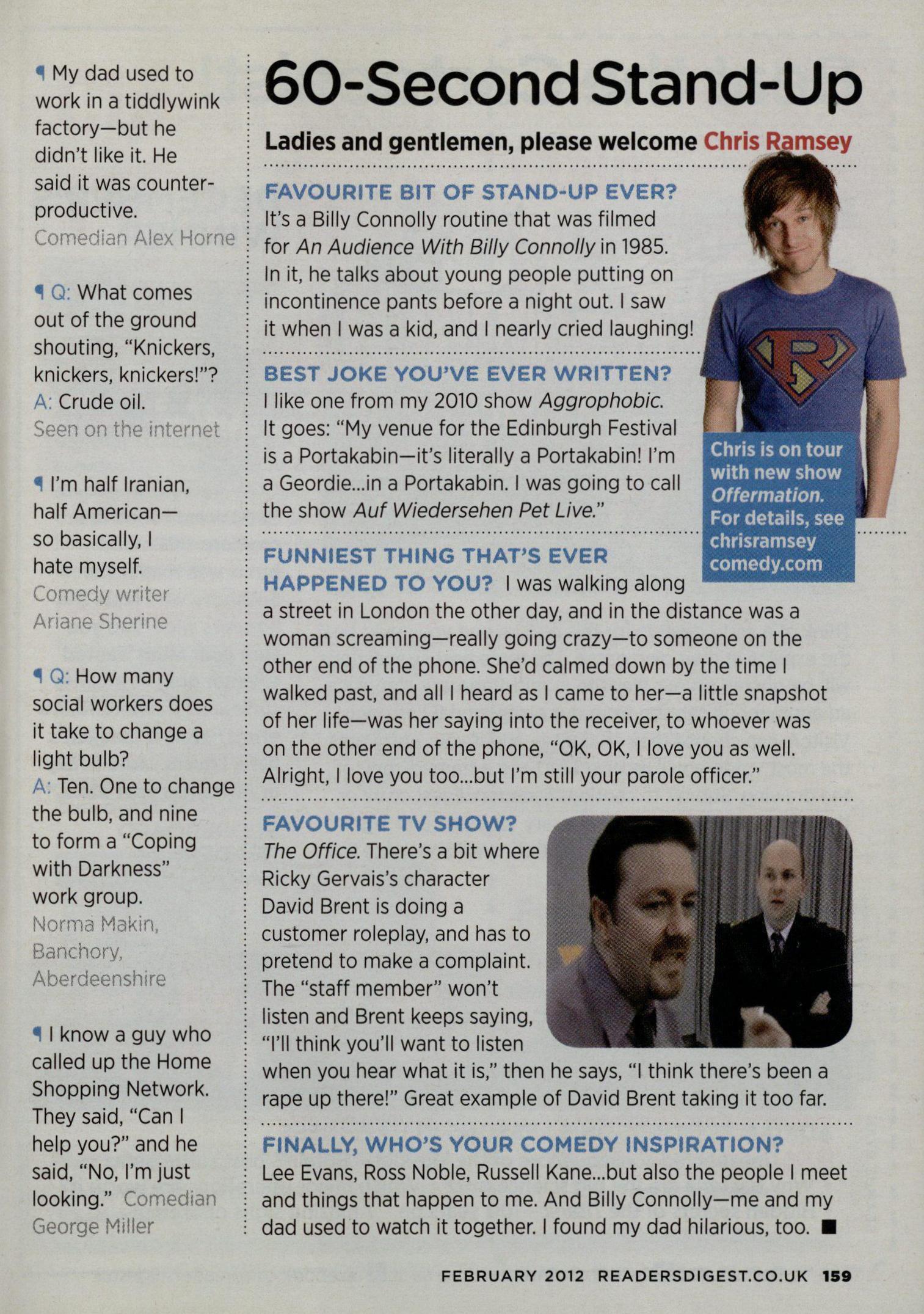
Chris is on tour with new show Offermation. For details, see chrisramsey comedy.com
The Office. There's a bit where Ricky Gervais's character David Brent is doing a customer roleplay, and has to pretend to make a complaint. The "staff member" won't listen and Brent keeps saying, "I'll think you'll want to listen when you hear what it is," then he says, "I think there's been a rape up there!" Great example of David Brent taking it too far.
FINALLY, WHO'S YOUR COMEDY INSPIRATION?
Lee Evans, Ross Noble, Russell Kane...but also the people I meet and things that happen to me. And Billy Connolly—me and my dad used to watch it together. I found my dad hilarious, too. •
FEBRUARY 2012 READERSDIGEST.CO.UK 159
Beat the Cartoonist!
WIN £100 AND A SIGNED ILLUSTRATION
DECEMBER'S WINNER

Think of a witty caption for this picture and you could beat the experts at their own game. The three best suggestions will be posted on our website in mid-February alongside an anonymous caption from our professional cartoonist. Visitors can choose their favourite—and if your entry gets the most votes, you'll receive £100 and a framed copy of the drawing. Submit to captions@readersdigest.co.uk or the address on page 4 by February 10. Enter and vote online at readersdigest.co.uk/caption. We'll announce the winner in our April issue. ■
IN NEXT MONTH'S ISSUE...
Solid votes for all the captions this month, but it was reader Karen Salisbury who stole the honours with "Are you sure your mum wanted a winter goat?", pipping cartoonist Dale ' McNeill's effort "Well, if the goat's here, I guess some family In Africa has your Xbox."
SCOREBOARD READERS 24 CARTOONISTS
ADRIAN EDMONDSON'S LESSONS IN HAPPINESS
PLUS Unexpected consequences of the Internet Britain's best...little gems
• Why bacteria are the big science buzz Which minor operations are worth it?
• Hidden secrets of the Titanic-100 years on - Amazing signs of Spring!
SEAMUS RYAN
leo Follow us at twitter.com/rdigest. Like us at In facebook com/readersdigestuk
Claim your FREE TV Amplifier
Take advantage of this Special Offer for enquirers with hearing difficulties
5000 to be given FREE to keep NOW enquirers for the Essence hearing aid can receive a FREE TV Amplifier to help with everyday sounds around the home - great for conversation, listening to TV, radio, even birds singing! Most people with hearing difficulties could benefit from this offer and find out just how much difference clearer hearing can make to their lives.
Don't delay - FREEPHONE today! This TV Amplifier will be given free to keep, with batteries included - free to enjoy in the comfort of your own home and surrounding environment. There is no obligation to purchase and all genuine enquirers will be delighted with this free offer which is part of the Amplifon National Campaign for Better Hearing.
The Amazingly Discreet Essence Hearing Aid
Now there is a perfectly easy low cost way of overcoming the effects of natural hearing loss thanks to the Essence hearing aid.
The Essence fits so comfortably that people forget they are using it and its microscopic sound processor automatically gives hearing clarity in all listening situations. It is ideal for mild or moderate hearing difficulty for TV, general conversation or in "one to one" situations.
For details of how to claim your FREE TV Amplifier call:

Hurry, limited stocks! Call today and quote "RD2401" or complete and post your details on the coupon attached (no stamp required). The
amplifon www.amplifon.co.uk
AMPLIFON NATIONAL CAMPAIGN Fop lamHEARIN, SPECIAL OFFFP AMPLII ON NATIONAL CAMPAIGN FOR BETTER HEARING
FREEPHONE 0800 022 33 77
National
for Better Hearing is a trading name of Amplifon Ltd. ==-
Campaign

Claim I your FREE TV Amplifier Yes! Please tell me how I can I I claim my FREE TV Amplifier and find I out more about the Essence hearing aid I First name Surname I Address I Postcode Telephone Mobile SIMPLY CLEVER SKODA VAT* 0 APRt representative For more information please visit your local retailer or skoda.co:Uk/offerr '0% APR representative on selected new models. Minimum 50% deposit required over 2 years. Retail sales only. Indemnities may be required, subject to status. Over 1/3s in the UK only. Excludes Channel Islands. Participating retailers only. Subject to availability for orders placed before 31st March 2012. SKODA Finance, Freepost SKODA Finance. Terms and Conditions apply.' Reduction equivalent to 20% VAT applied to original base price Including factory fitted optional extras available on Fabia, Roomster, Octavia and Superb models (exclusions apply). VAT is still applicable and will appear on the invoice. Finance is not required to obtain no VAT offer. Prices and specifications are accurate at time of print. Offers may be varied or withdrawn at any time and are not available in conjunction with any other offer. Models shown may vary from UK specification. Official fuel consumption in mpg (litres/100km) for the SKODA range: Urban 19.2114.7) - 68.9 (4.1), Extra Urban 36.2 (7.8) - 94.2 (3.0), Combined 27.7 (10.2) - 83.1 (3.4). CO2 emissions for the SKODA range 237 - 89g/km. I Post this application now! I Hurry limited stocks available NO STAMP REQUIRED 1111 www.amplifon.co.uk RD240112ESS2 SKODA'S BIG FAT ZERO OFFERS 0% VAT and 0% interest offers available on selected SKODA models. IIIIIII 111111111101 II 01 amplifon Winner of three 'Best Manufacturer' awards Apre\lEWCAR fRESS AWARDS 11 II






































 eBY BRUCE DESSAu
eBY BRUCE DESSAu




















































 DVDS irsirll
Miss caw', &John
DVDS irsirll
Miss caw', &John

 NI CK SIN CL A
NI CK SIN CL A






































































